- Mar, 2024
- Mar 22, 2024
-
Wharton finance professor sounds the alarm on soaring U.S. debt - YouTube
Adding $1t every 100 days.
Interest on the U.S. debt is really driving the growth at this point, says Maya MacGuineas - YouTube
Steady march upward relative to the economy. Slows economic growth. Two parties can't compromise or work on the things they should be working on. Both say 'Not our problem at the moment.' Difficult to see how it connects to anyone's daily life.
US public debt will be 100% of GDP in 2024?
Worse because we wait to fix them. The changes are more difficult than if they had been done earlier.
Where could the US cut spending? Defense? ‘Investing’? Health Care and Retirement (no candidate wants to talk about cutting Social Security)?
Soon tax cuts will expire. Both parties want some amount of tax cuts extended, which will make the numbers even larger.
Conversation might start the day after the election.
Taxes will have to go up.
The winner-take-all economics of the 21st Century. Every business we look at, you're gonna see one or two companies dominating. Advertising 20 or 30 years ago, 2 or 3% was a big share of the market. Today, 2 companies have most of the 60% of advertising which is done online. Aswath Damodaran
At this moment, Jensen Huang is considered CEO of the greatest business ever.
Apple In Talks to Build Google's AI Into iPhones - YouTube
10 years of duopoly, why allow things to change? They made their search agreement in 2000. Google needed Apple more than vice versa since then, but now with an AI agreement Apple will need Google.
Apple will leverage Google's Gemeni. Google's AI has looked bad, but not as unstable and unpredictable and new as OpenAI.
This might mean Apple isn't as far along with its own AI as some thought. Why does it need Google?
If Apple went with Microsoft or another company rather than Google, that would put them at odds with Google. Apple is more afraid of Google. Google does more things that can compete with Apple, and can take marketshare if they want to.
Users don't care if Apple was first to anything. They care if the product works well.
Apple needs AI tech, some say.
This will be the biggest AI contract maybe, so Google will be ‘winning AI.’
Homebuilder sentiment turns positive for the first time since July - YouTube
People starting to get used to this 7% rate, if they can afford it.
Apple is out of the low-margin, high competition industry of EVs.
Indian as an EM has more transparency in the data than others. Combination of transparency in reporting and of fundamentals.
5% Fed funds rate 'not restrictive' at this point, says Richard Bernstein's Michael Contopoulos - YouTube
Home prices are going back up.
Starting to talk about a hike.
How Nintendo Avoided Massive Layoffs - YouTube
He argues against ‘corporate America’ (different from capitalism). CEO took a 50% paycut. Sometimes the owner of small businesses take no income because they had to make payroll, that's a normal thing in small business. If you lay off people to keep making profits every period, no one wants to work for you, because you're not a leader.
Bitcoin. Today asset class (crypto) is $2.5t, but if 3% of all assets end up in crypto, it will be $6t asset class.
The tokenization of a lot of commercial assets. Storing digital assets or property. Tokenized economy could be $20t by 2030, which would be 10% of all the tradfi assets today.
Halving probably priced in. Most of current move is the credibility lent by institutions and the allocation.
‘Bitcoin is the gold of the crypto market, Eth is the oil’.
‘Most of capital markets will be tokenized. Most of the record keeping, settlement payment, reconciliaiton, will be on blockchain, and the oft talked about instantaneous transfer of ownership will be instantaneous.’ Civil asset forfeiture, anyone? Freezing of bank accounts of labelled-by-government-‘terrorism’-supporting citizens/ 2-years-later proven-in-court law-abiding protesters', anyone?
#humanrights
Ali will probably be profitable for a while but will eventually be out-competed.
Analyzing Economies: USA, China, Japan, Russia, India, Korea, & More - YouTube
China, many places will block its stuff (like EVs) (not just through tariffs but actually just block). The countries (India) who want cheap Chinese stuff don't have a lot of money.
China graduation level currently low.
Japan's low fertility rate (bottomed out about same as Europe) is higher than anywhere else in eastern Asia.
Japan permitting is relatively easy for making chips and other things. It took only 1.5 years to get up and running.
IBM, which doesn't even know how to make chips, is making a chip in Japan now.
Japan and Korea are now friends. Papered over historical things, small reparations, no truth and reconciliation. Young people like Japan, like Korea.
Koreans work a lot, have very few kids. Korea reportedly has gender problems. Korea has a lot of debt. Koreans like to consume. Koreans might pump up immigration (Vietnamese).
Taiwan is centered around small businesses, like Germany. Taiwan remains rich and poor. TSMC is not typical, but might be a bellweather.
Vietnam copies China pretty well. Samsung phones are made there. Vietname is cheaper, less regulations sometimes than China (for Chinese companies), less ‘under the watchful eye’. Needs bigger businesses, which the government fears. Needs more college education.
India incredible poverty was ended by rapid growth, massive transfers (to make people not so rural which was the problem). Get people food, get people houses. They got food and water. Now they're doing trains etc. Girls are still not going to school. Factory workers are all women.
Pakistan is a mess. Poor but not fast growing, doesn't invest, consumes whatever it gets, borrows from IMF and defaults. Has nukes and tariffs. Low income. Military coups, power struggles, instable, two main provinces in constant revolt basically. High crime. Fertility high. Nazis. Trying not to be dragged into China alliance and China's conflicts globally. Pakistan started out richer. Focus a lot on competing (militariily) with India.
Philippines leadership less wild. Less corrupt. Because recent leaders left.
Aus is a masterclass in creating a nice society based on mining (bauxite and coal), supplimented by high end services, high minimum wage. Doing better than Canada, has institutions that we could copy, and are copying (Biden copied income based repayment of student loans). But international demand controls their economy, at risk of China reducing purchases.
Russia is on a wartime footing, war economy. Everything shifting to war economy. Germany selling through third countries to Russia. China is buying Russian oil and selling Russia its stuff, but this is a business relationship. If price of oil goes down, China will drive a hard bargain. India buys military parts from Russia. Likes that Russia can protect them militarily from China.
Interest rates and inflation high.
Russia still import dependent.
Russia's reserves running out, will run out this or next year. US no longer backing Ukraine like it was. Europeans are backing Ukraine. France, Poland (4% of GDP for military spending, drones).
Poland is same size as Ukraine, but better tech.
AI. Routine jobs will be out. Decision-making not, maybe.
There will always be full employment because of relative costs. Erik Torenberg. Famous CEO is a good typist but hires a well-paid typist. They'll get paid very well to do these little tasks, because there'll be so much wealth. He thinks people will still be doing tasks even if AI does it better.
AI could be worse. It could be malevolent.
People already prefer AI doctor's bedside manner. AI girlfriends are already popular.
The year of AI efficiency layoffs. Like 90s with internet.
Routing the right task to the right model, which will be smaller than the total everything models used on ChatGPT right now. Small models on the device even.
It's not even ‘liquidity,’ it's juts ‘money printing’, said Lynette Zang
Inflation. It's just not the US dollar going away, it's the entire system, which has to reset into the new system.
The banks are all insolvent right now, she said. All banks, because they're based on debt. Interest rates have pushed down market valuations of all that debt. Derivative bets against those debts. Debt at high levels. Fine unless forced to liquidate.
Mnuchin came in and bought NYBC with private money.
All this means everything, houses, clothes, can be tokenized and put on your phone.
Risk transfer from many to the few, maintaining the system will be too expensive, market will crash. From Debt to Hyperinflation: More Banks to Collapse As System Implodes, 'They Need a Crisis' – Zang - YouTube
2% inflation, people don't notice it. Not that the price stays the same, but that the public doesn't change its behaviour. But if it happens quickly, then they notice and they don't trust.
After 70 years: German national team takes off adidas, puts on Nike | DW News - YouTube
Microsoft did another aquahire of a whole AI team. Speculation that they have so much difficulty doing anything because of their monopoly they don't bother to buy the asset but rather just hire the people.
Is this a new way to go around antitrust? Just buy a team or licence something.
Large-scale bitcoin miners are competing head on with AI companies for power: Marathon Digital CEO - YouTube - Mar, 2024
- Mar 15, 2024
-
If you could teleport gold from Tokyo to NY in a couple minutes, people would like it.
#Crypto
It's not digital currency. It's digital property. It's capital preservation for everyone.
Michael Saylor: Bitcoin, Inflation, and the Future of Money | Lex Fridman Podcast #276 - YouTube #Saylor
Inflation CPI understates the suffering inflicted upon the working class and on companies by the political class. It's a massive shift of wealth from working class to propertied class. Shift of power from freemarket to the centrally governed or controlled market, from people to government. Saylor
In an environment where you're infating the money supply and keeping assets constant, assets will appreciate in proportion to money supply, and the scarce desireable quality will determine value of inflation. Money supply expands 7% per year on average. Many houses have gone up in price more than 300x in 100 years, or around 6.5% per year. You're sucking 6% of the energy of the fluid that the economy is using to function. Currency moves economic energy around.
All government policy is inflamatory and inflationary. Any policy. It interferes with free market and prevents some rational actor from doing it in a cheaper, more efficient way.
Wars (and other policies) are never paid for with taxes. It's too transparent. If people understood the true cost, you will lose 95% of everything, you might reconsider a policy and vote for a politician. A lack of humility. People overestimate what they can accomplish. Experience causes you to reevaluate that. Our mistakes are our good ideas that I enthusiastically pursued, to the detriment of my great ideas that required 150% of my attention to propser. People pursue to many good ideas. There's a limit to what you can accomplish. Everyone underestimates the challenges of implementing, overestimate the benefits of the pursuit. Overexuberance. As the exuberance of the government expands, so must the currency supply.
Inflation is completely misunderstood. Inflation is a vector tracking price change in every good and service.
You can't blame them, because economists don't even understand economics. If they did, they would measure every price of housing, the full array of foods and the full array of assets, and they'd publish this every month.
The primary problem is ‘The government will try to do good.’ It will do more harm than good. They will try to pay for it by expanding the monetary supply. They won't realize this. They'll collapse their own currencies, and mismeasure how badly they're doing that. They'll say the dollar lost 95% over 100 years. Actually it lost 99.7% over 80 years. They'll overestimage their budget and means to pay for it. They're oblivious to the damage they do to civilization. The mental model they're taught, it's Ok we can print lots of money, is defective. ... Other countries lost 99.9% or all (currency failed).
If house prices are going up 20% per year and I say this is great for the American public because most people are home owners, I'm misrepresenting it because it's really a negative.
Look at the ship next to us. What if I told you your ship leaked 2% every year. It's rotting 2% per year.
MIT costs hundreds of years of many families earnings. Inefficient. The seats are uncomfortable, too. Now we have the same teachers you watch on your chair at home. You need PHDs. A PHD is $1m. There's 10m in the world. How many people COULD get a PHD if it were affordable?
If you try to solve this by throwing money at it, you can throw a trillion dollars. $10t, you still don't get there. Harvard can't educate that many.
Education can be infinite and for everyone.
Open, permissionless, not censorable. Non-sovereign bearer instrument. Property. Irregardless of anyone else or government. Twitter stock will never be property in China. It will never be trusted. Property is low-frequency money. If you wanna hold it for a decade, maybe you buy a house, maybe in a decade you sell the house and buy the property again.
What makes bitcoin ethical (to endorse) is no person can change it (well, but they can if they have influence or power). No one can do what they could if it were a security, print 1000 more copies tomorrow.
Bitcoin is the first time we created a digital property. Everything else is securities. Sending money digitally is an IOU.
An armed society is a polite society. If you disagree, you can always withdraw your resources from it.
You can promote a property to the extent that you don't control it, ethically. There's an interest still, but that's different from a conflict of interest.
8b people with mobile phones serviced by 100m companies doing billions of transactions per hour. The companies are settlings on the base level, and the companies are dealing with the consumers on proprietary layers like layer 3, and on occasion people are shuffling assets on layer 2 (moving $50 or something).
You can't trade with a company in Nigeria. No amount of money or time. You get shut down at the banking level (you can't link a bank there with a bank in the US). At the credit card level (because they don't have the credit cards so they won't clear). At the compliance/FCP level your system is from a different political jurisdiction and it can't interface with theirs. You can do it with crypto, fast, cheap, with anyone.
Bitcoin's a universal trust protocol. So is English. No one's payment system works everywhere. US payment systems in Russia? But bitcoin also can't be done easily in these places.
No security can be a currency for the internet. Only a property can be.
If bitcoin goes up, because of how much he owns, Saylor could become the wealthiest person.
The Canadian trucker protest educated millions of people and made them start questioning their property rights and their banks. War in Ukraine was the second shock, Russian sanctions. Hyperinflation in the rest of the world a fouth shock and persistent inflation in the US a fifth.
Bitcoin's volatility attracts all the attention, massive gains and losses, which sucks money into it. Also, it results in massive gains for traders, and that attracts capital.
Temu spent $1.7b in 2023 to advertise and got, in a year or two, 161m users, nearing what Amazon has. It might spend $3b in 2024 on Facebook, Insta, Tiktok, Suprebowl. Temu replicates what Ali did. In 2023 sold products at a loss of about $7 per order. But others say it isn't really losing money.
Temu connects factories with customers, cutting the middle man.
Temu gamifies shopping with games on the app to win prizes. They have countdown timers running on each product to show when a sale ends.
Temu shows that consumers are willing to wait (not fast shipping) as long as the price is cheap.
Morgan Stanley reported they think their growth is cresting.
The quality is low. Safety is a question.
There is a data risk.
China considering liberalizing household registration program. Currently migrant workers in cities can't access any social benefits because their household is registered back in their village. If they change this, they can buy apartments etc in the city.
China is buying ETFs, stimulating their market similar to US did.
If China changes just a smidge in the right thing, they'll attract tons of foreign investment.
China government has the money to spend.
China continues to clash with Philippines fishing boats etc. Some concern it could go too far.
There are hundreds of millions invested in Bytedance out of the US, which represents billions in value.
This week lots more headlines on China, not negative, some modestly positive.
China growth more in lower-tier cities. Tier 1 and 2 are 20 or 30% of economy, 6 or 7% of population.
China the companies that have outperformed have been doing outside markets. Growing rapidly overseas markets. Appliances and durable goods benefit from this trend, maybe.
Some China sectors in bull market of 20% off low. Materials, renewables, smaller cap tech.
Miniso CFO discusses company's plans to add about 1,000 stores a year over the next 5 years - YouTube
#Retail #China
In some countries (Nigeria currency) it's ‘staggering how much wealth was preserved.’ 'Until you get countries that run more credible fiscal policies, people are gonna wanna buy that story, and it's a story that's spreading.'
The monetary policy for this ecosystem was set in code by Satoshi whitepaper.
Chinese space company founders are coming in significant part from Finance (like America). Samo thinks maybe they're coping it from America, but that they don't have an Elon-tier person so it won't happen. But even if they did it would be, internationally, so controlled, similar to exporting nuclear reactors, where you better be on good terms from US or a similar Western country if you want to buy these instead of making them yourself.
Jack Ma may have been an example of the highwater mark of how much impact on Chinese society can a purely commercial or technocratic actor that's not aligned with the CCP have. The ceiling is pretty low. Not even critiquing their policy.
China is not like Singapore, which will use a sovereign wealth fund that will try to develop a totally new product, a novel solution to a problem. (Singapore working on insect protein, which is kind of what you need for a tiny city state to feed its population.) When China says they're going to invest in AI, it probably means close the AI gap by copying the US. What makes the individual threatening to the CCP is their popularity. If they offer something Chinese people want or like, they'll be liked too much.
Might be a spot ETF for bitcoin in HK, and there's a lot of interest.
To do this, you need a bunch of financial institutions working together. The stock exchange, regulated asset managers who can manage the product, licenced brokers called participating brokers, and depository services who support the running of the fund. In HK also asset custodians in cash and crypto sides. And good quality market makers to support a product after it starts trading on an exchange.
They've seen how the US did it and can use that roadmap.
The HK might have an advantage over the US product because you can actually pull Bitcoin out from the funds.
The HK fees have to compete so be as low as what they US ones were set at.
They can't launch too fast because they think most important is to have a product people like, a quality product.
Eth etf race. US hasn't approved any product yet, so there's a more global race for that. Being first to market is critical for players investing in that space.
China, reportedly the young are really spending, and it's their income that is limiting their spending.
S&P large cap around 15x the mag 7. While the Russel2000, looking at the profitable companies, around 12x. ... When rates cut there will be multiple expansion plus risk appetite growing, perhaps. Tom Lee
‘The fallacy of a 2% inflation target by the Fed’ - Bookvar
Because of technology, 'prices usually fall. Tech prices are keeping a lid on goods prices, and that's 0, then something else has to rise by 4% to get to the 2. So J Powell is actually rerouting for higher other prices to offset that natural decline in prices from technology, and that makes no sense.'
The reason why there’s a 2% inflation target is not for the best thing for the economy. ‘If the inflation is at 2, ideally we would have a Fed funds rate of maybe 4, and if we go into recessoin we’ll have 400 basis points to cut in a downturn.' ‘It’s right for their own policy.'
But they do also think 2% is good for the economy. It greases the wheels of the economy. You want a steady modest rise in inflation so people go out and spend. ... But there are a lot of people who would say the right level of inflation is 0.'
Restaurants don't have a lot of productivity levels to raise to offset higher wages. You only have one and that's to raise your menu prices.
VISA sees everything, every type of consumer. If the consumer is trading away from Macdonalds and going to Taco Bell, VISA sees the spend.
They see basically no weakness anywhere on last call.
There's also a shift in how people spend and pay. They pay with cards and don't even carry cash. They buy less for stuff around the house and go out to eat more.
BofA says there are still excess savings. The lowest savings accounts still have a few thousand in there. They have 4x than what they had saved pre-covid.
Cruise lines said they've seen no slowing in spending. Home restoration supplies are a little soft, because they've been booming for several years and that's already done.
Fed might have been suprised by QT not having an impact. Then the AI boom in 2023 and earnings recovery animal spirits. Fed might have been thinking they were sailing into a deflated direction but AI boomed, and tech companies buying from each other meant high revenues.
Nvidia's biggest customers today are trying to be its competitors. They're all trying to make their own chips.
When a stock goes vertical (on good news or whatever) you're pulling forward a lot of future returns. It matters what you pay. A stock parabolic move can pull earnings forward 25 years.
There's a pro-shareholder thing going on in hottest stock market Japan and hottest EM India. Whether they're actually doing this for the stock market not sure. Whether they're looking at US and saying Hey maybe there's something there not sure.
China's middle class, over the next 5-10 years, will go from 400m to 800m (add the size of US population). Chinese love to travel to Japan, Singapore, Thailand, Indonesia, Vietnam, India. Middle class stories. Chinese travellers sprinkled $250b around the world in 2019. Shopping luxury, eat out, experience things. The more they make the more they wanna buy.
China, even if grows 3% per year for 10 years, in terms of dollars that's still a lot of dollars.
Apple needs another China, but the whole (asia) region will be that. But they have to compete against $10 Chinese phones.
Netflix et all used to be like How do we get these movies to open big in China? Now it's all India.
India printed an 8.4% GDP number for Q4.
Tesla, multiple is still so fat. No margin of safety when fundamentals turned to the downside. Has to reach a bottoming in sales numbers for dip buyers to return, maybe. Hybrids are so hot, and that wasn't assumed years ago, they thought it was EV or not. The hybrid bridge. Toyota was in it, no one else. - Mar, 2024
- Mar 11, 2024
-
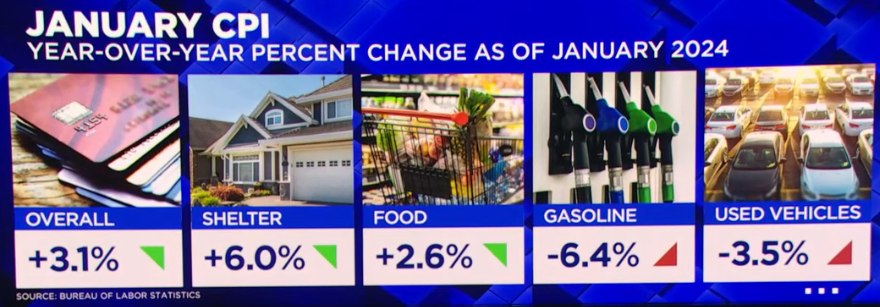
-
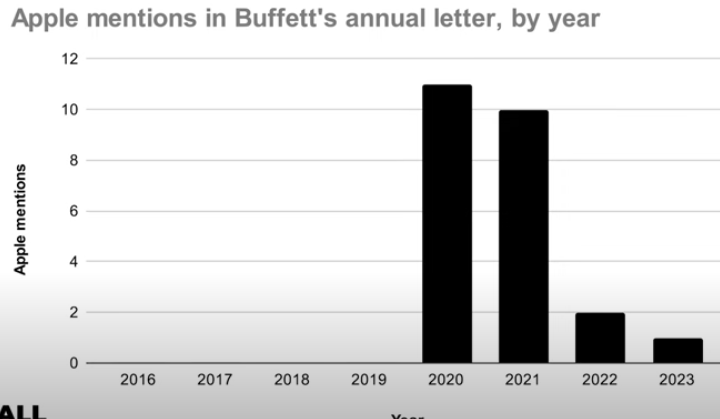

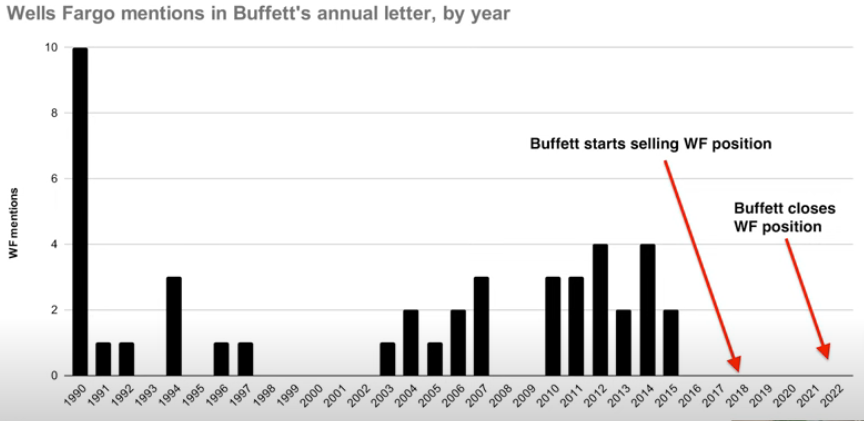
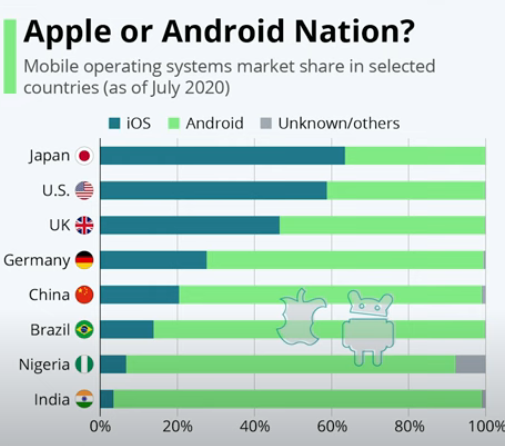
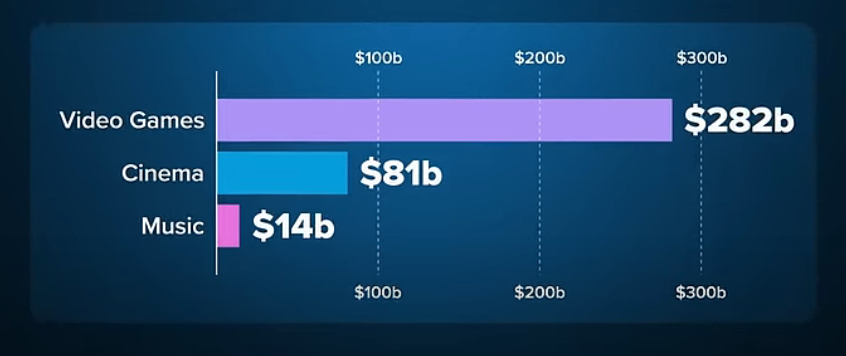
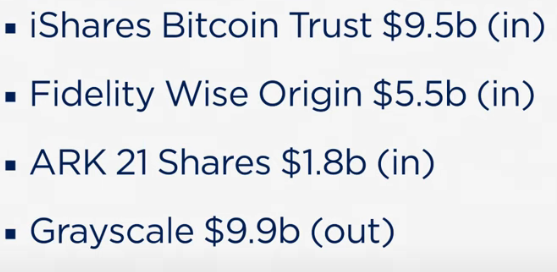
-
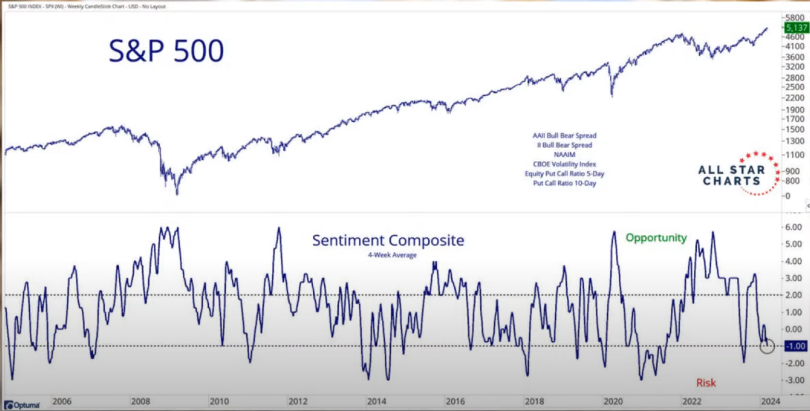
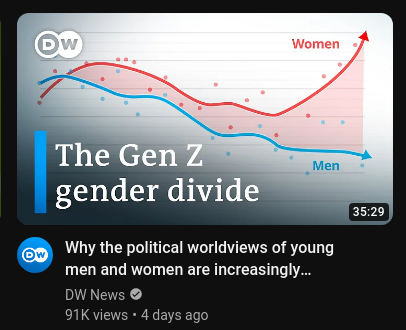




-
Private credit bubble. Chairman of UBS.
PIKs. We prefer less transparency, we want them to lie to us. Huge forward risk. Things are not being priced appropriately.
Streaming isn't profitable, people are saying.
Alibaba to Invest in China AI Firm MiniMax at $2.5 Billion Valuation - YouTube
Government regulator website featured(endorsed) Eddy Woo. Endorsing in what Alibaba seems to be doing (for now), which is investing in one of Xi's key initiatives, AI and cutting edge scientific innovation.
China looking to lift all foreign restrictions in manufacturing sector, they said, it's reported.
Investors Beware: US farmland to see historic price crash, amid soaring global ag productivity - YouTube
US paying much more for machinery than rest of wrld. EPA is part.
#China
Wall Street investment funds lose billions on Evergrande bonds gamble - YouTube
People outside China don't understand China. These things (property speculation gaming, Evergrande failure) aren't problems, they're solutions.
China wants 100s of m to move to cities.
We can't learn very much from China other than that the system/structure is very different, they're starting from a very different place. They can just build roads and infrastructure, but that can't be done in the West because you can't just kick people out of their homes. The West prefers our structure, so the things achieved in China can't even be considered in the West (to be done in the same way as China). Clifford Coonan
China's government doesn't have disputes. It just gets rid of oppositions.
Live: How China plans to resuscitate its economy | DW News - YouTube
You can't subsidize EVs or solar panels in Germany to the extent of China, where the company's DNA has the state in it. Theoretically the subsidies on Chinese imports to Germany ‘should be massive’ to protect an industry that will otherwise disappear, like Nokia, whose tech was absorbed and more cheaply produced and sold to into the market. Germany used to have solar panel companies but China subsidized theirs and they exported to Germany. Germany didn't combat this with subsidies/tariffs, and now German solar panel companies sell Chinese panels.
On the other side of things, China could theoretically grow in lots of areas but it's limited by the structure of control by the Party. Internet, journalism, communicaitons, privatization (insurance), tech companies. All are part of the broader picture of economic well-being. The West can do these things. The internet in China is just buying and selling goods.
And the Party can't really reform. It can't make a lot of these reforms. They would be fundamental reforms. It would require levels of freedom that it cannot tolerate.
Cash for clunkers policy in China. They buy your old car or home appliances, and want you to buy a new one. In the past people would just save the money to pay for education etc. Now the money goes straight to their phones and they have to spend it. (Smallish effect.)
China big focus on exports. State subsidies, loans for EVs, probably will be for chips.
China has no green party, so climate change is not an issue in that way.
China, because lockdown was so severe, is perhaps still reeling from that. Could this mean growth for another year just from continued unfreezing (they did 5% last year in whatever part because of this)?
China has deflation. You won't buy a big ticket item if you think price will go down.
Making difficult decisions to protect national brands, not shortterm sales.
China property markets represents savings for a lot of Chinese. Is destruction of these savings a tacit goal?
A porsche, a lakehouse, first class.
China will export components, parts of manufacture, in their move to circumvent tarifs and sanctions in export, relocating manufacture to other places.
2017 China started cracking down on unsustainable growth in banks. Depositors have become cautious in investing in high-risk products. Leverage.
State owned banks lend to domestic businesses. State funded.
Insuring project completion. Banks will be selective in property development. Safeguard asset quality. Not just affordability but confidence the projects will be delivered on time.
China mainland stocks. Fundamental investing is not quite working because there's a lot of structural outflow. Policy and regulatory uncertainty, people are just giving up. Low return on effort. But the reset might be largely done.
Look for companies that can help themselves, reinvent themselves, improve operating efficiency, find new markets, be winners of industry consolidation.
China macro is quite unpredictable.
Musk Vs OpenAI. If people can form a company as a nonprofit (lower tax) and then make it public and make profits, why wouldn't everyone do this?
Microsoft bought 49% (estimated Microsoft invested $10b in OpenAI). Microsoft has gone up $63b since OpenAI, putting Microsoft at $3t, the largest company in the world now.
It appears OpenAI started opensource, with the stated concern that one company (then Google but now Microsoft appears the same thing) would get all the benefits of AI. Elon was a big investor, the biggest investor, on tihs goal. They got other investors, on the idea it was opensource and would benefit everyone. Then it was closed. (Did they also remove all the opensource people?) Then they raised money on the idea of profits and employees sold a couple billion of stock into their pockets. If it had been opensource, Microsoft could have just used the models for free and not had to pay OpenAI.
There's also consideration Altman may have used the openAI name to do other deals not for OpenAI which might be in the region of taking the corporation's opportunities. (Alman may be getting corporate opportunities as a form of compensation when perhaps he should just be getting compensation in the corporation and the corporation should own all its opportunities. He can monetize the ecosystem. He ‘famously’ doesn't get compensated at OpenAI directly.)
Musk put in the first $40m, most of the money. Elon would own half the company if it had been initially private, maybe. So maybe you could give him 20% to make him whole (but Elon doesn't want money it seems)?
You would think it was more valuable in 2020, nonsovereign, decentralized, the fundamentals seem good but the product wasn't valued. ... 98% doesn't understand it, it's a bit too complicated, they're afraid of it. Saylor bought Amazon, Apple, Facebook and Google. ... Just because you don't understand it doesn't mean it's not true. ... Then, in 2020, 20-somethings know they should buy Amazon, every Uber driver knows that. Get off the mobile wave, get on the crypto wave and think that through. It wasn't without risk but the alternative was throw in the towel pretty much.
Companies forget what it means to make great products.
Rebecca Patterson says China is biggest factor driving gold prices higher - YouTube
From 2k to 2200. China government has been buying reserves 16 months straight, not expected to stop. Chinese people putting money in gold because where else?
Gold's not a story until it is.
I haven't seen gold in economics news for months, not even one headline.
The Downfall Of Amazon Has Started - YouTube
New fees (which theoretically should have been there before but Amazon bore them itself to win over sellers). Fees for carrying low inventory (so Amazon can't easily store it everywhere and deliver it in a day like they want to to maintain their value proposition of fast delivery). Fees for returns if a product gets a lot of returns. Cost subsidy. (This reminds me of what we might expect from Uber at some point, because other than removing number-of-cars limits for cities, it's basically taxis, which was already a long-settled cost/profit system.
This particularly affects low-margin sellers.
Anectodally, some shipment costs rise from $10 to $100. 20-30% cost increases.
These fees are to use Amazon's own shipping, Amazon Prime. Sellers can use FDM if they want, and this is expensive.
Twitter spoke up, then reddit, then MSM.
FTC now probing Amazon. Chain Lina Khan has been writing about the Amazon ‘antitrust paradox’ since college. Now there are public complaints, whereas before going after Amazon would have provoked large criticism (from market entrants not from established businesses which were put out of business by Amazon, Walmart, etc).
All of Amaon's profit since 2017, presumably, is from AWS, Carlson said. Amazon has actually been losing money on retail for years.
Amazon still offers customers their (?artificially) cheap shipping, fast shipping, trust (this is under question), consistency. Amazon customers are considered wealthier than average, and sticky, not likely to switch to a third party to save money.
For regional banks, once they reach $100b, they get extra regulations without the benefits of scale. Marketing, technology, regulating ability to spread across banking market. More mergers? Even if smaller banks have billions on the books and appear safe, compared with what JPM has, just scale makes them look less secure.
It's been 30 years since law allowed interstate banking in the US. Diversification.
Big Tech has been deteriorating in relative standing for 6, 8 months.
China is world leader in EVs, low-cost photovoltaics, wind turbines, fast rail, 5G.
A lot of these are global directional trends. Low cost supplier to core infrastructure.
Europe and US protectionist fighting against import of Chinese EVs, but rest of the world wants them bad. ... American business is not in line with American politics. American business people applaud Chinese when they visit. - Mar, 2024
- Mar 05, 2024
-
HR should be an outside lawyer versed in employment law who can set up the company nicely so there isn't problems. Not a comisar in the company who knows and acts the gatekeeps of secrets, this person made this much, this person did this with this ...
Coworkers should never know intimate details of another.
HR should be administrative. But that can be software now.
Google vs. Google: The internal struggle holding back its AI - YouTube
This is how people are talking about it (people in the investing world). They think the problem is that Google is a liberal echo-chamber where people use their product as a tool to influence the world, at the expense of the utility of the tool. The problem isn't that Google can't, it's that it doesn't want to. (That it could easily fix the issues that produced black George Washington but because of the people and culture inside the corporate building they won't.) The employees are happy with how things are.
Search is considered threatened by AI ‘search’, and is considered the best (most profitable, most moated) business in history. 20 years of it or something. I don't think Google search will fail, as search is about giving answers, not just information, not just words. And they know how to give answers and monetize use through the only large-scale acceptable monetization, ads and free use.
Government just giving (stimulus checks) money to people suspected won't work, because people will just save the money (whether because of lack of confidence or just because Chinese culturally save money), not like USA.
Confidence is really low, expectations the leadership is going to change, a rollback of regulations and pairing with the West not expected, and confidence is required for economy rebounding, perhaps. Even if government does this, it would still take a long time to convince them, because government has lost their confidence. The overall direction used to look good even when there were bumps in the road, and maybe that's not there now.
Redistributing resources means redistributing authority. Giving money now to consumers means redistributing power.
Changing the tax structure means changing the central/local government relationship. The levers to bend the local governments to their will.
They control the pillars of the economy, which sectors.
They're always fearful of major uprising in big cities. Control city populations. Never have visible inequality. Harsh policy to drive migrants out of the edges of the city.
The leaders are failed reformers, not reluctant reformers. That makes a difference.
They don't collect much tax on individual incomes (6% of their tax base, 1% of GDP), nor domestic consumption.
They collect their tax mostly on investment-led growth model: value-added tax, enterprise income tax.
They only use SOEs to stimulate the economy. Performance of SOEs should become worse. They need private sector power from now on.
Fiscal revenue as a part of GDP is 14%. Declined steadily since 2015.
Their fiscal constraints are more binding than observers think.
A transitioning economy would require a different tax base, tax system. IMF raises this issue every year with China. They've said yeah we agree, for years, but last session they said they had a just-fine tax system.
Give the market a decisive role in the economy?
'Have we been gullible?' - Antidepressants taken by 'MILLIONS' of Brits go under the microscope - YouTube
APPL down 3%, 10% this year, despite launching a new laptop ‘the best for AI’ which just has improvements to regular existing services. New $1.6b Europe fine. This week Europe regulation against Big Tech. Is APPL handing over the torch (to Microsoft, Nvidia?) It's a huge part of the market, of 401ks, etc.
China's 5% GDP target is 'really ambitious,' economist says - YouTube
Contractionary fiscal policy mostly. Require a very large infrastructure project (size of Three Gorge Dam).
They might set a higher deficit budget.
10 elements: Modernize supply chains, domestic brands, produce that supply chain. Higher quality development. Really encourage domestic consumption (consumer sentiment is not high).
China sets 2024 economic targets: Here's what to know - YouTube
Shift from mass production to high quality products, national security, social equality. A noted shift. A focus on communism.
It's more profitable for companies to cooperate on prices than compete, says Columbia's Tim Wu - YouTube
The most obviously anti-competitive deals are not gonna get through. The ones where they combine obvious competitors with the excuse that they're trying to take on other companies.
The airline merger was the first that's been blocked in history, a such a minor pairing compared with ones they've allowed in the past. 10 years ago you could get any deal by saying we're coming together because we need to fight Walmart or Amazon. The industry was allowed to consolidate. We just saw airlines merge recently and not much good happening for consumers.
There are 7 companies. Then 6 and 7 want to combine to compete with 1 and 2. They were allowed. Once there are only 3 or 4 companies, they see it's easier to cooperate on prices than to compete. Mobile, airlines. They didn't compete. T-mobile 10 years ago said they were never gonna survive, and now they're the most successful company.
How many companies need to be in each sector to ensure competition? And how big can any one be allowed as a percentage of total sector share, before it makes it impossible for smaller ones to compete?
Investors Beware: China's factories are moving. But not to Mexico or Vietnam. - YouTube
Inland smaller cities.
Much of Mexico manufacturing is China too.
Weighing down the taxpayer: Why weight loss drugs could cost taxpayers over $1 trillion per year - YouTube
Math.
44m people at $15k each, $1t gross, minus savings of $200b. $800b per year, equivalent of entire medicare program.
IP theft? ... As public payers paying that much, you do have leverage, and you should be able to use that leverage in the marketplace. It could get to the point it represents a direct transfer from US taxpayers to shareholders of these companies. There is an opportunity here (they have 35% versus need-to-have-10% profit) to come to a more reasonable price for the taxpayer without discouraging innovation. We're moving toward a place, already, where we're going to blow a giant hole in the budget. But that's not the way free markets work, that's the way central planning works. Negotiating a ‘fair’ price. That fair word again. But doesn't that work both ways? The company might be developing and pricing based on the expectation of advantage in dealing with nationwide public purchase.
Lots of cryptcoins are way up.
BONK coin. $15b in volume in 24 hours.
Like last time people will buy at the top these meme coins. But this time people know, everyone's in on it, but they want to play anyway. It's a game.
Coinbase and Robinhood are up. - Mar, 2024
- Mar 01, 2024
-
Japan Pulls Off an Early Chip Victory - YouTube
TSMC.
Reddit's 'Wild West' reputation isn't something that advertisers want: New York Times’ Jim Stewart - YouTube
It is a feat if you can eek out a tiny tiny profit now.
US government is funded not by taxes, but by treasury bonds, which are purchased by the Fed, which are purchased with printed money, which is backed by the treasury bonds themselves. - Bukele
‘Americans pay high taxes only to uphold the illusion that you are funding the government that you are not.’ ‘Paper backed with paper, a bubble.’
It will entail a reengineering of the government top to bottom, Bukele said, not just the result of an election.
‘Put up the fight, because in the end it will be worht it.’
Concerning reports over resources at Canadian food banks - YouTube
The reason Canadian banks are down the last two years is because they haven't grown earnings: Wessel - YouTube
Alphabet has an attractive valuation, but is a 'show me' stock, says BakerAvenue's King Lip - YouTube
Other headlines about how Google could do what Meta did a year ago, when it looked like the company was ‘done’ but Zuck fired tons of people, stopped focussing on the metaverse, steered the company back towards making money. But peope say Google could but probably won't do this. We can notice here that Meta has just one person who feels completely entitled to do what he wants with his company. Google had 2 but they were (people assume) influenced to leave while government-friendly CEOs were put in place and a ‘woke’ culture prevailed over the citizens. This is a reaction to Google's AI fail making black George Washingtons etc. ... People say Google has the tech, it started a lot of the tech years ago, which smaller newer companies made public, or versions of it, and are profiting. But Google won't make their tech public. Perhaps because it's dangerous? perhaps because they've played it out and they know it's not much more than hype? Perhaps becaues it's government technology basically and they can't share it?
Google Gemini AI is anti-white - and so is Google search - YouTube
Microsoft now has a larger market cap than Apple.
Also now, people are saying the NASDAQ can go up without the participation of Apple. That had been debated before. Dispell. 2% revenue growth, 7% earnings growth, for past few years, or something.
Is capital now a burden? $10-20t excess capital that has no use? Just floating around searching for a use. Creating opportunities solely to put that money to work?
Disaster capitalism - How financial markets benefit from the climate problem | DW Documentary - YouTube - Feb, 2024
- Feb 22, 2024
-
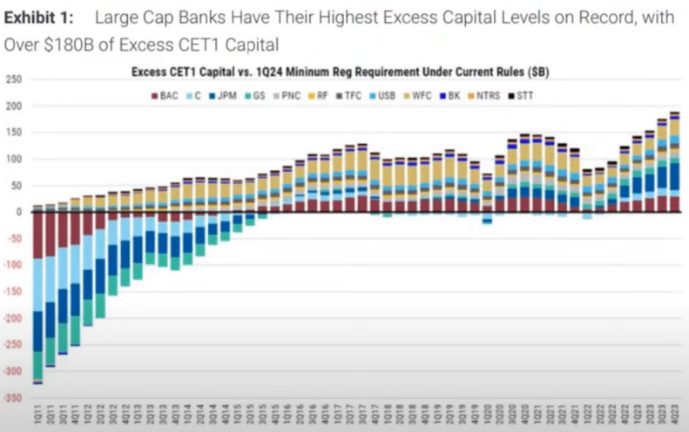
-
Broadly, inflation is still going down. But housing is up, headline at 3.1% instead of expected 2%.
WM CEO James Fish: We always raise prices because there is always some type of inflation - YouTube
Credit squeeze 2024. Less cash in banks becaues it's in money market funds, and isn't available for loans. Savings from pandemic government measures are spent. Auto, credit card loans at 20%, sapping savings.
How much debt expense US has, and might start to think longer term interest rates should go up. - Gundlach
Economy is more vulnerable under rising rate than falling rate regime. Under a falling regime, companies in trouble might have to pay more on a spread basis, they're paying lower interest rates. They can refinance and take money out and reduce their interest expense, which prevents defaults and supports risk assets.
Rising rates, maybe those companies will have to default.
The 2-year is telling us we'll get 100bps of cuts within 2 years. Gundlach
MSCI Cuts Swath of Chinese Stocks From Indexes as Market Slumps - YouTube
Nvidia briefly overtakes Alphabet as third-largest company by market cap - YouTube
Japan Slips Into Recession, Clouding Central Bank Rate Path - YouTube
“$600 Million” - Jeff Bezos Strategic Move to Miami - YouTube
Seattle to Miami. Will save from Washington States's new capital gains tax.
Money is moving into the same sectors (tech). 25% last quarter. Concentrated.
Misery Index (has been worse 80% of time since 70s)
ppi vs cpi (have a lot of components, and have to look at the trajectory of each of those components)
household net worth is in the 96th percentile
cost of capital (not higher than 2009 or 2012) (business consideration)
What will the terminal rate be, rather than when Fed will cut. When their costs will come in for longterm R&D.
What we're hearing from earnings, and what the CEOs are saying (they're slowing down in labor practices). How to use AI and supply chains (haven't been that bad considering shipping prices).
Hardest year to have a macro outlook - Drukenmiller. Not the hardest, always difficult - E Burton
How Ghost Kitchens Went From $1 Trillion Hype To A Struggling Business Model - YouTube
Lithium prices plummet on slowing EV demand - YouTube
Canada giving Ukraine over 800 drones worth $95 million | Power & Politics - YouTube
Made in Canada.
(Not new money. Part of $500m Trudeau said last year. Total amount to Ukraine like 2.4b.)
Company behind Stanley tumblers faces lawsuits over lead - YouTube - Feb, 2024
- Feb 13, 2024
-
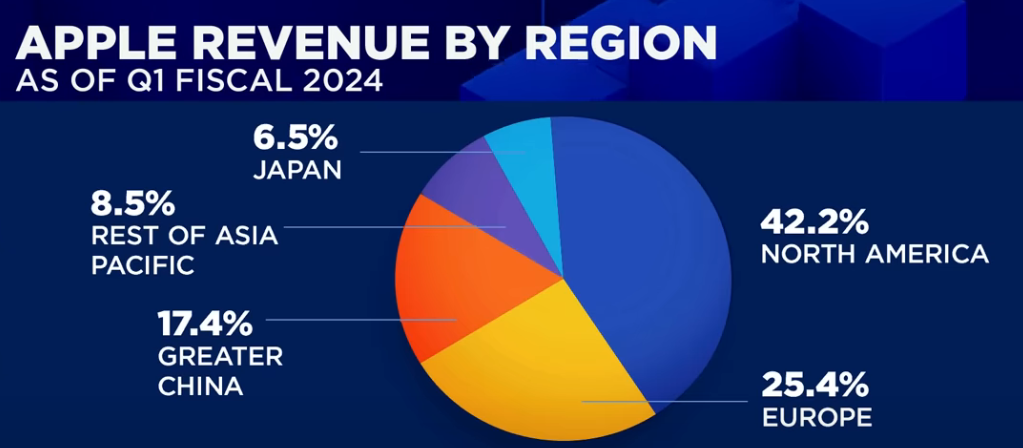
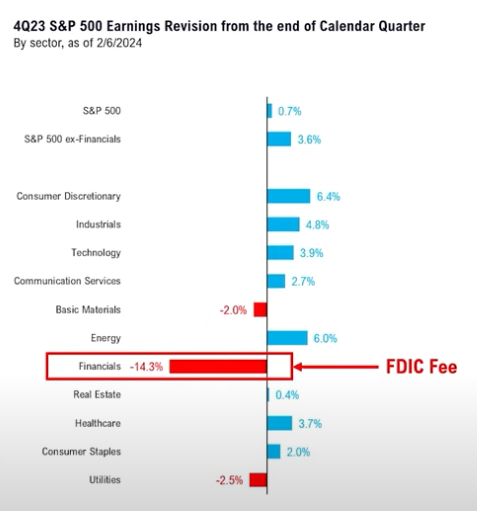
-
When Nebula sells, all the creators then get a payout.
China itself is now looking at offshoring factories outside of China.
China’s Consumer Prices Drop at Fastest Pace Since Global Financial Crisis - YouTube
Negative inflation -0.8% for CPI. 4 months of negative inflation. 16 months of producer prices deflation.
They need (manufacturing and infrastructure, because home investment is weak now) investment momentum. Maybe social housing construction.
Policy credibility is low after lockdowns, less expectation about the implementation, positive incentives for government officials is low. Doing nothing is more incentivized. Cash to low income families to support their consumption suggested by analyists.
Lots of top officials in China replaced recently. Securities regulator since 2019 on his way out. This is often associated with a boost in stocks. New guy is a discipliner. ‘The Broker Butcher.’ Government will maybe go after malicious short selling.
Year of the Dragon, ‘most auspicous’, just started in China.
The year of promoting consumption.
Hermes has a wait list who've been waiting several years for a call saying they can buy a bag. So we can expect their customers will never be seen to dip, because they can just call the next person on the list.
Chinese stocks, when will sentiment change? Need systemic change for any rally to be sustained (if there were a rally now investors would be selling into it probably). Other EM markets are looking pretty good (and their potential story is more understood), competing for the international fund flow. SKorea and Japan have corporate governance stories. American big tech only has real forseeable solid business plan. Chips and AI.
Nvidia looking to build out custom chip segment: Reuters - YouTube
Big companies have been looking at/starting to build their own chips for themselves, but Nvidia is saying hey we're already building chips, and we can build your custom chips for you cheaper. More specified chips.
Off the Charts: Nikkei hits 34-year high - YouTube
White House investing $5 billion in chips: Here's what to know - YouTube
X Inks New Deals with WWE, BetMGM - YouTube
Nvidia passed Amazon's market cap.
Since last Jan up from $200 to $750. Valuation though is lower than before, at 33x (Amazon is 40x, META is 23x).
Best capex going, but other companies have the same market.
ARM is up 100% or so in the past few days.
Delaware's corporate shake-up: Billionaires take aim at the state - YouTube
Nevada, Texas.
Ontario brewery receives onslaught of online hate after hosting Trudeau - YouTube
Why Direct-To-Consumer Companies Like Casper, Allbirds And Peloton Are All Struggling - YouTube
DTC brands have to keep themselves on people's radars constantly, which means continuous ad spending. Ad spending on Facebook and other platforms has gone way up over the past couple years. 10 years ago the first DTG brands had no competition and cheap ads. Now there's tons of people trying this and even competitors for the same target demographic, and then also ad prices have gone up a lot. Right now that looks great for Facebook, who raised its cost per impression 90% in 2021 (Google did 100%). But what happens when these companies stop trying?
Warby Parker, the quintessencial DTG brand, did glasses, where there was no competition, and started right at the start of this all. But they started making brick and mortar right away. Shops with their products and brand. Also, their product is just cut out for this model, because glasses you can just mark up a lot from what they're produced for.
Peloton pivoted to selling in big box stores. Some of these DTG companies had to make changes along te way.
Birkenstock, Chewy also did well.
‘When I’m on social media, I want to be able to purchase your product right then. When I'm walking by your shop, I want to be able to purchase your product right then.'
USA fundamentally gave away manufacturing to overseas during the 60s and 70s.
Machine versus machine is equal USA prices to China prices for manufacturing. Labor is different. (We don't know how much Chinese factory workers make.)
The supply chain doesn't exist in the USA becaues it hasn't done it for years.
Through laws, USA government is funding manufacturing (chips).
China is still the most efficient place to produce.
If China continues to be a security threat, other countries will continue to try to look elsewhere.
Startups Are Shutting Down! - YouTube
Nontech companies that were made to look like tech. Old businesses repackaged to get billionaire investments.
People hoping to repeat some profitable examples like Facebook.
AI was the only bright spot last year. But the economy is doing just fine, labor market is tight, stock market at a high.
Creative destruction of bad business models is a part of the capitalist system, but ‘zombie companies’ have been propped up for a while artificially with banks etc.
‘The deeper human connection is going to be the edge in AI.’
Spikier print on inflation. Consumer prices up 0.3%. People talking now about higher for longer, more. The labor market has reportedly broke though. I also have not yet seen any reason to slow down on rates. You have to break something in the economy and destroy wealth/money to make dollars worth more, right? You have to have people wanting to work balance out the money to pay them, right? It was an artificial inflation, and the deflation has to mirror it, right? But I'm still invested, because you have to do what you think people will most likely do, not what they should do. ... Another way to look at is that the Fed has made the right choice (so far this year in not cutting rates).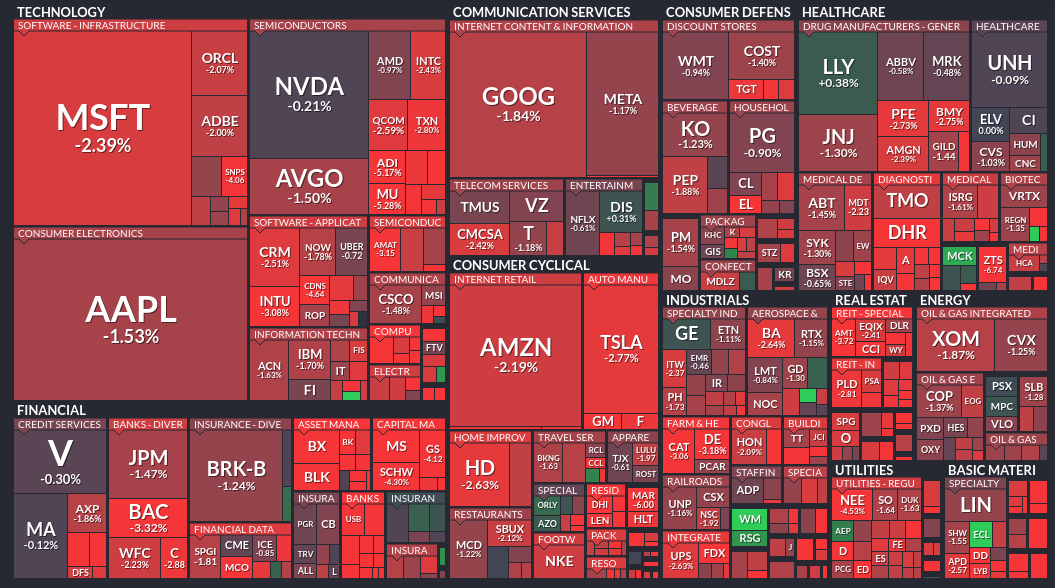
‘It seems that the Fed is not finished, perhaps.’ So we might stay higher for longer and have that recession after all.
Some people at the start said you should raise rates high and fast, to snap something to a break, and then return to normal. Then the economy, which was running at the level people wanted it to, would not break it's trend and people would continue in their habits. ... But if you prolong a different situation, a different economy, people will modify their habits and behave, longterm and habitually, a different way.
Probably the Fed is not as suprised about the print as the market. The market is coming closer to the Fed, maybe .
However, people are now using their savings to pay for things.
How 2024’s Record Retirement Numbers Could Spark a Recession | WSJ - YouTube
Alberta’s honey industry is a buzzing business - YouTube
Romance scammers target Americans - YouTube
Maybe private equity will lose, as they can't compete with cash. - Feb, 2024
- Feb 05, 2024
-
Everything was reinvested in bigTech companies, but now Facebook just announced a dividend. Apple does regular buybacks.
It means they're probably not going to do moonshots, not going to just do acquisitions that don't make any sense (which is not working also nowadays because of govenrment). ‘We’re really focussed on shareholder value.'
An aspect to Zuckerburg/Congress/Governments is that once you get a certain size, you've ‘won too much’ and people will start pulling you back down a bit. Big Tobaco. Pharma. Big Tech. We have an easy consession, which is age. 15 or 16 maybe, for social media.
High housing prices force wildfire victims off Maui | DW News - YouTube
Doctors unionize as healthcare services are consolidated into corporate systems - YouTube -
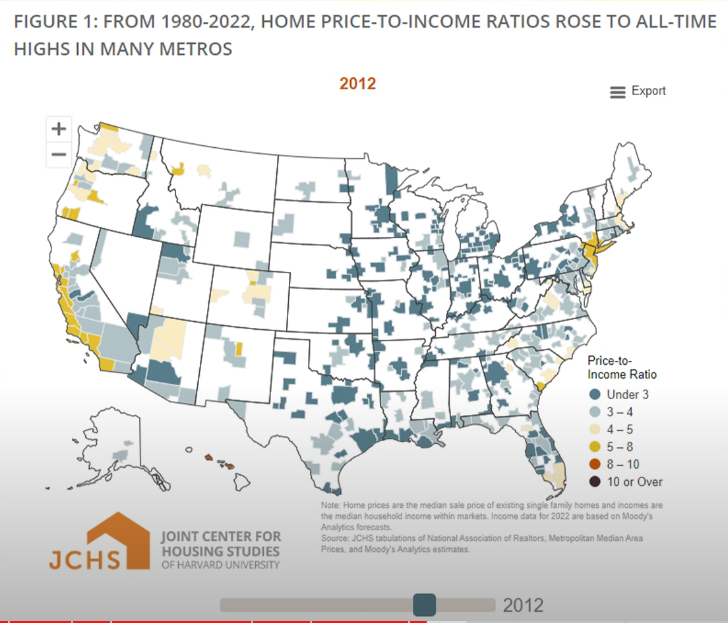 Bottom of real estate market 2012
Bottom of real estate market 2012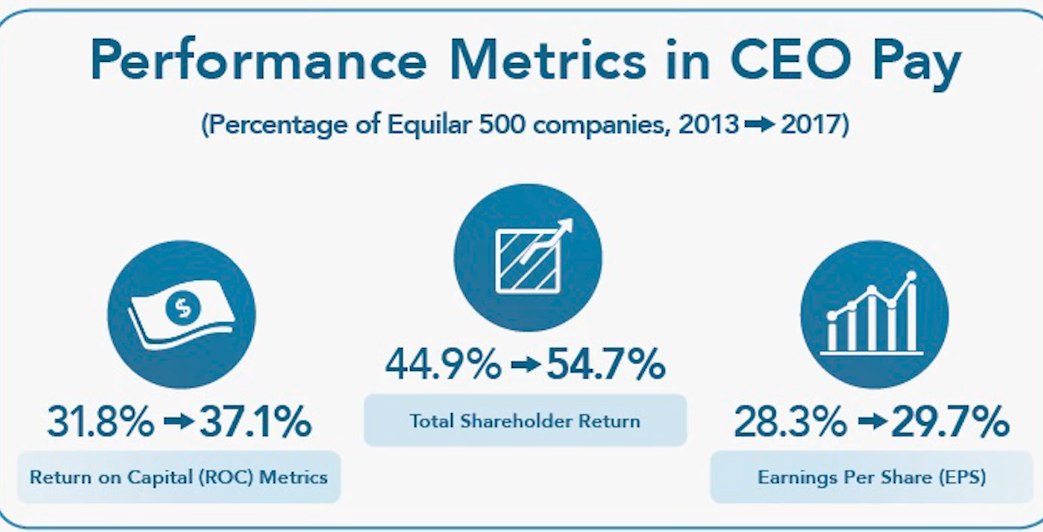
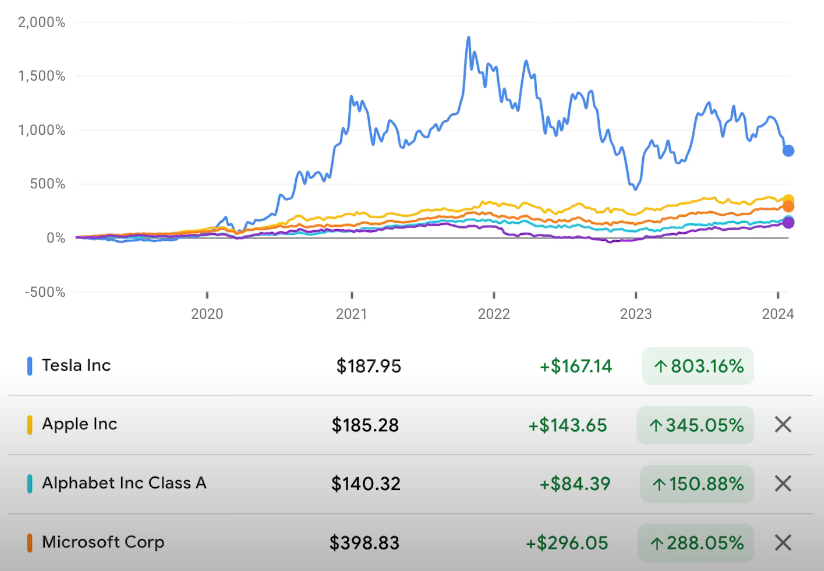
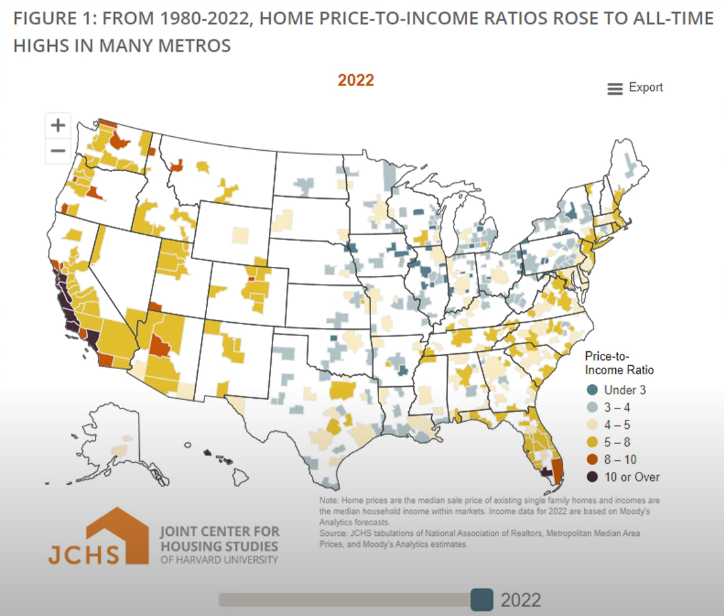
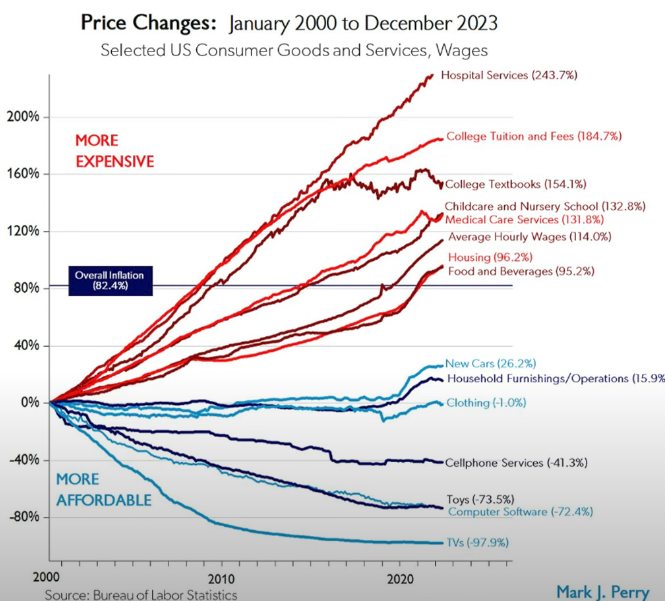
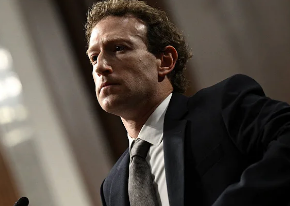

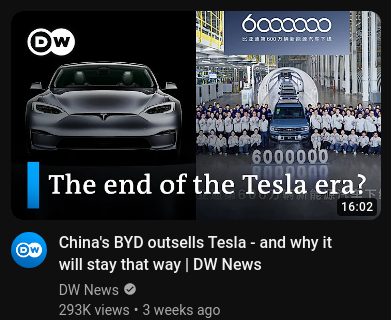
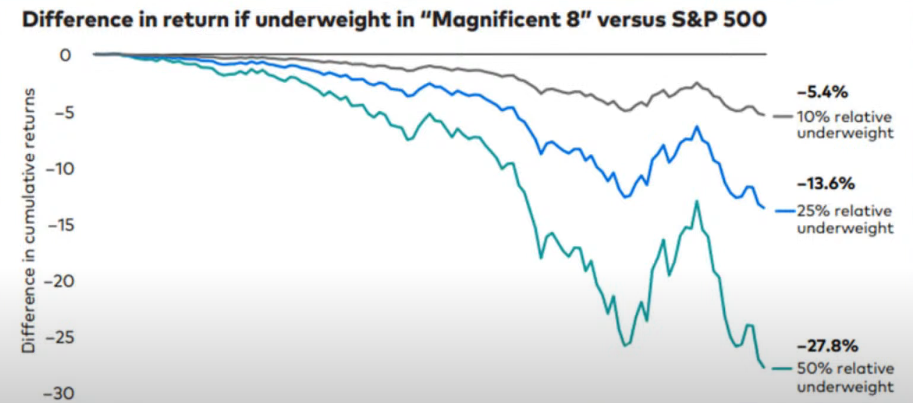
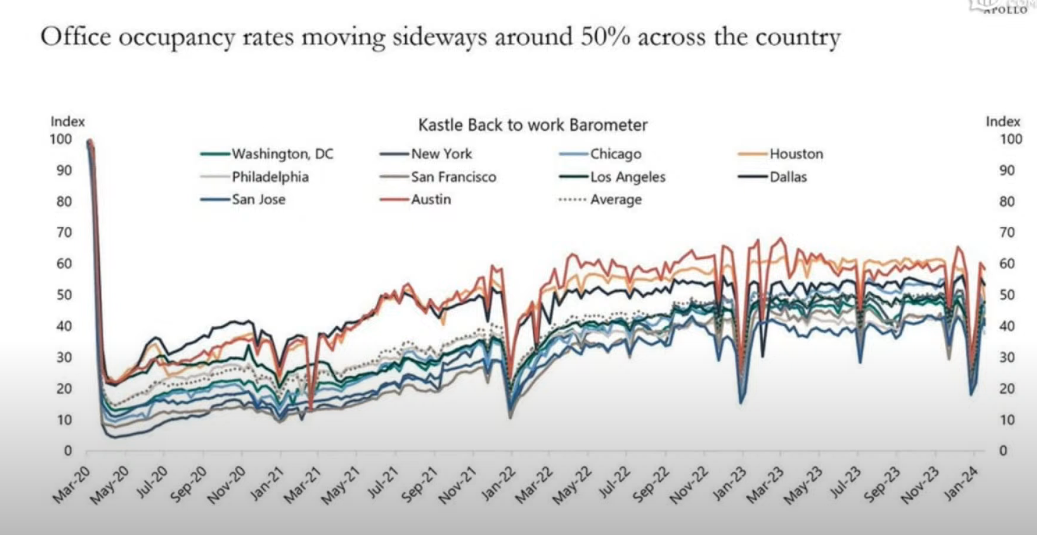
- Jan, 2024
- Jan 30, 2024
-
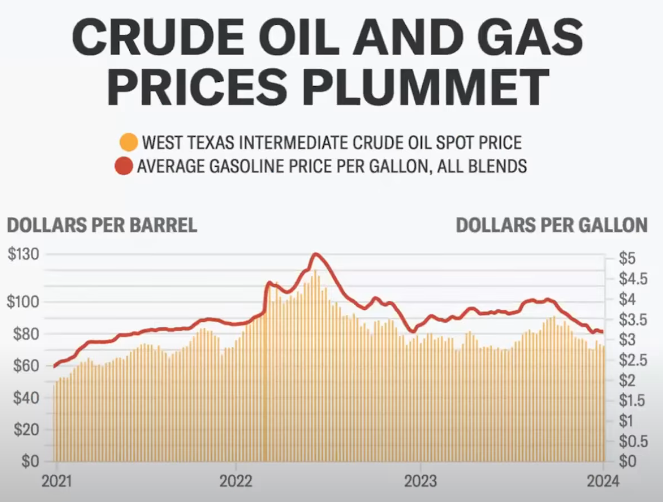
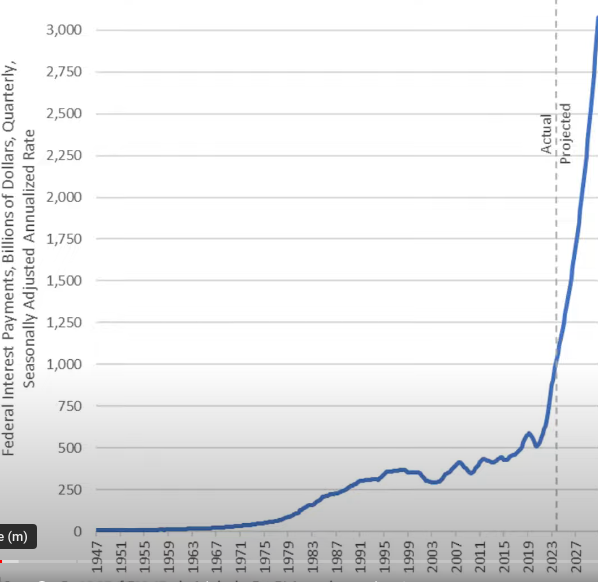
- Jan, 2024
- Jan 26, 2024
-
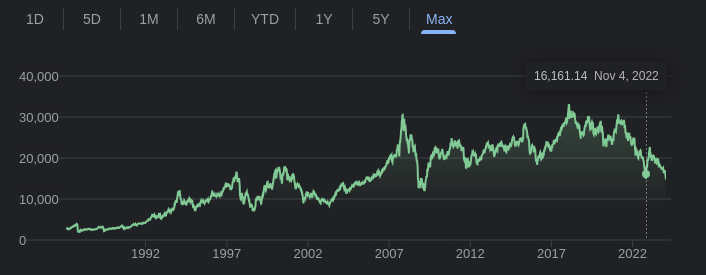
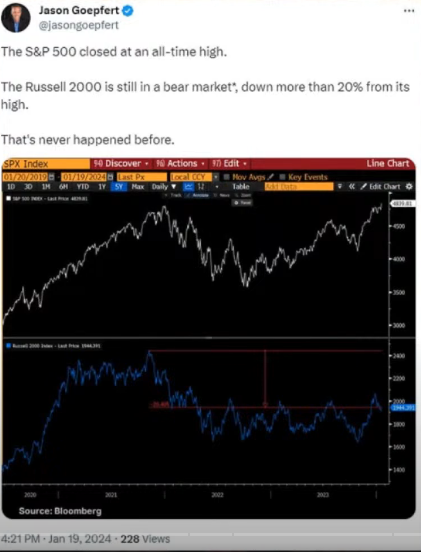
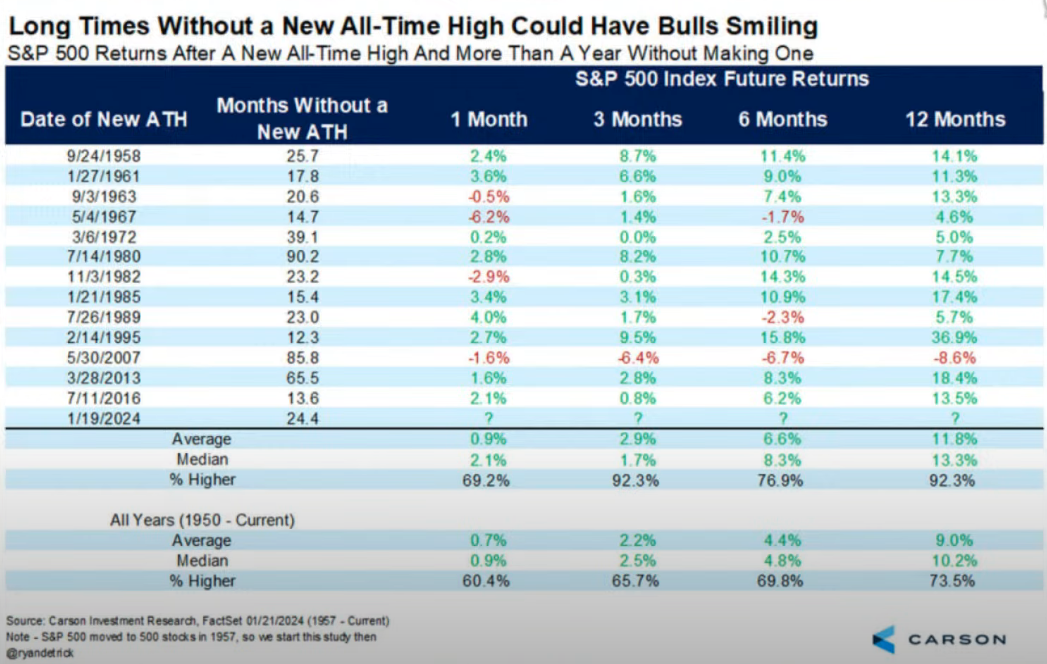
-
China stock market has fallen near it's earlier bottom. They reported 5% growth, ‘hitting' the government's target. Doubts. If they stimulate their yuan will depreciate, and they don't want a weaker exchange rate. China faces a lot of headwinds, and Xi doesn't really believe in the free market. State owned enterprise valuations. It would be so interesting to gets news about and follow events in China, but there is no such information made public. They buy 12m barrels every day, 8bcf of LNG every day, 40% of their food every day, and they have to buy it in dollars. WIlling global trading partners. CEOs there are moving their supply chains out of China, the majority, reportedly.
They have 100m vacant apartments and condos. $57t in banking assets, $2t in banking equity. Local financing market $13t, 90% of the market is in default (?). Estimates of $4t in real estate losses.
Everyone very pessimistic on Europe. They've saved their stimulus, though, and debt a lot of it is floating rate, and so they've already suffered the shock of rates. Also, they've already had an energy shock.
Google pulls back on Moonshots - YouTube
S&P new high. Almost always when that happens, 12 months later you're up. This is market behaviour, not random (but not necesarily related) historical data, Compound said. 746 days since last new high.
Netflix up 20% in past 3 months, recently boosted by deal with exclusive WWE and surprisingly higher subs. They have no M&A intrigue. No activists. No linear decline. They don't have to focus on sports. Their TV shows have done well, not so much for films so far. They made 100 new series in 2023. Other streamers did like 10 or 15. Other platforms are now selling on to Netflix.
Stock picking. Have to get the fundamentals right finally this year, say some. Because NVDA and APPl are both the same multiple, but Nvidia is making huge revenue percentage increases and is expected to continue, while Apple did 5% increase. Earnings reports to follow will show what the company's fundamentals are doing. Texas Instruments was quick to meet supply chains and so is now in like 4 quarters of losses, while other companies this is still or never to come.
United Airlines CEO publicly criticizing Boeing, and mentioned they only have one other option (Airbus). Limitation of duopoly producers.
FTC scrutinizes megacap's AI deals - YouTube
Essentially bankrolling their own businesses.
Comes back to them through credit for services
2/3 of startups run out of cash in 2024/25 or something, so lots will sort of fold, freeing up talent to join other new projects. It's mostly the junior devs who are being replaced by AI reportedly.
U.K. suspends trade negotiations with Canada - YouTube
UK wants more access to Canadian cheese and Canada isn't going to give it. It's a supply managed protected sector (policy now but law is in congress right now to possibly pass).
Mass EV adoption is a lot harder than early adoption, says former Ford CEO Mark Fields - YouTube
Spot bitcoin ETFs move away from original ideals of crypto, Beam CEO argues - YouTube
Financial institutions are getting more influence over crypto. The core promise of crypto was that people are in control of their money. So far there are no products that uphold the values of crypto at the same time as being as easy as buying an ETF. Centralizing.
Even if the institutions are negative in terms of trading power for value, structurally they add liquidity to bitcoin and allow it to function better. - Jan, 2024
- Jan 22, 2024
-
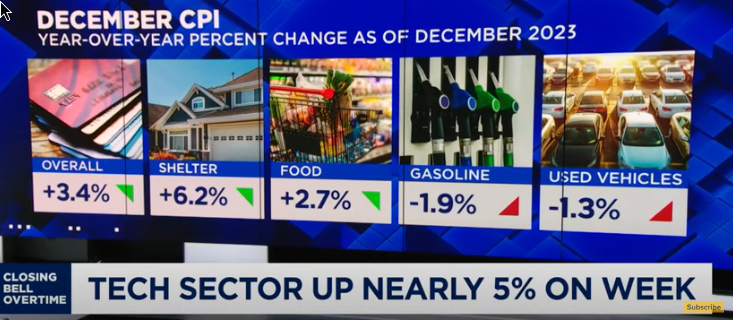
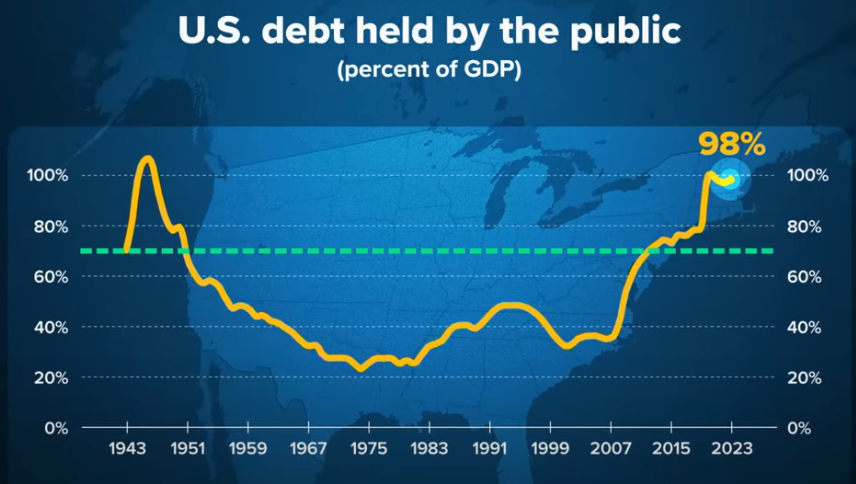
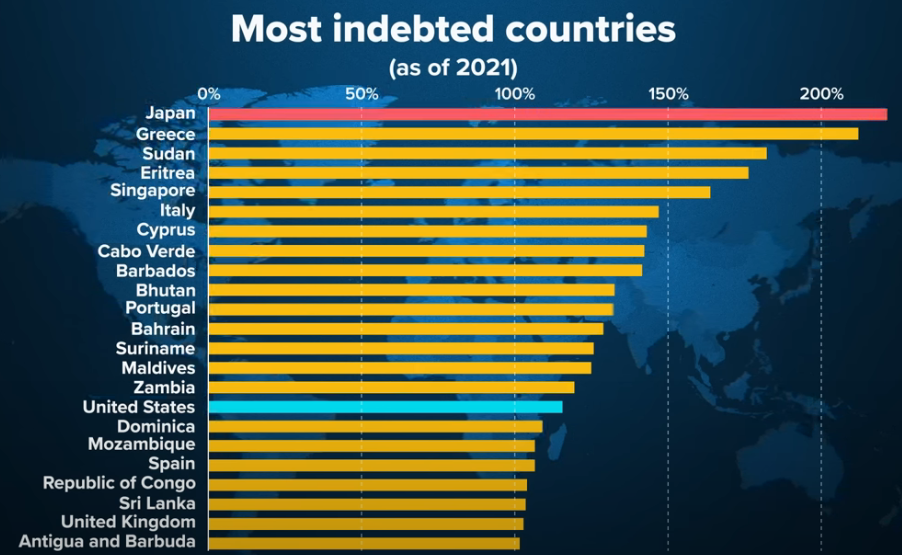
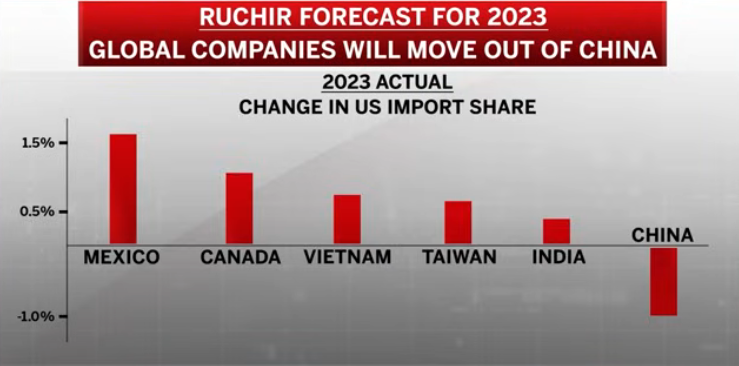
-
Consumers have reached a point where they don't have the incremental spending power: Clarence Otis - YouTube
2 years of inflation. Winding down of inflation. Efficiency instead of hiking prices. Maybe have to work harder at it.
VanEck CEO Jan van Eck talks SEC approving bitcoin spot ETFs - YouTube
We have a clearer idea how Bitcoin is valued, how it trades, how it is bought and sold.
😱SHOCKING! Charging My Electric Car Costs 2X As Much As GAS!😱 - YouTube
?
Costco opened its 6th store in China, massive lineups. Costco has been successful in every market they've moved into, even frugal Japan with small spaces and not as much carry transport maybe. They love moving into terrirtories of the middle class. ... Lots bought a giant US-cartoon-famous bear. Costco is limited in the amount of stores it can open in China because of lack of qualified managers, reportedly.
Netflix may have won the streaming war. It has something for everyone, it cuts across every demographic, they have significant growth drivers, strong engagement. Like the classic bundle.
Lots of YouTubers posting videos about ‘quitting YouTube’. YouTubers have no alternative platform. Some have come up but been attacked by YouTube etc, it seems. However, the sentiment has been there for a long time that vloggers/broadcasters are forcefully kept on YouTube's platform.
If a company has a 30 or 50% profit margin (or more), that's a sign already that it's a monopolistic business, because in a competitive market you can't have that. A mutual detante with your biggest competitor.
The best churn rate is Netflix, who will lose 40% per year. Disney and Hulu maybe 50%. Starz and Peakcock and Paramount, like 100 or 140%. But that means NFLX needs 100m new people per year. Facebook and Google benefit because that's where the ads will appear. Without fresh content, people will churn.
YouTubeTV subs is doing really well. Without a box, on your phone or any device, you can view the old offering set. Will YouTube win? - Jan, 2024
- Jan 08, 2024
-
Barclays downgrades Apple: Here's what you need to know - YouTube
Tesla Deliveries Meet Estimates, Falls Behind BYD in Sales - YouTube
World's richest billionaires add $1.5 trillion in wealth during '23 after losing $1.4T in '22 - YouTube
Bitcoin soars to kick off 2024, topping $45,000 for first time since April 2022: CNBC Crypto World - YouTube
Bitcoin is driven by global liquidity: Marathon Digital CEO - YouTube
When it's risk off or when people need to sell a bit of their portfolio. Or when they want to avoid a volatile investment.
Costs to mine, during the halving, low to mid $20ks is breakeven. Marathon went from 7x a hash to 25x.
Government might delay or reject the ETF, or might approve it.
YouTube now has one or sometimes two non-skippable ads before videos quite frequently. This is beyond what even I am willing to sit through. I found an alternative so no ads play, something I didn't want to do, as I recognize ads as the way to fund publishing, and am generally against adblockers. However, this is too much, and YouTube has dominated the market for online free videos, partially through unfair anticompetitive measures, and are about the only platform. If they were one participant in a rich market of online videos, or if they didn't have what I now consider way too much advertising for the offered product, I would not have to do this.
Amazon, I bought a laptop there, and after they already completed the sale, retroactively went and ‘froze’ my 5-year account (so their customer service couldn't even ‘see it’ and help), and wanted me to phone in to verify, a certain manipulation of leverage to violate privacy. Note that this wasn't before accepting the contract of sale (which is anyone's right), but after they already made the sale. I will use Amazon as little as possible henceforth. I can but things from Walmart, computer manufacturers, etc.
Note that Amazon also manipulates their reddit sub. When you post something, they have an auto-reply saying you may only post complaints on a given thread on a certain day called ‘meltdown’ (as if any complaints are the fault of the customer who just can't handle things). They don't say the post is removed, so you think it's published. But if you view their page in a private browser, you won't see your post because it's not public.
Why Everyone is Abandoning GoPro - YouTube
How cheap it's going to be to copy an existing business in 2024. - Chamath. Create these really cheap
and then basically attack the existing big business which have just a lot of upside-down economics because they've taken on so many costs, employees. GPT can replicate this for free.
Pro sports franchise/enterpirse values peak? - Chamath. Live Tour versus PGA forced PGA to merge. Country SA bought Christiano. College athletes will be making millions. Uptick in churn at Netflix.
BTFP, used to bail out regionals last year, supposed to be a temporary program of 1 year, but banks might not be strong enough to survive without this funding (impaired comercial debt portfolios, and until the yield curve deinverts).
GPTs, the request time length is way too long (30 or 90 seconds versus should be milliseconds), and the cost of credits is too high.
Will decline in military resources and appetite for spending resources lead to an increased risk of nuclear weapon use? - Friedburg
Many AIs and they might value down 70 or 80% this year. Just like having 15 search engines.
Competition is coming on in software engineers, with AI. - Jan, 2024
- Jan 02, 2024
-
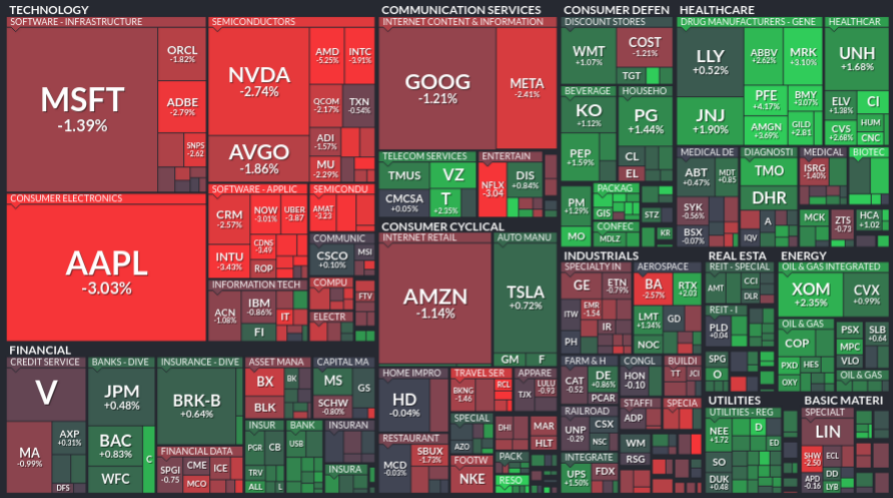 Tuesday, Jan 2, first stock market open day of the year. Looks like people can take gains in BitTech, and rotate to their ideas for 2024.
Tuesday, Jan 2, first stock market open day of the year. Looks like people can take gains in BitTech, and rotate to their ideas for 2024. -
From FedEx to airlines, companies are starting to lose their pricing power - YouTube
Finally?
How Creators Monetize Poverty - YouTube - Dec, 2023
- Dec 29, 2023
-
SPY had is biggest incoming flow. Partially rebalancing of some big fund. QQQs saw a big outflow same day (they sold the DOW).
Trading Floors Make a Comeback in Japan - YouTube
BOJ changed monetary policy on government bonds, and this meant a return of volatility.
Alcohol sales underperform when cannabis is available, says Cowen's Vivien Azer - YouTube
The studio at Paramount is the 'asset' that people want in a merger, says Puck's Matt Belloni - YouTube
Everyone thought there were all these subscribers out there. Turns out it was much harder. - Matt Belloni on Netflix
Sports, you're renting those rights. The payment of $2b is coming up to Paramount for NFL.
Apple stops selling some Smartwatches Online - YouTube
Apple initially talked about hiring or licencing from Mossimo, but ended up just hiring about 20 of their developers to just work on Apple's prodcut.
Average age of farmers in US 55, in Japan 68. Highest rate of suicides in UK is farmers. Agriculture. In the US, more people study public relations that agriculture. Nobody wants to be a farmer. Get hot and dirty all day.
Americans have $1t in cc debt. They payed $120b in interest and fees last year.
Half a billion in rewards getting forfeited or devalued. Bait and switch.
Why Wall Street Is Rushing Into Private Credit Market - YouTube
A mix of who has the money (credit lenders) and who has the relationships (the banks). Symbiotic relationship coming? The banks act as a bridge, because you have no idea how to call Blackstone. How do you manage the underwriting process, the terms of the deal, when a default happens. Those have to be worked out.
Tencent loses over $43 billion in market value after China proposes new online gaming rules - YouTube
When you see clients start buying individual names, that's when things begin to rally. - JJ Kinahan
Tesla removes Disney+ after cursing out Disney CEO: why automakers removing carplay matters - YouTube
So all Tesla owners who want their kids to watch Disney in the back seat can't? (Not saying it's a bad thing for them, just for Tesla economics.)
The average holding period for an individual investor is 10 months. Mutual fund 2.5 years.
Masimo CEO Addresses Smartwatch Patent Dispute With Apple - YouTube
$1.3t inflow into cash in 2023, BofA said. Record. Also, $177b into US treasuries.
REITs are the best sectors when rates are coming down. WELL, senior living part of the real estate sector.
VIX at a 5-year low.
OpenAI IPO for $100b? Went from $20m to over a billion in revenue, reportedly.
2023 The Financial Year in Review - YouTube
Dimson research from a couple years ago. Majority of stock market returns come from periods of falling interest rates.
US Pending Home Sales Index Holds Steady at Record Low - YouTube -
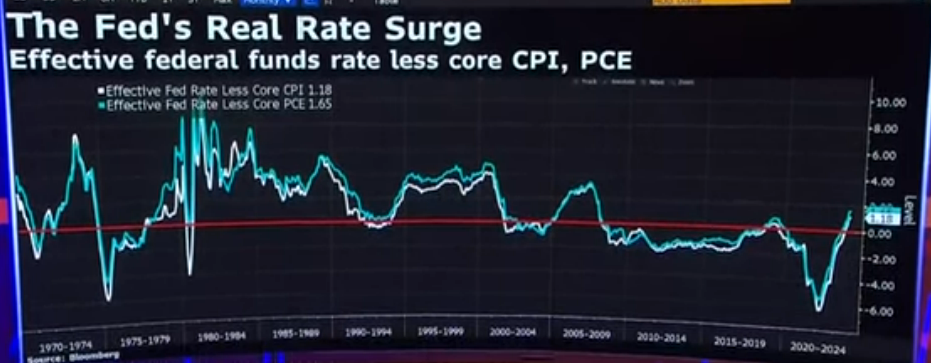
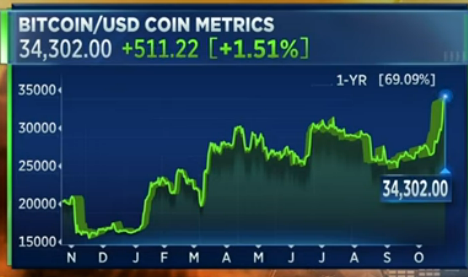

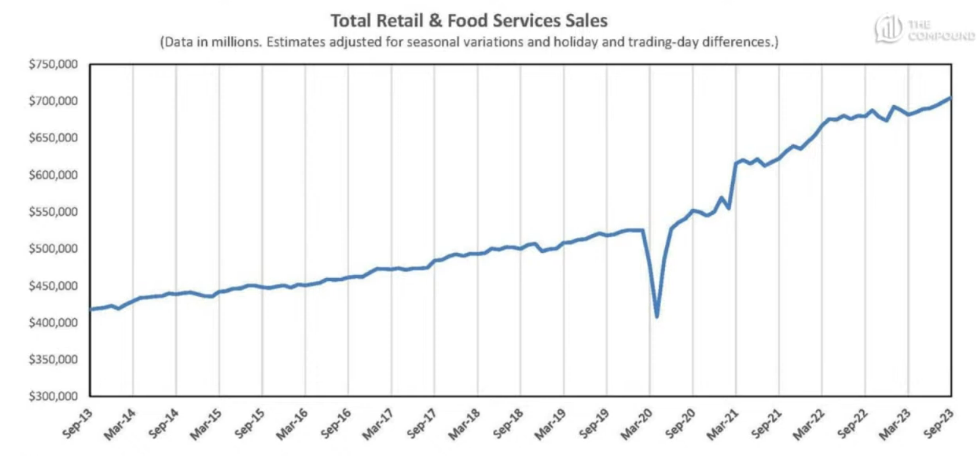
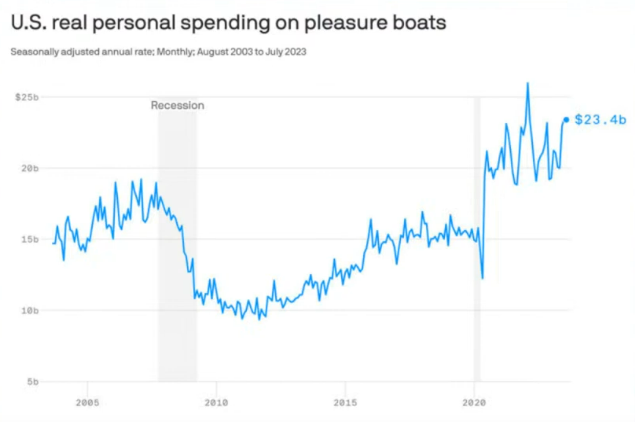
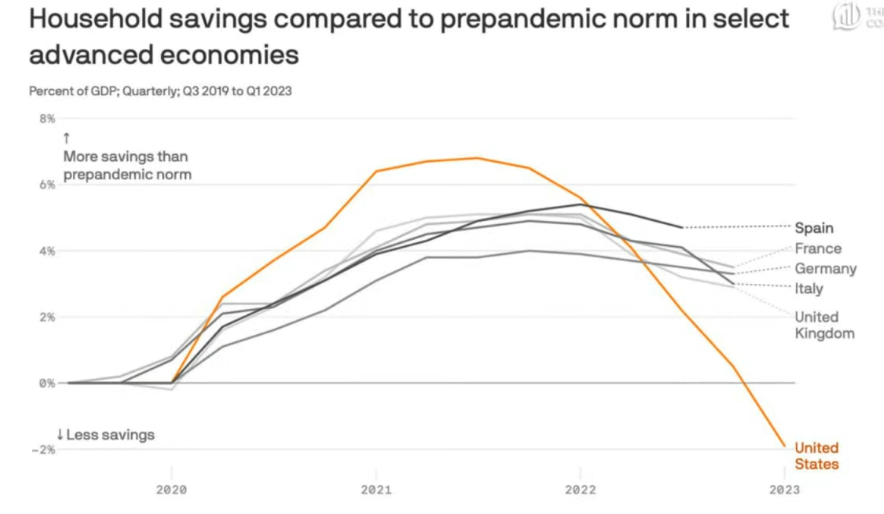
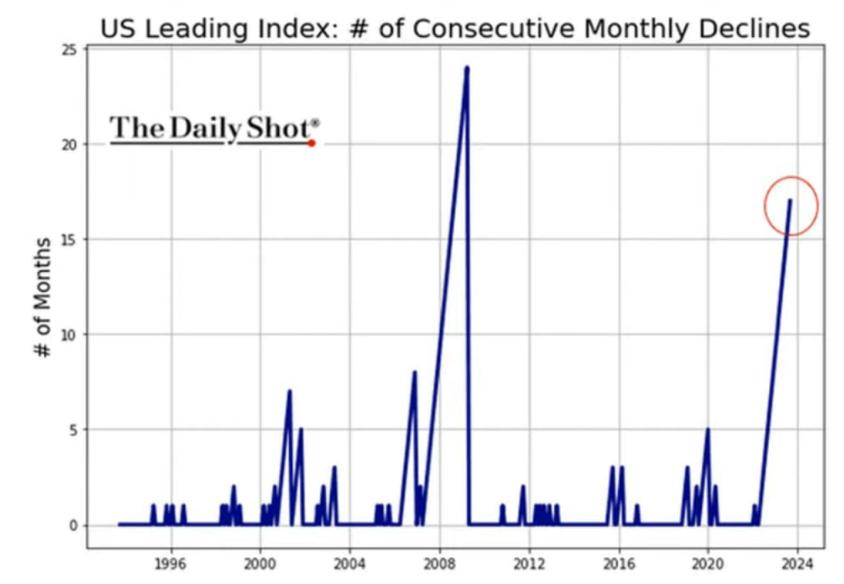
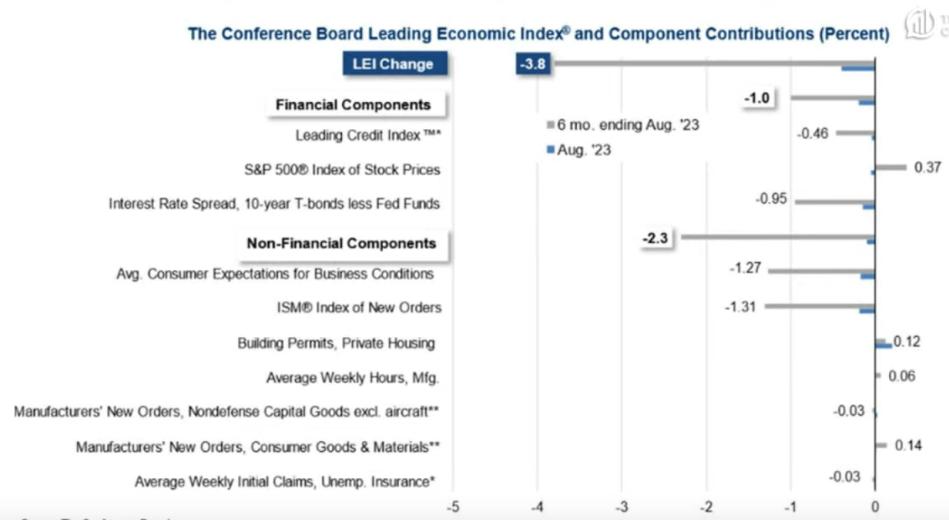
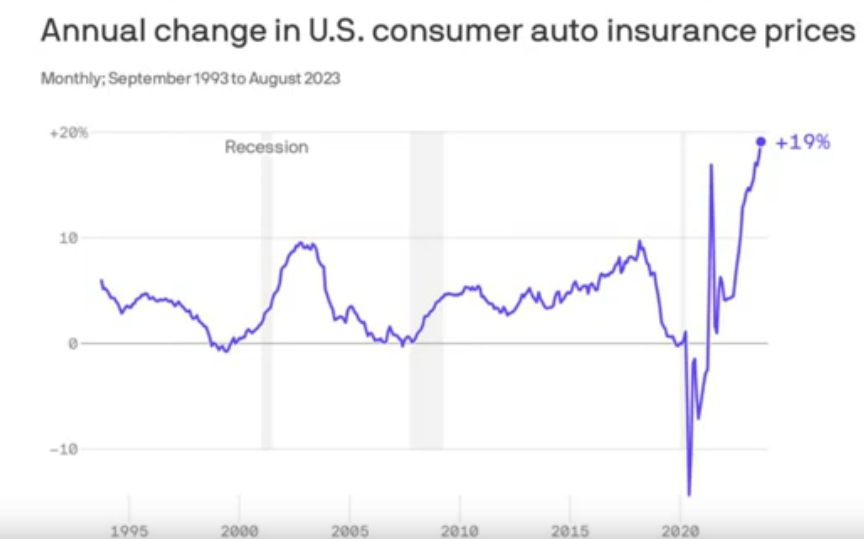
-
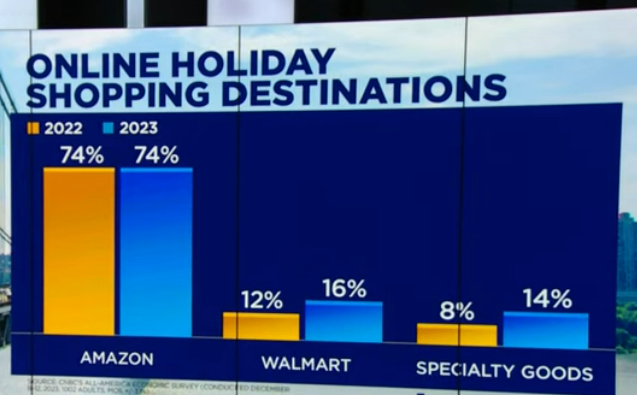
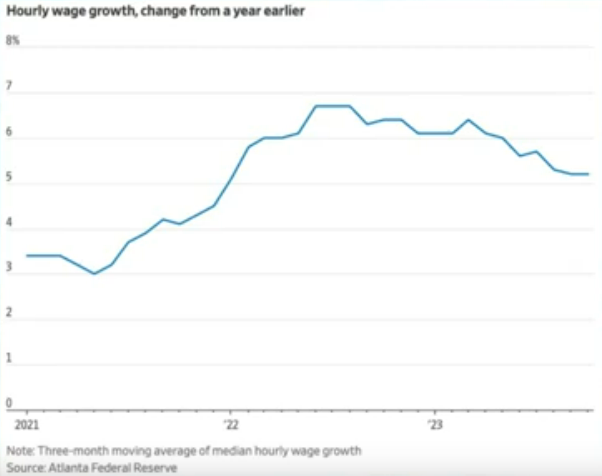
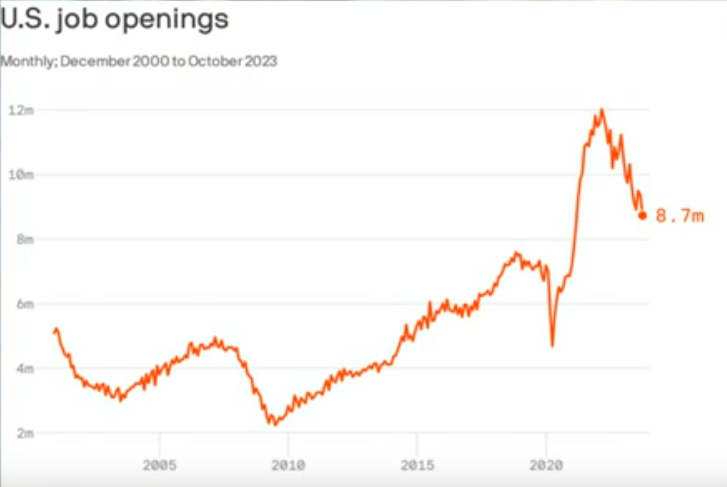
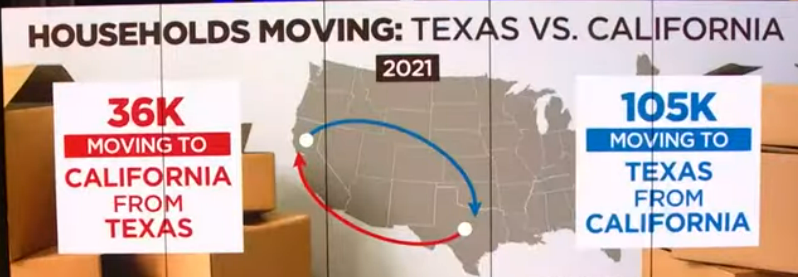
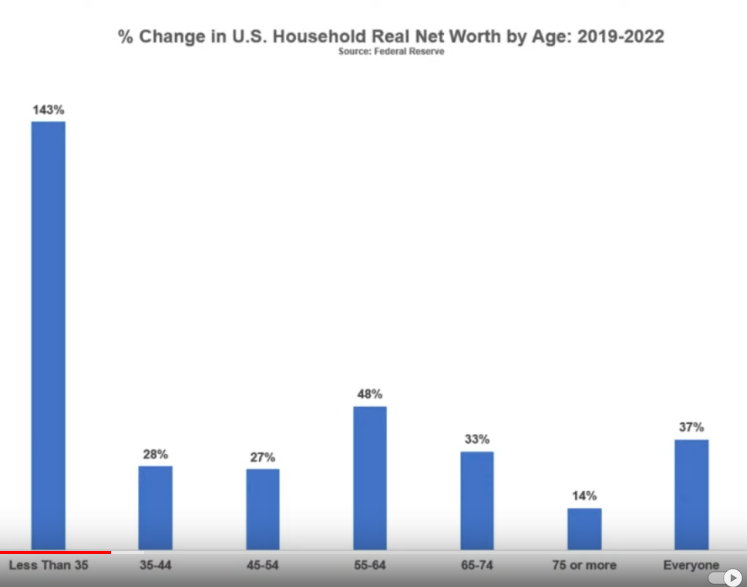
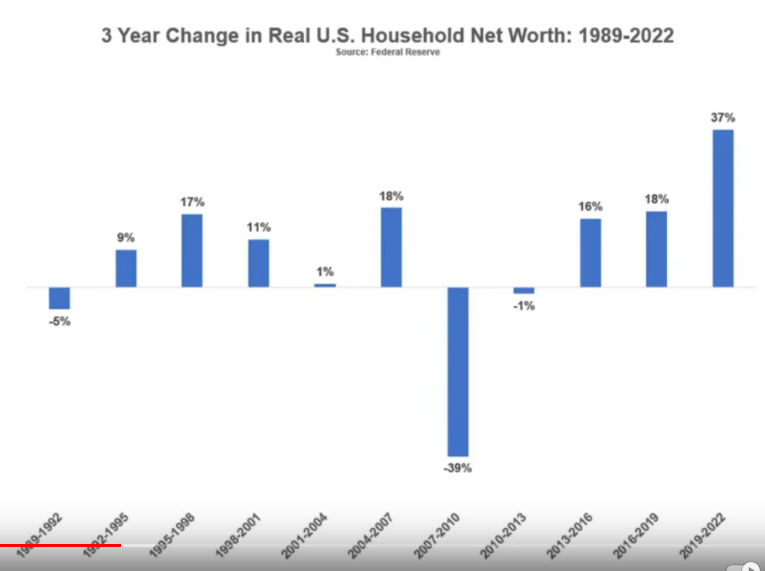
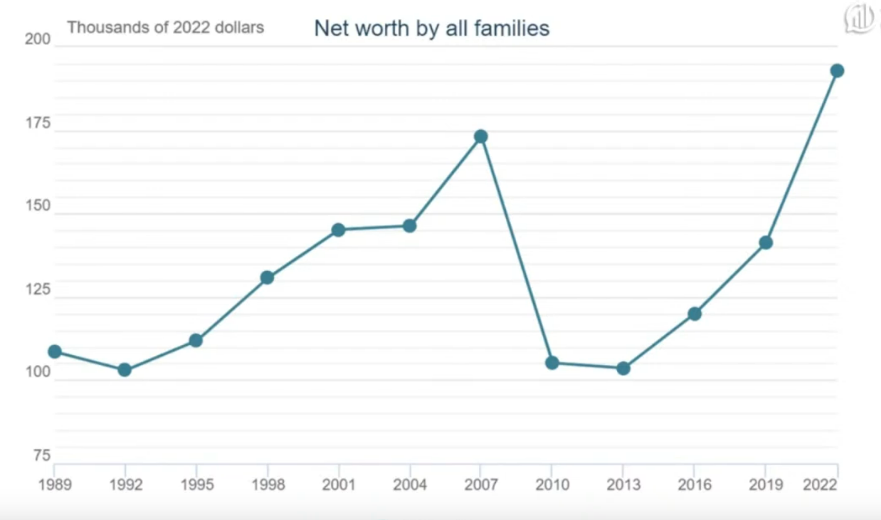
-
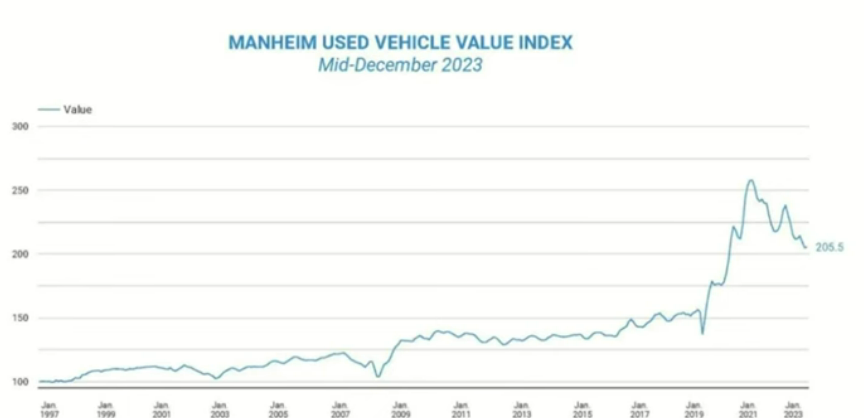
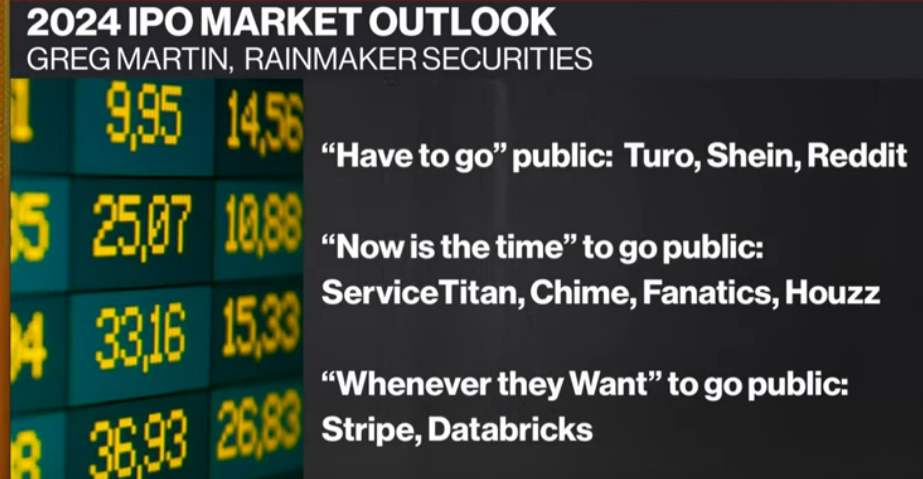
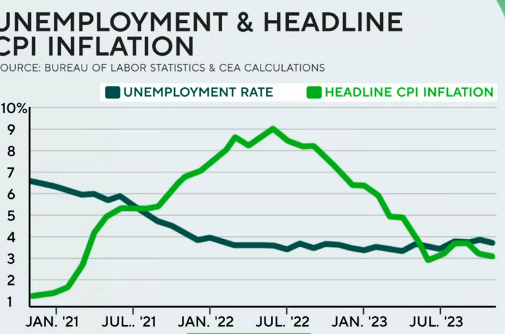
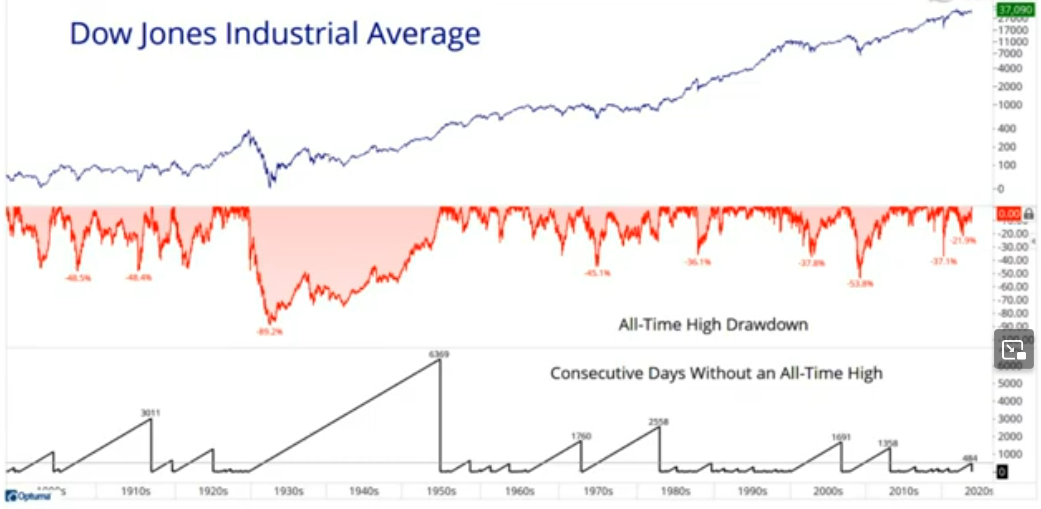
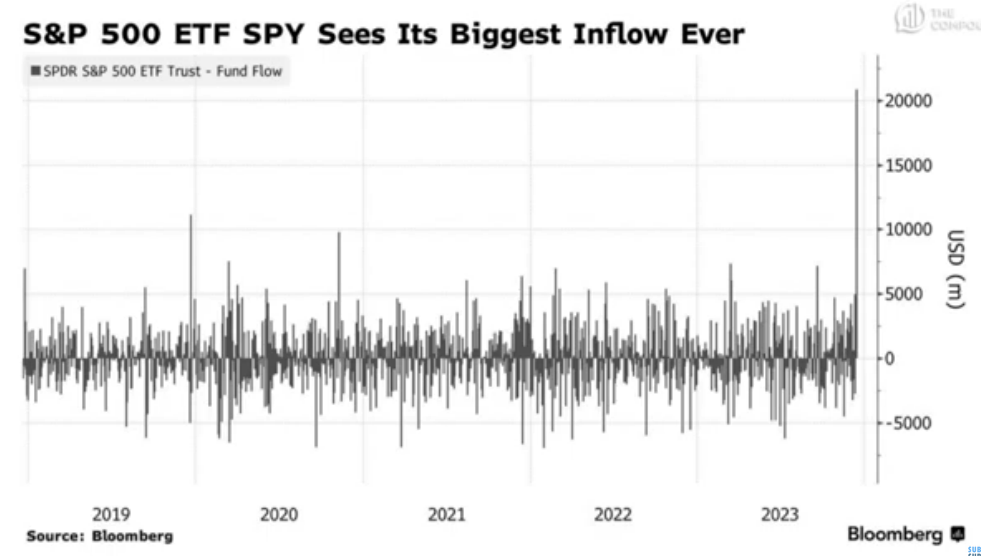
- Dec, 2023
- Dec 21, 2023
-
2023 the supply chain and the bulwhip effect really created that initial inflationsurge, and then the media helped fuel this idea that inflation would be sticky, which allowed people to raise prices, and people to demand wages. But as that psychology broke, that cycle is now drifting lower, even expectations. - Tom Lee on what many ‘pundits’ got wrong about 2023, saying the reason was that they had only ever experienced at best the 80s frequent inflation, but never an inflation like the 70s. They focussed on a single analogy. 65% of largecap fund managers are missing their benchmark right now for 2023, way above average underperformance (usually about 55% are missing).
2024 Fed is no longer flighting an inflation war so it doesn't need to be hard on stock market. Instead it just wants to keep the business cycle healthy. That gives them room to cut rates. We're in an earnings recovery cycle. Economy is shifting more towards goods, which helps S&P earnings. Europe and Chine might recover, so earnings backdrop is quite good. People are in cash and will see they could have made way more money if they'd just stayed in the stock market. So market is well supported. Tom Lee.
But there could be big changes. It might not be as narrow. If probabiliy favors market expansion you overweight small caps. They're very cheap relative to S&P right now. The 10 year has a lot of room to come down, and that should bring down mortgage rates, so be overweight groups leveraged to mortgage rates or a recovery in housing, like regional and largecap banks. Financials have a balance sheet recovery, a credit recovery, and even maybe improved demand for credit because pentup capex. (People had been cautious and underordered and didn't expand, but then when the hard data is correct they have to start spending again, which is upside to Industrials earnings, but also helps Financials because capEx is consuming more credit. 2024 a backend loaded year, more money made in second half. AI momentum might go away (timing gets pushed out). Tom Lee.
Calling smallcaps, which have been a drag on portfolios the last few years, ‘zombies’ is an ‘unfair characterization. The Russel has always had only 70% of its companies profitable. So that’s not a problem if companies aren't profitable because that's always been the nature of the index. What matters is macro, like retail inflows. If people are taking money out of the stock market, they're not putting money into any Russel small cap index, so that's why there's been such a drainage out of smallcap and collapse of valuation. P2B is same as bottom at 1999. They have higher cost of money and are generally more levered, so this tight money has punished smallcap businesses. Soft landing isn't good for smallcaps but expansion if it happens is a huge tailwind. Tom Lee.
Financials are underowned. Positioning is lowest in 10 years for hedge funds. Tom Lee.
Technology companies are going to grow earnings faster than S&P, and multiples don't have to contract for Tech. It's just there's less juice in the thesis because there's less room for surprise. You only sell Tech if there's going to be a hard landing and then companies would slash capEx (but then you just want to be in cash). Tom Lee.
History reading is the most important way to understand society, but it's also helped create thematic research for us. Demographic studies. (Crypto disruption, millenials' dislike towards banks.) Labor shortage and AI. Listening to credit and internals. Inflation at the 32-component level. Tom Lee.
Bitcoin is the most secure way to move money. No fraudulent transactions in 15 years of their ledger, with banking 6% are suspicious. Tom Lee. You've never had a downcycle in crypto when Fed is easy.
- Dec, 2023
- Dec 19, 2023
-
Devaluación del 50% y fuertes recortes, las primeras medidas económicas del Gobierno de Milei - YouTube
#Argentina
Jim Bianco discusses Yesterday’s FOMC Meeting, Reaccelerating Inflation & Financial Conditions - YouTube
Current bull market, it seems to most. Sentiment is good among investors. Bianco says it might be premature, because if there are market gains people who made them will spend that, feeding inflation. Or has the Fed enacted an economy-cooling method that only slows down the poor while investors do fine?
‘Economic projections cannot be the only driving focus of your portfolios, because everyone last year was calling for a recession.’ - Marta Norton
Pair it with valuation, base case economic scenario, and the range of economic outcomes.
‘People were fooled by the yield curve at the start of this year, thinking we’d have a hard landing. And they didn't want to fight a Fed, but they're forgetting the Fed was fighting an inflation war, not a business cycle.' Tom Lee
'Improving liquidity, as investors took $240b out of stocks this year.'
$6t on money market funds.
All-in Podcast:
(9:29) Jury rules in favor of Epic Games over Google: How to handle the app store duopoly?
(23:21) OpenAI inks deal with Axel Springer
(35:02) FCC cancels Starlink subsidy, dissenting FCC Commissioner says federal agencies are targeting Elon Musk on Biden's orders ('A pattern of the Federal government harrassing Elon and his companies, and it all stems from Biden at that press conference saying ‘We gotta look at this guy.’
(58:25) Alex Jones reinstated on X
E157: Epic legal win, OpenAI's news deal, FCC targets Elon, the limits of free speech & more - YouTube
FTX files revised proposal to end bankruptcy and return billions to creditors: CNBC Crypto World - YouTube
Economy will slow 'substantially' next year compared to the current pace: Marathon Asset's Richards - YouTube
‘Year of the refi’. High-yield bond market, leveraged loan marketplace, private credit, all doing 12% plus this year. Credit has performed well. 2024 will be similar, but there will also be very strong volumes. M&A has been down. But as rates come down, it will unleash M&A and private equity.
Consumers will refinance into lower rates. Auto loans and mortgages. Corporate refinancing. - Dec, 2023
- Dec 12, 2023
-
‘[T]the real rate of interest, which is what impacts the economy, keeps increasing as inflation declines.’ - Ackman
More people moving out of Austin than in, first time. Some are moving from Texas to Cali. Although 3x that amount are moving Cali to Texas. House prices in Austin are up, so a house might cost the same in SF or Austin now, and taxes are different (Cali has prop13 to protect against high prices(?). Austin still has no income tax though.
The last Fed hike and then a cut is actually bearish.
Vol only works as in indicator, when it's high, extreme.
Pfizer to discontinue twice-daily weight loss pill due to high rates of adverse side effects - YouTube
Pharma is the biggest advertiser, because they want to be able to shape news coverage, and they influence news coverage, because they're the biggest advertiser.
The rules of TV entertainment news are pretty harsh.
Nov a buy-everything market, stocks and bonds.
Last 10 years Tech has compounded at 16%, non-tech at 6%. Matches earnings for these two. We're back on trendline for Tech versus non-tech.
U.S. oil production is a 'real problem for OPEC', says top energy analyst Paul Sankey - YouTube
Saudi will decide.
Bitcoin doesn't have a lot of buyers at the bottom. When it gets high it gets a lot of buyers.
The Fed has 'basically become a giant hedge fund', says former World Bank President David Malpass - YouTube
It borrows at 5.4% from banks and dumps it into government bonds, so govtthinks its better off than it is, which encourages it to be short when rates were zero. It's a risk for USD.
A floating rate loan from banks to the Fed. Banks can get squeezed out for this. We're relying on private equity. I banks weren't doing this loan to the Fed, banks could consider small business loans and things that are thought to grow the economy. All the major Central Banks are doing this. Allocating capital to government will slow growth, thinks Malpass.
Not balanced. Small borrowers (who would like to borrow at floating rate) have to borrow at short end. Wealthy can borrow at long end.
(There's no money printing. It's all money borrowing.) - David Malpass
Moody’s cut China’s credit outlook to negative on rising debt risks - YouTube
‘Fed is paying people not to take risk.’
Citi is cutting ‘5 layers of management’. How many layers were there?
‘The same factors that delivered better than expected growth still intact.' - Julia Coronado
Better productivity, better labor supply. Fed has ammo and can cut rates 100bps. If we uninvert the yield curve that can be a positive tailwind for growth in the second half. ‘We’re in the soft landing' and there's another cycle to come.
But there are lags in monetary policy, rates are very high, money is tight and could start to bite. Housing in deep freeze.
Trade settlement going from 3 days to 1 day in US. It guarantees you got the things you bought, sooner. It's guaranteed by someone in the middle for now 1 day. ‘Counter party risk.’ But banks don't get to keep that spread for 3 days now.
Netflix released their numbers, in order to look good? - Nov, 2023
- Nov 30, 2023
-
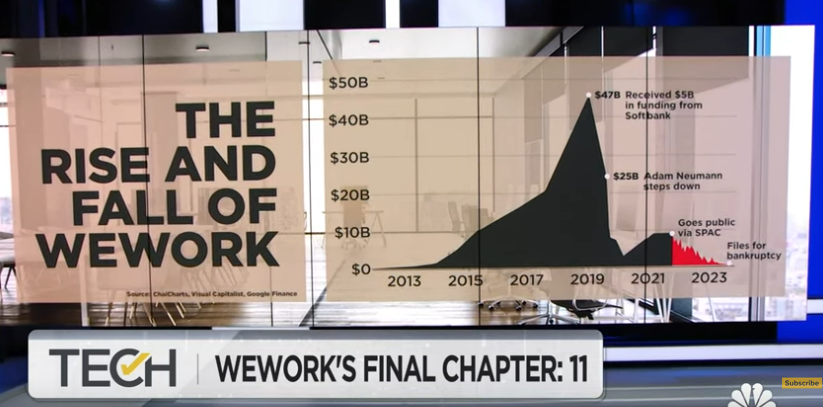
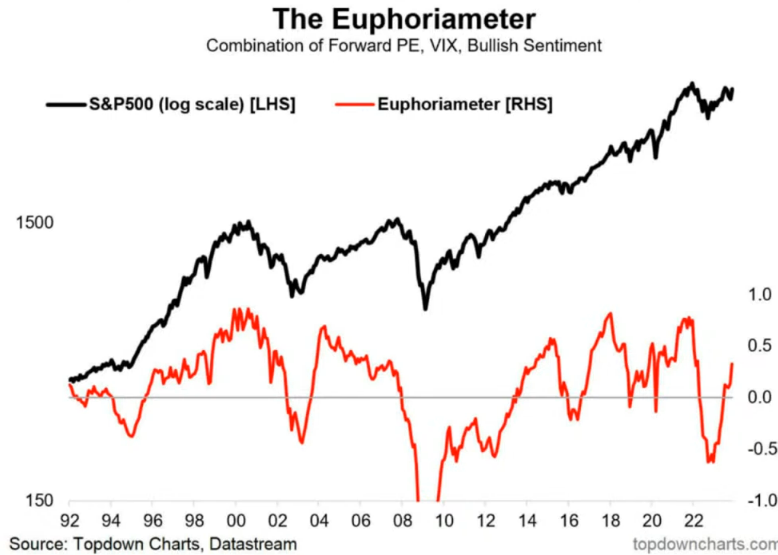
-
Berkshire is holding record cash, can't seem to find anything they value buying. They have it in short term security and buybacks.
Is there just a lot of money nowadays and a big investor is less useful? For example, all the new companies get bought at too-high prices, more fail than Buffet's traditional model (or even a model of overall viability), but some have success?
The economy was supposed to be much weaker. It's not. That's why when the market moves, the marrative shifts to fit that price action. - Misra
Fundamentals are holding up in Qs. Tax loss harvesting occurs everywhere except the megacaps. Buybacks will be strongest in megacaps. Megacaps have least sensitivity to cost of borrowing.
Retail traders aren't trading as much. Not great for RobinHood, Schwab, who had been pushed to highs. Can they build a base of wealthier, long term investors who want to use their product? Retailers have learned it's tough to earn on the market, and that this can eat away at their returns.
118 day Hollywood writers strike over (tentative deal still has to be signed). The impact of the strike will be seen rolling. Shows that they didn't write were put off, so will be shown later, next year. How will the industry be on the other side of this? There's a question about if you strike too much there may not be any place to strike from. Writers will get bonuses for hit series though now.
Disney cut back production costs $27b to $2b, so the cost of several projects. Others doing the same. End of content bubble. It's hard to screw up sports, some say, but you gotta figure out how to do it.
Disney parks are more expensive now so sort of target more affluent customers.
European gas inventories are almost 100% full.
Berkshires costs are up 40%.
https://www.youtube.com/watch?v=TvE9hsCb4V0
Same quarter or quarter before Berkshire moved stocks.
Buffet's taxes were stolen and leaked.
This was done by ProPublica, whose business model seems to be significantly just going after wealthy people who have made money (legally). Buffet has a long resume.
More tech layoffs announced.
China. Visitors there need WeChat and DiDi (WeChat pay requires Chinese bank account) to do simple things like pay for taxis (report someone had to pay 100yuan instead of 30 because the driver didn't have change. They had to go to Chinese bank to open an account for WeChat, which required a Chinese phone number, so they had to acquire that from a Chinese telecom, which required a Chinese ID number. Because they were foreign passport holders, they had to buy a 1-year telecom package.
Some hotels reject foreign guests unless they're registered with the public security beaureau.
Canton Fair: 80% Drop in EU/US Buyers. Instead, new customers are from Belt and Road countries.
https://www.youtube.com/watch?v=G1FkCGSDhPU
Unions aren’t about money to the workers, they're about control, said Ron Baron. He said the TSLA stock went down yesterday because Biden said should unionize, Tesla. The other automakers have unions. It's true that there's little way for a government/large organization to influence a mass of individual workers but can deal with a small committee that controls those workers.
https://www.youtube.com/watch?v=Or1JV2MImyg
https://www.youtube.com/watch?v=89HtxizfEdc
Rating stays the same at AAA. This is outlook. The rating doesn't have to do with the economy or workers or productivity. The issue is politicians.
https://www.youtube.com/watch?v=-KxWeupa6U0
https://www.youtube.com/watch?v=LThIM974gjc
Costco made new highs
Walmart. Target, after plummeting during the year, has been flat since September. The difference is Walmart sells groceries (and US has been in inflation). Anecdotally, someone also said Walmart loves lowering prices and Target hates doing so. Walmart consumables, Target discretionary.
There was a big rally November 14, basically everything green. Russel was up like 4.5% while other indexes were up like 2 or less. Smaller names had big jumps in stock price, while the most famous tech names were just regular up days.
Ford lost $62k on each EV it sold last quarter. Lucid lost $227k per car sold last quarter.
https://www.youtube.com/watch?v=NnjjmnivQnc
https://www.youtube.com/watch?v=EJeMmRV7B-0
https://www.youtube.com/watch?v=XEKPUARYckc
Might be some point here about acoutability being proveable in AI and less so in people.
Possible white-collar recession
Airlines have ‘become banks’, selling airmiles to CCs. SWA announced their points will be worth less next year. Lots of points out there.
Right now, domestic travel is down. Still lots of international.
Inflation decrementing at 20basis points per month. Middle of 2024 core CPE might be 2.7 or 2.8 with Fed funds at 5.5. Fed might think it's oversteering.
“Stock pickers paradise” - BofA
“Delinquincies are just coming back to normal after the pandemic.”
Rates. Went from ‘almost too accomodative’ 0% to 5%. Which is different from like 3% to 8%. Also consumers and corporates prepared for higher rates, and locked in obligations at low rates.
Argentina, if it changes to dollars, it needs how many actual dollar bills in the country? It currently has a shortage. Is tying its economy to the US economy a good thing? In future it will be constricted in using monetary policy to buffer against changes in the economy.
Lebanon did incremental rollout of dollarization, starting with certain sectors or businesses.
Homebuilders still doing well, although DIYers down. The pros. Partly because no one is buying new homes.
https://www.youtube.com/watch?v=ZuAy0TFQOAk
‘I understand his animus towards Bill Gates for shorting his stock, because that really was a move to try to shut the company down. I don’t understand the same animus towards advertisers who decide to no longer advertise on X because they don't like what's there and they don't want their brand associated with that.' - CNBC host
‘It’s a very bad choice.' Musk on the 2024 election prospects, a sentiment agreed with by many. No one is impressed really with any candidate (perhaps in the general population, because their rallies seem to have supporters).
Auto dealer inventory piling up, discounts will be there.
People are paying a lot for house and vehicle, but that has an easy fix, which is monetory policy. - Tom Lee
- Nov, 2023
- Nov 04, 2023
-
https://www.youtube.com/watch?v=K0t6g7RdOoE
Bonds have shown that they're bad hedges against inflation. We haven't had inflation in 40 years so everyone forgot about that. - Siegel
Stocks are real assets, just like real estate is.
Luxury market. Wines and spirits puchases down. Some watches prices going down.
The data the Fed is looking at is changing.
Americans' savings almost gone, while in the rest of the world pandemic savings are still high. How reliant is the consumer to overnight interest rates, and if the answer is ‘Not very,' ...
Costs for United. A flat cost assumption for 2024. Costs up 4-5% yOy. And every 1 point of cost is $1 of EPS on $10 of EPS for 2024. New labor contracts and aircraft delays. 8-10 year restocking cycle (also in Defense). Oil prices up.
El-Erian #philosophy
The market has lost the Fed/policy as an anchor (guide) because it's data dependent (backward looking and dubious). Technicals also not an anchor because the market lost the reliable buyers (Fed, China, institutional investors who are under water, Japan).
Short term, the inherent stabilizers of the market aren't there now. The people who, every time the market went down, would come in to lock in those interest rates (who have been buying and watching the valuations continue downward). The market is hunting for buyers of conviction.
We know supply is gonna go up. The Fed is going to offer more bonds.
(Excessive) data dependence is ridiculous because it means using tools that have lags. The notion you are looking at a forward-looking economy in inherently inconsistent.
He said previous Feds had taken a forward-looking view instead. Controversial at the time, but it was critical in anchoring the markets.
“Permacrisis”
https://www.youtube.com/watch?v=raZxiN0uy1Q
https://www.youtube.com/watch?v=PfHycqsG7bs
Higher rates don't matter to many people. Answer to the question why the higher rates aren't really affecting the economy.
Morgan Stanley saw about 50% less money coming into accounts than the year before. The year before, everyone was making 1% on their cash and they could be making 5%, so they all called and made money moves. Now everyone's sitting with 5% and there's no fomo from equities.
Tax loss harvesting in October. Mutual funds want to clear losers off their books before the tax cutoff (October), so they are willing to sell even at an 80% loss when the stock is only down 70%. After October, those sellers have left the market, and this leads to rallies in these low-quality stocks. They go up Nov through Jan.
Bitcoin. The spot ETF is back in the news, and bitcoin jumped again, up about 20% to $35k. It had been as low as $17k last year. When it rose to $70k during Fed money printing, it was tracking with the stock market, drawing considerations that it was tethered to the market now. But this year it has gone up 100% from lows, and up the most recent 40% (from 25 to 35) while the market has not gone up really much (not a risk on tech market), so it appears to be not correlated now. Fink called it a ‘flight to quality’. TLT is down about the same as bitcoin is from their highs. But people aren't buying TLT.
Pompliano called bitcoin the most disciplined central bank in the world, because no one bails it out. If the Fed approves an ETF, that might be good for bitcoin. If the Fed bans bitcoin, people might buy it because they'll really think it's not inside the system, and isn't controlled by any government.
Luxury brands have come down from their highs (last march, 6 months ago), stocks down about 30 or 40%. Sales are back in line with tradition. Hermes is down 12%. Most discretionary items most vulnerable. Champagne sales down for first time in 3 years.
Chanel flat bag is $10k. 4 or 5 years ago, it was $5k.
Most buyers of luxury are not wealthy. They're upper middle class that like to splurge. They currently don't have all that extra cash.
https://www.youtube.com/watch?v=zG_l_7bCR8g
Rich-cession. High earners filing for unemployment. Credit. They're looking at the stock market, which is their holding. Many companies survive because of rich people spending, and all that is driven by the stock market. Top 20% by income account for 50% of spending (?in the economy or just luxury?). Their spending keeps the economy going, keeps companies profitable.
Tech giants and Financial companies (Wells cut 11k jobs ie 5% of their workforce), which had made headlines for laying off thousands of people at a time last year, has stopped doing such layoffs.
Do inversions predict recessions, or do they cause recessions, as Arnott said?
Recessions always start with an economy that's booming. It's the nature of the peek, said Arnott.
People are talking about bitcoin and equities being ‘the safe asset’ because they've lost confidence in government bonds because of the nature of this interest rate risk. El-Erian
Real estate. 7% interest rate for loans for good credit applicants. Homebuilders are paying sometimes 10-11% now, which may lead to restriction of supply and raise rents.
https://www.youtube.com/watch?v=1iiIUoVFNbY
SBF said he bought the Miami Heat arena as advertising, because he didn't believe in Facebook ads, and it was considered a 19-year advertising investment, so it would be 1% of FTX's revenue.
‘It’s t-bill and chill for people at upper end of wealth spectrum'
https://www.youtube.com/watch?v=PhyHchGE3N4
The 10-year at 5%, reflects uncertainty about how high the Fed has to be. If inflation weakens and unemployment picking up, the Fed will start to cut, is what the markets will think. Tom Lee.
If the economy slows but consistent with soft landing, that's ‘bad news is good news’ but if it's a sudden slowing because we just ran out of gas that's actually ‘bad news is bad news’.
$2t a month a gross issuance.
Inflation might be below 3% next year, said Rieder. However due to government borrowing the long end might not come down. He thinks we'll get a normal curve soon.
Consumption is 70% services in the US. In 100 years there's only been 14 negative quarters of negative growth in services.
China has been tightening over the past year, at various levels including nationally.
The return to office has stalled - JPM guy
What worked in low interest environment (last decade) may not work now, in high interest. Sea change, according to Howard Marks. Teslas were cheap, solar panels were cheap, when financing was low, but cost many percent more now. The companies if they want to keep sales figures have to lower their price to meet consumers' purchasing power. Over the past week or so, Marks, Barrons and Ackman have all publicly advocated bonds to degrees. Siegel also thinks the 10-year is near the top.
McDonalds reported well-higher revenue because of higher prices, but traffic was actually lower.
https://www.youtube.com/watch?v=XupM5_zHDbM
https://www.youtube.com/watch?v=mWiW6gE2cmY
Canada talking about higher for longer. Unknown what will be the thing people cut from their personal budgets, if rent/inflation continues and wages grow less quickly, what will be the things not purchased?
https://www.youtube.com/watch?v=JN9u-lRkXXE
Families in the US on average are 40% wealthier than before 2019. Investments and real estate. The biggest demographic is under 35, who are like 150% wealthier (no other demographic is anywhere close). Do young people have a work experience completely different from any other generation?
Net worth may be irrelevant to peoples ‘happiness’ because you can't spend a house or a 401k. Prices are inflated.
Biggest names in S&P, the top 10%, are paying an effective interest rate of 2.5%, while the bottom 50% are paying 5.5%.
WeWork bankrupt. Doesn't seem much illustrative of any significant larger theme. They leased a lot of offices.
Bond talk day, Nov 1. Bond rates dropped, based on a bit better than expected news about treasury refunding, and then a bit more on reports of weaker economic data. $2b is worth 15basispoints lower. Long end demand starting to wane.
AirBNBust hasn't really happened. Rising interest rates help the company (even if the opposite for it's host clients). AirBNB has cashflow. It gets to hold billions of dollars between the time guests pay and hosts receive. Same for Expedia and Booking. But the headwinds talked about before are still potential. Bookings are down and ADR rates are down/moderating, and there are policy changes in some cities.
https://www.youtube.com/watch?v=KwqPdZH3s10
So companies do tests and share results of tests with Federal government before public release. Bio synthesis screening. Content authentication.
EV purchases have slowed, but companies that had based their premise on the wide adoption of EVs are facing more serious pressures, and corporations are cutting back investments.
Lack of affordable EVs.
- Oct, 2023
- Oct 17, 2023
-
Will Temu kill Amazon? How the Chinese shopping app's rapid growth could crack Amazon's dominance - YouTube
Selling packages of consumer products the buyer doesn't know what. 54m users in US. Grown a lot in past couple months. I'd never heard of it before this week when it appeared in headlines saying it was coming for Amazon. Ridiculously cheap deals, cheaper than Amazon, like half or a third of the Amazon price for some things shown (is this because Amazon shifted years ago to trying to profit from products, perhaps manipulating sales competition)? Amazon charges sellers 30%.
Gamified. Spin a wheel and get promo bonuses. Also has games that if you play you can gain buying benefits on their site.
Chinese manufacturers used to sell these products to US retailers, but now Chinese companies are also doing the retail.
Temu takes a bit longer to arrive, but does this Amazon advantage, which they spent a lot on in the past decade, really matter to customers?
Race to the bottom?
Temu spends a lot on advertising, mostly on Facebook etc. They send free products to influencers. They send promo codes, afiliate links to share on social media. However their products might be cheap quality. Knockoffs (like Shien).
Parent company is Pinduoduo. It has a lot of money. It's model is extremely low (unsustainable?) prices. Sales compounding eventually made Pinduoduo profitable in its compatition with Alibaba. It's focus is on customer aquisition and not on profits.
US regulators have been ‘fighting’ TikTok but haven't done anything regarding Temu.
China hasn't made it very easy for foreign investors to operate on the ground over past years when China was a surging place everyone wanted to do business. Now, their period of growth is possibly over, and what can they expect from foreigners?
Services the government wants, versus companies competing with Chinese firms.
Tax intake hasn't been strong this year.
-
Some airports now offering visitor passes - YouTube
This month, student loan payments resume or something, and on the 15th, there'll be a squeeze on liquidity and the banks because back-taxes in Cali, deferred due to bad weather last year, will come due. Maybe a factor in both bonds and stocks.
No Handyman Jobs! People are BROKE! - YouTubeUtilities (and other dividend stocks) are way down, compared with S&P also underperforming. They're competing with fixed income of 5%. Less volatile. They're trading at like 19x PE. Some say they should trade at 12x and 10forward.
Utilities are huge borrowers of debt.
tf utilities are not defensive.
A market where all that matters is the balance sheet, with rates being where they are. Because companies, even ones doing good business, that are borrowing, especially on floating rates, are not looking so good. What looks good is businesses that are making profits.
De-inverting very rapidly. - Gundlach
-80 to -30 in past 2 weeks, 2 and 10 year.
Gasoline demand at 25-year low. Rapid decel in credit card spending (5 months consecutive).
The impact of rising rates is affecting the real economy right now.
It's affecting areas of the market expert investors thought were unable to be penetrated.
Clean energy and Solar etfs are down 20 or 30%. Have to borrow right now to fund their projects.
As rates come back down, people will want to buy a different house again (currently they have 3% rates and don't want to buy something with a 7% rate).
40-year low in mortgage delinquincies. Lots of people can afford the new rates, so there is demand (but not supply).
Fed might not be controlling it anymore, but rather bond investors.
Tom Lee said the morning was a bottom and bounce, and it did bounce and closed Friday high. JPM has been talking about 20% more downside.
‘It looks like sugary drinks are one of the places people cut back the most.’ They modify their product for each country. Coke is expanding into coffee and alcoholic beverages. They have knowhow how to bring products to market.
Wells Fargo's exposure to West Coast and loan market.
People actually want to do M&A again, because for the past couple years, the companies had the option to go public and raise more money than an M&A would bring.
He said a slowdown started 3 months ago and people stopped calling a couple weeks ago. And now the people who call are looking for the best deal, and he even lowered his prices. His minimum now is $125, which he quoted for a couple easy things, but months ago he wouldn't even have gone for less that $250.
Mechanic said the same thing, that people don't want to do anything unless it's under warranty.
“As a licensed Home Inspector, this is my worst year in 14 years. The economy is terrible, but the housing market is the worst. One thing I will point out to you, all of those customers that you were too busy to reply to when you were busy, that was a mistake. You could have established a relationship with some of them and maybe some of the others would be reaching out now or in the future. Always touch base with the client that reaches out. Even if you’re too busy, take advantage of the opportunity. Good luck moving forward my friend.”
Why didn't towns and schools open programs to train people and youths how to do things like home repairs etc, like a 1 or 3 month program.
Before, the Fed was trying to get inflation UP TO 2%, but they couldn't do it. Even if they pushed down on their scale, they couldn't make that happen. Now they're trying to do the opposite, selling bonds and raising interest rates.
We still have enormous fiscal stimulus in the economy. Politicians can't agree on what baseline spending should be, not passing budgets. We haven't seen anything much happen in job destruction or wage destruction.
-
1000 little cuts?
Retail outlets seeing headwinds, and people's credit there (credit makes 60% of their revenue, not actual clothing sales, someone said on CNBC) is seeing delincuincies. Apple not growing fast. Amazon seeing FTC suit for monopoly. Lots of red on the market maps. Companies had good revenue in past quarters and mentioned AI, but x NVDA no one has actually done anything selling AI, which might mean correction upcoming earnings. Basically everyone has mildly negative things to say about market and economy, and no real positives. 10 year still steepening.
Strikes on the rise: Here's why this is happening - YouTubeExample of propaganda from this perspective.
Will Elon be able to get highly valued CEOs? or just COOs?
We haven't had a real recession for 15 years (except for a short blip). So we have a lot of excess we need to work out of the system. Some of that is worked out and the cushion is thinner, but there's more excess to go. - Katie Koch
Capital is re-pricing agressively, and (more, referring to banks) things will break. - Koch
Argentina is Abolishing Income Tax. Here's Why | Vantage with Palki Sharma - YouTubeOnly 1% of the population, those who make over $5000 per month, will pay income taxes. It was said this would affect 1.something m people (Argentine popluation is 46m). Argentina will print more money to meet the president's socialist promises, who comes to office in December (so the plan hasn't been put in place yet).
In India, 1.6% pay income taxes. In the US, 53% of households pay income tax. Some say wealthy people are leaving India, taking their investable income with them.
A year ago:
Banks to Pay $1.1 Billion to Settle WhatsApp Probe - YouTube - Sep, 2023
- Sep 25, 2023
-
Why Sweetgreen’s Beloved $15 Salads Still Aren’t Profitable | WSJ The Economics Of - YouTube
Mystery on the street: Rising interst rates are BOOSTING risky corporate loan returns instead of hurting them.
Car prices are up a lot, labor for repairs is up, delayed repairs for lack of labor. Etc. So insurance is up like 20%.
Cisco buys Splunk for $28 billion in push for AI-powered data - YouTubeMassive wave of MNA next 6 months.
How U.S. tax dollars are being spent, tracked in Ukraine | 60 Minutes - YouTube - Sep, 2023
- Sep 18, 2023
-
Marijuana is legal in NY, at least the legal version (which provides dosage and ingredients info on the pack, since plants can contain harmful ingredients). However, it's very expensive, maybe the most regulated industry, so something costs $100 but you can buy from an illegal marijuana shop for $25.
Another issue is that the illegal shops packages are more attractive, but often use themes and images familiar to kids.
Left's solution to housing: take the profit out - YouTubeHousing as an instrument of profit versus a right.
More stores leaving California. Businesses have leases, and have to wait for the lease to complete.
Inflation Re-Accelerates - YouTubeEnergy Sector the culprit for everything this week. Auto workers on strike, EV transition plans by Biden, Airlines removing routes because of fuel prices.
Demand destruction price might be much higher than $4 (currently at $3.80).
However, weak growth in China.
Lots of movements in labor, labor strikes, as a result of the pandemic, said Bianco. But we were expecting a recession before the pandemic, right?
In 2021 PnG raised prices with much fanfare, warning, a white paper. Today, we just go ahead and raise prices.
Blancpain X Swatch collaboration draws crowds for $400 watch - YouTubeCould be yearly a collab? Rev the hype machine, get it going again.
That you can only buy in stores, creating a mania outside retail outlets. That you can have and no one else can have, limited edition. ‘The plastic Blancpain’?
Chinese police arrest Evergrande staff | DW Business - YouTube - Sep, 2023
- Sep 13, 2023
-
September in the stock market
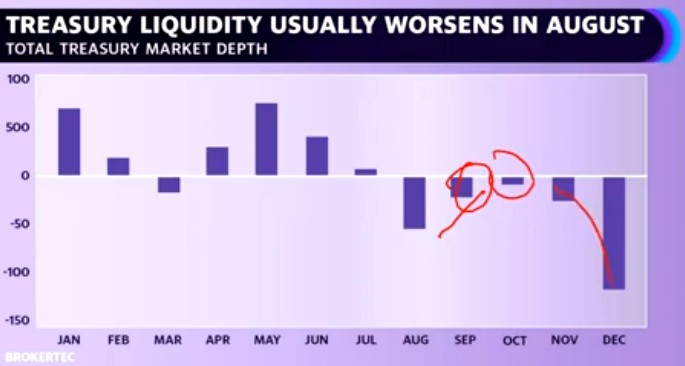
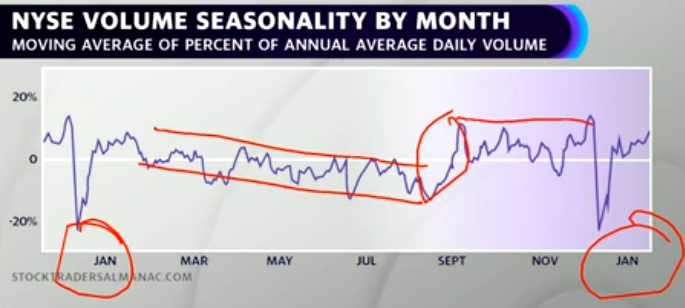
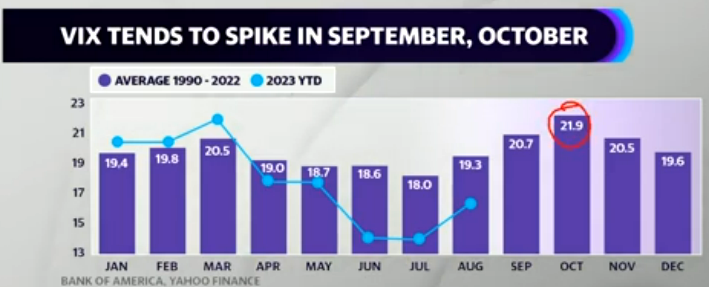
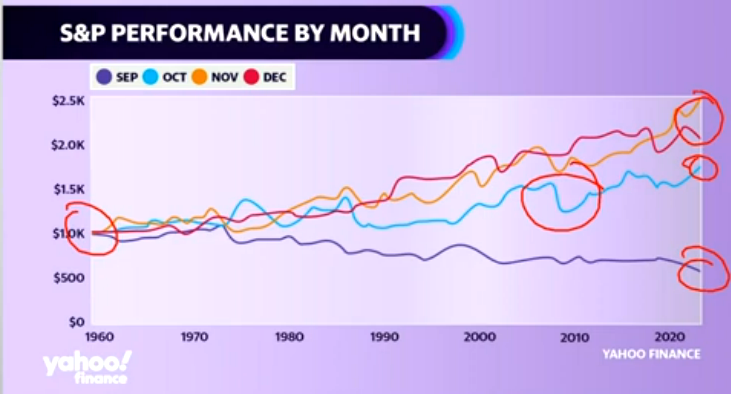
- Sep, 2023
- Sep 04, 2023
-

-
All of the economic momentum is pointing to the downside, says top economist Joe Lavorgna - YouTube
The yeild curve is still very inverted (not as much, but that's what typically happens, that when the recession comes the curve starts to steepen.
Mortgage rates risen way above 7%, high credit card rates, high auto rates, tightening lending standards. Inertia pointing to downside. Lags, you can't pin down when.
Employment prints right before a recession are often good, GDP too.
Claims are up (only a little but up), payrolls are slowing, the revisions are downward.
He's looking at the unemployment rate, which usually rises 50basis points from its low when a recession is coming.
J Powell buys flexibility.
$2.1t in excess savings in US households during pandemic period, due to stimulus. March there was $500b. June $190b. By October, all excess savings predicted to be spent, due to inflation.
The anchoring effect of the inflation target rate of 2%. That's why we can't just change to 2.5%. The economy would become a bit unanchored.
“The sacrifice ratio” - What an economy gives up to get inflation down. Usually you have to give up employment.
NFLX expected that with limiting password to one household, they'd increase subs, but subs decreased a little bit. Were people paying based on an account for several households, which wasn't worth the same money once it was reduced to one household?
Also, it's easy to sub, watch a bunch of series, and cancel the sub, and go to another streamer. Churn. It might not be about price, but rather just about what shows they have. Cable might be cheaper when compared to having 5 or 6 streaming services. Sports is a big consideration. But you can't get all the games from the same service. Amazon jas Thursday nights.
Estimated cost to US economy of Hollywood writers' strike is $5b.
Stolen Covid relief funds: New calls for accountability over biggest fraud in U.S. history - YouTubeArrogance? A pretentcus hope for the need for more military?
EM XChina funds outperformed those with China, so there are more popping up.
- Aug, 2023
- Aug 21, 2023
-
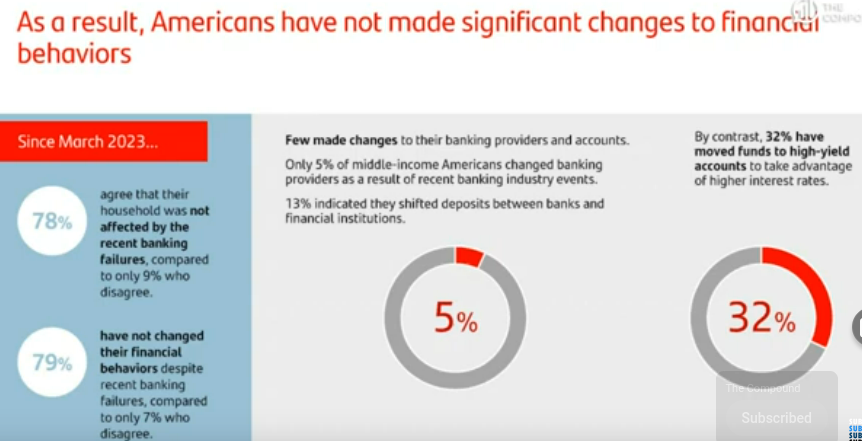
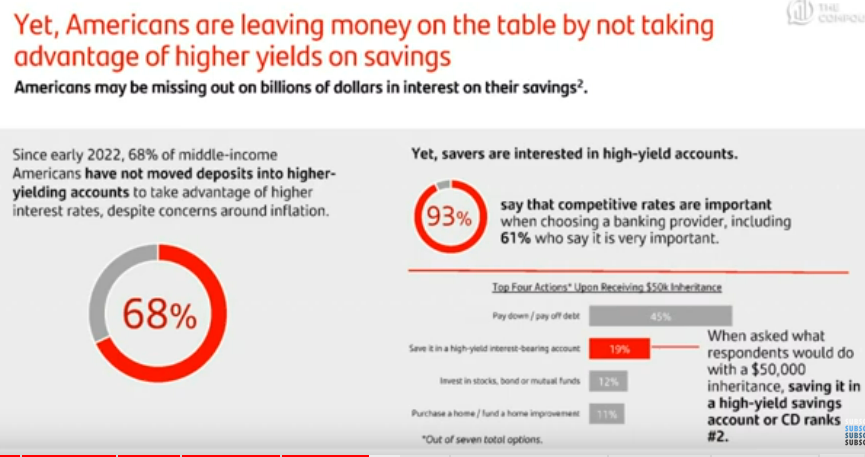

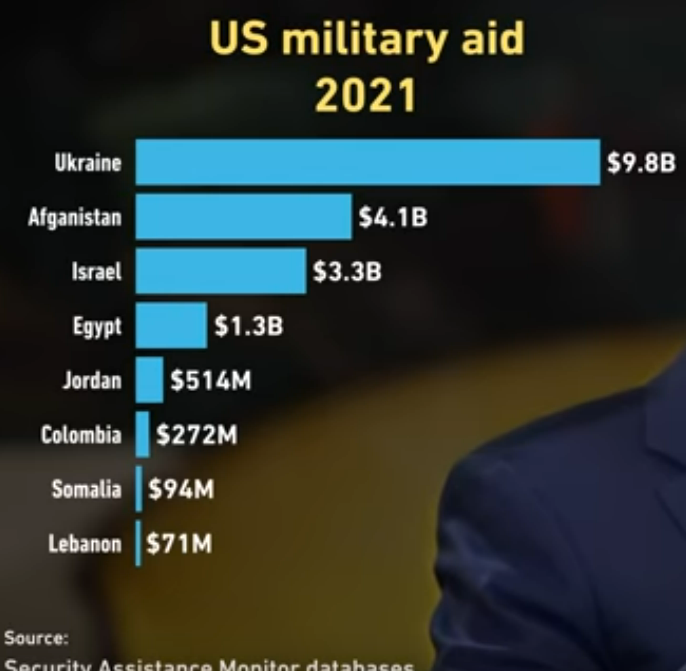
-
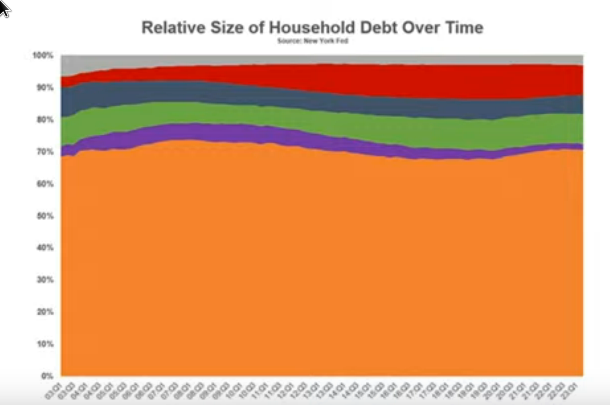
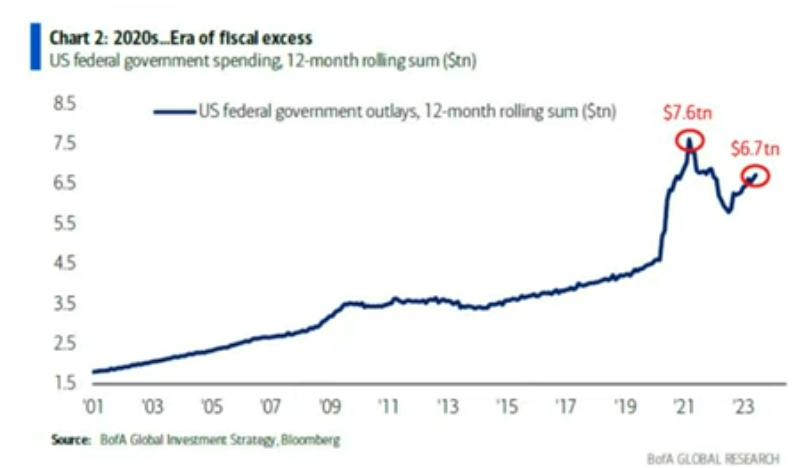
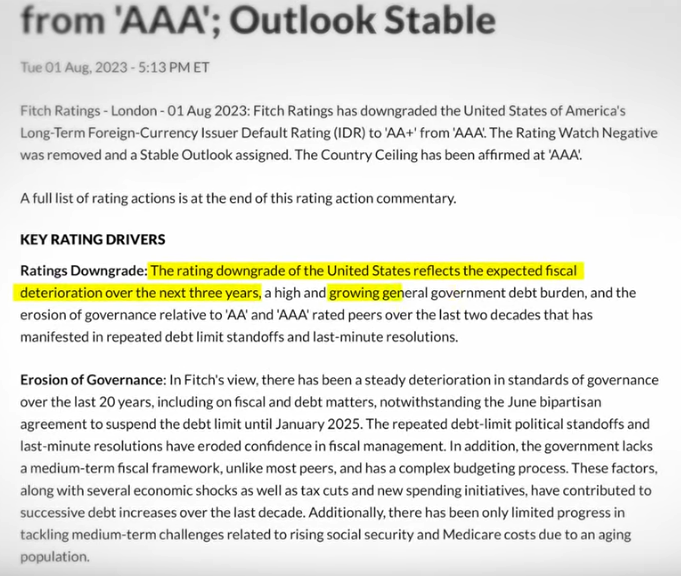

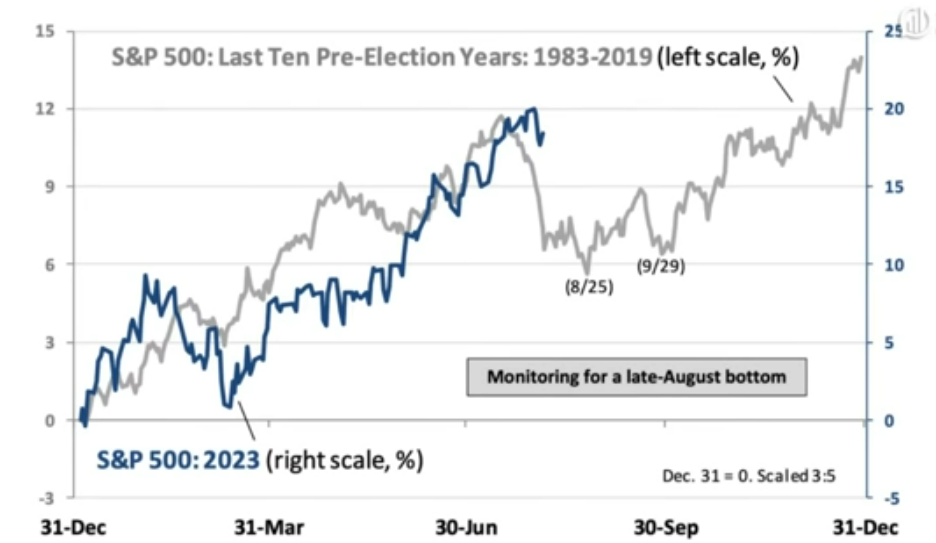
-
No one seems to talk about company quality going up or down. They talk about sentiment, for Meta, Nvidia, Tesla. They talk about multiples relative. But like PayPal, Amazon's product isn't getting better. It's possibly getting worse, as reviews are not as reliable, as they compete with their clients, as there are no new products on their site really (plus they have competition more now, since their only really strong point was cheap, fast shipping).
-
Maybe people aren't just putting it all in index funds anymore, because some stocks and sectors are making highs and other are making lows.
'There's too much money. They're buying things before they even get cheap. I don't know what we do about that.' Josh Brown
iPhones are a replacement business as much as they used to be a growth business. Still selling phones. Said JB, that every year one of 4 people in his house is getting a phone, replacement style. ‘That’s just how it is.'
These companies (Microsoft, Apple, etc), they're not ‘growth companies anymore. They’re decent growers but all of a sudden started to trade at hefty growth-like multiples. And earnings were as always a nice reality-check that earnings were just OK. - BoockvarEveryone didn't want to miss the the-Fed-is-done trade. But now OK the Fed is almost done maybe, but the 10 year is now trading at 4.20. And the 30-year mortgage rate, which is priced off the 10 year, according to bank rate, is at the highest level since 2000. - Boockvar
Consumer still strong.We could have 0 or negative inflation for a while anyway, suggested Tom Lee as just a possibility, given house prices. Everyone on CNBC panel surprised by this.
Growth is strenthening, x energy S&P up for the quarter 3% the first time in six quarters. If only one more hike the market can absorb that maybe. Interest rates could stabilize and then the cash gets put to work.Rates could move higher. All the treasury buyers have become sellers (the Fed, Japan, China). Global demand for treasuries has shifted from hot to cold. Stocks are doing all the right things. Consumer and corporate balance sheets are considered healthy given the amount of inflation. Most economists on Wall Street have dialed back their recession forcasts. Services starting to weaken (?because people are going back to school?) - Subramanian
When Fed reaches peak rates, they usually hold for 6 or 7 months. We've just reached what may be peak.
2024 as a year of tepid recovery. Moderate growth year, earnings recovery due to circumstances (prolonged rates reduce demand for labor) . ... Overall trend is good for bonds and good for stocks. - Bailin
There is still vast demand in China. Scale.
Second-hand markets. Treasures, something special, they generally find it. And something they can afford. And creates social value (non-profit thrift store).
The stuff that comes in, you can get a tax-credit now, reportedly.
They sort it and put some online, and some in the store. They go through every single item. Online store:Maybe markets dominated right now by momentum traders rather than fundamentals traders/investors, because after good earnings, DHI went up like 4% and then dropped to -3%.
Bonds might drift up to 5%. "And ironically it might be because the Fed has backed off of tightening that the bond market is starting to get nervous. If the Fed's not going to fight the inflation fight, the bond market will, by selling off bonds.
We were at ‘the Fed’s almost done,' but after the Bank of Japan move and widening yield curve control,' all of a sudden the yield of the 10-year spikes. The rise now of higher interest rates. Longer period of time with higher rates, and every day someone's getting caught by it and can't make their business loan which came due. How does the stock market eventually react to this longer higher rates? - Bookvar
The I-dont-want-to-miss-the-Fed-is-done-hiking rally. Days after Fed did its last 75bps hike, the market bottomed. The dollar bottomed also. After that there was AI and whatever.
For a CEO, ‘My business starts to slow. Let me slow down the hiring and wait to see how things go.’ Then 3 months go by and business is not getting better, and actually its ticking down. Then you have to make a decision, well, my profit margins are falling, sales are falling. Then I may start laying off people. Then unemployment starts to tick up. Then we don't know if it cascades or not.
In Tech they overhired, so they understandably made that decision. What if it happens after Revenge Travel?
Bank managers, you don't want to be the one that makes a bad loan in this environment.
Compounding deleveraging, a freezing in credit.
China isn't bailing out Country Garden, Evergrande. Allowing developers, who are the main vulnerable part (not buyers of homes, although they will experience decilne in net worth with their assets), allowing them to fail. China doesn't want people to be dependent on the State, they haven't sent out cheques, although they call themselves ‘communist.’
They still have the effects of what the government did to them during the pandemic, nailing them into their homes.
Smartphone market is shrinking. Everyone is looking for a bottom in PCs. Those two take the most semiconductors. Autos.Federal Reserve Weighs In On Taylor Swift's Eras Tour - YouTube - Aug, 2023
- Aug 14, 2023
-
In a couple years, interest will surpass defense as the #1 expenditure of the US government. “And what do we get for interest? Nothing.”
He wants a Constitutional amendment, to limit the amount Congress can spend as a percentage of GDP, absent extraordinary situations.
Last fiscally responsible pres was Clinton. Congress was when Gingrich wa Speaker, he said.
R. Empire referenced. Fiscal irresponsibility, political instability, decline in moral values, overextended military, and failure to protect its borders. That's what he said, but we have no consensus of why the RE fell.Happened since June. Basically 100% in on puts for SPY and QQQ.Although he was early when he predicted the GFC.Will they be motivated voters now? -
Niles
Commodity prices are under pressure because costs are up.
Copper is going to run out. There's only a handful of pure copper plays, and everyone's looking at them. The big guys would love to have that copper, but shareholders don't want that copper to disappear under the umbrella of iron ore.Calm down FTC scrutiny. Expected an FTC antitrust suit.Amazon used product data of sucessful retailers who used Amazon to make copies or whatever, and those sold well. Felt to be unfair. Have to compete with Amazon, who owns the platform. Scrutiny. Stopped doing this, reportedly.From 45 inhouse brands, 250k products, to under 20.Who made the decision at Amazon to do this?Amazon's 2-day shipping isn't the amazing service it was before. Now others do this too, and they have to compete.
AI, if everybody has it, nobody has it - Damodaran -
Index funds, which were at first ridiculed and called un-American for setting mediocrity as a goal, now control 20-30% of the US equities market. They're now more to provide a list of stocks for index funds to invest in than to inform on how the overall market is doing. First index fund in 1971. Boyle
Imports to US dropped over recent months.
Older workers (55+) who have left the workforce have not come back in, as usually is the case with this cohort. Supply story in labor.
88% of S&P companies, the largest shareholder is either State Street, Blackrock, or Vanguard. Their influence in defense contracts. - Bet-David
Do they want more wars?
Is 88% a form of monopoly?
Blackrock is $10t under management. Only 2 countries, US and China, have a bigger GDP.
58% of Americans have an iPhone. Is that a monopoly (US says 50% is a monopoly)?
We don't have competition today. The companies aren't broken up.
Usually when China announces a whole raft of 15 measures it means they don't have one they think will work. But one of the measures in there is
Asking the private sector, especially Tech, to give them case studies of how the private sector has helped the economy and helped society. The CCP isn't bound by that, but if they're convinced by it, they might say Oh we didn't know that, Why don't you guys do more of that.Chinese stock market was in 2007. It's dominated by companies that don't honestly report earnings etc. - Aug, 2023
- Aug 05, 2023
-
The ecosystem is everything with Apple. Revenue has slowed down again. Might be nothing. But I've never heard people who ‘want’ to own an iPhone talk so much about hating their iPhone and how it broke after 2 years or is spying on them. It's not everyone, but I never really heard any iPhone user really talk like this before.
All Amazon's 3 main businesses beat expectations. But $134b versus $131 expected, is that good? Shouldn't it be at least the rate of inflation?
The yeild curve is the big story this week. 2022 and into 23 was ‘the short end of the yield curve’ and now it's the long end. The 30 year has taken off over the past month. Jap 10 year also has gone up this year. Jap stock market has performed best this year, followed by Europe, then US.
Money has very little value right now, say some. Supply and demand. There is someone who wants to pay that amount for that thing.
Now, unlike markets of the past 100 or 150 years, most of people's income goes automatically into Mutual Funds, which is invested automatically into the S&P. The money doesn't get to think, it's dumb, it's rule-based.
Money printing redistributed the same sized pie (of the economy), maybe hoping it would cause some kind of economic activity/growth, but maybe it didn't.
Empries trend toward centralized cronyism.
Enemployment rate down from 3.5 to 3.6%. Earnings up month over month, 4.4% YoY. About to move into a period where base effects will be working against us, harder to print good numbers. -
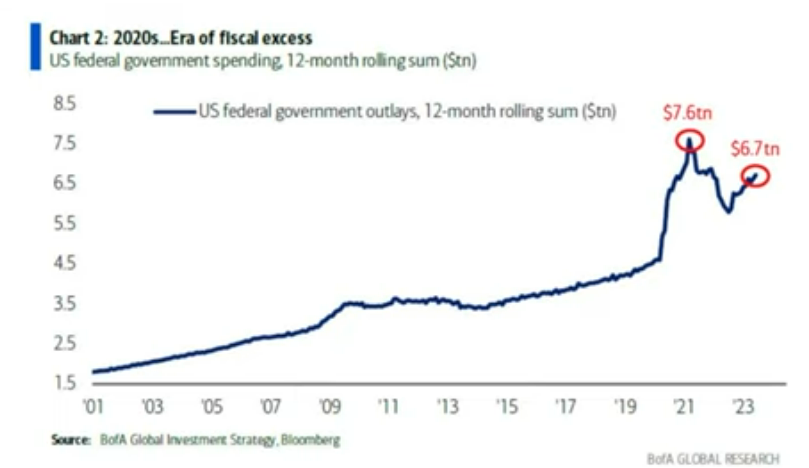 (Note chart isn't logscale)
(Note chart isn't logscale) - Aug, 2023
- Aug 03, 2023
-
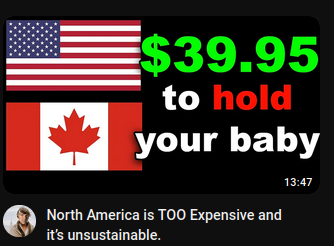
-
US downgraded to AA+ (second time ever)
... because Congress messes with the economy by not agreeing on a budget. But no one adjusted their portfolios. Some criticism of rating agencies over the past 20 years.
3-year and less down, 5-year and more up.
Everyone talking Soft Landing and optimism growing. Like 9 days of higher closes in one of the markets (NASDAQ?), them lots of red for a couple red days.
Companies are reporting earnings beats, but they're not up after that always. Companies that miss often go up more.
Political advertising will be $14b in 2024 up from $2.5b, so advertising, TV companies will get a share. Paramount, Disney may examine keeping the Network and spinning off the TV stations.
Investors ‘nervous about good news.’ Don't want a strong jobs report etc, because that bri3ngs a September rate hike.
A day of most stocks up, but Utilities quite red. Bing said it was because bond yields are rising. First use of Bing. Google couldn't do it. -
Won't see Buy and Hold in stocks again until around 2030, say some. Bear market rally since December. Rotating.
Home buying demand is low numerically but supply is lower. Bidding wars have returned, despite high mortgage rates. Prices won't go down, but number of homes sold will go down.
Vast majority of home owners have low rates from before. Won't be selling, except to move. Some people have adjustable rate mortgages, so those will come up in the next couple years.
Migration to low-tax states like Arizona is a long-term trend.
Rents expected to go down, though, because rental until construction is coming online.
Household construction lower, as more people live in basements.
So called ‘excess savings’ will run out by Fall.
Current valuations ‘make no sense.' Carvana at $9b valuation, twice Macy's. Short interest at 40%. Microsoft launched an AI chatbot or something and added like $150b in market cap.
Without optimism, you might look at the growing debt burden and say that collapse is coming.
James Gormon (MorganStanley) thinks M&A and trading is starting to bottom out.
Start to get used to the new rates. Underwrite risk and new opportunities and cost of capital.
IPOs. A few coming soon, and more in the next year. The soon ones are strong companies with good stories, that are able to come out now. Demand for them, and then other companies will say it's an exciting time to come out.
NASDAQ 100 will do a rules-based reweighting. 5% of the components can't represent more than 50% of the AUM. They'll cap some companies. They've done this before.
...
NFLX is a growth story, and they posted slightly negative guidance for the first time. They did a bunch of things (ads, password sharing) over the past year, and those worked, but now no more things. They noted TikTok as a negative for engagement in their content, the creator economy content. With almost no cost, people can create content. That was the moat before, cost. Hyper-focussed content. Gaming also. And Netflix is considered the best positioned media stock right now, because it has massive content and will be less affected by writers/actors strike.
...
During the pandemic no one cared about financing costs, 1%, 2%. Now that money has a cost people are going to care about this, and buy a new car rather than used.
The average car on the road is 13 years old.
...
https://www.youtube.com/watch?v=wjLttNOdRG4
Most provinces now at $15CAD ($11USD) minimum wage. Some a bit lower. Landlord is paying how much? Higher interest rates sometimes higher rates drive down prices (house prices) and sometimes up (mortgage costs).
...
Investors starting to rotate out of big 7 into stocks that have been out of favor, taking profits and buying things with better valuations.
...
“The big question for Netflix is when revenue per subscriber goes up”
...
Past inflation has been controlled by the Fed, but this is the first time so much has been done Fiscally, just giving everyone money, so the models won't work the same.
...
Lots of people on CNBC say to trim tech (big 7, overall already up almost 100% this year, although everyone says they're still the best companies). Because it's valuation is high PE, and it's ‘priced to perfection’ and any negative company news could make for a pullback, whereas there are undervalued things which are better, and there are defensive plays, and there still might be a pullback (although sentiment is that there won't), and there still might be a recession but they don't know when maybe second half.
...
https://www.youtube.com/watch?v=hfwUpftnvZs
Tom Lee sounded a little bearish for the first time (since he did it briefly last December or something). Maybe industrials and financials in addition to Tech. S&P is up 13% meaning it's overbought, usually a sign of a strong market but also that it could react strongly to negative news. However, lots of people are calling this a top (so a pullback might be shallow).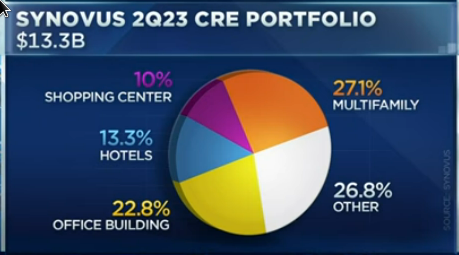
- Jul, 2023
- Jul 19, 2023
-
......Half the companies in Fla will cover $50k or $60k solar panels. While other companies are embracing it.......
There are going to be a lot of Chinese EVs in the US in coming years, and a lot cheaper. China also has rare earths.
Can't really invest in these Chinese companies though, because China doesn't really care about US investors.
...Using Rico Act.“Using copyright infringment as the centerpiece of their business. Basically that their entire business is a fraud.”“Using a decentralized structure to plausibly redirect blame to third parties.”
...
Still $5.5t on sidelines, $1t higher than at start of year, so still scepticism.
...
Extreme silicon shortage today to a voltage transformer shortage in a year and then an electricity shortage in a year or two years. To run LOMs and other AI training. Musk suspects.
...
US needs class-action lawsuit reform, said Musk. The ratio of good to bad class-actions against publicly traded companies is too large, and it ends up being a tax on consumers. Public corporations fear embarassment, etc.
...
Any risk to stability?
...
The $20,000 new car might not be possible from here-on. Car prices up. But lots of used car delinquincies, particularly sub prime auto loans (credit score 600 or below). Inventory building up as more supply comes. Consumer demand currently still strong. High interest rates, and so a lot of the new car sales were from the first half of this year. Some brands are doing well (Toyota, Kia, Honda) while others are struggling (and so have to reduce prices and incentivize)....
Limited supply and scarcity are not the same thing. Scarcity is when demand exceeds supply at the price of zero. - Ben McKenzie
...
Inflation base effects. Inflation seems low right now. Bianco sees 3 or 4% inflation, and if real rates return to positive higher than 4%.
...
Loan applications, rejection rates highest since 2013.
People saying ‘Goldilocks’.
Most people basically have been won over to soft landing thesis.
...
China bond distress. These were the companies people were sure their bonds would be alright short term.
...
July 19, first time I head an analyst mention Utilities. "More defensive equities now on sale Health Care and Utilites." - Jul, 2023
- Jul 14, 2023
-
...He thinks 2% in 6-9months possible.......Valuation ceilingsCompanies early reporting, doing fine, but their stocks didn't go up....Cash Stuffing Envelopes Money Trend is Going Viral - Should You Do it? - YouTube
- Jul, 2023
- Jul 03, 2023
-
Are banks becomming coopted to monitor people in ways IRS is prohibited from doing, the way social media and communication apps are used?
-
Airlines have de-commoditized. A seat is a seat is a seat, no longer. Customers have a choice. The premium market is up.
-
Nike and China
Nike reported first miss in 3 years, and earnings were a bit higher in China than expected, causing some to feel more favorable about China reopening. -
Because the Fed was late, inflation has gotten embedded in the Service Sector, and to treat inflation in the Service Sector via Interest Rate, you undermine the Goods Sector. - El-Erian
Now the Fed has paused to keep optionality.
El-Erian thinks if they change their 2% target to 3 or 4 percent, they can maintain this growth. -
3 distinct tech rallies so far.
January effect, those stocks that vastly underperformed in 2022.
March, investors maintained positions by selling financials and buying big market cap tech.
March, April, May, Ai move, earnings expectation in tech sector. -
The equity market is now 160% of USgdp. 40 years ago, the last time the US had this type of inflation problem, it was not even 40%. Wealth effect. It makes it more challenging for Fed to control inflation. - David Bianco
-
1 in 50 jobs in the US has something to do with ports in LA. 1 in 9 jobs in Southern California.
Investment in the south and east of the country is $11b to the west's $1b over the past several years. The west used to have 80% of shipping, now it's like 60%.
One of the challenges they face is a railroad bottleneck, maybe now dealt with.
He doesn't see a recession coming next year. Lots of products and also parts for US manufacture are coming in. -
#1 reason people move is something changes, a job, a baby, and they need to move.
House prices seem to be gaining a bit.
Homebuilders are buying down mortgage rates, allowing buyers to not have that 6 or 7%, and instead they're buying into that 5% rate which gives them a year or two of cushion. - Jun, 2023
- Jun 26, 2023
-
“This is really a people business.”
-
We're several month in now, and still all the headlines are just like A.I. To Radically Change Future & NVDA Is Taking Us There, but still no story on any way AI will do anything productive
-
Some of this Fed versus talk this week.
-
Uber's model of private drivers was not legalized in Japan. Need a taxi licence. Lobbying. Backend pressure against taxi company owners who started to partner with Uber. Go grabs 70% of ridehailing market in Japan, and about 1/3 split between Uber and other rivals. Uber is popular with tourists in Japan, and tourism has recently seen a big influx.Uber lost out to local players in China and SEAsia also. Skorea had its own app, lobbying so laws only allowed Uber to be used by people with a taxi license. Uber has done well in Latam.
- Jun, 2023
- Jun 17, 2023
-
Tom Lee, Gormond at MorganStanley, feel economy (earnings) has bottomed.
10% of the S&P are making 52-week highs, highest since April 2022. Average 14-day RSIs are at about 60 (normal is 50), highest since summer 2022, which means the average stock is in breakout mode. Russel is performing. - Josh Brown
Interest rates are peaking (maybe 2 more 25basisPoint hikes left, but market sort of seems to not think so).
Income growth remains high at 5-6 percent. Unemployment low.
Manufacturing is growing a bit. Housing seems to be rebounding a bit.
Regional banks are picking up their lending - Bob Elliott
Gundlach said that although jobs were up, hours worked were somewhat down. He also thinks that be cause Fed went 25 50 75 50 25 and this time 0, they're unlikely to bounce. But they're basically projecting two more 25 point hikes (and perhaps break something). -
-
Japan has been cheap, but there's also structural earnings growth opportunity, said Carl Vine. In the last decade, Japanese EPS has grown about 10% compound, beating the S&P, and it could do the same for the next decade. Plus dividend, buybacks, reratings. Might go down short term because it's gone up so much in the past month, but for the next few years there could be big returns.
-
$70 is the new $50 as a breakeven point for oil prices - Kate Richard
-
NY offices reaches 50% of pre-pandemic occupancy (regular rate is around 70%).
In SF, famous brands/malls are pulling out due to crime. - Jun, 2023
- Jun 13, 2023
-
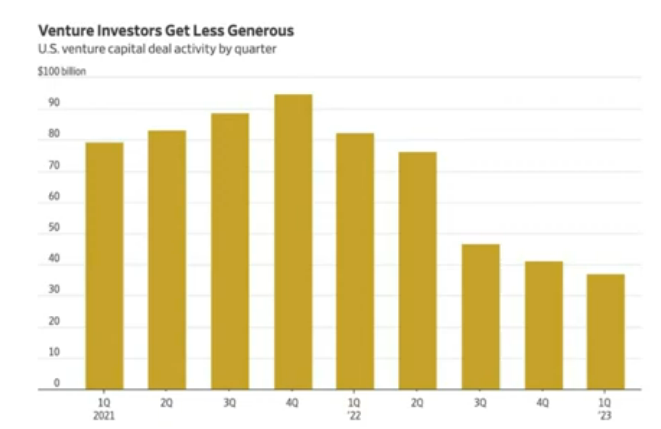
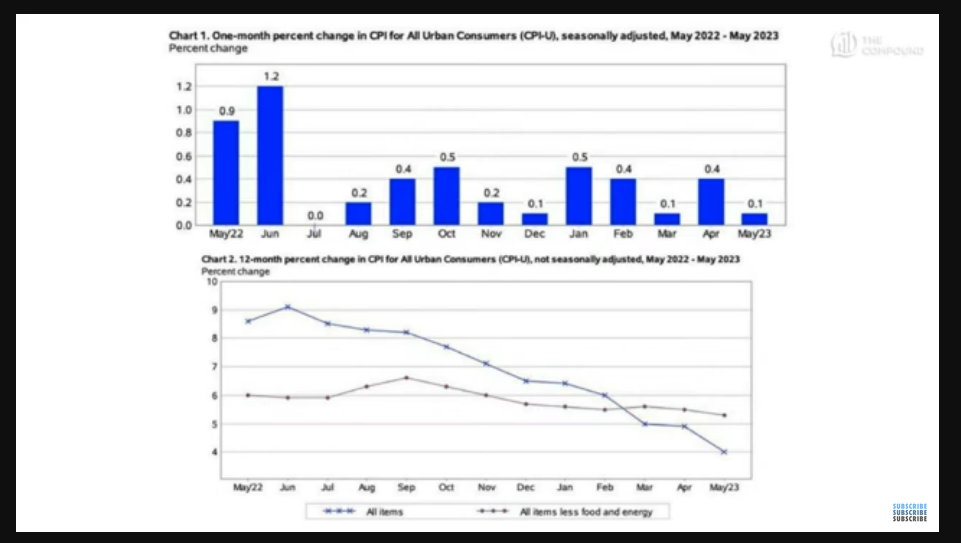
-
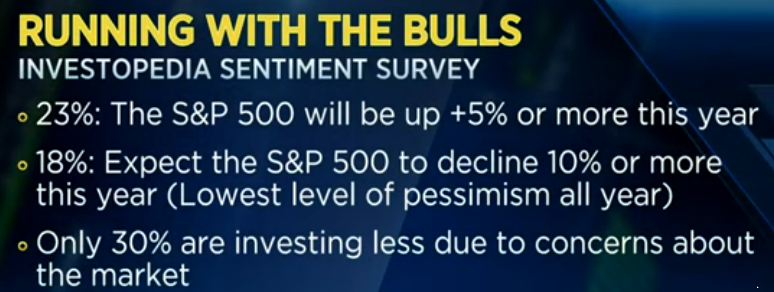 Investopedia: "Lowest level of pessimism seen in 2023"Lots of people talking about FOMO bull market possibly starting. Technical bull market started yesterday.The first part of the year, it was just 5 tech stocks. But recently it's 'broadening out', some think. Russel2000 is an indicator for this (that little move upward at the very end).
Investopedia: "Lowest level of pessimism seen in 2023"Lots of people talking about FOMO bull market possibly starting. Technical bull market started yesterday.The first part of the year, it was just 5 tech stocks. But recently it's 'broadening out', some think. Russel2000 is an indicator for this (that little move upward at the very end).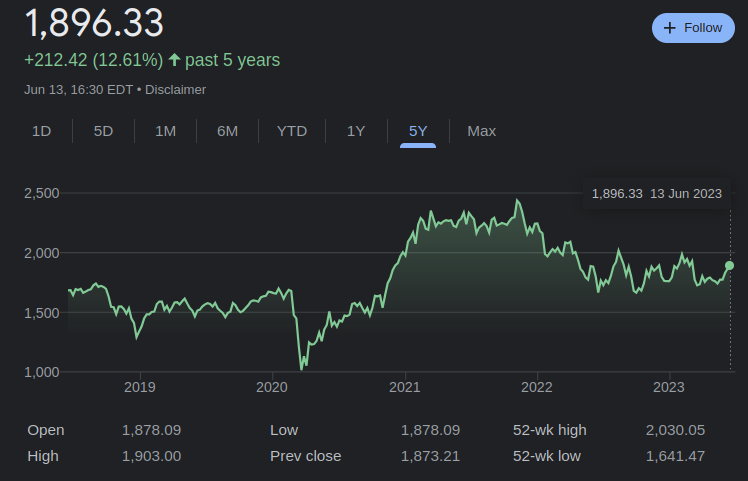
-
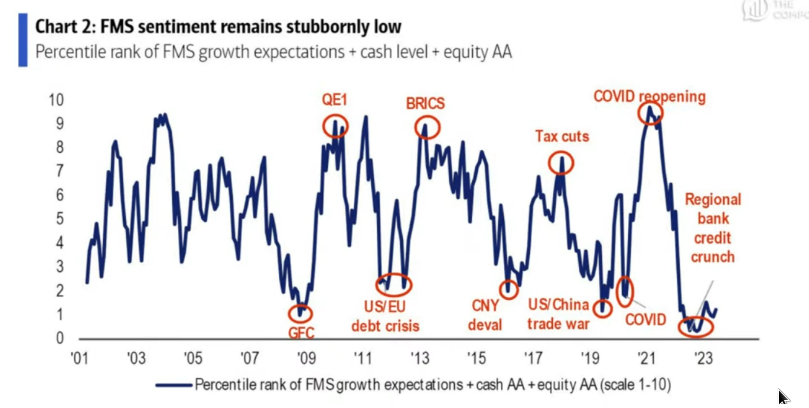 Just the idea of tops and bottoms.
Just the idea of tops and bottoms. -
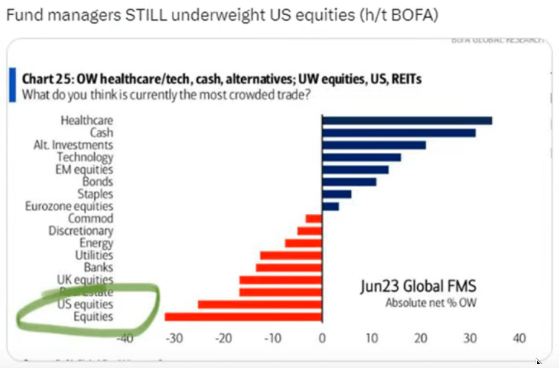
-
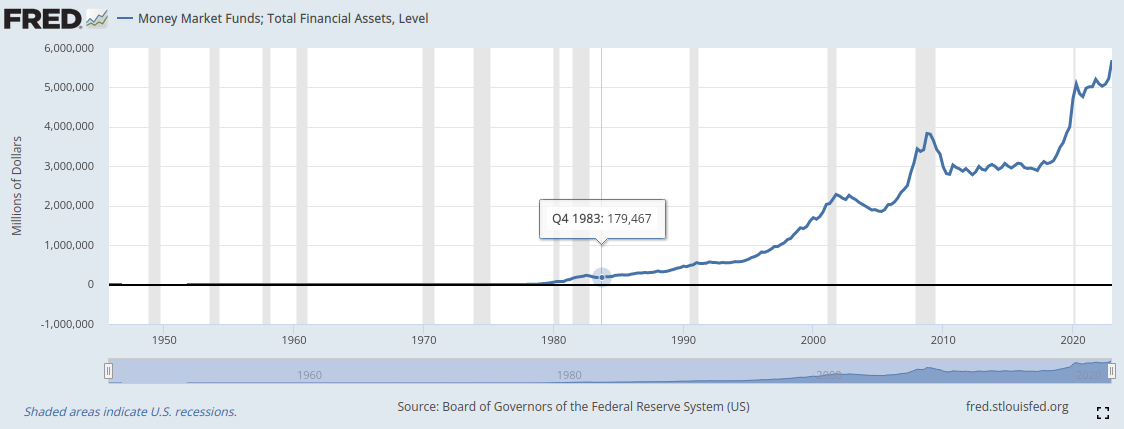 Money market funds.
Money market funds. -
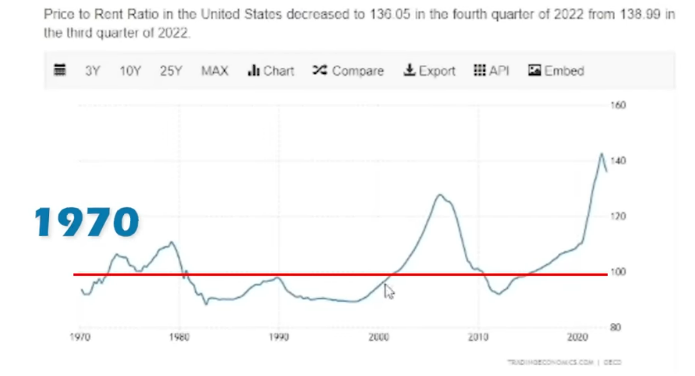 Rent booms.
Rent booms. -
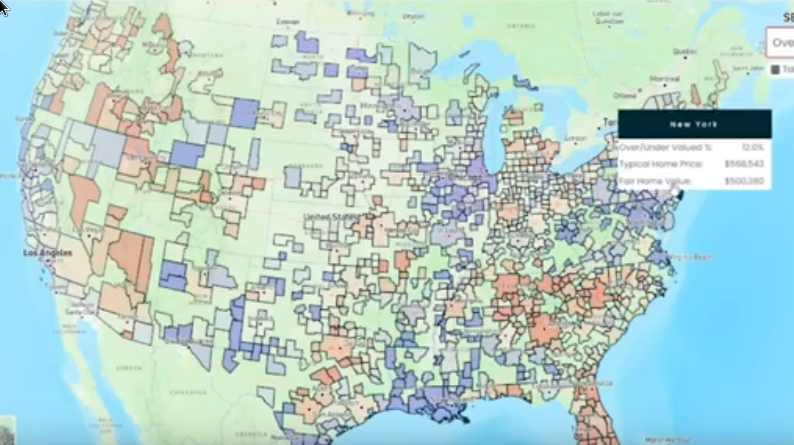 Overpriced versus underpriced.
Overpriced versus underpriced. - Jun, 2023
- Jun 11, 2023
-
China exports down more than expected (phones and garnments). To all trading partners down, except Russia way up (lots of energy trade).
Weak global demand. -
GM will also use Tesla charging standard. Ford announced it would do this 2 weeks ago.
- Jun, 2023
- Jun 04, 2023
-
-
-
Stocks just 23% of portfolio. In preservation mode.
-
Some cities seeking a spike in evictions, and in empty rental locations.Investors aren't buying properties, which could bring prices back down for regular buyers. Mortgage rate (7%) is higher than the cap rate (4.6%), so if you buy with debt (most investors do) you're losing money on a property investment bought in the past few months. And cash is paying 4 or 5%.But he thinks people will float their losses, thinking the economy will improve (everyone's talking about this), and the only thing that would trigger investment and owner property sales is significant unemployment rate.Blackrock has STOPPED BUYING HOMES (2023 Firesale Coming?) - YouTube
-
Probably his most important market
-
It costs too much to hold a barrel of oil. You make too much money if you just hold cash. Prices would have to go up in equities to make it worthwhile holding a barrel of oil.
IEA has raised oil demand forcasts every month since last November. - Jun, 2023
- Jun 01, 2023
-
- May, 2023
- May 30, 2023
-
Japanese companies seeing interest from foreign investors for first time in a long time. Fundamentals are there, but there is also good performance and low valuations. A lot has to do with people just don't/didn't understand the companies.
-
-
-
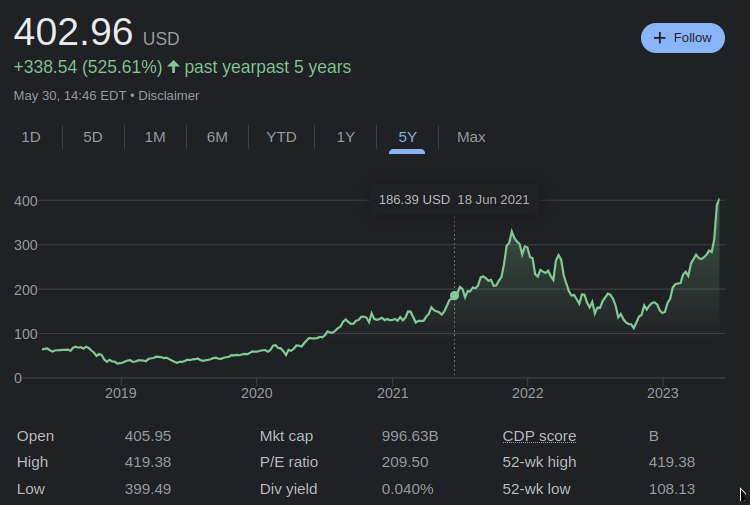
No one knows how to value NVDA now. It had been up from its lows over 100% already, and today they guided higher and after hours it went up 25% or 30%. All their competitors didn't impress with their reports, but NVDA showed it has ‘all the picks and shovels’ in this current AI goldrush.
People had rated it around or below where it was before the report, and didn't know whether they would have to downgrade or raise their forecast.
It opened at like 27% up and went to like 25% up. Everyone talking about their quarter. - May, 2023
- May 24, 2023
-
Small and medium sized businesses who aren't eligible (often) to meet the lending requirements at the banks. Because the businesses are more complicated, they don't have the rigorous reporting that a larger public company might have.
The work that goes into making these loans is considerable, more complex, you have to get collateral, even private personal collateral. More personalized lending. -
AI companies that will be valuable will be those that have a valuable dataset (the AI itself less so).
Bigger, existing companies who already understand well their domain, will be advantaged compared with smaller startup companies. The enterprise will eat their lunch.
These datasets, the companies didn't appraise them as highly before this tool came to show how well it could use these big datasets.
People are now locking down their datasets (Google Analytics?). Before, they would make them public, allow Google Search to use them because that meant traffic for them.So far, even according to the Databricks CEO, chatbots seem the #1 use. Also analyzing customer data (medical records, ‘anonymously’) to find patterns. In insurance, there a long piles of papers to sign, but how does that apply to a particular case, and that can be asked. Also in finding sentiment about a product. - May, 2023
- May 22, 2023
-
China bans Micron chips from Taiwan (for government purposes)META fined record-breaking $1.3b for not complying with EU data privacy laws (Facebook continued to transfer data from European accounts to US servers). META seemed unaffected or barely.META made a $39b in 2021 and $23b in 2022 profit (revenue for 2022 was like $115b). They had been investing in metaverse also.Accepting basically any cargo. Might get ‘worse’ than GFC. Boom-bust cycle, pricing had gone up a lot. Capacity has gone up also. It's easy to start a trucking company. There's no moat. It's very accessible.
Freight market might be 6-month forcast of broader market. (So slowing more than what is recognized.) People are not buying as many goods, anecdotally.
Banks control new entrants into economy (new businesses). Banks slowing lending might not be good for broad economy, but might be good for trucking economy. - May, 2023
- May 20, 2023
-
-
-
"Why would a politician use very scarce tax dollars to go rebuy oil, send the price up, increase inflationary pressures on the Fed ... There's a very strong correlation between gasoline price and presidential approval ratings. ... We do not expect any politician to refill that reserve ever." - Eric NuttallOthers expect US will begin to refill the SPR soon, given the strike price (they buy at a fixed price).Biden used the strategic reserve of gas (which was supposed to be for emergencies) for political reasons, to get the price at the pump down. - Rafi TahmazianPutin cut off gas to Europe. They panicked (logically) and bought gas from everywhere they could for exorbitant prices. And they had a warm winter and didn't need it so much.China shut down and this cut 1.3m bpd from demand (3%).Things that cooled the energy market. It cooled inflation. A softer landing.
- May, 2023
- May 18, 2023
-
Sideways, no trend for entire market. Which companies and which sectors are trending?Jim Bianco thinks inflation will bottom for the year in the next 60 days, because there's a large base effect coming with the inflation numbers. Last year may was .9, June 1.2. When we replace those with .4, we should be in the low 3's for inflation numbers by July (when we get the June number), and then start drifting higher.Most people are employed by companies under 500 employees, and those companies rely on small and medium sized banks. If those banks are impaired in giving them financial services or loans, that is going to chip away at the economy. And those banks are currently unsure about their deposits and their ability to give loans.He expects a post-Pandemic economy, with an inflation rate of 3 or 4%. It has more friction and pricing problems.Walmart revenues are up, but they're customers are also up. More wealthy shoppers are turning to less expensive options because they just can't/don't want to pay for what they get elsewhere.
-
What companies bigger companies want to buy these days are, no question, business services, said Sinha Haldea. Anything where there's an automation mode for something.Also generative old school businesses (generate regular income). Products.
- May, 2023
- May 17, 2023
-
Bears turning bullishMaybe the old guard of investors is retired, and the new guard looks though everything, since the market goes up 90% of the time. Why play for the 10%?
-
Hollywood writers strike have for years been working more and receiving less, so the fight is a warranted one this time, some say.They are just 1 of the 3 unions.Netflix still doesn't have sports. ESPN and DIS do. So not attracting big advertisers in the same way.
-
New house buildsCosts of building are still high, and some areas are not desirable to own in.New listings down 40% some places over last year. People aren't upsizing. Mortgage rate effect also.Detached homes, even luxury homes, are selling quickly, compared with like condos.In a regular housing market, there's no negative amortization like there is now, where the cost doesn't even cover the interest on the mortgage. So it'll be after that plays out that we might see a change (sellers, capitulation).
-
MMFs down versus ETFs, because people want to sell their MMFs which is bringing them down relatively.
-
Lending (who is doing it?) is being done with high rates of return for the lender.
- May, 2023
- May 16, 2023
-
Top 2 companies for engineers wanting to work, once again, Tesla and SpaceX.Tesla gets like 3.5m applications per year (not sure if that's all engineers)
- May, 2023
- May 15, 2023
-
At some point you're gonna deplete your cash (using credit cards instead), the movement of money out of deposits into MMFs will complete - Tony DwyerWhen there's availability of money you're a permabull, and when there's not, like now, you just wanna stay on the sidelines.
-
Apple bigger than entire Russell2000 ($2.7t)
-
Binance pulled out of Canada
- May, 2023
- May 13, 2023
-
"Imagine if SF was a city of 6m people, or 9m people. Think about the glomeration effects. Think about the depth of industry that could be developed. Having a lab and a manufacturing facility and everything be in driving distance, maybe even the same building." - Samo Burja
-
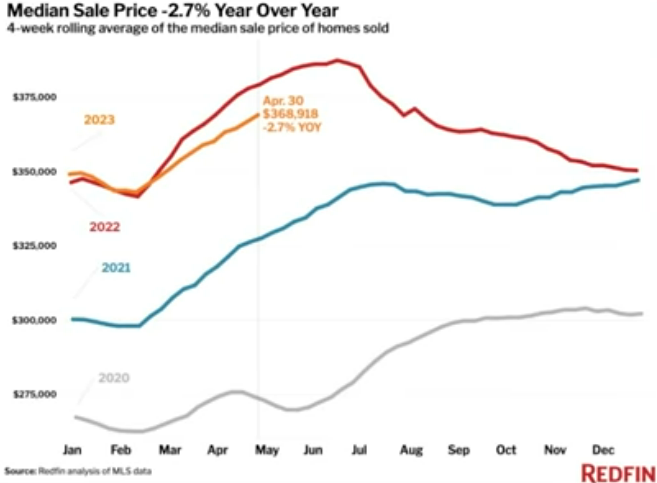 Some are selling below asking, but not many. But it's not like during the pandemic when people were getting above asking price.
Some are selling below asking, but not many. But it's not like during the pandemic when people were getting above asking price. -
Authorities saying the banking problem (in Sweden now at SBB after they soldoff at a loss an asset to raise cash) is due to depositors wanting higher yield on their deposits (since MFFs give like 5% apparently in US), and short sellers.However, if banks are selling off assets at losses, which is like the thing they definitely don't want to ever do, is is just a case of shortsellers speculating, or something actually being there?
Why can't banks pay more for deposits (temporarily)? Why are they unable to do this? Funds are available to banks as long as they have collateral. They may have to pay a bit more than they want to to depositors but they don't have to lose them. - May, 2023
- May 11, 2023
-
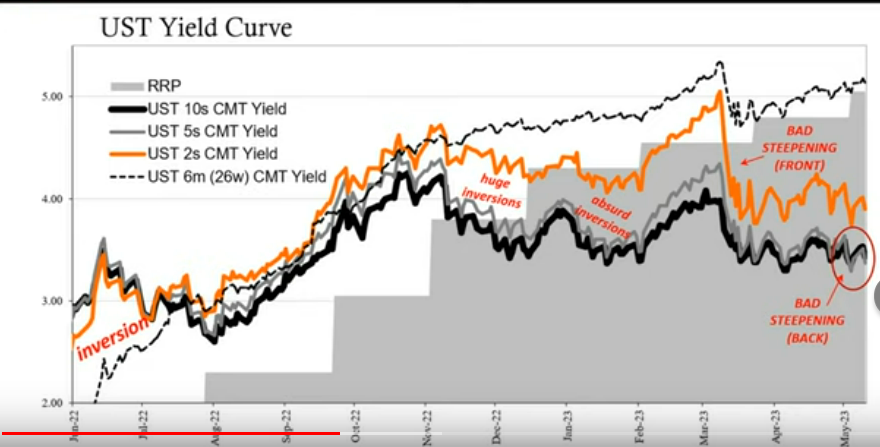 Eurodollar U chart"Deflationary money is the interruption in the natural or necessary flow of money in currency through the economy. It's NOT rate hikes."It makes even minimal economic activity that much harder. It can lead to a deflationary economy.A deflationary economy is joblessness going up.
Eurodollar U chart"Deflationary money is the interruption in the natural or necessary flow of money in currency through the economy. It's NOT rate hikes."It makes even minimal economic activity that much harder. It can lead to a deflationary economy.A deflationary economy is joblessness going up.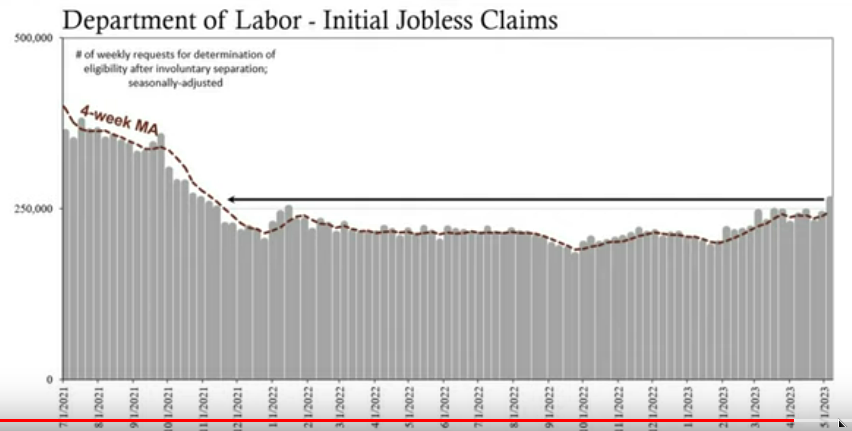
-
More people are putting basics like groceries on credit cards.CC rates are higher than ever, 20.5%, in accordance with the FedFunds rate.Groceries are more expensive.
-
Blackrock. Asset management. A top 3 holder in 99% of US-listed names. It should, therefore, look like the S&P, but it doesn't. It has departed and is heading down relative to the S&P. Why?Goldman and MorganStanley. Brokerages.
-
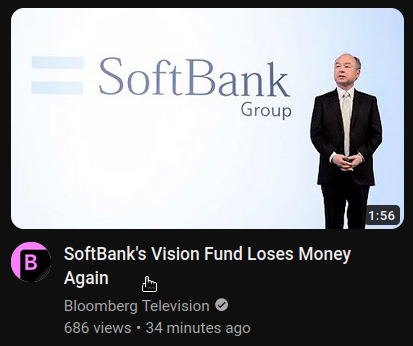
-
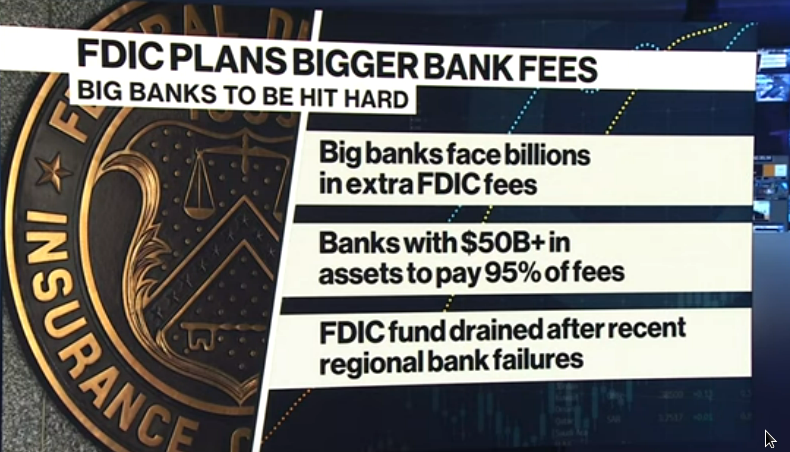
To insure ALL deposits. Normally FDIC just insures up to $250k. $15.8b is the cost of doing so. - May, 2023
- May 09, 2023
-
BRK's insurance part is up.Everything in the economy is worth more, and so insurance value is up.
-
Banks are loaning less, so family offices are stepping in to do loansDouble digit returns.A whole new class of investors are filling the space.
-
Now we watch the delinquency cycle. We've already seen some defaults in auto loans.Real estate to watch.
- May, 2023
- May 08, 2023
-
Americans asking if they will in 5 years have 4 or 5 'basically government institutions' banks, like Canada or AustraliaThey have thousands of local banks. And they have 4 or 5 giant banks. So why do people go to the small regional banks?Is it just 'romance'? Is it 'nostalgia for pioneer days'?
-
When you hike rates, you reduce production.To decrease inflation, you need more inflation, to balance supply and demand. Some say.
-
Energy companies have been returning capital to shareholders, and some people want them to do even more of that. US has a lot of gas and oil for now, but there should be some more production, but how can energy companies really invest a lot in that if the government is stymieing projects?
-
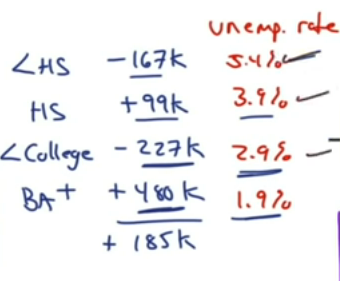
- May, 2023
- May 07, 2023
-
Buffet described the float, the amount of cash that comes in through their insurance business, like we have a bank with no customers, no employees, and nobody can pull their deposits out.
-
What gives you opportunities, even in a market where 'everyone is making less' is people doing dumb things (overbuying or overselling)
-
Bank clients with lots of Twitter followers may be understood as higher-risk clients.
-
Will bank consolidation lead to higher prices? (less competition)
-
Fintech has taken the easier part of banking away, possibly.
-
Signature Bank was already on the 'red list' for dabbling in crypto and not responding to regulatory requests. 90% of its deposits were not insured.FR was wealthy clientelle. These are the type of depositors who will most quickly withdraw funds in signs of problems. (These deposits are not insured.)Non-sticky or sensitive deposits.Faster growth is difficult for banks.Regional banks, concentration, may be less sticky than more national banks.
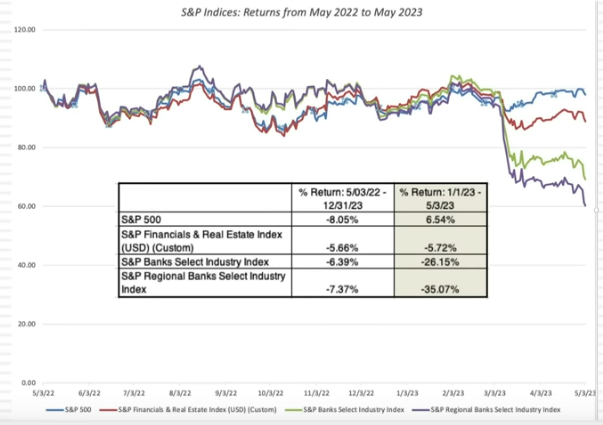
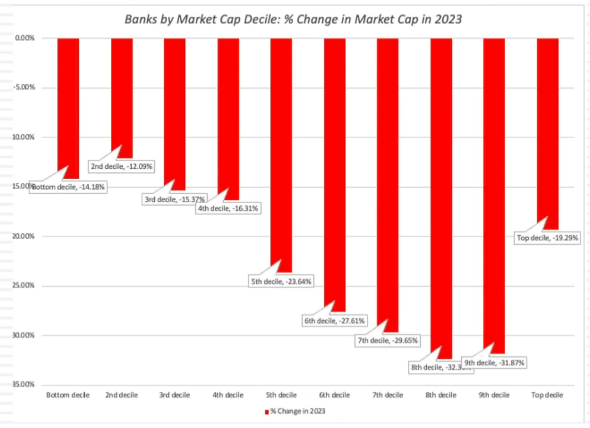 Biggest-losing banks in 8-9the decile. Not the smallest banks. Also the fastest-growing recently were more recently the fastest-losing (stickiness?).
Biggest-losing banks in 8-9the decile. Not the smallest banks. Also the fastest-growing recently were more recently the fastest-losing (stickiness?).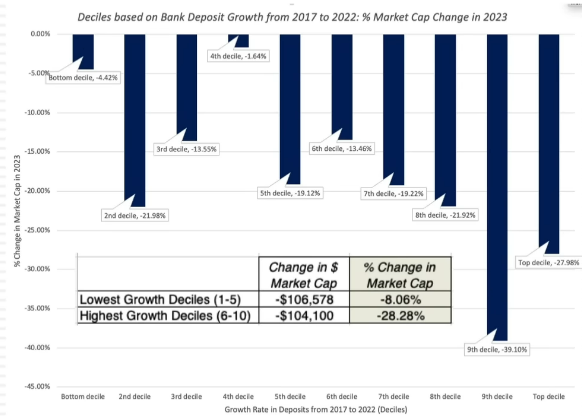
-
SVB is a start-up bank 10 years ago. It's niche grew during that period.
But it was just SF and just tech, mostly. Those people were a circle of people (virally connected), so they talk and act together. (A broader, more disconnected 'society' rather than 'community' provides stability through disconnection/slow diffusion/disagreement.) Also younger, wealthier (contrast with the responses of older, poorer clientele.)In 2021 deposits doubled (VC was under threat, putting money to side, more down rounds, less willingness to invest in new tech (which was also very overpriced), so they deposited this money instead). I wonder about examples of conversations that took place deciding what to do with that money and why? If the CEO decided to ignore the risk of rising rates (is it possible he didn't have access to knowledge that was a possibility?), what was he thinking was going to be a better attitude with their cash?Future deposits would be even higher?SVB invested (like 60% of their holdings) in longer term bonds to get 1 or 1.5%, which was more than 0 that they would have got from short term bills.They had to sell in 2022 to raise cash, but this plan leaked (most virally connected depositor base) and there was a run (fast because done on their phones). -
Almost always requires a macro crisis for people to know there are bad banks.Recessions test banks because more people default collectively. Banks without buffers can fail. They have to sell assets to get their money back to cover withdrawals.Banks 'should' loan against earning power of assets, but banks frequently instead loan against the 'value' of the assets. Asset classes become overvalued, and the banks loan on that value, and that corrects.
-
New refineries in US, is something Kevin O'Leary is pursuingOnes that cost a few billion (under EPA threshold so doesn't have to deal with them). Says he can do it in about 3 states. On a bipartisan basis. The states will contribute towards the feasibility studies, and Oleary will fund the debt and the equities on a sovereign wealth basis.His headline project is for $14b.
-
You don't have a totally broad improving economy. You have winners and losers. Tech sector up more that 20%. Banks down, consumer.Some think the strong performing ones will lead, but Carter Worth said that never happens. The weak ones are telling the real story and the strong ones ultimately succumb. (Why?)The market has had a lot thrown at it to the downside (banks, geopolitical), and hasn't really gone down. But it hasn't gone up yet either, and can't without real earnings growth or multiple expansion, Worth said.The market has gone up or down 15% for 2 years.
- May, 2023
- May 05, 2023
-
SingleB and higher, almost exclusively, for bonds. - Gundlach, on the 'unusual' current market (he's in Europe, and warming to EM like Asia-X-China and parts of Latam.
-
"What good is a debt ceiling that isn't a ceiling? What good is a cap on insurance that isn't really a cap?" - GundlachThey've raised the debt ceiling almost 98 times in its 106 years.It's basically unlimited.
-
Gundlach thinks 'they raised rates too slowly. And the fact that they have to leave them high now for a long time ... is not good for the banking system. The short rates are so high above the bank rates.'"People leaving their money in banks when they're getting half what they would with MMFs is nonsensical."
- May, 2023
- May 04, 2023
-
US weaponizing the reserve currency USD against Russia (this is not Iran or Venezuela. This is Russia.), gave a pretext many were looking for, and galvanized different countries into a solidary movement.Saudis can transact in Yuan and hedge with gold.Or a BRICS basket of currencies.And the USD became too expensive.
-
"The Fed needs inflation to inflate away debt." - PiepenburgThey need it higher than the 10year. They want to debase the currency.Wall Street socialism. By the Fed. The 10% get 90% of inflation in risk assets. It gets politicians elected. It's completely distorted capitalism, because we don't have natural supply and demand. Fed directed.
-
Talk (blame) of 'the shortsellers' began in earnest todayTheir plan is very clear. Push a bank over the brink. Find another one.Talk of a (temporary) ban on short selling.
-
-
The recession coming might not solve the banking problem, but rather exacerbate (compound) it - MarenziThey have severe pressure in terms of their net interest margins. People pulling out funds, so they have to find other funding, but people are unwilling to put their money there. People want 3, 4, 5% return on their money.One good point. Loan quality has remained high. Defaults are low. That would come under fire in a recession.
-
Investors can't buy the dip in bank stocks (speculatively down 30 or 40% for some) because they haven't published their losses to market, so you can't read their book value really.You have to read between the lines, and read the footnotes.Shareholders in the big banks that have gone bankrupt have lost all their investments. So you can see why people might be reluctant to hold stock in others.
-
-
TD pulled back on buying FH."They really have their pick of the bunch. If you're in the market to pick up a regional bank, you should wait."Moral hazard. People waiting for receivership. There's no auction.
-
Stock price drops for banks that are similar, perceptually, to those that have already failed this year.Investors are looking for banks that appear most similar. These banks have not announced any problems.
- May, 2023
- May 03, 2023
-
JPM got a great deal, but was it a good deal for the banking sector?The signal was that you shouldn't buy a distressed bank. Don't offer help. Wait for it to go bankrupt and then pick out the parts you want. If BearSterns at $2 was a good deal, this is an even better deal. Some say.
-
-
Politically independent Central Banks are crucial to the good running of the economy. - El-ErianAnd without accountability, you don't get politically independent Central Banks.Transitory inflation call was false. It means not just short -term, but also that people don't change their behavior.
Communications were a mistake. The inconsistent message during press conferences caused like 3x volatility in markets.Why did it get inflation so wrong? and why did it stall so late to do something about inflation (the EU and others did that), and why did they not tell the public why they didn't get that right.We give them enormous power. They're the only public agency that doesn't have to go to Congress to make a decision.They can inject $7t if they want. Or if they want to cut interest rates. It's critical they have that autonomy though, El-Erian said, for their acting. -
How many institutions or Central Banks have invested in Bitcoin? Van Eck said none he knows.
-
Post Ukraine 2022, people don't trust the US not to take their money through sanctions.De-dolarization movement. They'll use more of the other things. Not a major call but a trend for sure.
-
Commercial banks are lending less, said Jan Van Eck. More alternative lending.They're so fragile. It's like, if you need the Central Government to bail you out, is the Central Government going to be a reliable backstop? The government is political about it. Oh we don't like Crypto. Oh you're a crypto bank? Oh Credit Suisse, you've messed up one too many times on your risk management or whatever, and you've upset the Swiss government. I'm not going to bail you out, but I will for UBS.The government has not explained objective criteria, or who they bail out and who they don't.Why is this bank getting a bailout while this other one isn't?Central Banks were created because literally no banks can survive a run on deposits (everyone tries to withdraw on the same day).Should banks be making loans? After GFC and Dodd Frank, we said well Big Banks should not be making risky loans. Now they only loan like 60cents on each dollar or something.
- May, 2023
- May 02, 2023
-
$13b is what First Republic will cost the FDIC insurance fund (taxpayer?), reportedly.First Republic might have been 'the one JPM wanted all along.'All these banks now have stock prices down 30 or 40%. How can they be looking to make a bunch of loans now?
-
Ponzi-like, it said. Fund down 16%.
-
Liquidity crisis in banking. Inflation of prices.
-
Difficult for banks (who lend to people so are subject to slowdown in spending) in this economy, so benefit goes to non-bank financials (insurance)Mutual funds et all have to have access to financials. If not to banks, where do they go?
-
"There's always judgement involved in monetary policy. It's not a precise science."
-
May 10 Google product development conferenceSeen recently to have fallen behind MSFT, just because of MSFT's splashy product opening with ChatGPT. Will Sundar be an aggressive downtimes CEO, analysts are asking, as was Nadela and Zuckerberg?Pichai has been seen as cautious, not splashy. Recently he did 60 Minutes and talked about AI dangers. (This could also mean that future understanding once the common reaches the in-circle will turn more towards Google's stance).
-
Smaller, low-cost companies had been doing better, but now with inflation costs bigger ones seem to be doing better.
-
That means institutional investors aren't going to be made whole. They are now fourth on the list of creditors to be paid out, after depositors, general unsecured creditors, and subordinated debt. They have to go to the FDIC and file a claim for their investment. Likelihood of getting their money back is unlikely, reportedly.This is because instead of JPM buying FR, they waited until after the FDIC seized FR and then they bought FR's assets (some, not all, ie not their debt) from the FDIC.Also a way for the bank to surpass the 10% of the market short deposits limit (anti-trust regulation). "It was the only thing that could be done."Dimon said JPM only switched from being an advisor to FR to being its buyer only after the government asked it to step up, so it wasn't an 'entirely private deal.' The deal also had a $50b line of credit and a loss-sharing agreement with the FDIC (FDIC will bear 80% of credit losses on FR's mortgages and commercial loans).The FDIC sold FR (its assets) a bit cheap, financed with this loan, and made attractive with attractive regulatory treatment. This will effect not just moving the problem to another bank, leaving the banking system as shaky as before, its instead reducing the risk, in the banking system. Otherwise, JPM would have offered less money, and the FDIC would have had a bigger cost to its insurance fund than $14b.
- May, 2023
- May 01, 2023
-
3 banks have gone out of business. That's 'systemic.'Fed raised rates which simultaneously reduced the value of small banks existing holdings (treasuries, auto loans, mortgages, student loans), while raising the cost for the banks of having their deposits. - Dick Bove"At some point you cross the two lines." You've driven the cost of gathering funds to a level at which the yield on existing assets cannot pay for it, and that forces banks out of business. (SNL, and current)
-
In another vid, El Erian talked about how good it was for JPM, although it doesn't increase their already massive profits (although it will, like 500m to 1b, increase it a bit). FR has a bunch of rich clients, and it has the best customer experience going. Plus they buy it at just a bit more than they would have lost if it had collapsed.
-
Starting July, 'artificially high prints' because of such a high base. Even if disinflation is working harder. Whereas before it was the opposite YoY effect.
-
In housing market, some say employment is always more important than rates, so we might just now start to see this affected, despite rates having been up for a while, because jobless claims might now start.Job postings are down 10% YoY.Before, builders didn't have labor, but now they have labor, so they might build through all the new homes, and then shed perhaps a million labor jobs there.ABNB demand has come off. Supply situation is out of control. No caps put on how many homes could be put out short term rentals. "30% of this city's rentals are vacant." That doesn't last forever. Especially people with a bunch of ABNBs with mortgages. Pent up supply. Coming online. Redfin showed first rent YoY decline in years.
-
Will companies that have to refinance in the current couple years decline to do so, while companies that have to refinance in 5 or so years all do so (assuming rates go back down by then)?
-
Market to market comparison, in VC2 unicorns worth $2b, and the one that SPAC'd 2 years ago, its value would have collapsed in 2022, while the one that stayed private is still sitting pretty because it's illiquid and it's value can't be looked up.
- Apr, 2023
- Apr 25, 2023
-
Banks have been stuffed with treasuries because the government has pumped out a lot after the pandemic, and the Fed has bought them ($5 or 6t on its balance sheet). It's selling those to the banking system because it wants to unwind its balance sheet.Treasuries are considered 'zero risk.'These are subject to big moves when Fed changes rates. Huge amounts move around, and everyone can see this on their phone.Government is sort of insuring that these treasuries, which are now worth 60 or 70 cents, are still worth a dollar.Our solutions are the problem. Short term steps. The myth of fiscal and monetary levers, when we're never willing to restrain during good times. We only splurge during bad times.Possibly moving toward a blue collar economy. Stimulus is there, onshoring, plant building, engineering and construction with the government behind it.
-
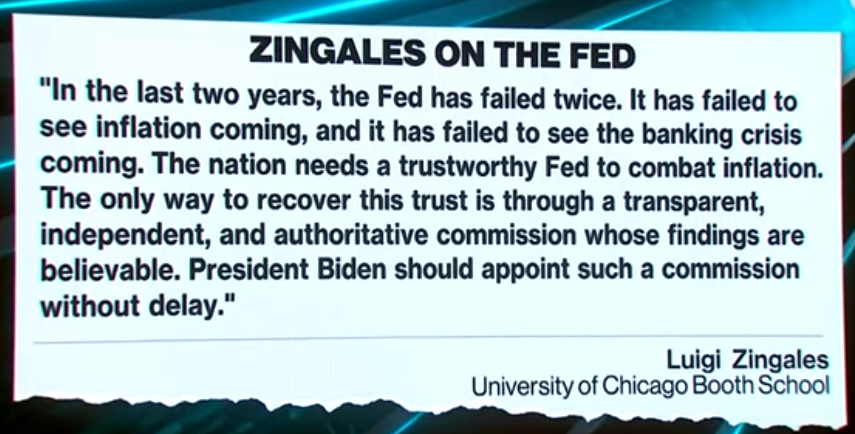 "When you raise rates so fast, you're going to impose losses on the bond market, and who's going to bear those losses? Insurance companies and banks. Then you have to bail them out.""They have 'all the tools' but the tools were not very sharp.""Clearly put a lot of softness in the banks, particularly regional banks, which are the ones who lend to small and medium sized enterprises. The bread and butter of the economy. ... They see deposits flowing out, and they don't want to make loans. If they make loans and then deposits flow out, they have to sell securities and then they make losses. The first thing they do is not make new loans, and then probably they divest securities where they can (slowly).This banking system doesn't work at 4% rates, he said. That would be all their profits.
"When you raise rates so fast, you're going to impose losses on the bond market, and who's going to bear those losses? Insurance companies and banks. Then you have to bail them out.""They have 'all the tools' but the tools were not very sharp.""Clearly put a lot of softness in the banks, particularly regional banks, which are the ones who lend to small and medium sized enterprises. The bread and butter of the economy. ... They see deposits flowing out, and they don't want to make loans. If they make loans and then deposits flow out, they have to sell securities and then they make losses. The first thing they do is not make new loans, and then probably they divest securities where they can (slowly).This banking system doesn't work at 4% rates, he said. That would be all their profits. -
"Are we going to see a significant transfer of wealth from shareholders to depositors, because depositors now have the ability to go to Apple and get 4.25%?" - Steve Aoki lookalike on CNBC
-
Debt to gdpCost of servicing debt.
-
Where will we get boosts in production?If we don't, it's another reason for stickier inflation.
Some say AI will increase productivity 30%, but how? -
China is no longer that exporter of deflation it used to bePopulation decline. Increasingly an expensive place to do business, causing companies to leave.
-
Commercial real estate is a dominant asset that regional banks ownDoes higher rates for longer translate into more credit issues?
-
Away from Globalisation toward fragmentation. Security in food, energy, etc. But what does that cost (to onshore these products)? This might be the right thing for national security.
-
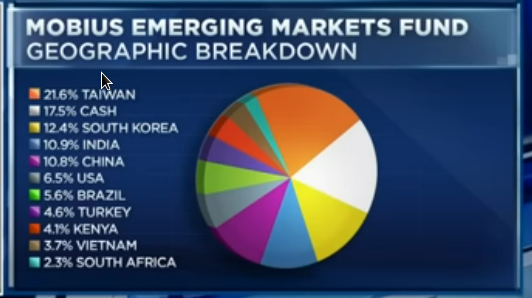
-
What is the relationship between Buffet and Japanese banks?No one knows exactly. A commodity play? The banks have low PE but are overpriced, according to Mobius.
-
Declerating growth + rising inflationStocks have gone nowhere for 2 years.
-
-
Up 10%. Surprise. Despite rates going up to 7% at that point. But builders are using incentives to sell, especially mortgage rate buydowns.Prices still up YoY 3%. Supply is dropping.
-
- Apr, 2023
- Apr 24, 2023
-
Commercial banks, deposits dropping.Fed behind scenes doing QT. The reserves base that all deposits and broad money are built on declining.
-
-
continued, Jeff Snyder
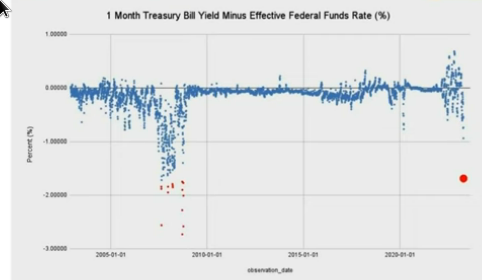 We're also seeing a lot of hedging.
We're also seeing a lot of hedging. -
Liquidity characteristics of what banks are holding. Massive buying of bonds yesterday, not seen since 2008 he said. Because cash isn't fungible in a way that T-bills are. When you're borrowing against assets you want those assets to be as close to risk-free as possible, otherwise the lender doesn't want to.In the big global economy there isn't enough collateral to go around.
A hedge fund chasing yield doesn't want T-bills. They want EM high risk, but to buy them they using the repo market, but you can't go to the repo market with these highrisk junk bonds assets to get a loan. You won't get the rates you want to get. You need something really secure. So you go to a money dealer and swap your junk bonds for the T-bills of someone he knows (an insurance company or pension fund). They lend them out for a small spread. So you're already multiplying collateral. A single T-bill might be securing multiples of these financing trades. "These re-use and re-pledge chains."Then look at derivatives, which nowadays may be more likely even than the repo markets as the cause of the problem.More and more, financial participants are being forced to do the same things at the same times because of the systemic conditions. Now, pay high levels of premiums for T-bills when there's problems in the collateral marketplace. - Apr, 2023
- Apr 20, 2023
-
Tesla may have 'initiated an EV price war'
-
Goods (autos, food) are being cut back on, but the consumer is still spending on services, travel, etc, keeping inflation going.
-
Recession is probably starting right now, say some.Tesla and a few others dropped on displeasing earnings reports (although others are up on theirs).NASDAQ
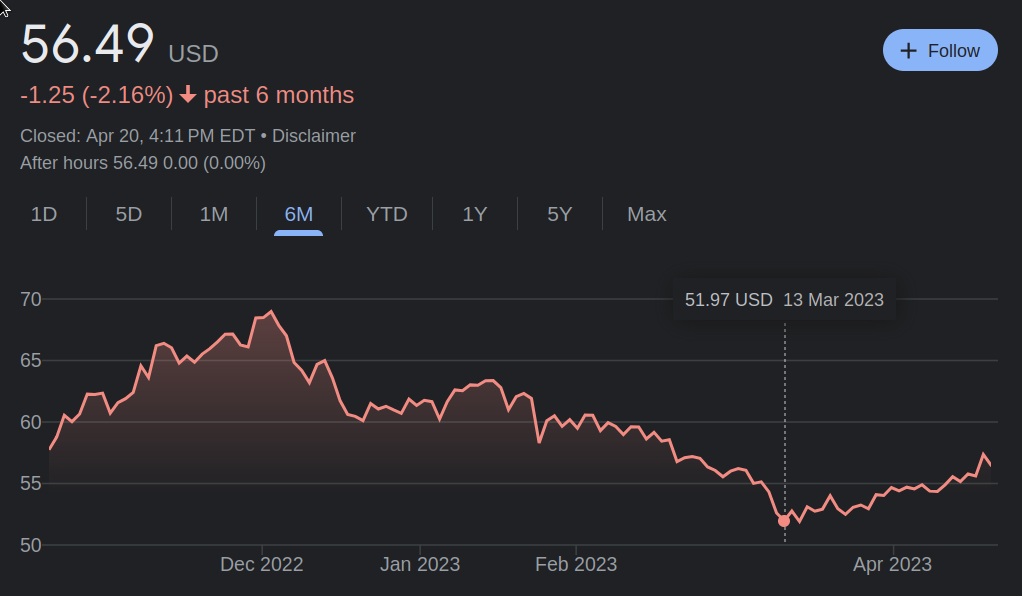 S&P, and this week in the S&P
S&P, and this week in the S&P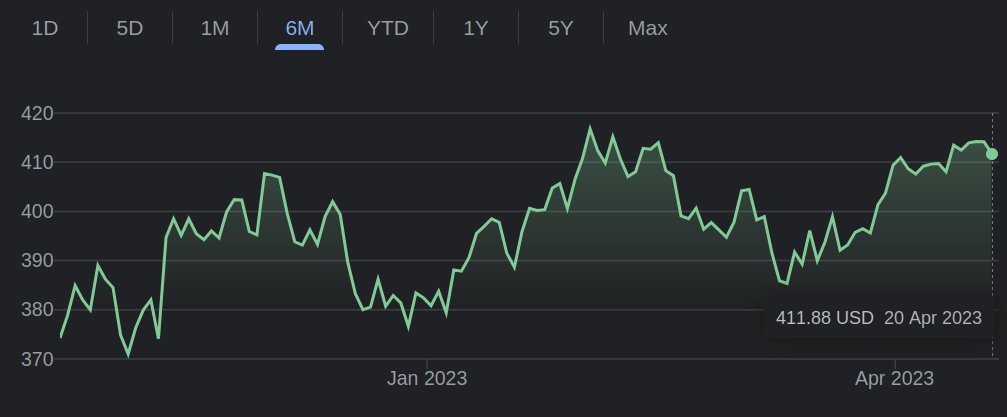
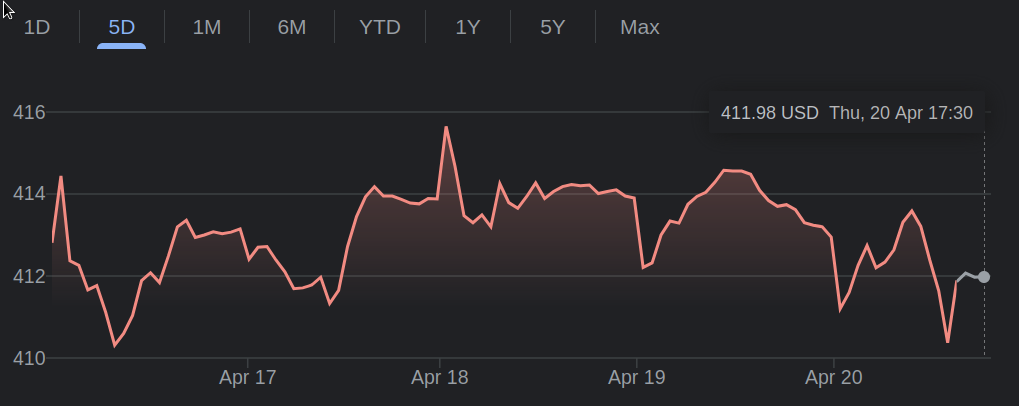
- Apr, 2023
- Apr 12, 2023
-
Palm oil. No alternative currently?
- Apr, 2023
- Apr 10, 2023
-
Flight to safety (lots of people doing this) might be a cost in the long term.But still too early to invest in high yield. Spreads haven't widened to compensate for current risk. We do see double risk of default in smaller for next 6 months. The pool is smaller.
-
APPL says PC demand will go down 40%, and drops shipments
APPL has a huge percentage of global phones, and people waiting to buy and show off their new purchase. But last year or two most tech news talks about their low quality laptops (differentiated from high quality years ago) and spyware phones (differentiated from perceived secure phones years ago). The general public doesn't know or care about these items though. But piece by piece the tech knowledge seems to be filtering over to them.Job report shows unemployment not near where Fed wants it to be, increasing chance of 25pt hike.WFC says might be worst earnings season in years. Everyone watching earnings for some info on what commercial real estate (watching bank earnings for this) is doing.A lot of these commercial real estate mortgages have clauses saying your interest has to be under a certain ratio. When your interest rate quadruples, all of a sudden you're no longer under those caps. So it's much harder to refinance, and at the same time banks are holding cash more dear.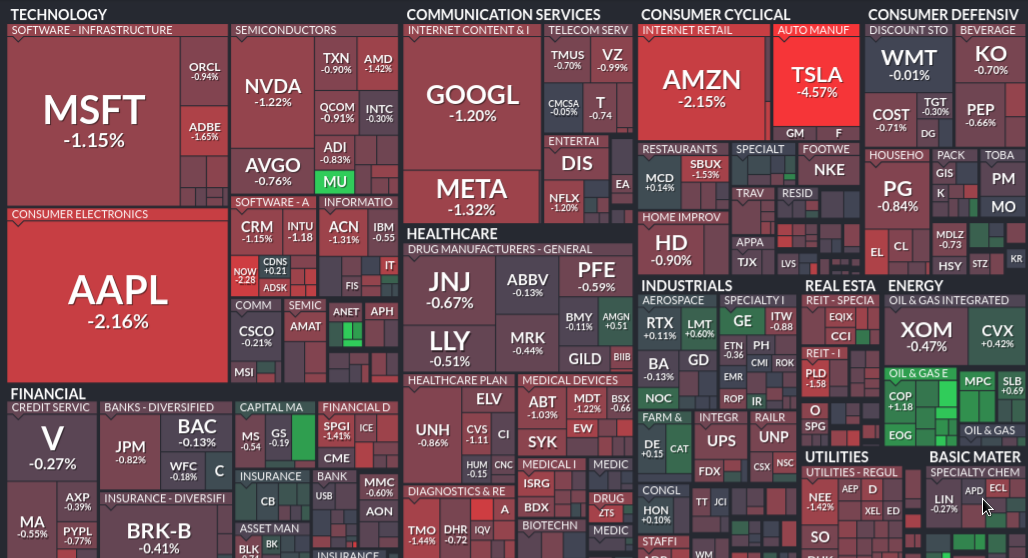
- Apr, 2023
- Apr 09, 2023
-
And money transfer services.
-
The northern third of Italy, where half the population lives, that's more technologically advanced then Japan. In output per hour of work, it's more productive than northern Germany. - ZeihanBut that part requires lots of energy to do so.
- Apr, 2023
- Apr 08, 2023
-
-
Q1 flows (flight to safety because of expectations of recession and lower earnings reports coming)Fixed income and International ETFs lots of inflows. Companies that are developed well there like Nestle. But now, shifting toward US ETFs again.There was flow out of US ETFs (only $3.5b) which is unusual, and despite US market up 7%.
- Apr, 2023
- Apr 07, 2023
-
Right now it's banks, then it'll be earnings, then liquidity in maybe June - Mike WilsonDebt ceiling debate this summer.'Because they've tried to alchemy out some of these sort of economic downturns, we might find ourselves where all the chickens come home to roost. In an inflationary manner, because they can't use the same playbook to take interest rates down, and we end up in a stagflationary environment. - DanThe banks are not operating as fluidly.
-
'The U.S. labor market is undoubtedly the strongest pillar of the U.S. economy today': Strategist
-
Jobs reportShowed a bit of increased supply or workers and tightening of hiring. Increased participation by men, which is considered important because much job growth had been just by women entering the labor force.
- Apr, 2023
- Apr 06, 2023
-
In second half, industry analysts expect earnings to go up and economist consensus is earnings will go down.
-
Something like $4.5b(?) might go into Money Market funds.
-
Small businesses depend on small banks.Minorities depend on minority banks.
Deciding who gets he loans. -
Bad news being bad news.
-
The Fed should have understood that you can't raise rates so fast - Zingales... because when you do, you impose losses in the bond market, and who's going to bear those losses? Insurance companies? Then you have to bail them out. Banks? Then you have to bail them out. Unless the losses are among us, the investors, then something happens.'Complacent.'Admati: 'Where does ability to absorb losses come from if not from investors like every other company?' If SVB had more ability to absorb losses it would have absorbed those losses.'You can build your equity by retaining your earnings, and you'll have plenty of money to lend. Just make a worthy investment.''A heavily indebted borrower, especially if the creditors are not putting putting tough conditions on you, like depositors don't, you love always borrowing more and more.'Funding with equity instead of debt, and also instead of all these fancy debt securities that magically will absorb losses.'The reserves is a completely different language and it's just confusing you to call it 'capital' and not to call it just 'equity funding'.
-
Where do you get beta now?You don't want beta. - Chris Harvey (you want to preserve capital)Earnings is not going to be favorable.WFC didn't predict recession but now do, after SVB etc.More regulation.
-
A great stock pickers marketTrans Oceans, Winn Resors, Cleavland Cliffs.Earnings estimates revised better.
-
Patiencea word making appearances
-
Chinese economy will look a bit different in upcoming, because it's not investment led, but rather pentup demand driven.Will bene parts of Asia, Brazil, other EM.Employment and consumer confidence (because of employment), will require patience.Regulation has been headwind, but will now be tailwind - Efstathopoulos
- Apr, 2023
- Apr 05, 2023
-
Central banks everywhere are buying goldRus, India, China, everyone is thinking to not depend so much on USD.
-
Expect USD to be in a multi-year bear market - someone
-
Since 1996, gold and S&P have both done average 6.8% per year
-
CPI is at 6. Fed Funds is at 480.Historically, Fed has never stopped a tightening cycle before CPI was below Fed Funds.
-
It's not just the economy the Fed cares about (so even if we get weak data they will continue to be hawkish). They care about full employment and stable pricing. - Adam ParkerJobs and CPI are not where they want, so if they get dovish now "I'd be surprised."
-
Fed will get above 5% and stay there until something breaks in a way that they can't ignore. - David Lebovitz
-
Business models in AI (content)?
-
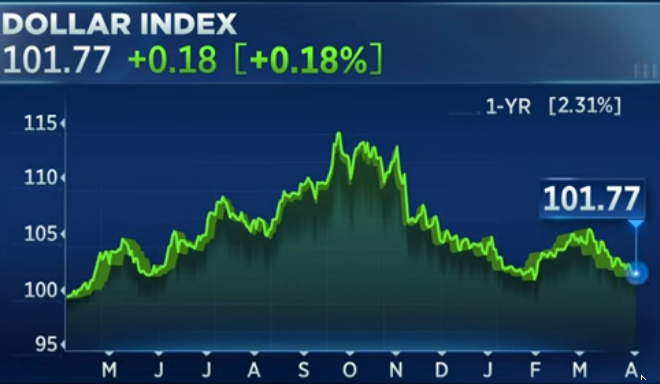 Dollar has gone down in past days and in past month. Means dollar holders don't believe the Fed can tighten much. - Komal Sri Kuma
Dollar has gone down in past days and in past month. Means dollar holders don't believe the Fed can tighten much. - Komal Sri Kuma - Apr, 2023
- Apr 04, 2023
-
'I think Jamie's wrong. I think we're going into a serious recession.' - SternlichtThe government has a massive deficit, and they keep feeding the deficit. That forces rates higher because too much supply of paper to pay for the deficit. Receipts are going down because capital gains are going away. Real estate as a complex, values are down. ... So receipts are going down, and interest rates are going up. The deficit will grow and he'll have to print more paper, and that should force rates up. That should make the economy weaken further. He's going to have to lower.
-
Europe has outperformed US in 1 year and 3 years, on some economic chart
-
Shadow Banking (middle market and credit lenders) will step up to fill void of banks not being able to loan - Bruce RichardsBest lending environment in a generation. 12 - 14% on direct lending. (The base rate has moved up from 0 to 5%, and spreads are then spread off of that 5%.)There are 300 banks in the US that will need to raise capital ,won't be able to, and will have to sell down assets. Meanwhile, deposit outflow will continue in waves.Weaker equity prices for regional banks. Fed will provide liquidity, it has tools from 08, so there won't be a liquidity crisis.
-
SA is basically the new Silicon Valley - JB
-
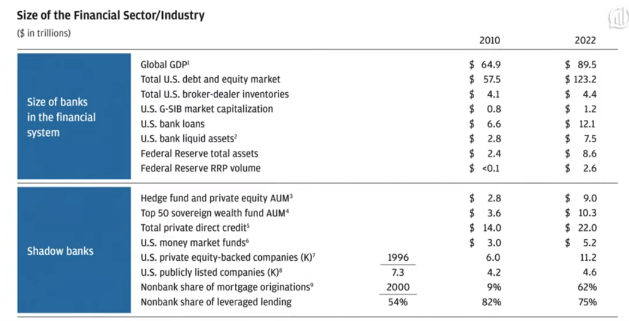
-
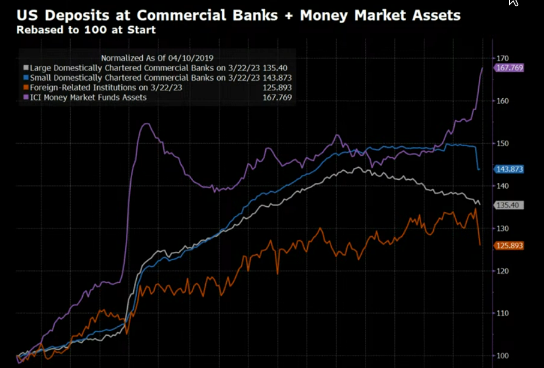
-
The market is still confused
-
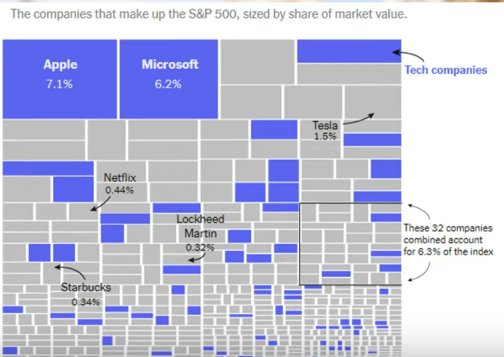 The Apple and MSFT market.
The Apple and MSFT market.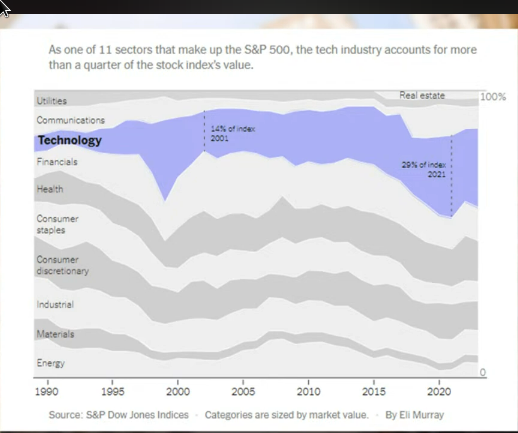
-
"Saudi Arabia has become the dominant player and is now setting the rules." - Danil Sereda"odds of another quarter-point hike at the next meeting on May 3 have increased from 48% to 57%""how the rise in oil prices will affect CPI expectations. Richard Excell writes in his recent newsletter that the same corn that is tied to oil prices through U.S. ethanol policy should also expect to move higher - a rise in food and energy prices will perhaps change expectations for CPI to fall further""They saw the price action in March where you had a 17% selloff followed by a 12% rally, and realized the market had succumbed to financial market players dictating price action, and price action moving away from fundamentals, and more to financial instruments (short sellers dictated action, and the Saudis have repeatedly said they don't like short sellers). And they really didn't like that. - BabinThe surprise would have reminded shortsellers and others that they (fundamentals) are in charge.If price spikes above $100, that is not good for SA (because it reduces demand) or for US.
- Apr, 2023
- Apr 03, 2023
-
'OPEC put' in the market nowThey've revealed their hand. They want prices around $90 ($95 Sanky said) and would be fine with $100.SA did this to offset the decline in prices expected because of recession. They just brought the price up to where is was 2 months ago.Negative for refiners. They've been outperforming in the energy space. Good for service companies, Shlumberger, Baker Hughes.
-
Managed money future division (hedge funds and CTAs) got extraordinarily short leading up to last week (a buy signal) (to SA this was a good time to squeeze the market back up to where they want it), plus the banking crisis (which was the impetus for the funds getting short), and the Biden admin selling SPR barrels out for the last year.So the admin could have bought these barrels back as they said they would, but kind of balked at the deal, and SA might have been sending a signal to the market with this (true surprise) move.
-
Decade ago it would have been the US, but now SA stepped in and made the call.Swing player will be SA and Russia, not US, said guy.
- Apr, 2023
- Apr 01, 2023
-
Should you lean into a bear market rally that you know is fleeting? "Absolutely not," he said.But some think tech will continue to outperform. 4325 for first half, said Ross ...
- Mar, 2023
- Mar 31, 2023
-
-
So much global capital has gone into US markets there might not be that much more to come in, so a small investment elsewhere can really move the needle.Structural pivots. Often what was scarce was then so heavily invested in in the last decade is currently abundant, and what was ignored for a 5-year investment cycle is now undersupply and there's opportunity there. In the 90s tech got overinvested, so when it turned things that were not tech (and were uninvested) got growth. Money poured into commodities, energy, etc. And then tech started to become interesting again in the 2010s. Everyone was in EM-commodity-real estate complex.We've overbuilt and overvalued cloud and tech. We have tons in the marketplace. But we're not heavily invested in copper mines, EM infrastructure, supply chains, hard assets, manufacturing. There's scarcity in real sectors.Cadence software, moved from software to subscription (stickier, more profitable), but everyone already knows it's a good company.Commodities don't often do well, but when they do, they often do very well. When stocks and bonds are both going down, commodities often go up.
-
Tech has a long runway of expected future growth, generally prefer deflationary environments with low interest rates, because of the low cost of capital and you can afford a long runway (10 to 15 years), let that compound.Energy and financials, inflationary environment, higher rates and higher cost of capital.To sell winners and buy losers, you need a thesis for why that's likely to change. Depends on cycles, rotating into things. Systematic framework to monitor it.
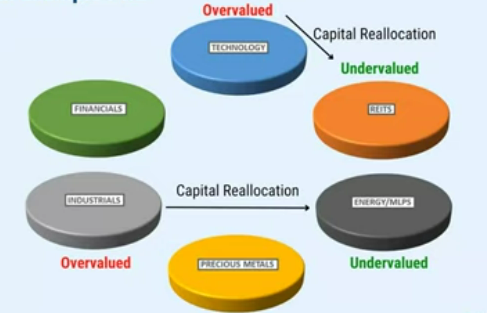 Don't gauge for one year. Rarely in one year is valuation the primary factor. It's sentiment and fund flows and liquidity conditions and tactical things like that. For one year, look at trading indicators and flows. The following chart shows 5 years, but longer amplifies this.
Don't gauge for one year. Rarely in one year is valuation the primary factor. It's sentiment and fund flows and liquidity conditions and tactical things like that. For one year, look at trading indicators and flows. The following chart shows 5 years, but longer amplifies this.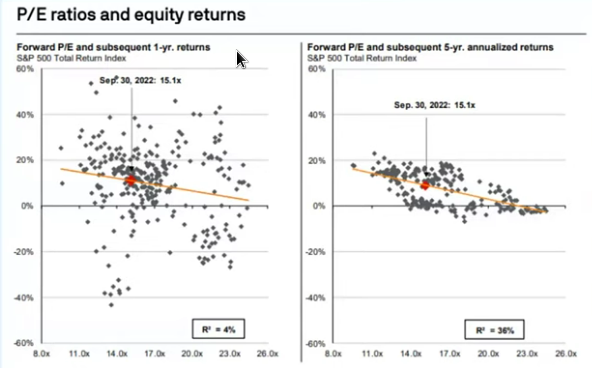 EM inverse correlation with USD, because they have $dol denominated debt (not to US mostly but Japan, Europe, China), so if USD strengthens their liabilities get harder.There's really only been 3 cycles in USD
EM inverse correlation with USD, because they have $dol denominated debt (not to US mostly but Japan, Europe, China), so if USD strengthens their liabilities get harder.There's really only been 3 cycles in USD
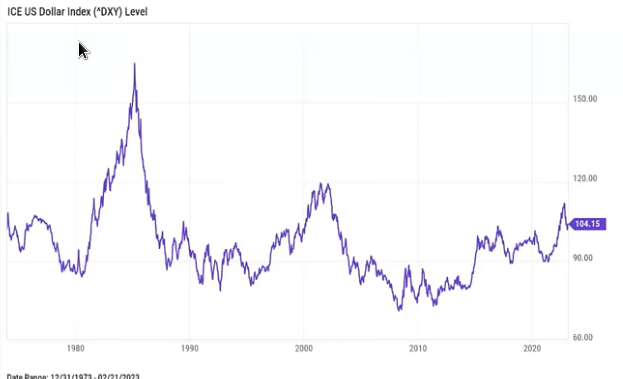
-
Bury tweeted he was wrong to have said 'sell'
-
Look at companies that have earnings and have earnings growth, and have free cash flow
-
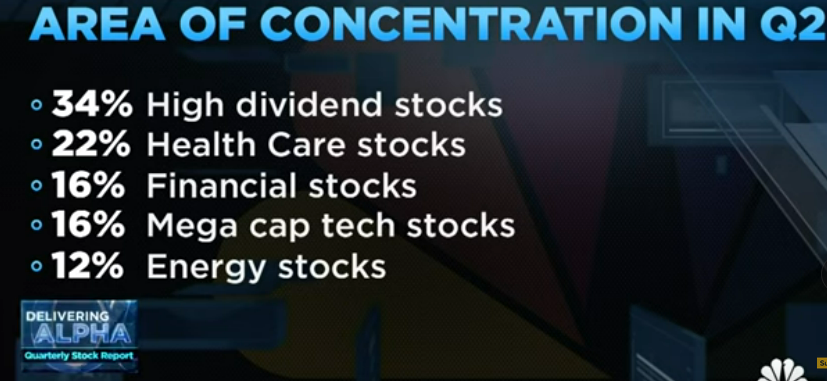 Strategists who were asked
Strategists who were asked -
No longer flashing red, now flashing yellow, in economic warnings, said El-ErianMoving from liquidity to capital, and from financial contagion to economic contagion.Will play out probably in the Q3 and 4, and play out over years.Trust was restored in banking after recent event."When you have a lapse of supervision, the risks of fragility are very large."
- Mar, 2023
- Mar 30, 2023
-
Market getting a bit complacent on what we can see for the rest of this year as we start to see the banking crisis filter into economic growth. - HornemanCredit contraction.
-
- Mar, 2023
- Mar 29, 2023
-
Is it gonna go back to buy the biggest 7 or 10 stocks and that's it? like before?
- Mar, 2023
- Mar 28, 2023
-
Oil prices to rise even if we do slip into a recession, he said.
-
-
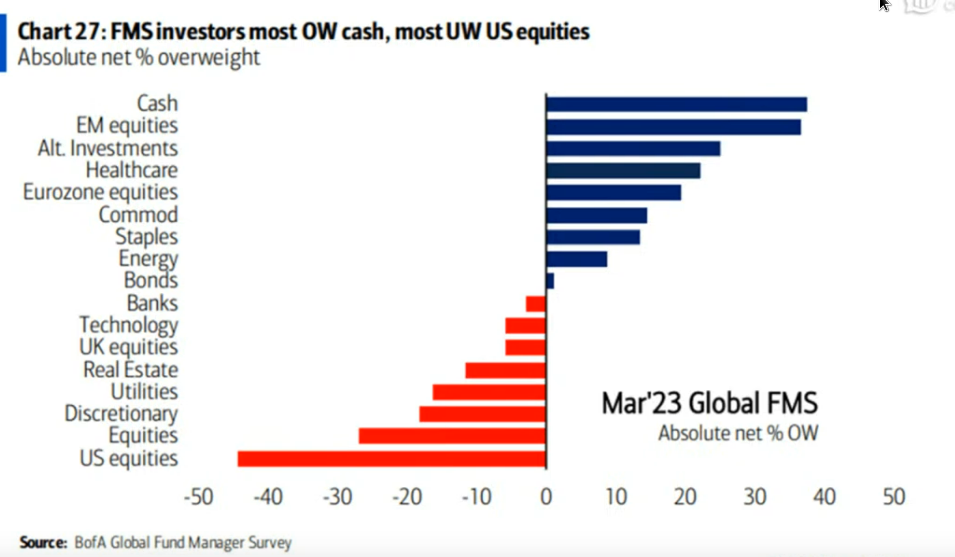
-
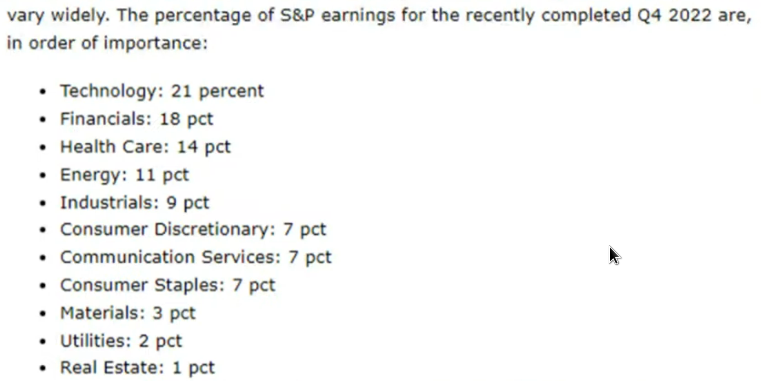
-
Unknown how US gets out of bailout guaranteeds."Capitalism had a minimalist government culture in their mind." Until GreatDepression when power was taken too far. We've kept increasing government.Rescue Culture started in 1980s with a bank.The interconnectedness is something that scares us.Why do we have such low productivity growth? So much government intervention undermines capitalism?"I have no doubt they're all (not just banks) going to be rescued, because there's no appetite for any pain." The political consensus is not there for that. "What should be done and what will be done are two very different issues."
-
BreadthFeb 71% of stocks were above 200-day. A strong bull market. Now down to 38%, which is December levels.
-
RollingThe LDI scandal in London in Oct, then it's rolled over to regional banks, then it's rolled into CS, Deutchebank elevated, MetLife, Lincoln Financial CDF, and then commercial realestate loans. This is clearly a rolling credit crisis, said Larry MacDonald.The Fed is stuck in a 'fighting inflation' narrative which they have to stick to because it's a very public narrative, they've preached it. The credit risk is about to veto the Fed policy battle.It's really spread out. Banks, insurance companies, and all kinds of people own these bonds that were sold at 1-2% and are now at like .80.
-
"We're kind of hitting those limits of what people can consume" in ways that they hadn't seen before.It was controversial when Roku decided to make TVs (not just a box you plug into other people's TVs). There's been a shift to smartTVs from a box, he said. All-in-one integrated solution.The brand now is their user interface. You instantly know how to use it when you turn one on. "If you have an interface people like, and you build on that, there's limitless potential."They need to stay ahead of the competition and the consumer, and continue to really be a driver of how consumers use things. They're really dictating ... it's not that users were demanding certain things ... a company can bring the consumer to that.Some companies make the device, the UI, they're the gatekeeper and make money on all the transactions that take place through those processes.
-
-
7000 workers in that department.The term itself ('meta') has become a turnoff. - Cramer, who also said that 'the meta of Zuckerburg is one where I'm a cartoon figure, and that's a loser.' We can add to that data mining, biometric/identity loss/harvesting/use, privacy destruction.
- Mar, 2023
- Mar 27, 2023
-
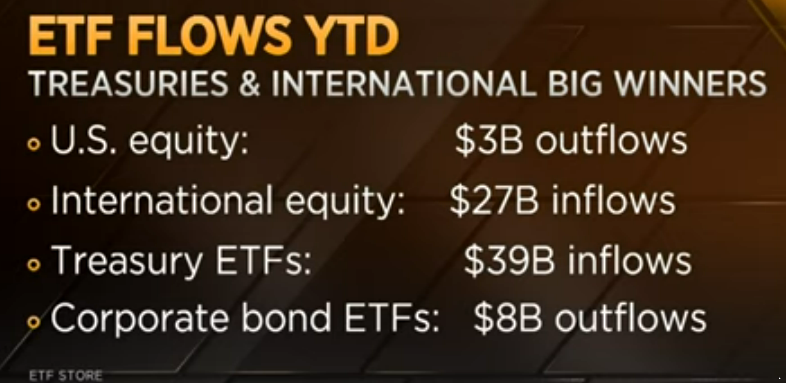
ETFs still the thing of choice. -
Office space going vacant (leases are coming up slowly, and companies are thinking they don't need as much space now), and if there's losses, what do the owners (banks) do? They can't really hedge it. If you sell it, you realize the losses which itself becomes a problem and perpetuates the cycle. If they raise cash that destroys profitability in the longrun.Rising re-financing issues. Will there be enough investors to buy packaged loans to keep this machine running.Debt market. How open is it? Right now there's concern. We haven't had an investment grade-rated bond deal in a week, said Greg Zuckerman. Junk bond spreads are wider (not suggesting credit risk issues). But the interest rate risk could go to a credit rate risk, is a concern.In 2008, analogous but different, it took about a year for some of the risks to move through the system.
-
Possible liquidity in banks issue, if citizens take to heart that they're making like 1% or maybe less on their deposits, but that t-bills make 5%, they'll all move their money out of deposits. - GunlachFed should have raised rates faster, Gundlach said, and instead inflation came. He thinks if the Fed had raised rates faster, the losses (sbv etc) would have been less in the long bond, because the long bond was forced to itself price in inflation, because the Fed wasn't fighting inflation.
- Mar, 2023
- Mar 26, 2023
-
Chinese government borrowing at highest rate since like 1997Stepping in and getting the economy going again.
-
Amazon bought a camera review site (to keep it going?), and now is laying off staff, and is closing the camera site.Big companies buying small companies. Hurts longterm viability of the smaller organization?DPReview.
-
Inflation happens when demand.Work for the side of the offering, so they can produce more, is recommendation. Fore as much as you reduce taxes, you're going to end up collecting more.
-
Jan Stuart doesn't see how oil market can work at $60, so if it goes there, it will be brought back up (by Saudis and friends cutting supply?)US has a lot of crude stored.Potential recession (with new banking aspect) means questionable demand (although demand looks fine from Asia).Refiners should do well because the crack, the difference between price of oil going in and coming out of the refineries is decent, said Robert Yawger.
- Mar, 2023
- Mar 23, 2023
-
Apple to invest more in movies$1b is not a lot for apple.
Later, this can factor into Apple TV+. Prestige from Oscars. Tapping talent in different genres. Smaller movies though, under $100m.Amazon made about a $1b movie commitment last year. 12 to 15 movies. -
"We entered this year with around $620b in unrealized losses on bank balance sheets, which doesn't really matter unless deposits start moving around, and unfortunately that's what's started to happen." - Dan NilesNo more easy money ... cell phone banking ...
-
Jobless claims decreased again (2 weeks)Fed raised rates .25.Stocks are up.
-
"Efficiency" is the word for this phaseFacebook's "Year of efficiency". Gamestop used it, too.
-
Depends on the city. Some cities, you can't easily re-purpose (paperwork) from commercial to residential.
-
JB said tech stocks are rallying hard because since everyone is worried about not having enough cash / having to borrow, investors like companies with really strong balance sheets.
- Mar, 2023
- Mar 22, 2023
-
We've seen 10 or 12 stocks be the market in recent years. Now we'll see many different companies participating, said Mike WilsonA more democratic stock market. And more idiosyncratic. The company within a sector that can actually capture this margin and not squander it away when they get a headwind.In 2020 and 2021 operating leverage was positive, and now it's negative (it will eventually turn positive again but not next year).Look for companies that will benefit from Real Investment (versus Financial Investment). Past 30 years real cost of capital was below the rate of growth, and it didn't make sense to invest capital in risky projects, but rather to borrow at negative real rates and buy back your stock. Anything that has long duration and any growth can do this, investing in M&A, buybacks, things that are like financial engineering.Now, who's gonna benefit from real investment? Industrials, financials, some of the commodity complex including materials, energy, technology (which is basically capital investment, it's a growth industry but it's also deeply cyclical).
-
During bear markets, you see these declines, and they don't always make sense fundamentally, because you have active and passive managers who have to do things they don't want to do. Deleveraging. "Hall of mirrors." - Mike WilsonSo you see something that looks attractive and it might be a headfake.
-
People nowadays can move their money with their phone in a few minutes.
In any time of insecurity, they'll move their money to one of the banks they think the Fed is guaranteeing.You need a stable deposit base for banking, and smaller banks might not have it. - Mar, 2023
- Mar 20, 2023
-
6b Euro from taxpayers?
-
Choppy marketsPossibly kept up a bit by tech. But tech hasn't yet posted data on revised earnings (which some say could be negative), and that could bring markets down, if other sectors which have dropped significantly recently haven't bounced back yet.Amazon cut 9k more jobs, in it's growthier, more profitable areas of advertising and AWS. AWS used to grow at 30/40% and that's expected to go to the teens. This doesn't really affect much the huge amount they hired during the pandemic. Amazon doesn't have the strong balance sheets nor growth that other BigTech has. Amazon might be in a decent position to scale back, though, without detriment.Recently when these companies fire a lot, their stock goes up, but Amazon was down.Lots of revenue comes from advertising, for Amazon, Facebook, and Google (Apple? MSFT?).If businesses aren't making profits, tech products are expected to be patronized by them less.
- Mar, 2023
- Mar 19, 2023
-
"Where are your deposits?" That's a new thing.3b for CreditSuise. They raised 4b recently, and now it's worth 3. Said to have been worth 10b. "If we get a look behind at the balance sheets, are the losses more concerning. If all banks are selling bonds, the cost will be lower that they're making.Deposit flight, if unchecked, creates forced sellers.If not sold, their other option was nationalization (or winding down the bank).
- Mar, 2023
- Mar 17, 2023
-
Big Tech also rose on market down days. The tech sector rose like 10% over the week.It's considered to be people who have large stock holdings moving out of other things.
-
Past phase was people buying dividend-paying stocks. And that's still the case.
-
Grey SwanIndustrial policies, aquifer depletion, mineral insecurity.
-
During the past week of days when the market was bearish, bitcoin has risen significantly, like gold and treasuries, as a 'safety' move.25% of American adults own Bitcoin according to some sources.
-
Bank stop. All the US banks put in millions/billions to help FRC (which also borrowed from the Fed with the Fed's new borrowing thing).To keep confidence in banks.Switzerland said it would help CreditSuisse.Both stocks bounced back after these news, but afterwards lowered.
Switzerland, does it really have enough money to really help. "Too big to succeed" bank there. -
"It is systemic. The Fed has forced many of these banks to reconfigure their portfolios so as ... they are having duration risk." - Art Cashin"A failure of supervision rather than regulation." "The regulation was there.""Earnings have come down around 11%." - Chris Toomey"We're realizing that all of that activity that the Fed has put in in such a quick fashion is really creating breakage in the system." Fist the banks (which handle money) and then other things in the economy. Especially businesses that really shouldn't be operating at this level where the costs of funds is higher. Values down or out of business.He said that he was looking for 3600 (real pain in the market) before he starts putting money to work, rather than any other news that could happen.
- Mar, 2023
- Mar 15, 2023
-
'2023 banking crisis' massively disinflationary?Lots saying that. Some even that the Fed won't have to raise rates as much because this will do it for them.Gundlach thinks maybe disinflationary in the near-term. But the response maybe instant backstopping with more pressure on regional banks so more inflation.
-
Now that interest rates are much higher (than past 40% of only declining rates everyone is used to), maybe it's going to be much more difficult for bonds to be rolled over at higher interest rates levels. - GundlachHas a high yield bond ever really matured? Aren't they all just default or refinanced? because there's stable and step function of interest rates and so companies over and over again got the ability to refinance, but they can't refinance now. ... We should probably be worried about TripleC bank loans (lowest tiers of debt) (6 or 8 to 10 or 12 percent).
-
[Powell] needs the banks to raise their rates on consumer loans but not have to deal with the FED hike so they can make the profit off consumers to pay back the bailout.
They don’t even hide it anymore. - Random guy
-
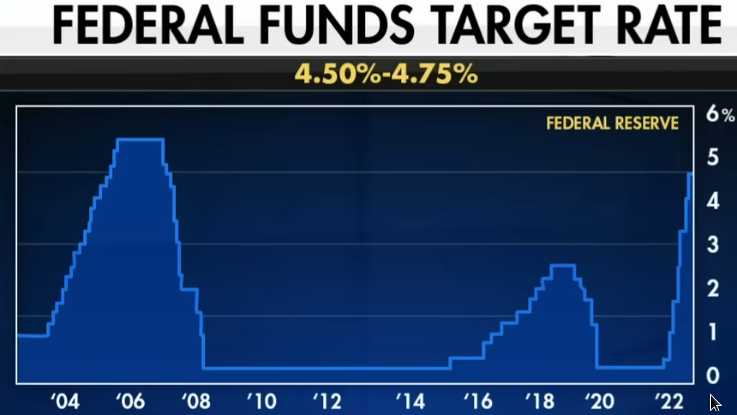
-
Yield Curve SteepenersOne macroeconomic scenario in which using a curve steepener trade could be beneficial would be if the Fed decides to significantly lower the interest rate, which could weaken the U.S. dollar and cause foreign central banks to stop buying the longer-term Treasury. This decrease in demand for the longer-term Treasury should cause its price to fall, causing its yield to increase.
-
(Even) Tom Lee 'can't' be as positive as he has been previously. They sent out a note saying there'd be ripple effects from SVB.After years of complete bullish comments, past few months he's been a bit more reserved but still voicing that it would be bullish afterall, but this is the first time I've heard him say something bearish."The cost of money for banks is going up so it's going to drive a necessary contraction of credit.Founders (many) are now nervous where they bank. But also some regulators have been advising banks to pull back their lending to Fintech startups. "So I think there's going to be job losses.""I think it's wrong to be bullish short term." Because although the market is down, no one wants to step in and say they want to buy.
-
House buyers and sellers seem to be comfortable with mortgage rates between 6 and 6.5% - RossellAbove, activity stops. Back there, activity picks up. So that might be the longterm rate.
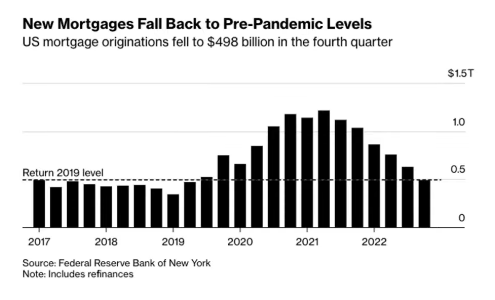 Demographic factor. Those mellenials tha had put off homebuying are now in their 30s, and will have to accept higher rates. Demographics will overpower anything else going on.Debt servicing. The group that is defaulting most is GenXers (young people).Still $2t in excess savings sitting around in bank accounts.An individual will pay their mortgage and their car payment, but cut everything else. Government service workers will be sent home. This will reduce consumer sentiment. People will stop spending money (people are currently spending just fine). Market and economy will decline, and everyone invested in those things will feel a lot poorer.Creditors around the world will demand higher interest rates to hold our debt because they will trust us less.What's ridiculous is that it's not that we can't pay. It's that we're unwilling to. (Contrast with Argentina who defaults because literally they can't pay.)
Demographic factor. Those mellenials tha had put off homebuying are now in their 30s, and will have to accept higher rates. Demographics will overpower anything else going on.Debt servicing. The group that is defaulting most is GenXers (young people).Still $2t in excess savings sitting around in bank accounts.An individual will pay their mortgage and their car payment, but cut everything else. Government service workers will be sent home. This will reduce consumer sentiment. People will stop spending money (people are currently spending just fine). Market and economy will decline, and everyone invested in those things will feel a lot poorer.Creditors around the world will demand higher interest rates to hold our debt because they will trust us less.What's ridiculous is that it's not that we can't pay. It's that we're unwilling to. (Contrast with Argentina who defaults because literally they can't pay.) -
3 to 4% inflation before they can ease on rates - Marci Rossell
-
El-Erian and other usually-critical/negative commenters have been listened to but ignored in part, in recent years. Is it because they didn't resonate with the optics of the market? Whereas in a bear market, they will be listened to like before but also their takes will resonate?
-
Yield curve steepeners
-
Governments print too much money whenever the pain gets too great. - Michael NovogratzProbably European banks will do the same thing (for banks like Credit Suisse) as US (for SVB). - BookvarPowell was just 2 weeks ago talking about having to raise rates to 6%. Now it's Oops.The Fed hikes rates until something breaks, and last Friday something broke, and now we're seeing lots of things break.Banks stress testing themselves and saying It's OK we're stress testing, is truly laughable. - Sen. WarrenThere are all these risks embedded in the balance sheets (of banks). - AmyThe deposits are safe, and the the banks have a wide-open window at the Fed where they can get liquidity. - El-ErianFFed credibility is really at stake here (so they should separate the 2 issues and continue with 25points). "If you comingle these two things too much you will end up in the muddle middle. - El-ErianFinancial sector capture of monetary policy over the past few years.Now all of us have to pay through lower bank interest and more difficult loan conditions for ... dumb CFOs. - ZeihanThe damage has already been done by decades of mistaken monetary policy on the monetary and fiscal. - RoubiniInterest payments of $10t on the debt we hold because of higher rates. - FoxNews anchorWhen inflation is rising, stocks and bonds both lose money. When inflation is low, stocks and bonds make or lose money inversely. - Roubini
-
Are some of these banks going to have to go out and start raising equity?How do banks rebuild capital? They lend less.
-
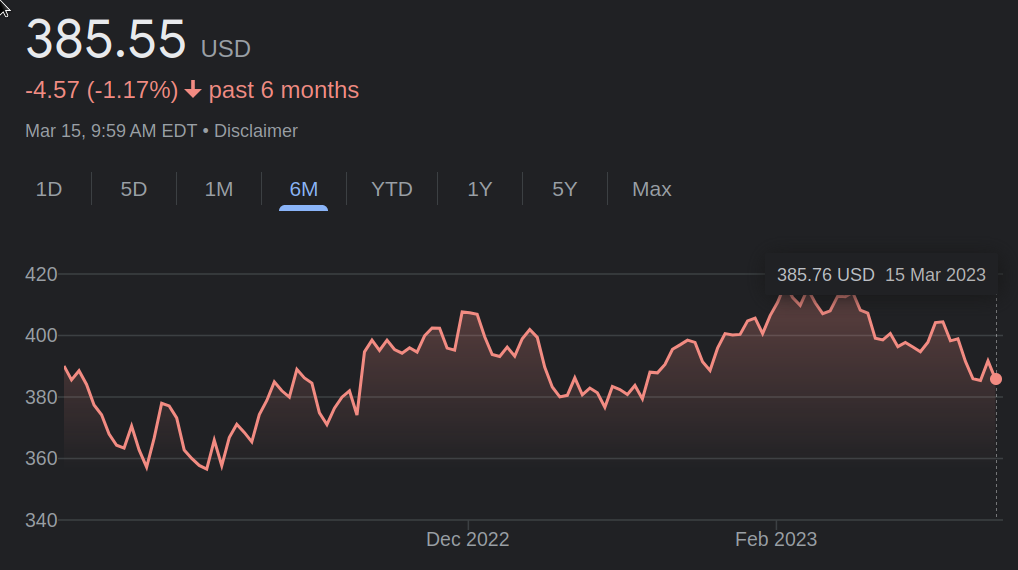
-
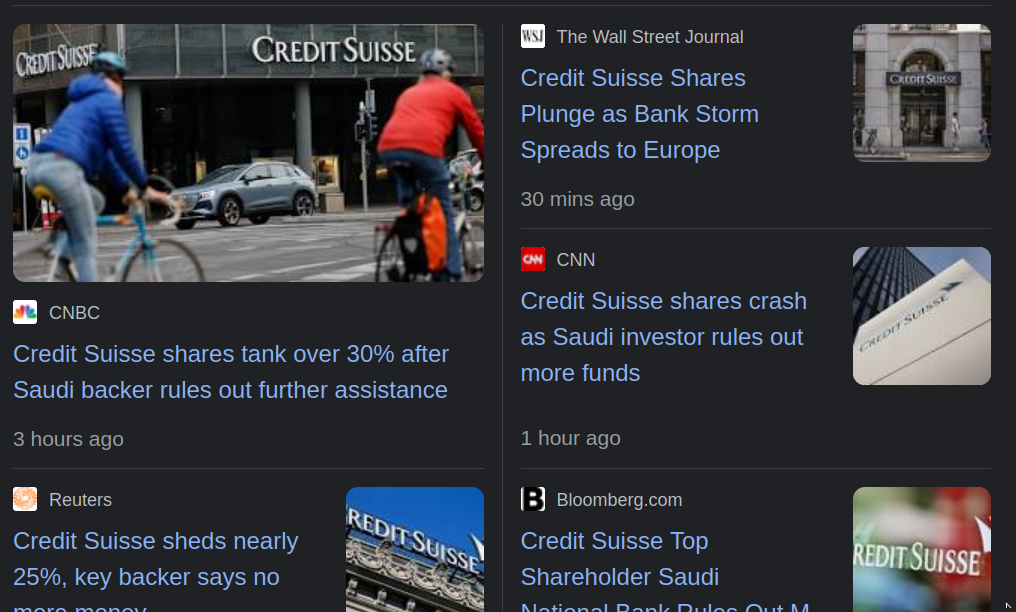
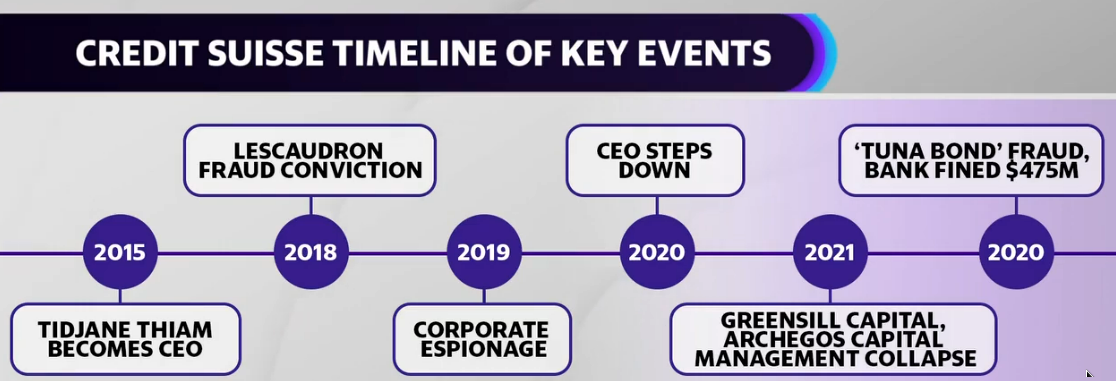 Compared with SVB, CHF would have a systemic effect because it has like $700m (SVB had like $150m) and is significant for Europe and also global.
Compared with SVB, CHF would have a systemic effect because it has like $700m (SVB had like $150m) and is significant for Europe and also global.
Does Switzerland have enough money to bail out CHF though, even it if is TooBigToFail?
UBS was down like 8% compared to CHF's 20%. - Mar, 2023
- Mar 14, 2023
-
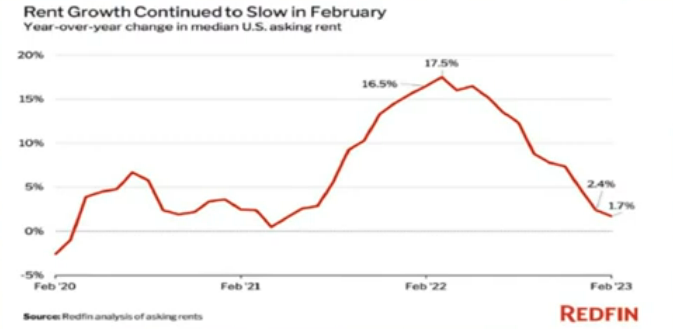
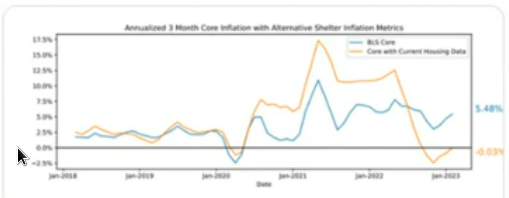
-
Interest rates 0 to 4.50 in 12 monthsBanks might turn into utilities. Utilities have to get permission from the state (they present to the municipality every couple years) they operate in to raise rates ("a rate case").
-
Next after the bank thing might be commercial real estate (and banks that are heavily invested in it)... also to watch for non-performing loans (which currently aren't showing concern).Credit risks. As credit conditions tighten (which probably). And banks focused on that.
- Mar, 2023
- Mar 13, 2023
-
How to value banks (which could currently be on sale)Start with tangible book value, then make adjustments for unrealized losses that are in securities portfolios. The available forSale losses are already included.However, with banks, headwinds include that access to capital will be constrained. There won't be capital raises for a while.Loan portfolio reset as we go forward. With higher interest rates and Fed tightening.Marinac said the flight to BigBanks won't last forever. The main lending is still mid to medium sized banks.
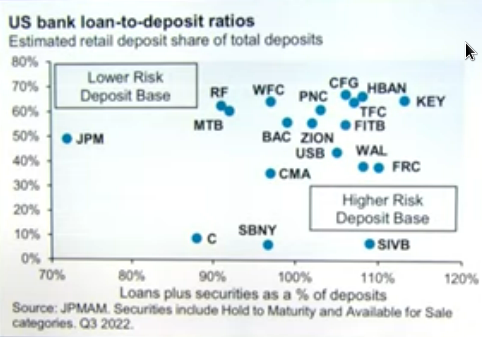
-
If all the deposits go either to BigBanks or Off Balance Sheet (they sit in Treasuries and things like insured cash sweep), what then happens to the cost of funds? How do you lend without charging exorbitant fees?
-
SVB banked 50% of the startups in the US and lots in the world.So not having them any more as a capital provider. (JPM is not doing early stage VC.) So many companies relied on SVB not just to do their servicing, but to provide them non-dilutive financing when they needed it in the early days. What happens with this gap (other banks aren't doing this early stage debt).SBV was the beacon from a financial perspective of providing them the financing they needed.You still need somebody who can fund this market.
-
What does that mean for the American economy in terms of our dynamism and willingness to loan and take chances.What does this mean for the future of innovation and VC funding? Who's writing checks right now?
-
2-day collapse and gov stepped in with emergency measures to stop a broader failure.We haven't seen a bank collapse so fast in years (2008 yes). Although lots of bank collapses in US history, these are different things.
-
"A giant bailout." - Aaron KleinHe hoped they would sell the assets of the bank and not resort to providing unlimited deposit insurance.Some market risk and have some banks bear some risk.SFB had 97% uninsured deposits. Whose biggest account seems to have been a $3b account with a cryptocurrency. And a bank where all the insured depositors had already been taken care of. "We're risking a fundamental structural change to our regulatory system, in a situation where you had a bank completely under the nose of the SF Fed. Where was the supervision?" It grew massively over a couple years and and blew up a giant unhedged interest rate risk tied to Fanny, Freddy and US Treasuries. "That should be red flag red flag red flag for regulators," said Rajan.But what should have been done differently? Like many banks, it received tons of stimulus deposits, and short term bonds wouldn't have made any money, and it chose long term bonds. The Search For Yield problem when the Fed pumps the system full of liquidity while having rates so low banks don't make any money, so they end up taking more risk."I cannot believe the pres dared to say well we just need more regulation. I thought they already did that. " - BahnsenThe Fed continuing to pump in liquidity past where they needed to is the real issue, said Bahnsen, which led to crypto and silly IPOs and SPACs, that's how that deposit base came up. And then they overtightened and destroyed value on the way down.
-
 Just forced gifts of equal value?
Just forced gifts of equal value? -
Lending to VCs to change. More equity-like, less loan-like.
-
Was there shorting?
-
SVB had historically called for less banking regulation (which perhaps was the reason this happened), special tax treatment in the form of carried interest

-
"My sense is that all these regional banks are still here on Friday but they're half as big as they were." - Liz HoffmanAnd they're going to replace this incredibly cheap deposit funding with prevailing Fed funds rate at the new facility, which means their margins just collapsed. So none of these stocks are going to trade at remotely what they've traded at for the last couple of years.The business model's not the same. Their loans will cost a lot more (but have been massively below market for a long time.)Why would you have your money at a small bank when there's even a remote risk of this happening again?Big banks' competitive advantage is that people think they WILL be there long term. Now they may lose that security to small banks.
-
The reason SVB caused such huge impact was social media, some commented
-
A preferable solution (to guaranteeing deposits for all the US) would have been a private solution (someone buying SVB), said Altman.But that would depend on the government would enter a deal where they would provide certain loss protections to a buyer. The gov wasn't willing to do this, possibly because of the politics. Bear Sterns / JPM et al 2008 were very unpopular, and for this reason they might not have been willing to do a similar thing here.
-
"Here's a banking institution which most Americans never heard of, which was not designated as systemically important, and over a 72-hour period, it threatens the entire financial system and financial market stability." - Roger Altman"And the banking regulators decide to guarantee the deposit base of the entire US financial system, which is certainly what they just did." (Will this lead to less disciplined management? Will there eventually be pressure to limit shareholder returns, if you're guaranteeing the key liability of these institutions? If the taxpayer is paying to guarantee the key liability, will the taxpayer ally the shareholder to realize the benefit of that?)"Testimony to the fragility of finance in the global digital era when individuals and institutions can move money in seconds. It's testimony to out-of-date regulation. ... This institution wasn't subject to stress tests and the tighter capital ratio, liquidity and leverage strictures which the biggest banks were subject to. It's testimony to out-of-date deposit insurance.
-
"Until people see they have an asset that's worth 100% of the dollar.""Find a level that's comfortable."
"Some humility in Tech." -
Bank stocks (and all stocks with them) downThere's stress on the banking system, and that should be shown through equity valuations.
-
US banking regulators easing of terms around the discount window, through a special new bank term facility"The Fed is willing to take as collateral the good, relatively riskless assets that banks hold and provide liquidity should give everyone comfort" - Roger Ferguson"It really does say the Fed is ready to give liquidity to banks that are in good shape, and that, I think I hope, is sufficient to give the kind of confidence called for."
-
Treasury bonds dropped in valueViewed as a flight to quality.Good for banks usually.
-
After SVB,Will the smaller banks need capital raises? If they do, you have to be careful buying any of the regionals, said Cramer.JPM and bigger banks, well capitalized, will be fine, and may be the beneficiaries.Some banks don't have sticky deposits, and it will be hard for them to keep deposits.
- Mar, 2023
- Mar 12, 2023
-
60% of Americans prefer Costco and Walmart "non-traditional stores". Staple items on sales, upping rewards on loyalty programs.Kroger stepping up specialty which is fresh produce, building brand loyalty.Store brands mean 10% less.1 in 5 shop for groceries at Dollar chain stores. They want you to see that they have the exact same quality as a name brand. Often you'll see a comparison (products beside each other), with two big stickers next to each other.Partnering with Insta-cart.You can save if you do research before going shopping. Also you can track what food you have in your house and what's running low with apps.
- Mar, 2023
- Mar 08, 2023
-
Vol low because correlation is lower than years previous - Wu Silverman80% of gains were attributed to like 7 stocks before, she said. They would all go up (or down) together.Investors aren't hedging very much these days. (Don't know why.)
- Mar, 2023
- Mar 05, 2023
-
- Mar, 2023
- Mar 03, 2023
-
'The Fed has no choice but to engineer a hard landing'... because to slow inflation it has to get unemployment to like 5%.You have to position for that eventual slowdown. - Priya MisraWhat 's keeping the consumer going is accumulated savings, but at some point they'll come down.Goods spending has already started to come down. We're watching services.
When service spending starts to come down I think the job market starts to come down as well, Misra said. - Mar, 2023
- Mar 02, 2023
-
Pandemic was just saving, and now they're spending that unusual savings rate - Becky
-
"The Tragedy of the Second Best"The further you are away from the right policy response, which they fell behind on, the more whatever you do has collateral damage and unintended consequences."If you stick to 25 and go 'higher for longer' you risk hiking into a slowing economy and you undermine your credibility." - El-Erian"If you go to 50, you undermine your forward policy guidance and the narrative of disinflation (said 11 times during the press conference)."
-
"We need the two year to stabilize in order to have a foundation for risk assets."10-year, you have to think about growth (more factoring in of recession).
-
Fed hikes (90 basis points) are priced in, but also Fed cuts (130 points) are priced in.
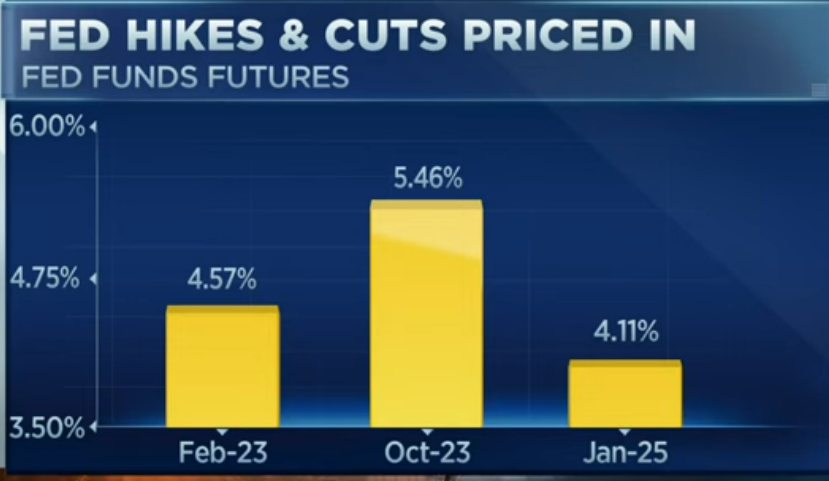
-
"We have no idea what's going on with productivity."Unit labor costs were expected to go up like 1.5%, but went up like 3%.Productivity surged during pandemic. A lot of workers were laid off, and then came back in.
- Mar, 2023
- Mar 01, 2023
-
Russel does a much better job of differentiating growth and value stocks - Charlie BobrinskoyInterest rates declined for 15 years (with the exception of last year). Value stocks earned their money in the near term. They don't get helped so much by a drop in interest rates as Growth companies whose earnings are 30 years into the future.People are also interested in Growth stocks because the grow more. Growth rates.However, growth over 10 years always lost to value, before 2005, because people want to own growth which pushes up the stockprice, so they overpay.
-
Because of interest rates.And...About 2% of people want to do entire transaction (deliver the car to me) online, but 70% want to do more of it online).Shop, finance, buy, and sell. Services Cargurus offers.Instead of a 5-hour process at the dealers, they pick it out and do maybe an hour at the dealers.
-
33% of women quit or considered quitting their jobs in past year - CNBC surveyHalf of those who said they left their jobs said they did so for better work-life balance. Half also said stress. Half also said for more money. Leaving and taking another job seems to be better than pushing for a raise.
 VP (execs) level job women have left in record numbers.About 25% of women said they 'wouldn't work in a state that bans abortion.' Overturn of RvWade happened recently.
VP (execs) level job women have left in record numbers.About 25% of women said they 'wouldn't work in a state that bans abortion.' Overturn of RvWade happened recently. -
US companies are exhausted but committed in China after 3 years - Michael Hart (AmCham)Lots didn't make a profit in China last year.Is China building its own systems, will there be an advantage for Chinese companies, and how big a role will US companies be able to play in China?Do they feel welcome? Chinese customers definitely want to buy US products. So issues would come more from national sources, and may be pushed back against by consumers who want the best product.75% said they weren't leaving China. The others are looking at options (derisking, building additional operations in other countries). Sometimes because the companies are asked to do so by their suppliers.
-
3 months ago the majority of Morgan Stanley's clients thought a recession was likely, and now they think it's not so likelyWilson thinks the earnings recession is far from finished, so the bear market is unlikely to be near finished. Could be done now, could go down 20% to their basically stable thesis of low 3000s.
-
Firing might be moving to industrial sectorFine in Tech sector, but people will not want to see it in industrial.Currently just in auto makers.Also, there might be something to the leader-follower dynamic, like if the Tech Giants are laying off thousands, smaller companies might say well they're doing that for a reason so maybe we should cut costs too. And same for other sectors. We could draw a Cascading model for firing here.
- Feb, 2023
- Feb 28, 2023
-
"This new supposedly generational opportunity in AI"Nvidia is up on guesses it will be able to capitalize on AI like chatGPT, but so far no one has demonstrated much real use cases for it (we're about 2 months into mass public adoption). Not long after adoption start, some called it the bubble of 2023.
-
Big tech companies have used cutbacks (firing) to maintain their valuation, but how will they maintain valuation in coming quarters?Investors are also looking at company's ability to attract/hire talent.
-
Housing market and borrowing in the economy, 2023
Typically, when rates rise borrowing continues, because income growth in some sectors slows and the consumer responds by borrowing MORE to maintain their standard of living.
Housing is the weakest sector right now. An inherently slowmoving cycle (years to play out, so into 2024 some say).
Homeowners are locked in at really nice rates, so they're not moving, and less people want to buy in because of higher prices/rates, so rent (also a big part of CPI, so contributes to Fed's Tighter for Longer). So they won't be borrowing. Very mean-reverting.
Home prices will fall (eventually forced sellers, those who have to move, with maybe a 10-15% national house depreciation.
https://www.youtube.com/watch?v=tQxOxR-n3_s
Yet, pending home sales jumped from Dec to Jan 8% (street expecting only 1%). But a more solid indicator, morgage applications, are down.Singapore: Private retail condo prices falling outside of cities, but in cities still rising.Property volume, transactions, is down a lot. Instead of 10 viewers, more like 2 viewers. He advises people looking for rental tenants to secure their tenants, because a huge amount of new flats are coming on the market in the coming months and years.
“$1m load payment interest $40k. Who can pay that?” Meanwhile t-bills are paying 5%.
Only thing pushing up prices Chinese coming in. But the Chinese economy isn't doing well, and they're not being seen in Korea, Europe, shopping. You see trickles now, not humongous buying power.
How self-fulfilling are beliefs (currently that the market will be flat or go down) about the stock market? - Feb, 2023
- Feb 27, 2023
-
test
- Feb, 2023
- Feb 26, 2023
-
Where p/e starts to matterFor the past couple years p/e's have been ignored - 'Well they are overpriced but people are treating them like they're not.' But now, with a recession/slowdown not just being used as a word and a possibility (it has been commonly talked about and even asserted over the same period), but rather an actual thing setting in, and a stock selloff happening, it's like, 'Well what's to stop the stock from falling more? if I try to hold it rather than sell?' Well, the price is overvalued for what the company is, so the question is maybe Will people continue to treat the valuation as if it doesn't matter?
- Feb, 2023
- Feb 25, 2023
-
Corporate debt cloudThey'll have to refinance at the higher rates.At these high rates, there's not going to be a lot of issuance. So supply will contract and otherwise remain the same at these levels, so that could help spreads a bit.We might see a Fed easing cycle when a lot of this is due.
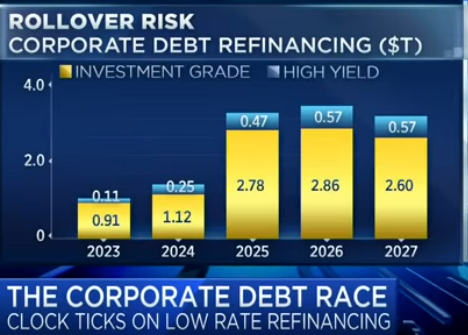 There's a Fed put for systemic risk, but not for default and losses in the private sector.
There's a Fed put for systemic risk, but not for default and losses in the private sector.
It looks like a lot of managers did their financing right to prepare, but it looks like they will be refinancing into higher rates. That means layoffs, cost contractions, - Feb, 2023
- Feb 24, 2023
-
"At the end of the day, a recession is a psychological phenomenon. It's a lack of faith." - Mark ZandiIs that true?
-
In stocks, flight to dividends, high quality stocks. Active stock pickers, not passive. (If you're not a smart stock picker, diversification.) Are you conservative? Are you risky?
-
Consumer still spending, and savings rates higher, but personal spending growth is outpacing personal income growth, so the savings number might well go down / consumers are spending savings they'd built up before.
-
Goods and commodities prices clearly showing path to disinflation is intact. - Jim LebenthalMultiple expansion is only ok when you have trough earnings. - WeissChoppy period until we can really sift through all of this data. - Brenda Vingiello
-
Ukraine reconstruction estimated to cost $350b
- Feb, 2023
- Feb 22, 2023
-
More rate hikes are now being predicted, so the end-point is higher. Market is starting to think about 6% by the Fall, which is more than had been bakedIn.How much the rate hikes will be will be a function of the stock market.Short rates (2-year) made a new high briefly.Interest rate markets have been moving higher.
If you get 6% in a 6-month bill, you're getting 2/3rds of the longterm appreciation of the stock market with no risk at all. That would provide heady competition for the stock market. Cash could be not just a waste of time as it had been throughout 2010s. -
A broadbased, macroeconomic-driven slowdown in hiring - ZipRecruiterCorroborated by other companies. Large and SMB (small and medium).A delta has opened between open jobs that are open and open jobs that employers are willing to pay to recruit for. Wait-and-see posture by employers, less certainty, although they are still seeing good sales, just not sure if this is the time to hire. Putting their dollars behind their hiring is another story.Less liklihood employers will close even when they find a candidate they like. Candidates would then swell. Spike in jobseeker activity and engagement level.Last 3 years unprecedented leverage in favor of jobseekers.
-
China has no choice but to stimulate growth - Ben HarburgAll those regional governments that were previously told to maintain covid zero for 3 years are being told Grow at all costs.Infrastructure spending. 7% growth year in China based on stimulus, expected by Harburg.Regulatory things, maybe softened by now. Want Western investment.
-
Current environment lends to an activist campaign, some say
-
Duration risk versus or credit risk in fixed asset investingVanessa Chan said duration is looking a little more attractive.
-
Consumers are slowing down (in US), according to analysts. Even in retail valuations are starting to matter.As more disposable income goes to inflation. Can't pass costs. Although the big companies like Walmart did handle the inventory issue, people think.Savings rates going down a bit.
-
Inflation cooling will make the Fed data dependent, instead of data reactive, and that means vol will fall (both for yields and for equity risk premium), and that's why stocks can rally later - Tom LeeBoth sides of the inflation story (energy and housing prices), and that's 60% of core, are deflating. Might print 2% inflation in the summer.Hikes have been associated with higher stock prices in many relatable periods. If inflation risk falls yields will fall and equity risk premium will go up.
- Feb, 2023
- Feb 21, 2023
-
Big firms have hired thousands of workers, and can't hire enough people, and are raising wages, but these are people they can easily fire.
-
Shift in psychologyHasn't happened, but might be happening now, where the public goes from thinking there can be a soft landing and the economic issue if fixed, to where they realize there has to be a recession.Leading indicators as they are now have historically always meant a recession ahead.Not just money supply but bank lending standards and the demand for CNI loans have tightened to a level that leads to a recession. The data shows a recession, Dwyer said.Stocks markets have never bottomed before a recession. Average time from beginning of a recession to market bottom is half a year."We know that when the 2-year is making a peak, the S&P has never made THE low until after the 2 year peaks. That means the October low isn't it. We also know that the market has never bottomed before the recession even began."
We're over a year into this bear market. The next low will be the low, and will be when bad news finally will become bad news. That's typically when you make the recession-based low. Dwyer will go for early cycle names at that time. Financials and economically-sensitive cyclical names."The soft landing scenario is not the best case scenario. We don't have to guess. We know exactly what's going to happen if you're in a soft landing. Inflation is going to remain elevated. The Fed is going to have to tighten. And the market, and risk is going to get hit.""What we really need is to go into a recession to the point where the Fed will lower rates enough that it kickstarts a credit cycle. Not now when we're about to enter a potential negative cycle."An unemployment rate of a half a percent for an average of 3 months above the low, you know you're in a recession. Ie if the US get's a 3.9% unemployment rate. Should be about to make a low. Creates an opportunity for a real, sustainable bull market. The problem is money, not just the thought of money. The money system is shut down. -
European consumers seem to be more preoccupied in buying habitsBright spots are US, Latin America, Africa, Middle East, Asia.Difference in how Europeans and Americans perceive their family finances. Not shown in numbers yet.
-
Most retailers recognized oversupply, marked down aggressively
-
Home Depot down 5% todayTrends in housing market.
-
Salaries payed in restricted stock units (15% - 50% lower)
-
IPOs in Q2?There's currently a fair amount of growth capital out there right now, so that can extend a company's ability to stay private. The need to go public isn't as great as years ago, when after 2 or 3 years of growth, in order to get more growth capital, companies more commonly went public. - David Rubenstein
-
The gap between buyers and sellers not quite as much as 6 or 9 months ago
-
China, al contrario de everywhere else, you have quantitative easing, interest rates rates are falling, equity valuations are reasonable. China consumer coming back online across 2023
-
China reopening as a disinflationary factor (supply-driven) - LavorgnaNot the same expansionary growth in commercial and residential real estate, so their demand for commodities isn't going to be as high.
-
Tightening cycle has been aggressive and eventually the economy is going to really feel it. We're just not there yet. - Joe Lavorgna
-
Economist are looking already toward August (Jackson Hole) and October (?jobs data)
-
The Fed is going to wait for clear evidence inflation is going down, while the market is going on the preponderance of evidence thesis - Paul McCulleyRates will only last for another year or so, according to the yeild curve and how disinflation (although not as fast as some would like) is manifestly in train.Market may be too giddy right now, though.
-
Gamestop, AMC, meme stocksIf a company does not make money, the stock cannot float high forever.There are equal numbers invested on the long and on the short side.
-
Interactive Brokers doing wellAs interest rates rise, they make more money on selling the cash they have. And it allows them to pay 4.8% (currently) on idle cash, while most banks pay a fraction of a percent. This allows them to get more and more customers. Growth of business.
-
Prices going down in energy, housing, rentals, commodities - SeigelPayrolls strong. Service sector always the last to go down in inflation. Tightening only started 11 months ago.Cumulative effect of monetary policy.(Note though that housing prices has been stickier, lending to services sector - Aneeka Gupta)
-
"Inflation increases your operating leverage and that cycle has turned down" - Mike WilsonTheir work suggests the market is wrong in thinking earnings decreases won't be that extreme. Earnings recession because of over-earning during the pandemic.Range between 3000-3300 (consistent estimate 6 or 9 months). Currently at 4000 ("or just air").
- Feb, 2023
- Feb 16, 2023
-
Highest ever consumer debt ($1t) combined with rising interest rate
-
"Don't fight the Fed versus don't fight the tape"
-
Less money in the systemPowel's recent speech.
(After 10 or 15 years of loose money and boomers retiring.)1/3 of money in system to be taken out, Zeihan said. - Feb, 2023
- Feb 13, 2023
-
Investors are again very dividedAfter a strong January in markets (up 20% from lows). Before that it sounded very negative listening to CNBC (only Tom Lee optimistic). During, people were happy but cautious, and have been voicing 'bear market rally' case all along.Many saying the bottom is in, but that's beside the point for most. One of the issues is the Fed, which doesn't want inflation, but seems to be acting like it's not going to be hawkish (which it will have to be if inflation is continuing).Anyway, tons of investors on CNBC saying bear market rally and some saying significant drawback in store. Others saying it's time to be offensive.
- Feb, 2023
- Feb 08, 2023
-
AI is the bubble of this year - Josh Brown
- Feb, 2023
- Feb 06, 2023
-
Probably need a 20% reduction in earnings to get enough of an inducement to lay off enough workers to push the unemployment rate up enough to bring down wages to bring down inflation - Bob PrinceSo far corporate profits are doing fine and they're looking for more workers.There's still a lot of nominal demand.Now spending is being financed by income which is being financed by spending (unlike a couple years ago when spending was financed by money printing).A return to the boom-bust cycle. Like the 70s, not like the last 10 years. Will likely be an iterative process over several years.The most obvious bubbles have been popped. But there's an earning bubble, a profits bubble, that was inflated by the printing of money. Still to come.Historically to get 2-3% increase in unemployment rate you need a 20% drop in earnings.
- Feb, 2023
- Feb 03, 2023
-
Gets around the H1 Visa.Even skilled tasks.
Onshoring manufacturing (robotics, 3d printing, getting the price down to what it was in Asia), offshoring talent. Brazil, Poland (used to be Russia/Ukraine), India. They're not as productive (part is the method of having employees remotely), but price makes up for it. Metaverse.
Will likely depress wages for white collar workers, some say. - Jan, 2023
- Jan 31, 2023
-
65% of US adults (166m(can that be right?)) had no money after paying bills in DecemberMarch 2020 was the same number.
Dec 2021 it was 9m.Visa's saying everyone's spending, though.High income people are also effected. - Jan, 2023
- Jan 27, 2023
-
When the market pulls back again, where is the money going to come from
One investor thinks it'll come more from Tech again, which he thinks still can't carry the weight of its overpricing. - Jan, 2023
- Jan 25, 2023
-
-
2% is too low for the relative price changes you need while re-wiring global supply chainsIt's also not far enough away from 0.
-
What's your non-recoverable mistake? Not What are you going to do? How do you hedge against it?Most mistakes in investment are recoverable over time.Blind spot. These people simply don't understand structural uncertainty. When faced with something uncomfortable they ignore it, downplay it verbally.Reframers. Hear something, it's uncomfortable, and they reframe it.Active inertia (tends to be the most successful group). Say the same thing but louder rather than do something different.
-
We're going to see massively different outcomes for different companies and different sectorsUnlike the past when there was no issue except liquidity and there was lots of liquidity. Strategy then was passive.
-
While we're going to a new economic environment destination, we have to think about both (the enjoyment or opposite) the journey and the destination. - El-ErianThe destination can be so exciting the journey isn't worried about. Also, the journey can be so unpleasant it spoils the destination.
-
We have lots of zombie companies that are holding back productivityWe are heading toward a destination where financial markets are less distorted.Growth models have risen in priority. Better treatment of our planet is mixed into this this time.
-
The big frustration of last year was there was nowhere to hide (not in bond market) - El-ErianAs liquidity was withdrawn everything was sold off.
-
Reasons for economies slowing down, according to El-ErianChina. Mishandling of exit from ZeroCovid, vaccination policy. And reorienting growth model (currently based on ever-closer globalization). China will be a drag.Europe. Dealing with energy supply disruptions. Inventory management has been improved. Structural headwinds. Growth will be slow.US. "Cleanest dirty shirt." Structurally it can grow, but could fall into recession if Fed pushes US to it. There was no common solution, unlike 2009. Regional problems means insularity.
-
Narrative has shifted to tightness in the labor market, some sayMore employers laying workers off. Having to pay more to get new workers to join.Inflation started in energy and food, then went to the goods sector, and is now in the services sector.Inflation was allowed to get embedded in the economy.
- Jan, 2023
- Jan 17, 2023
-
Recent downward guidance"Why wouldn't you guide down?" if everyone's facing the same headwinds.
-
20 years China's become a trading partner.
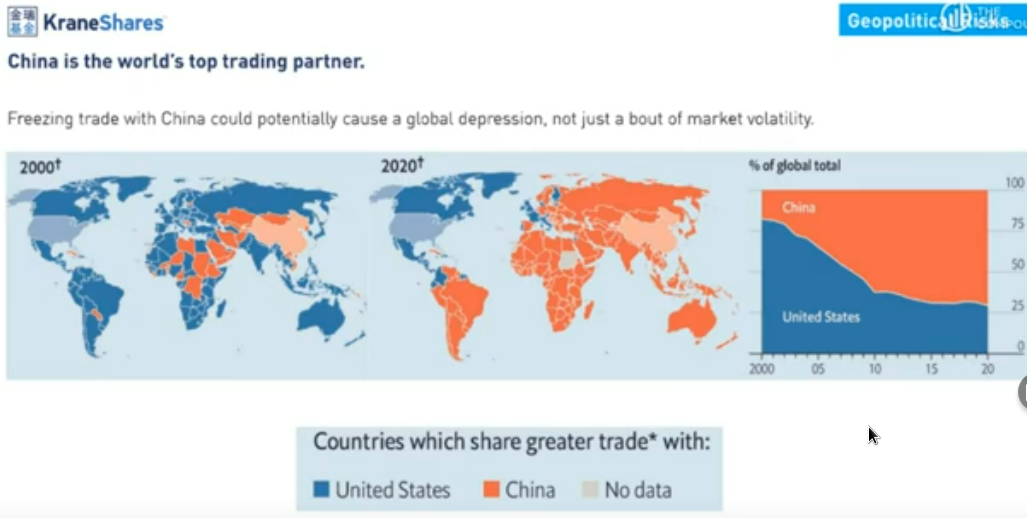
- Jan, 2023
- Jan 10, 2023
-
Earnings can be down yet S&P goes up lots of years.
It's because during a bad year, people sell off and prices are down (like last year let's say 20 or 30% down). Then the next year so much has been discounted that with a low earning report people can still be buying saying yeah that's fine that's discounted already. They're anticipating.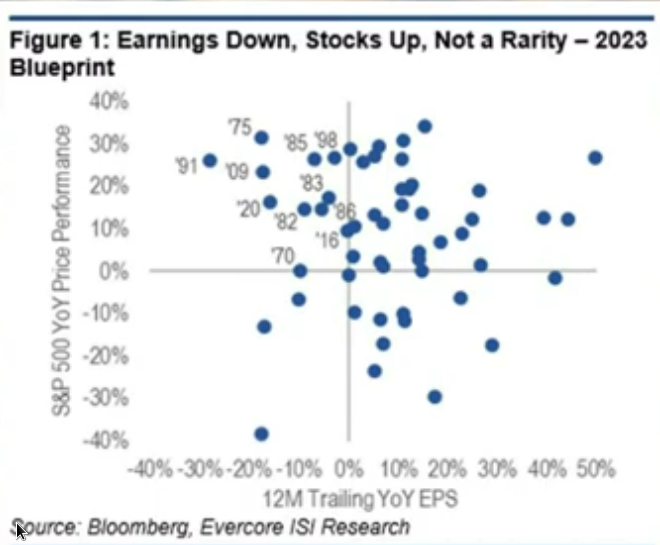
-
The yield curve inversion predictor of a recession (accurate for past 8 recessions since proposed by the guy in like 1986) may not be an indicator for the first time this time, the guy said.The Fed is now overcommunicating in advance so much it obviates the need to even look at a yield curve (when they're basically laying out what they're gonna do). Some say.Some say also that the absolute level of rates matters, and with interest rates at 0 what yield curve are you looking at?Also the model was linked to inflation-adjusted yields. Inflation expectations are inverted, ie traders see inflation easing over time.
-
Dividend stocks weren't favored over the past few years, but in an economic downturn and where things don't look certain, a company that has increased its dividend every year for 40 years has an effect on the investor.Even if it wasn't a good quarter.It also allows investors to measure.It's also probably not going to dive as a stock.
-
"[The WallStreet banks] all hire too many people when the going is good because they have to throw bodies at all the demand for M&A, lending, credit, trading, and then that doesn't last forever, and in a normal year they're culling underperformers, and in a complete wipeout year ..." Josh Brown on banks doing a lot of high volume firingIt is highly pro-cyclical in the way it hires and fires.
- Jan, 2023
- Jan 09, 2023
-
"Ultimately what you need is an aggressive cutting of interest rates that allows the yield curve to steepen sharply, which would then give investors the ability to look through that coming negative economic outlook or weaker earnings." - Tony DwyerWorse economic news is what will let investors look through.
Growth growing in 2023. 4.5% decline in S&P operating profits predicted.
- Jan, 2023
- Jan 06, 2023
-
Gold and precious metals likely to move higher, says Permanent Portfolio's Michael Cuggino - YouTube
- Jan, 2023
- Jan 04, 2023
-
Do we currently know how to map future demand?
For past 10 years it seemed sort of like things were quite predictable. - Dec, 2022
- Dec 21, 2022
-
Existing home sales down for 10 months now in US2.5 weeks average salary per month to pay mortgage. Monthly house payment up about $700 in 12 months.Analysts it will take a couple years before the housing market improves (wages increase, mortgage rate down, house prices more affordable). 5% mortgage is where some see things becoming more normal (currently 7%, 7.5% considered to have been the peak).
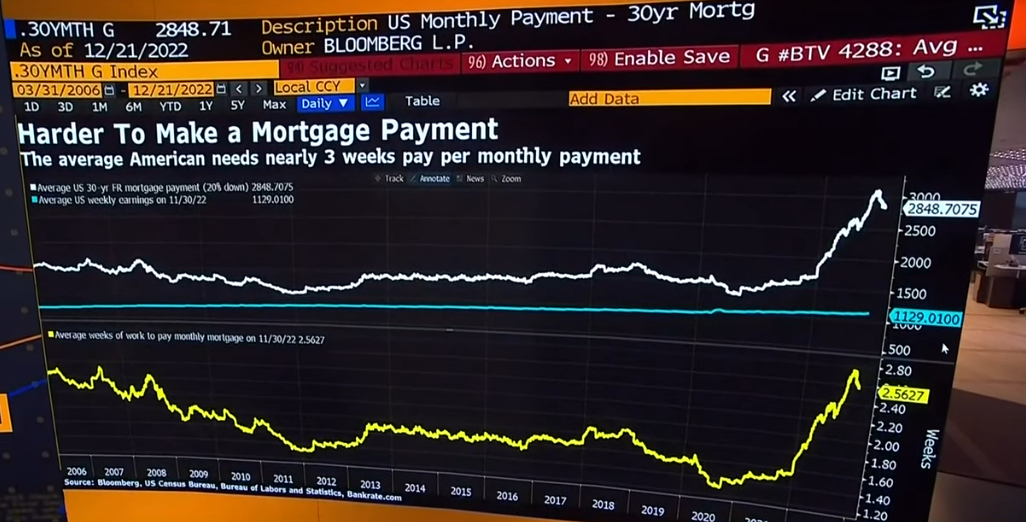
- Dec, 2022
- Dec 19, 2022
-
Millionaires own 90% of individually held stocks, and 55% think the S&P will go down around 10% next yearA third think 15% or more.
- Dec, 2022
- Dec 08, 2022
-
Why the Crypto crash hasn't spread to other marketsAlso a reason collapse can happen so quickly.Few traditional finance sources (few banks have come in with credit limits and bonds) played with them. "Due to federal bank regulators continued emphasis on safety and soundness in consumer protection."
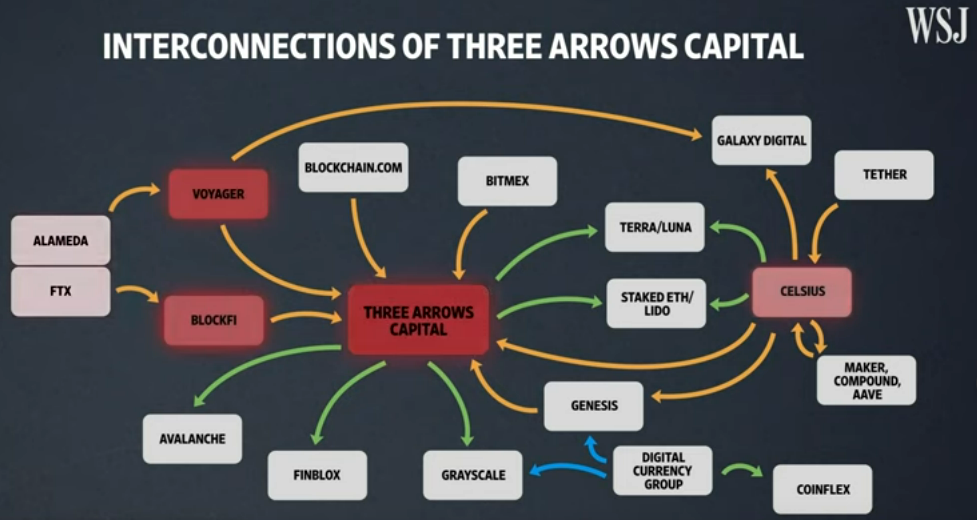
- Dec, 2022
- Dec 07, 2022
-
"Elon Musk's challenge will be to find the right advertisers for Twitter" - a headline I saw
- Dec, 2022
- Dec 05, 2022
-
Apple is by far the slowest to join the accelerating exodus out of the Chinese system (which began in the last year of Obama), said Zeihan"... taken every instance of trade disputes or genocide and doubled down... "
- Dec, 2022
- Dec 02, 2022
-
Stable coin scamsIf they say the value is pegged to the dollar, and they don't have the capacity to keep that value there.They also 'defeat the whole purpose of crypto currencies', Yanis said.
-
Bitcoin so far has never been macroeconomically significant - YanisCentral banks can create tens of trillions of dollars. The crypto market cannot destabilize that.Capitalism is unstable by itself.
-
Imagine how much worse the pandemic would have been if we had a fixed supply of money - Varoufakis... Which couldn't just be expanded rapidly by the Fed in response to economic upturns and downturns.
An apolitical supply of money, like gold.It's not that governments have political authority and power to do things, but how they use it, for him. Non-democratic. Any concentration of power which is unequal and not answerable to the people. And also the central power of Google, Facebook, private sources of concentrated power."Decentralizing money like Bitcoin simply creates bitcoin oligarchs. It is not a safe route to democratizing money." Just replacing fiat oligopolies with bitcoin oligopolies. -
The US had a big surge in demand for goods in 2020, 2021, now it's starting to come back to trend.
Can this prop up an economy? -
Handbags, among least volatile (2-5% fluctuation) asset class, proven to be good hedges against inflation.Hermes, Burkin, Kelly, and some Chanel. Rare, mint, specific colors. A high price for a handbag is like $100k - $300 generally.
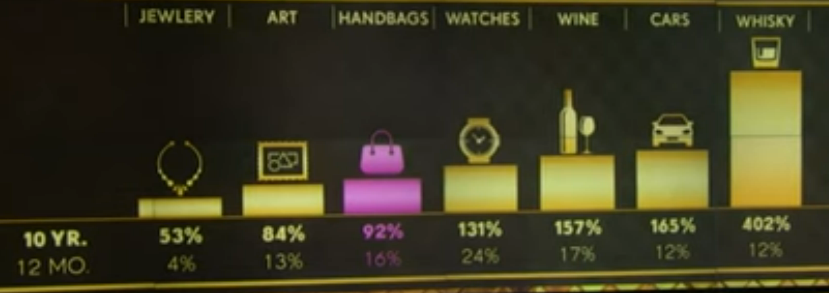
-
Cash levels are still high. People are holding cash.Bullish? S&P is down but maybe we're through the downtrend. And people are waiting with cash (part of which they took out of the market recently).
-
Temporary sweet spot with inflation - DwyerWith the lowering of goods inflation (they are coming down) you're getting al lift in the services inflation.Powell said he doesn't expect housing or housing-related services to start dropping until next year.So you're in a temporary sweet spot where you've slowed it enough to keep the goods side down but the services is going to keep it up above where they want it.
-
$100 or 300t problem, potentially the biggest ... that the price of money is centrally planned - Dylan LeClair50 years into global fiat currency experiment. Reaching a point where global debt burdens are so bloated that the only way out is monetary debasement.
-
'A bursting of the everything bubble'
- Nov, 2022
- Nov 30, 2022
-
- Nov, 2022
- Nov 28, 2022
-
How legal immigration bottlenecks impact the U.S. economy - YouTube How legal immigration bottlenecks impact the U.S. economy - YouTube500k applications to bring in workers. 80k granted. Usually they grant like half.Estimated 1.8 legal immigrant shortfall. And bringing them in now can take a year.US currently reports 10m job openings and 6m unemployed.12% of US population is foreign born. But they are 40 or 50% of STEM labor force, so contribute massively.Lack of healthcare workers in some regions.Questions about US system of bringing in a family member versus possible system based on meritocracy.
- Nov, 2022
- Nov 27, 2022
-
"In Lisbon they banned new AirBnBs in the city center last year and immediately house prices fell by about 10%, whereas in the rest of the city (where AirBnB continued to exist) rent and house prices continued to soar.""Some Canadian cities require that you live in the property if you want to do short-term rentals. Usually people have a second entrance to what is essentially a full hotel room (personal kitchen, bathroom) in the basement.""I used to live in a coastal beach town called rockaway beach, Oregon but when I moved away for a couple years and came back there was nothing in the rental market so I had to get a trailer and live in a trailer park in Tillamook, OR. This system of AirBNB has Destroyed Oregon's Rural coastal communities.""You didn't mention other problems with short-time renting - those who rent often do not respect their neighbours and make a lot of noise and throw garbage everywhere (they do not know or care where to get rid of garbage). Where I live - in the centre of Copenhagen - our building's association just decided to force owners to register when they are renting out their apartment, which ended the pratice, because now they were liable to pay damages. BTW- if they rent out the apartment without notifying they can be thrown out of the apartment.""It bypasses traditional zoning laws where normally you’d never allow a mini hotel to open in the middle of a residential street.""We did this in Paris and Rome. It was great. But I did get the feeling that no one lived in these places and they we only used for short term rentals.""... most apartments in old town have been converted in hostels, airbnbs and offices. Nowadays I only go downtown if I have friends visiting, and need to show them culture and history (what remains of it)"
-
Corps in US/UK give away (buybacks/dividends) 90% of their profits. They used to give away 35%. No money left for re-investment.
Europe 70%.
Corporate government structure maximizes shortterm gains for shareholders.Europe has supervisory boards for over 2000 employee companies. They have very few hostile takeovers. The main German banks also own a bit of the companies. They have a seat and a say.US debt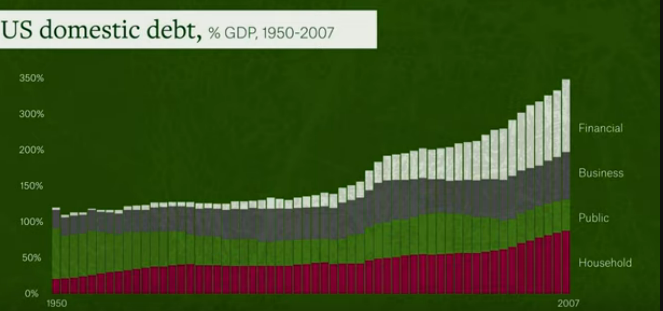 How much American corporations pay out of their profits
How much American corporations pay out of their profits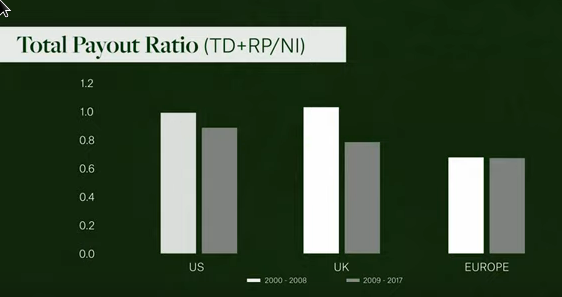
-
In crypto, some are calling for setting up emergency liquidity procedures, creating pools of money to help firms when they struggle with liquidity issues when people start to pull money out. Like with banks.Is this the same as ‘centralizing’ this decentralized thing?
- Nov, 2022
- Nov 25, 2022
-
Retail inventory is high (high demand last year and so lots of buying)People go things a lot easier than they maybe expected (supply chains).It's expected there will be promotions (sales) this season.
-
Household costs in US up around $400 per month, and retail has plateaued, reportedly, and restaurants tooLuxury is doing well though, especially watches, women's accessories (rare items).
- Nov, 2022
- Nov 24, 2022
-
Crypto (after FTX)'Sometimes you need to battle-test the infrastructure and the thesis (and see who are the survivors)' - Kathy Wood on crypto"Cleansing bad players" - Tom Lee. 2023 if there's more fraud, Bitcoin will probably have another bad year, but good companies will emerge out of it, like how JPM came out of 08. Similarly, from the old internet, there were lots of software and media companies (Yahoo), which most people today have never heard of. Many went bankrupt. A few are big now.There were 2 big 'white knight' players in a supposedly-supposed-to-be decentralized industry, FTX and Binance. Now there's just Binance. Binance is bailing out FTX and others. What happens if something happens to Binance. Who's going to bail out Binance?Mix of lots of customer money, non-disclosure, and leverage (borrowing against it), and inside these companies trading.The public, around the world, has got hurt by this. Laws can protect investors. Going into courts, telling judges the facts and the laws.Celebrities. People can fall prey to their promotions, their marketing.Education ('this is speculative') is part of the SEC strategy.Of all the cryptos, Solana, etc, only 2 or 3 or 10 will survive. The next coins will be gen 3 or 4 or 5. Zuckerburg saw what was there at the time, learned from it, and improved it. Google saw other search engines at the time. Shkreli talked about this stuff.
- Nov, 2022
- Nov 21, 2022
-
- Nov, 2022
- Nov 18, 2022
-
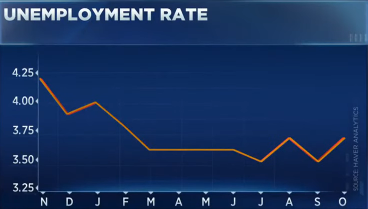
Immigration down to 200k. Used to be like a million legal immigrants. Nobody has labor.
-
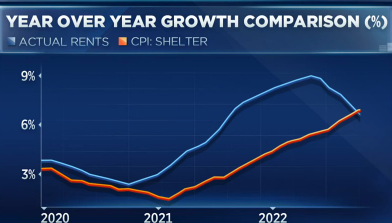 Why people say the Fed is basing its actions off the wrong inflation dataset. Government reports rents as rising because of the lag.
Why people say the Fed is basing its actions off the wrong inflation dataset. Government reports rents as rising because of the lag.
-
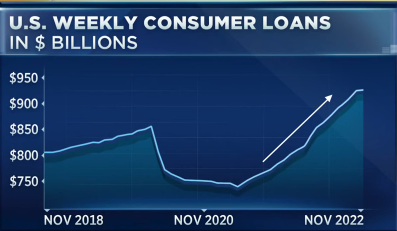 People are now spending on their credit cards.
People are now spending on their credit cards. - Nov, 2022
- Nov 17, 2022
-
FRED, Central Bank digital currency, biggest holder of mortgages, Citi, BNU Mellon, US Bank, Wells, etc. France, Switzerland, Singapore cross-border CBDC.BIS is a private institution overseeing government things. Control over purchases, no cash, government can freeze accounts like Canadian Truckers participation and support. Events can also be faked while backdroors are pushed through. One digital identity mapped across all bank accounts, KYC. Carbon scores, social credit.
-
What will happen with prices in the next couple years?
Defaults is one of the most trailing things to look at. - Ivelina Green, founder & CEO at Pearlstone AlternativeOwners of companies will do anything before handing over keys to lenders. Rescue financing, support from sponsors, first.Usually in the past, companies with poor balance sheets, low in cash, cyclical, but this time they haven't really been sold off because there's so little liquidity people know that if they try to sell some of those credits they'll simply push down prices 30 or 40 points and still won't be able to sell risk. So instead people are selling winners.Exciting for distressed investors (who look at prices based on a 3 or 4 year timeframe), who can buy non-distressed assets at distressed prices. -
-
NY maybe paid $2b in fraudulent payments over past couple years(What would the total USA number be? Could be a few hundred B, said Sullian.)
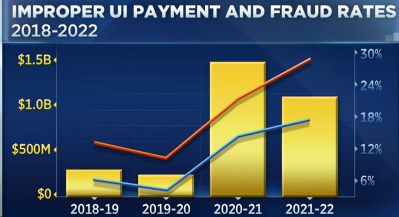
- Nov, 2022
- Nov 16, 2022
-
How much high talent is Apple, Google, Facebook hoarding?In this podcast, an anecdote where someone tried to hire a developer from Apple, but the developer said that even if you paid him more (which would be a lot), he wouldn't leave because at Apple they don't ask him to do anything, so he has a lot of leisure to think about his own future startup.Samo Burja: Bismarck Analysis and geopolitical uncertainty - YouTube round 49:00 or so
-
New home inventory building rapidly.
- Nov, 2022
- Nov 15, 2022
-
"The week that hero worship died" - Michael Batnik on Musk and other personalities"Oh Sequoia invested. Blackrock invested." That part is done.
-
"The dollar is a mood ring telling us about the inflation expectations embedded in the markets."- Josh Brown
-
Large tech companies, in addition to laying off workers, are 'puking up large amounts of retail space back onto the market.'
-
Goldman's de-inflation predictionEverything going in the right direction, basically.
"We expect core inflation to fall significantly in 2023 for three key reasons," wrote Goldman. " 1) a negative swing in the contribution from supply-constrained goods categories, following supply-chain improvements, 2) a peak in shelter categories reflecting a further rebound in vacancies and a waning boost from reopening and the return to cities, and 3) slower wage growth, reflecting the continuing rebalancing of the labor market."
Inflation due to supply constraints are presently adding 0.6 percentage points to the core PCE, but this will shift to minus 0.4 percentage points towards the end of next year, accounting for nearly half the slowdown in the overall core measure.
"Supply chain disruptions and shipping congestion eased significantly in 2022, and inventories of cars and consumer goods have rebounded from extremely depressed levels. The supply of semiconductors in particular has improved dramatically, with automotive microchip shipments now 42% above 2019. This has already catalyzed a 5% decline in the used car CPI, and we assume another 15% drop in 2023," Goldman explained.
Shelter inflation should peak this spring, Goldman reckons, as recent strong demand for rental properties has already sparked an increase in supply, with 1 million apartments under construction, the biggest pipeline since the mid 1970's.
"Rental vacancies rates are starting to rebound as a result and are likely to return to pre-pandemic rates next year. Additionally, the boost from continuing leases renewing at market rates now appears to be reflected in the monthly pace of shelter inflation, as CPI microdata reveal that it already embeds an acceleration in renewal rent growth to 8% year-on-year. Also, rent inflation for new leases has fallen sharply: we estimate to just +3% annualized last quarter," says Goldman.
Finally, a softer jobs market should suppress wage growth and help reduce service sector inflation by late 2023.
"Labor market rebalancing is already lowering wage growth, particularly in sectors with large declines in the jobs-workers gap such as retail and leisure. We expect year-on-year wage growth to fall by 1.5 percentage points to 4% by late 2023, helping to slow inflation in labor-intensive services categories."
Goldman does note however that the market consensus is for core PCE to fall even lower to 2.7% by late 2023, but reckons this is over optimistic as core services inflation will remain above 4%.
"This reflects a lower but still elevated pace of shelter inflation later in the year, as well as an outright increase in healthcare inflation in part reflecting the largest Medicare fee update in at least 15 years," the bank concludes.
From:
-
CNBC talked about getting caught up in the story of these founders, like FTX, like Theranos"He really created quite an extraordinary persona. I loved the sleeping in the office, the attire, he's playing the part, right? I think If he had been driving around a Lamborghini, people would have been like Wow we really gotta look a little more closely.""But he's this guy in a T-shirt who can't even comb his hair, and you think, he's gotta be a genius."
"He doesn't care about money, he just seems to care about ...""His vision. Strategy."They also pointed out that investing has been as a group in Silicon Valley. Clubby. Fomo. The biggest investors all in the same deals.Backing up something that was really supporting something that was supported by nothing.Compound also talked about this. He was heralded as a boy genius, the adult in the room. He tried 20 of the best investors, including Blackrock, Sequoia.Why wasn't more diligence done? Even what kind of diligence would have uncovered fraud.However, there were people who were skeptical of SBF. But when you just got the headlines about him. 'Oh he's just like JP Morgan,' and you just accepted it. Social proof. It was the second biggest, so why shouldn't they have so much money?He bought the naming rights to the stadium (Super Bowl) and made friends with all the celebrities. Simultaneously he was posturing as, "No, we're the compliant ones. We're the ones that are engaging with lawmakers." -
People aren't saying the Fed is going to ease up yet (although some are saying they could or should have a while ago), but they are saying a point where the Fed eases up can potentially now be seen.Tech companies have announced and are laying of thousands of people.It's been hawky for months and no doves, and now it'll be more mixed, some say.
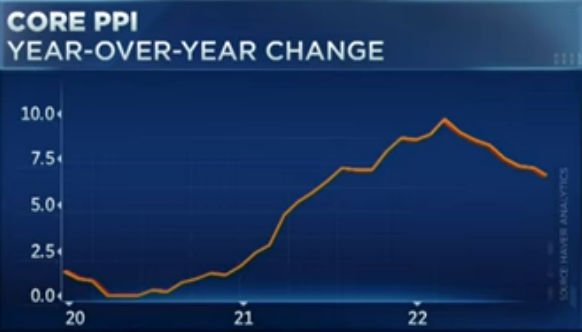
- Nov, 2022
- Nov 14, 2022
-
Big 5 losing leadership?Over a process measured in years, not months, as the big tech names in 1999.
-
- Nov, 2022
- Nov 13, 2022
-
- Nov, 2022
- Nov 12, 2022
-
FTX grew fast and no one really understood where the money came fromMore forensic accountants and less economists and quants, it'd help detect what was going on in countries and companies, said Summers
-
The swings seem strongWhen the market goes down, what people say is quite pessimistic, so listening to things on that day you wouldn't expect the market to go up for a very long time, but on days when the market goes up, it seems like no one's really bearish.
-
What won't de-inflate?Clothing, medical equipment ...
-
How much does the cryto loss take out of the USD abundance, and bring the let's-say 'over' wealth lower?
-
Market bears (Minard, Weiss) are buying right nowInflation is coming down, they say. They had been expecting 20% down. They've recently been buying. They haven't said they now think it's a bull market, but that currently, or temporarily perhaps, it's a buying opportunity.A 'bottoming process' now, or still in a bear market?
-
What's the difference between bitcoin and the USD?(If bitcoin is just fake money, with nothing of real value behind it, what is USD?)$30t economy, full faith in credit, and Federal Reserve is behind the dollar, interest-bearing securities in which you can place your dollar with a relative degree of safety, USD still a very highly-rated credit despite debt to GDP levels. ... Ron Isana."It's a real thing." Comprises 65% of global trade. 95% of global exchange transfers. It's a reserve currency (bitcoin isn't, and "doesn't exist in any form except in the minds of those who created it.")"We've done this a million times in the past, whether it's tulip bulbs, railroad bonds, electronics companies or bad internet companies. The underlying internet was important but a lot of the players like CNGI disappear because they had no functional use case"Blockchain technology is useful though. (It is the underlying tech, and crypto is the overlay.) Cheaper, frictionless transactions, more secure, transparent.
- Nov, 2022
- Nov 10, 2022
-
A few signs of slowing inflation. S&P up 5.5% for the day. DOW 3.7%.
-
Siegel says inflation is basically over, and Fed doesn't need to even do what it's probably going to do, as he's said for around three months
More than 8% is what they're saying inflation is at, but Siegel says it's nowhere near that really.
It's actually negative (not even just at 0). We're in negative core inflation mode, if the Fed uses the right stats. They've been using faulty statistics, he says.
They should use the ACTUAL home and rental price in. The one the Fed uses is lagged.He thinks they'll probalby go 50 and then announce a pause. - Nov, 2022
- Nov 09, 2022
-
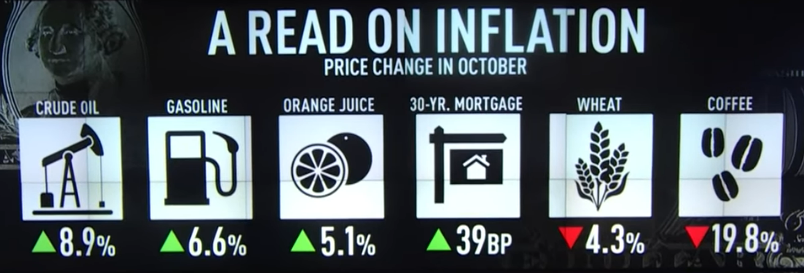
-
- Nov, 2022
- Nov 08, 2022
-
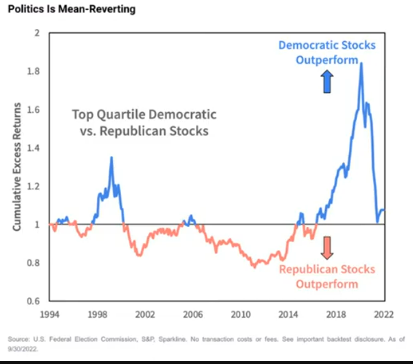 From The Compound
From The Compound -
Changes in people selling Chinese products to world. It seems Ali Express is not allowing people to sell from them through 3rd party apps as before.Now, it seems, people need to register for a category of products in China (license for some categories), which cost over $1000 (deposit of 10,000CNY or 30,000CNY seem most common), so the online store can dropship from China. It seems you can still dropship from another country.Also talk of 'wire transfer' for cash. Because PayPal has a high fee.
- Nov, 2022
- Nov 06, 2022
-
What goes into inflation numbers? Something people have been looking at now - Didn't have to be accurate with it before
Krugman's recent EconEd 2022 lecture
Some things are clearly just volatile prices, and some had been included in core inflation.
If you exclude food and energy, or if you exclude extreme movements, what you basically end up with is housing. Housing is core inflation, 40% of core CPI.
Rent is a lagging indicator. Leases. It can lag way behind when there are big shifts.
Krugman says inflation is 4-7%. Probably 5%.
Inflation expectations for this year are high, but for a few years ahead they're more stable. So an overheated economy. People talk about a coming plunge in inflation.
‘We have enough policy credibility this time that the public has not updated its expectations of future inflation based on recent inflation.’ (As opposed to what had to be done in the 70s, ie create a big unemployment rate, because everyone expected 10% inflation in perpetuity.)
Inflation depends both upon unemployment and expected inflation.
China shipping costs were crazy and are now down almost to pre-pandemic. Supply chain issues have been fading away. Rents on realtor.com appear to have peaked. -
Jobless claims stayed low. Fed didn't pivot or pause. Waiting for slack in the labor market.
-
Fed's issue is not that Americans are making more money. It's that they're earnings are going up more than productivity is going up. - Santelli
- Nov, 2022
- Nov 03, 2022
-
S Korea, 2022BTS brings $3.6b annually into S Korea7% of visitors there were motivated by the bandK-drama and other series, films. Food.160k foreign students in S Korea versus less than 20k in 2003.What is the effect of their success/popularity on N Korea?How should S Korea leverage its soft power to get its goals? How can it enhance their national security, economy?
-
Buying a house next year will be with a 9% rate, it's expectedVersus 3% before. That's like a 50% increase in the mortgage payment. - Zeihan
-
Economic booms give rise to weird money industries, when interest rates at 0 ('money is free'), past 15 yearsChinese boom, Japanese boom, subprime, crypto (this boom).
-
Unlike US, some other countries don't HAVE demand from Millenials (the main demand source in economies), so can't just raise rates - ZeihanIf they raise too much, it would be their last economic expansion."This was always going to be sort of the end of the road for a lot of Asia and East Europe."So US 6% is like the minimum, because they need a lot of tools for next time.
- Nov, 2022
- Nov 01, 2022
-

- Oct, 2022
- Oct 28, 2022
-
People talking about Fed going to stop hikingMarket went down below 3800 because, partly, if felt like things were going not that great all over the place. What was going on in the UK, Bank of Japan having to intervene. Credit Suise maybe being insolvent.
- Oct, 2022
- Oct 27, 2022
-
There's no momentum in the economy, say others.Yield curve, normalized for the level of rates, it's never been more inverted.US dollar is so strong, US manufacturing will face a hit due to overseas product that is cheaper.Last 6 recessions, 4 of them the economy grew 3 or so % right before the downturn.
-
Which Stocks Might Benefit After Biden Signed The Infrastructure Bill? | Seeking Alpha (If Infrastructure Spending)However, costs of materials and labor.
-
People who had owned Amazon and other Big Tech did so because they thought there was some safety in it, but are now seeing that's not the case.
-
Revenge of the Old Economy - Jeffrey CurrieDue to the Under-investment Thesis. Poor returns / stagnating demand over the previous decade saw capital redirected into the new economy (all that Tech), starving the old economy of funds it needed to grow the supply base, infrastructure aged, creating a lot of the problems we're seeing today.Oil large cycles last 10 or 12 years in past instances (70s, 02 to 2014).The revenge of the old economy | Financial Times 2021: "Indeed, the old economy was overbuilt, debt-laden and over-polluted. While the old economy only represents about 35 per cent of global gross domestic product, it generated at least 2 times the corporate losses, had about 90 per cent of the non-financial debt and created 80 per cent of the emissions. It is no wonder why investors preferred Big Tech to oil and copper."
-
Tech stocks, in order to see good performance, need to show corporate benefits, but with these companies the question is not Can they? but rather Do they want to?They're owned by single people who have controlling shares, and don't need to listen to the market or even their boards. Normal market disciplinary forces don't really apply the same for them.The owners are so rich that even if the stock goes down 50% they're not too affected personally.They may have always been like that, but the stocks were going up so no one cared. Now there might be a renewed focus on Corporate Governance and how the governor responds.Amazon, long ago, was allowed by shareholders to lose money for years, but they explained where they were going.Emperors of old.
-
Some say chance of a soft landing is going to be considered more likelyReal world inflation, some say, is falling (although not CPI), and so Fed is close to the end of its action. Meanwhile, employment rate is still 3.5%, spending is strong, spending is up 10% YoY.
-
Caterpillar had good earnings, and Industrials, Q3 2022
-
IndiaDependent-age population smaller than working-age population. Until around 2060.Did lots of reforms over past 8 years, allow record-high tax collection (small and medium sized enterprises brought in). Can spend on bridges, highways.
-
Is China no longer going to focus on the Market-Based Economy that had them rise in the world?
-
Dow up 4 straight weeks. Market up this week.People talking a lot about Is big tech done? Amazon, Facebook, etc, dropped significantly on negative quarterly report.Big tech was the market leader for years (top 5 in S&P, which is the only index people really consider to be the market, and those 5 make up 20% of the S&P. You could count on them, they consistently put up great numbers, and were almost seen as defensive). Now people are saying they got too big to really grow much anymore, and the markets will now maybe have new leaders. They don't know what that will be, but right now it looks like Industrials.For locations, developed countries look good say some. Lots of them. Countries with good governance.
- Oct, 2022
- Oct 25, 2022
-
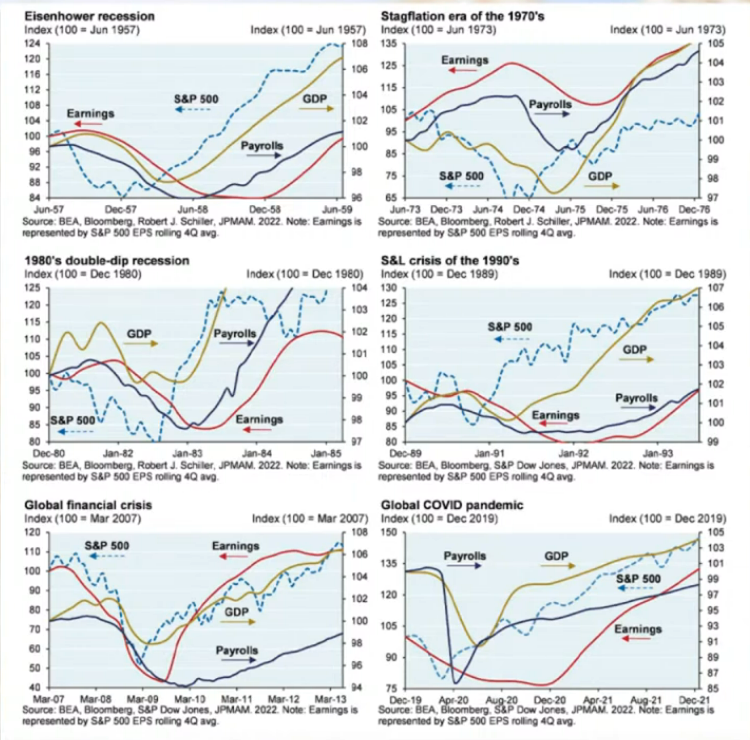 Stock market bottoms before other things in the economy, usually (but we can't say for sure this time).
Stock market bottoms before other things in the economy, usually (but we can't say for sure this time). - Oct, 2022
- Oct 24, 2022
-
Earnings and the state of the economy (US) Q3 2022Banks seem to be doing quite well. Brands like food and beverage, fashion, mixed results, some citing the recession-type things and others saying they're not seeing any such effect.Large-cap tech reports will come this week. Bar's already been lowered for Q3.Caterpillar and Boeing (companies that are outside big cap tech) (bellwether type names) will give an idea about the effect of the strong US dollar and the US economy and what can be / is being purchased.All the goings-on in China, how hammered Chinese tech stocks have been by the government there.An investor quoted Jack Ma (I don't know when he said it), "I think among the richest men in China, few have good endings."If you are a business-owner in China, you are fearful, the investor said. It's not subtle.Everyone also wants to see what Apple does. Such a revaluation/reset in tech names.
- Oct, 2022
- Oct 18, 2022
-
Netflix beat on top and bottom of earnings, added 2.4m subsTalk of 'recession-proof,' because 'if you lose your job you need it even more,' Josh Brown quote
- Oct, 2022
- Oct 17, 2022
-
Fed is not going to stop until either something breaks in the Capital Markets and the Fed pivots, OR earnings come down not 2, 3, 4% but rather 10% - Chris HarveySomething breaks = collapse of a currency, something in Ukraine ...CPI is the Fed's focus. They need it down. For their credibility, also.Interest rates, demand, supply chain, are rolling over now, so inflation looks like it might be going to cool. The fundamentals have to come down, and Harvey thinks we'll have a recession.
-
Goldman undertaking a big reshuffle.Maybe because underperforming or having a 'maturity outlook.' To reduce costs, even if it's at the managing director level.
- Oct, 2022
- Oct 16, 2022
-
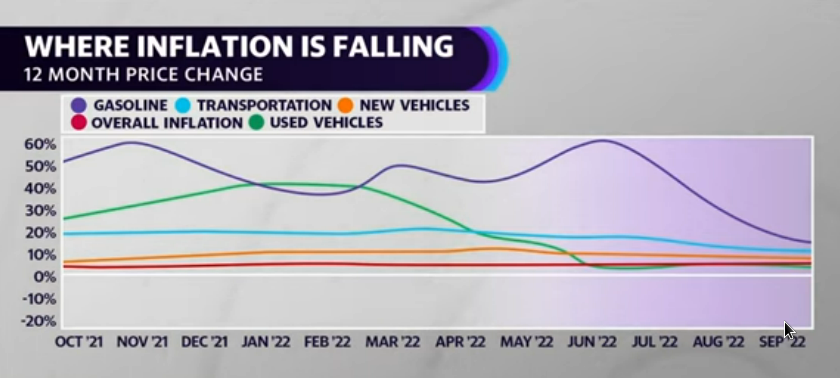
-
Out of the media products (subscriptions) being paid for, dating apps are the one that they're most not satisfied with, so they might get cut. 94% satisfied with TV and streaming, 72% satisfied with dating apps.
-
Contrary to expectations by lots of people over the past months, subscriptions are not being cut back much.18% of household budgets is spent on subscriptions services (including products and services like Amazon).Another surprise is that for a lot of Americans, they see Amazon as a media outlet, not a products and sales site (Amazon buys and deliveries).
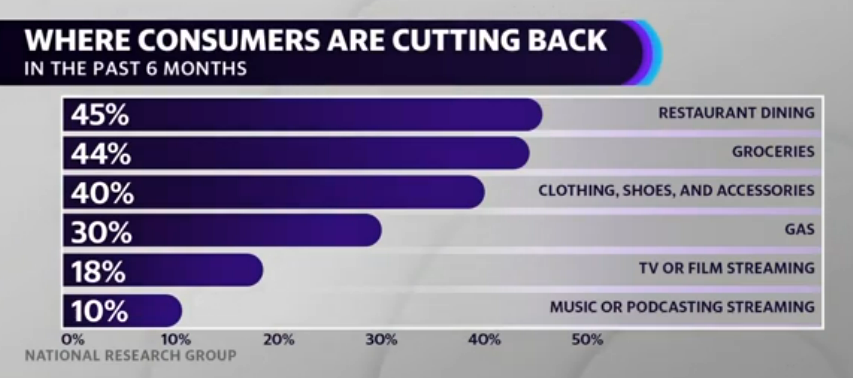
- Oct, 2022
- Oct 14, 2022
-
-
Is Amazon more a utility, or more a retailer with shipping?Headlines this week include Amazon workers striking (has been going on for a while now).
- Oct, 2022
- Oct 05, 2022
-
'Apple is a kind of mature company now. It's not going to come out with the next big tech product like it did with the iPhone.' - an investor
- Oct, 2022
- Oct 03, 2022
-
HousingDiscouraged buyers and affordability challenges.(2008 was about distressed sellers and foreclosures and the inability to hold onto your property when you went through any kind of job loss ... and THAT was about excessive egregious credit.)Prices too high with the higher (4%) rates. Prices have dropped in recent months. Even sellers, who after selling have to buy another home, are discouraged from buying.Before most sale pressure was the outskirts of the cities (remote work ability allowed this). Now it's both, inside and outskirts of the city. Most pressure in affordable units.Not a good market for flipping (into a softer market, expected). Also not a good market for buying a house you can't afford.
-
Basically everyone is bearish. I don't hear anyone being bullish now
-
New hires are down, although firings (new jobless claims) remain too strong for inflation to coolHowever, some poll said 70% of Americans are seeking secondary work to pay bills. Whatever that means though.
- Sep, 2022
- Sep 23, 2022
-
-
Tom Lee appeared to show signs of flagging his optimism in most recent CNBC interview.
First time I've seen that. -
Long Term Investors Can Start Buying in This Marketsome say
-
60/40 portfolio is good now, for the first time in 11 years1-year bonds yield 4%.
-
Third part collections are very lowProbably the leading edge for an indicator of recession (jobless claims would be one of the last) - Josh Brown
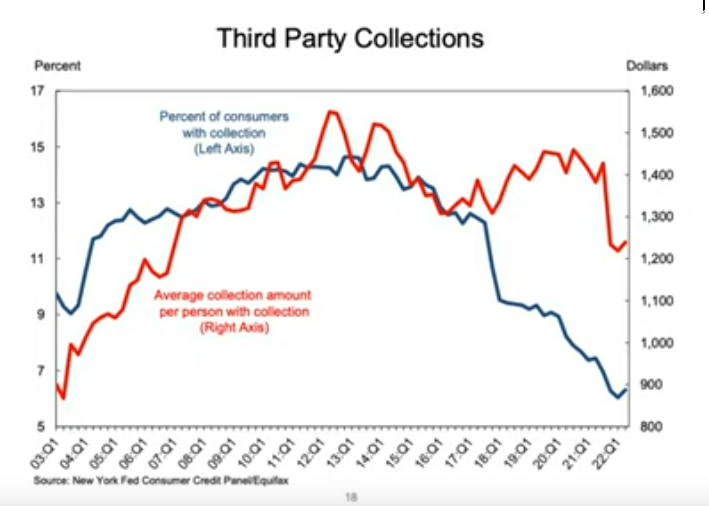
-
Cross-messagingFedex and Walmart warning. Meanwhile, Ralph Lauren and VISA saying they aren't seeing ANY sign of stress.
-
Known brands did well in 2020-2021Draft Kings, Telsa, Peloton. New investors with RobinHood accounts knew what these companies were and bought their fav companies. Apple.
-
Josh Brown and Michael Batnick had an investors conference (like 1000 investors and a group total of a couple thou)Number 1 thing people concerned about is housing. Almost 1/5 of the economy, when you consider building etc, banks etc. It's nothing like 2008 though (everything from creditworthiness to supply/demand looks stronger).2 years ago housing became the national pastime.Bid/ask spread now is massive, and the number of homes sold in big cities are down like 40 - 60%. Sellers (who bought a year or two ago during the bubble) are anchored to a price that's not real anymore. However, the selling prices are still up like 20%.There are 80m homeowners in the US. 5m people are looking for a house. Although the current owners of houses have overwhelmingly good credit, new buyers (rates recently doubled for the first time ever) are maybe shut out of buying a home. So what does that mean if no one can buy a home now (although those who already have them are doing fine)? The number 1 step in building credit for Americans is buying a house.Renters are seeing 20% increases. Potential for a competing-against-landlords (who have all cash or Wall Street financing) situation. This is different from 2008 also. Institutional buyers (like Blackrock) operate in certain cities a lot, so if they're in that city you could be priced out.
- Sep, 2022
- Sep 22, 2022
-
Has been through two economic drawdowns, has a dividend, and buys back stock, quality management, discount to market valuation - the things Leon Cooperman looks for in current stock market
- Sep, 2022
- Sep 17, 2022
-
People have been saying the Fed has an integrity problem now15 months ago they said the rate in mid-2023 would be zero. Now they're saying 4%. Larry Summers says he wouldn't be surprised if it was higher than that.
-
Shopping CentersAfter all the (dubious, a few would say) talk that after the pandemic shopping was going to be completely changed (paradigm) and no one would go to stores anymore, some have noted that it was that very pandemic that showed that retail shops had their place.Unable to buy needed items online due to shortages, people went to local stores, particularly shopping centers. Also because they felt they needed to get out of the house. Curbside pickup developed, so going into stores was not necessary. Stores looked again at investing in their trucking. Companies have focused on eCom for 15 years and are now looking again at their store fleets. (Pricing power to landlords, resulting in higher earnings and dividends for them.) Stores realized the bulk of their sales still come from traditional shopping centers or malls.Also, many people moved out of the city. A trend towards living in homes. In those areas, the main shopping destination is large shopping centers, malls. Going to shopping centers was like the only 'acceptable' place to go during lockdown.The US is over-retailed. The big shopping centers consolidate their power, while some malls do flag.
- Sep, 2022
- Sep 16, 2022
-
EU has stocked up their energy reserves to 82%, already above their target of 80% for OctoberConfidence in EU growing they can go through winter without severe economic problems or rationing.
Russia selling its energy to China and India, but at a greater-than-ever discount. R getting a weaker trade position due to lack of potential trading partners. -
Russian economy holding up versus sanctions et al better than many expectedAlthough doing worse than Europeans who are suffering from the sanctions imposed on Russia as well.R. central bank moved quickly to impose capital controls and sharply hike interest rates (20%, incentivizing Russians to keep their money in Russian banks) partially stabilized the ruble. Higher oil prices offset the Russia discount. Rising sales of energy to China, India and Turkey offset decline in sales to Europe. (Oil revenues estimated down 20%). The central bank forced companies to convert 80% of the money they earn overseas into rubles. Demand for R. currency helps prop it up. R citizens were prevented from converting more than $10k into other currencies.= high interest rate, forced buying of the ruble, and currency near impossible to sell.= we don't know the true exchange rate. Ruble can only really be BOUGHT in significant quantity.= ruble appears high in value, but few would buy it, some say, unless they were forced to.
-
Lots of active managers are telling their clients 'Just buy and hold, don't look at your statements in the short term. You have to invest long term. And investing when the market is low is better than when it is high when you're doing long-term investing.' Their sentiment, however, is largely that the market will continue to bear in the nearterm (couple months, midterms, etc).
-
Fed will be done with hiking early next year - Tom LeeBecause inflation has peaked, and will go from 8% today to 4% early next year to 2.5% later next year, according to the bond market, Lee said.That's not changed by the discouragingly high CPI report we just saw. Maybe the level of the hikes will change but not the timeline."When we see markets convinced (2 decade high) inflation is broken, PE is going to go up dramatically." (Maybe this will be seen even in the October CPI).Recency bias accounts for the prevailing bearishness.With Fedex, taking down expectations might be true for some smaller beta, but PE is going to change dramatically when inflation risk is taken out of equity risk premium, Lee said.
-
The US is big enough that it will leverage the rest of the world down - Rick SantelliEurozone CPI inflation up 9%. Pound at lowest level since 1985.Developing global recession. For US, maybe a rolling recession (different parts get recession at different times).
- Sep, 2022
- Sep 13, 2022
-
During uncertain and changing times, differentiation stands out more - Bill ReadyPinterest has actual people curating.
-
Incentivized to invest in automation, with labor rates rising
-
Chequeing deposits 4x pre-pandemic. Lots of surface liquidity. But demand is struggling (housing, everyone is just buying groceries not electronics or clothes) - Paul Christopher
-
"There's no way globalization breaks for the Chinese in a positive way." - Zeihan
- Aug, 2022
- Aug 29, 2022
-
Recession signs?'Lost my job, can't pay rent' Google search term up 500% (in how much time?MLB down compared with 2019 (but was going down before the pandemic). How much is a postpandemic fear of crowds?Generic instead of brands up like 20 or 30% maybe.Mens' underwear sales (no data yet, just a sign they're watching).
- Aug, 2022
- Aug 20, 2022
-
Russian 'Stars Coffee' to replace StarbucksWith a brand design basically a Starbucks ripoff.Why would they not take this opportunity to create a global brand competitor?
- Aug, 2022
- Aug 19, 2022
-
All midterm years result in higher market between October's election day and June - Joe Teranova
-
-
Sept 6 will be the day many workers are expected back at the office (or not)Those who may not be expected back: Those with children or family needs as reasons to be at home, coders and journalists and workers who do better in a quiet environment, and people who were hired remotely and don't live in the same place as the business and never did."They can't take your desk away from you if you're sitting at it," was an expression in the 80s when people didn't want to lose their jobs. Workers have had a lot of power recently in the relationship, but that may shift now (many are talking about it doing so).Some Millenials and GenZers, who have lived their lives online and virtually (and therefore are considered best suited to not want to go to the office) are saying they want to go to the office to show their employers what they can do. Those who were hired remotely have never had the opportunity to meet their managers and coworkers physically. "When is someone gonna tag me so I can actually fight for the team?"Some say to move up you need to be there in person. Who promotes someone they've never met? Who puts someone in charge who's never interacted with people? How do you share experience with upcoming members? Why should you offer fulltime work to someone who's not there physically, instead of just contract or part time?
- Aug, 2022
- Aug 18, 2022
-
The 10-year is at 2.8. "That's hardly where it was in the 80s. The 10-year should properly reflect inflation expectations and at 2.8 it's really a market that thinks inflation gets back towards 2% after a couple years." - Tom Lee"And then people talk about the inverted yield curve between 10-year and 2-year. But what they have to keep in mind is that if inflation for the next few years is at 4, the 2-year HAS to be higher than the 10. So you're gonna get a forced inversion just because the contours of inflation and it doesn't mean that the curve on a real basis inverted. So I think the bond market is telling us a better story than the equity investors wanna believe."
-
"Last 9 months investors have been convinced inflation will be with us for years, and it's very sticky, but it's proven to be a lot less sticky, and maybe even more sensitive to gasoline falling, because of how gasoline moves through the services CPI."And if that's correct, we are tracking more towards a soft landing ... and that would mean that markets have already discounted much of the Fed tightening."Tom Lee
- Aug, 2022
- Aug 16, 2022
-
Peak leverage in labor market, voiced5% down to 10m open jobs in June.Pulling back as they have less success in hiring, and they're reassessing how they operate their business. But still frothy labor market.The employers doing well are recruiting talent rather than posting job openings.
-
US housing starts fell 10% in July
-
Shipping costs may be peaking (but costs coming down really a 2023 event)Labor costs still up.
-
Crowding out effect - Scott MushkinLA food prices up 25% in past 18 months.Not a lot of money left over.Some people 'being impoverished.'What will the holiday look like?
-
Lots of inventory overhang right nowApparel, barbecues, etc.
-
Three stages of a bear market - Bookvar1. Valuation adjustment (we've seen this).2. Economic impact and earnings impact of a slowdown (we're beginning the first phase of this), particularly profit margins.3. Everyone throws in the towel.He expects 50 basis points and then 25s.
-
The tightness of the labor is more than the Fed expected, so it will have to generate a slowdown long enough to push the unemployment rate up well above 4% - William DudleyThe current wage trend is 4 or 5%, which is not consistent with 2% inflation, because inflation is high and labor market is tight. Ratio of unfilled jobs to workers is 1.8 to 1.
The Fed says it wants 2% inflation, but he thinks they actually want 3%. - Aug, 2022
- Aug 15, 2022
-
- Aug, 2022
- Aug 13, 2022
-
- Aug, 2022
- Aug 12, 2022
-
Americans are using credit card points to but food now (in past 2 years they would save them and use them for something bit like a dish washer). Credit card spending overall has now eclipsed pre-pandemic. Consumers have not had to use credit for a couple years, but now they are ok because they have credit.Gas prices have dropped a lot, and so have borrowing rates. Re-fis are back.
- Aug, 2022
- Aug 11, 2022
-
AI, internet-based business models, Net Zero, emerging market consumer, and top brands (last one a sort of moat play)Scott Chronert's 'Thematic Thirty' stocks as, he says, we shift out of markets being driven by inflation, recession, and Fed concerns, and into more stock (pick) -based investing.More of a longer-term structural growth bias, which is their means of negotiating this onoging Fed-on-Fed-off economic-recession-or-not situation. A path to look across an economic valley to the other side.Because the market almost at their target for S&P, investing needs to shift away from an index focus around traditional macro variables to a much more bottom-up focus.The first half of the year, the major multiple compression on the initial inflection and rates was on the growth side of the market, 'which is gonna align with a lot of the themes' he's talking about.The rate effect of multiples has been mostly priced in. June low.They follow 99 themes. But there are a lot of companies in the S&P that don't follow this thematic approach.
- Aug, 2022
- Aug 09, 2022
-
Carried Interest loophole, legislation closes it (we'll see)In the top tax bracket, instead of paying 43% they're paying 23%, as if income was investment income, some.Money changing hands for legislation, seen in action, according to Josh Brown.Sinema of Arizona.
-
$92b market for inexpensive ($150 usd) cell phones.
-
Biden signed a 'China competition bill' Chips Act, to 'boost US chipmakers'Haven't looked yet what else is in this bill.
-
"The relationships between all of the tools that we use to regulate the economy (inflation measures, growth, interest rates) and the economy might not apply anymore." - Peter Zeihan (but this echoes in vein things I've heard from other over the past year or two"For the past 500 years it's been all about figuring out how to maximize your share of a pie that is steadily growing. ... As long as there is more technology and more people growth is easy, and regulating growth in such a situation is something that we have a lot of experience in, but that's not the case anymore."
- Jul, 2022
- Jul 26, 2022
-
"There is no longer a secular growth story that works without a cyclical for the global advertising business." - Josh BrownApple and Google down since Snap's weak quarterly report. They're so big now that anything in the overall economy affects them, is the idea. They're now seen more as a proxy for the overall macro, is the idea.
- Jul, 2022
- Jul 25, 2022
-
Zimbabwe to introduce gold coins as local currency
- Jul, 2022
- Jul 15, 2022
-
"Maybe a mild recession is not the worst thing for some of these companies because it gives you pretext to fire some low performers." - paraphrased Josh Brown
- Jul, 2022
- Jul 13, 2022
-
Non-performing auto loansRepos. Although you won't lose your house right away if you miss a payment, if you don't make a payment for your car they'll repossess it.Loan to value 140%. (What you could get for the car if you sold it compared to what you paid for it).Anecdotal is that most of the repos are from loans for 2020 and 2021. Lots of people making $2500 with car payments of $1000 (at that income level most financial advisers recommend $500).Prime repos (high credit scores) usually is 2% and is now 4%.Sub-prime repos (towing a car out of a driveway) have doubled to 11%.
- Jul, 2022
- Jul 12, 2022
-
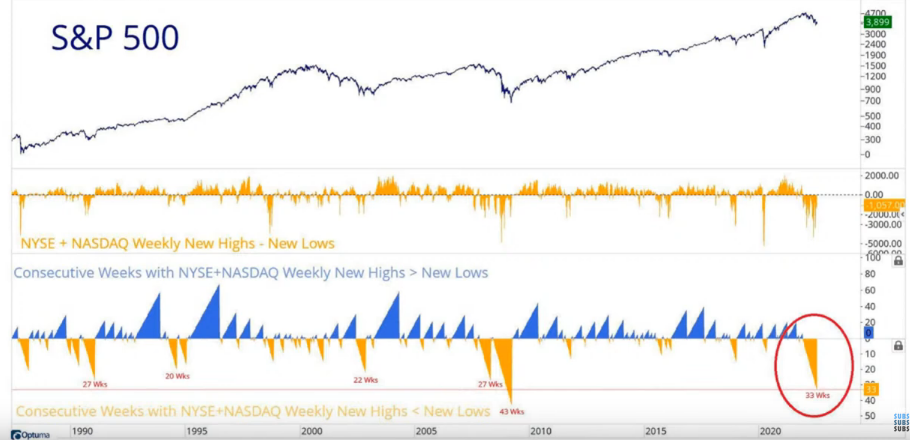
- Jul, 2022
- Jul 07, 2022
-
Overlevered.
Reputational effects. - Jul, 2022
- Jul 06, 2022
-
"A lot of the money in oil and gas stocks is sort of hot money and is New Money, and they're not familiar with the volatility we've experienced over the past number of years. The more volatility and the more pull backs, the harder it is for the sector to deploy capital, and the harder it is to attract capital the higher the oil price needs to be and the higher the return on that investment needs to be to get that capital deployed" - Josh Young
- Jul, 2022
- Jul 03, 2022
-
-
"Reestablishing the gold standard, in Rubles, funded by China"
- Jul, 2022
- Jul 02, 2022
-
- Jul, 2022
- Jul 01, 2022
-
Survivorship bias skews art world investment valueStuff that goes down, people don't even want to sell it, so it doesn't get factored into the index. If values go up, people do sell. So it seems like prices just go up in the art world of investment.
-
Over the past week, although markets had like their first good week a week before, many commentators and analysts are saying very negative things
-
We need more capex spending, more pipelines built and more drilling, in order to transition properly to clean energy. The Fed can't change a supply problem (with hydrocarbons) no matter how it acts. It turns into much higher labor costs, energy costs, food.The US is begging SA to pump more while trying to remove the Iranian National Guard as terrorists, as well as the Houthi rebels.US is reducing restrictions on Venezuela (a 'known terrorist and funder of terrorism') at the same time as killing the Keystone Pipeline which would carry crude from the US's ally, partner and neighbor Canada to US refineries that can refine heavy crude.US politicians (Biden included, markedly) are vilifying Big Oil, threatening them (saying they would turn them off).Adding windfall taxes and things to energy is just saying we want prices a lot higher, Bass said, instead of getting behind them, as the highest energy producer in the world (way ahead of the second, Russia).In 7 years, the first nuclear energy will open in Wyoming.He thinks it's the golden age for private capitol investing in hydrocarbons for the next 10 or 15 years. Demand is inelastic and growing, and there's no alternative energy that could get there in time. There aren't enough minerals to put into the wind turbines and things.
-
When you print 40% more M2 (money in circulation), you're gonna get about 40% inflation (some things will cost more or less). Coupled with really poorly thought-through energy transition policy. - Kyle Bass
-
The Fed has just started to take liquidity out. It's going to take $100b out every month for 10 months maybe. He said wait to invest until the Fed starts to use the word 'pause'. He thinks a lot of the Fed's job is already done. Food and other costs will continue up unless there's a serious recession, but he thinks there'll be a mild one. Markets lower going into November, he said. - Kyle Bass
-
With input costs (energy, labor, raw materials in commodities) is causing many businesses to consider shutting down.
-
Example: US has tariffs on China for steel and aluminumChinese state actors were basically giving free electricity to aluminum smelters in China to undercut price in America, that took US's capicity utilization of US's aluminum smelters from high 80s to 70 in one year. And when you drop below 80% capacity utilization you end up losing money as an industry. China was acting in an uneconomic fashion to try to put the US's industry out of business so the US would have a further reliance on China's ability to produce aluminum (strategic values for military and industry).So Yellen saying "You could save 8 basis points of inflation if you took those tariffs off" is ignorant of national security. He mentioned that if wall street was making decisions we'd all be speaking Chinese immediately, because they make short term decisions for specific profits, and politicians are required to think long term and consider national security.Kyle Bass' take
-
"It's really difficult to engage with [global] partners" - Kyle Bass (a monitorist at heart)... "like China, like Russia, like Iran, like North Korea. China mostly. It doesn't share the same value system. They don't share the same legal system. We have a rule of law, they rule by law. And when it comes into times when there's global conflict or friction you see that globalization can lead you down a path that puts you in a very difficult position from a national security perspective.""It was probably a real bad idea to let 95% of the pharmaceutical ingredients for our antibiotics to be made in China. And have the global chip shortage around the world that really emanated from Taiwan, which makes 40% of the chips we need for just about everything."Various things being outsourced has to be thought of in terms of risk assessment, he said. 3-5 years away still from being self-sufficient on the chip side. Antibiotics and supply chains aren't rocket science, they just need to be reshored. While we watch the friction increase almost daily between the US and China. Xi, the most leverage China has is now, and every day that goes by they have less leverage, so things might happen sooner than later. China's media is really pushing the Taiwan issue.With Ukraine. For a long time things boiled, and one day war happened. Russia's control over Europe also could be said to be decreasing with time, as their supplier of energy.Because the White House changes every 4 or 8 years, the US needs a team that transcends administrations and needs a better grand strategy, he said.
-
Crypto lost $1t over the past few months, and people say a big part is because they can't attract new buyersThe space operates like a ponzi scheme, where it takes new money to pay out old money. Crypto still has no inherent value (use). It's still speculation rather than utility.
-
Semi conductors versus longterm bonds being analyzed by CNBCSemis down versus longterm bonds up.Talking about going back to 2020 levels as a baseline. That's because then we were not in a rising rate environment, we had a huge tailwind to the overall market, a huge pull forward for semiconductors, hardware, everything across the board, but now we're in a rising rate environment, and everything is calculated on discounted cashflow. That's why tech stocks will run (upwards in value) when rates are low and not when we're in a rising rate environment.2020 might not even be the right thing to look at, because then there was no inflation, and rates were at zero. So equities maybe should be valued even worse than that.
- Jun, 2022
- Jun 29, 2022
-
What's good for Robin Hood is the thing that's worst for it's users. Josh Brown's pointAnyone who uses the app a ton is going to lose money, which is bad for them. But this is what Robinhood needs to have profits or to grow
-
"They gotta stop manipulating long rates. They have to let the free market do that." - Dan MoreheadHe also said that while 30% of Americans are trying to buy a home, 20% of all homes sold last year were sold to institutional speculators with money borrowed from the Fed.
- Jun, 2022
- Jun 27, 2022
-
Wall Street was looking for basically anyone who was willing to come, or even log in for them, hiring, but now they're looking to cut backThey hired thousands wach. JPM and Goldman hired like around 20% more. Wall Street is a boom and bust thing. When the deals are coming you have to have people.YoY:IPSs down 90%High-Yield debt offerings down 75%M&A down 30%
- Jun, 2022
- Jun 26, 2022
-
Consumer confidence is lower now than after 9.11, and after the 2008 financial crisis, said Rick Newman
- Jun, 2022
- Jun 24, 2022
-
The market has priced in a recession probably, but not a consumer credit hit, probably, which might come after a recession
- Jun, 2022
- Jun 23, 2022
-
-
UK is having a big rail strikeSignificant percentage of rail network closed. I think the demand is higher pay.
-
About 100 tech companies are downsizing right nowPossible end to employment-related inflation.
-
The biggest increase in military spending since the 90s. 40% for air force 20% on the Navy. 17% for ground forces. 35% to refill ammunition depos and upgrade cyberwarfare and kit.They want 35 Lockheed-Martin F-35s, 60 Boeing Chinook helicopters, and 15 Eurofighter typhoon jets. They'll also spend on R&D, combat cloud, combat air systems (6th gen fighter jet), submarine tech, frigates, artillery, tanks. In cooperation with other European countries and the US.They don't currently have a single combat-ready division, reportedly. They plan to have a combat ready division in 2025.What was their use to NATO? "On paper" they have 350 Pumas (150 can be used), 51 Tiger helicopters (9 ready). They use analog (not encrypted) radios.30% of their navy is seaworthy. Their army has 200k soldiers, down from 1990's 500k.They're planning to up their spending to 2% of GDP on defense.But they have to get approval to pass this. Germany has a lot of pacifism, but it's currently anyway getting a lot of support.An interesting thing in Germany is when there's bidding for a defense contract, the loser can challenge the decision, which can stall things for years. German contractors do sue each other sometimes, delaying things for years also.
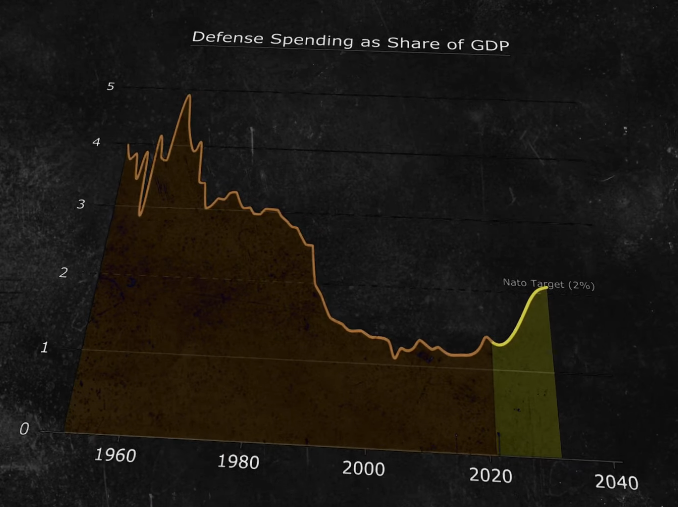
- Jun, 2022
- Jun 22, 2022
-
In the USA, 30 companies control 95% of the $31b chicken industryProcessing 1.5m birds per week.The Shocking Ways Lobbyists Eliminate Competition in the Farming Industry - YouTube
-
USA at the beginning or at the cusp of a recession, said BookvarWhat's better? A fast recession and fast recovery, or slow?He thinks the Fed will tolerate a 3 or 4% inflation rather than try to push it down to 2%, leaning more toward helping the economy rather than control inflation. The labor force is keeping inflation elevated.Everyone still has money in the bank, so inflation will stay.
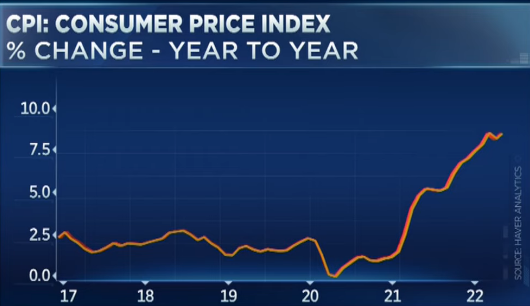
-
Housing
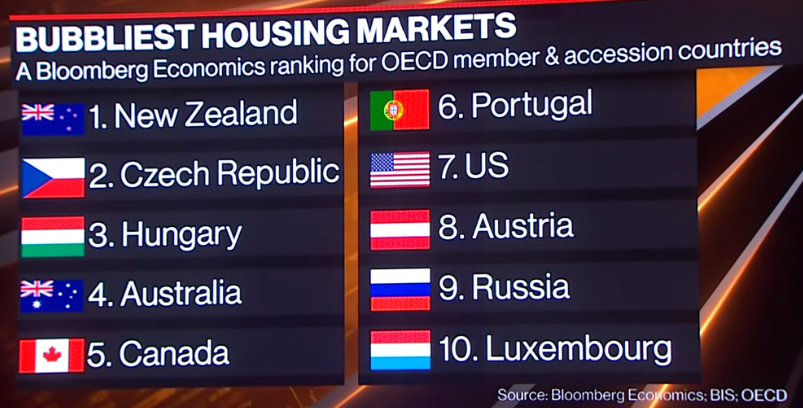 Doesn't this chart mean, though, 'everywhere'?
Doesn't this chart mean, though, 'everywhere'?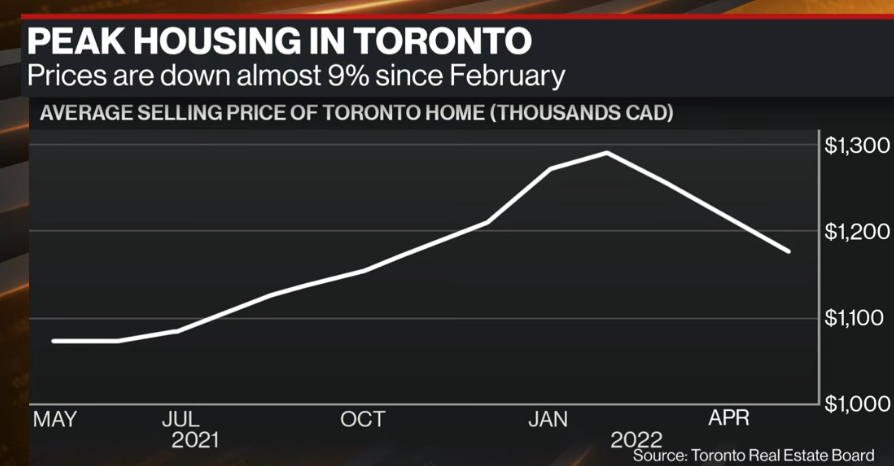
-
Three straight days of green for marketsIt's at about 15ish times forward earnings, not historically cheap, but considering the concentration in bigcap tech stocks, equal weighted it's more like 13x. "Around fair value."Small cap 600 under 11x.No one really saying that means the value is good.People looking toward earnings forecasts / revisions for info.
-
What does a communicative Fed and not wanting to surprise anybody do except raise the VIX? - Jim PaulsenHe comes from the 70s where the idea was the opposite.Every meeting the VIX goes up and then when the meeting's over it does a little better.Is it helpful in helping investors decide what's going to happen?
Paulsen said it might be better watching the Fed's boss, ie What's going on in the economy. And then the next boss is the bond market. They're both saying the Fed better not overdo the tightening.Relatedly, Tony Pasquariello said. "The moment the Fed says 'We're done,' or 'What's priced into the script is as far as we'll go,' the market's going to rally back, and will ease financial conditions in so doing. And that's the kind of cat and mouse game between the Fed and financial markets." -
Core inflation (CPI, PPI, PCE) has rolled over YoY for last 2 months running - Jim PaulsenThe first time they've all rolled over at the same time since this began. The commodity thrust used to be all commodity markets, and now it's just energy, and now that's waning (natgas and crude both down). Wage inflation has clearly slowed.He still thinks we'll be more concerned about recession, but just less about inflation.
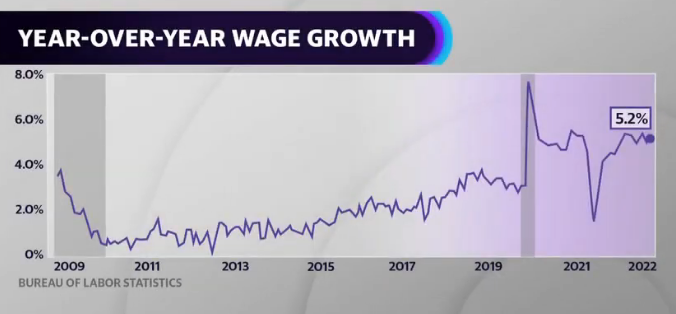
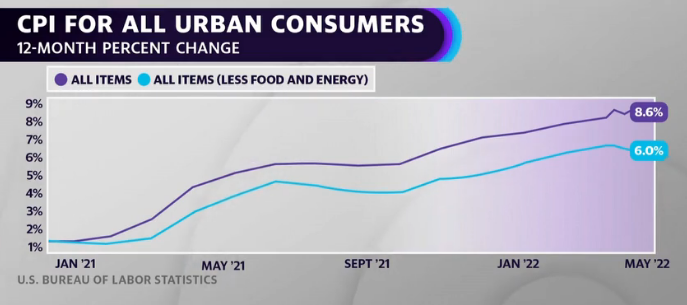
- Jun, 2022
- Jun 21, 2022
-
For the first time in months, bearish-take market experts just starting to be less bearishJust days ago everyone saying everything was so negative.In part because Fed for years, even through the Great Recession, was increasing money supply. Steadily. That saw a big jump of like 40% more in 2020 and then continued. But now the Fed is finally going the other way, so there will be less liquidity.Also, a lot of money has been lost in the stock market, which belonged to that excess that was printed.Larry Summers called for a 5% jobless rate over 5 years to ease inflation. Right now it's 3.6%. So a loss of 2.2m jobs, then going through that for 5 years.
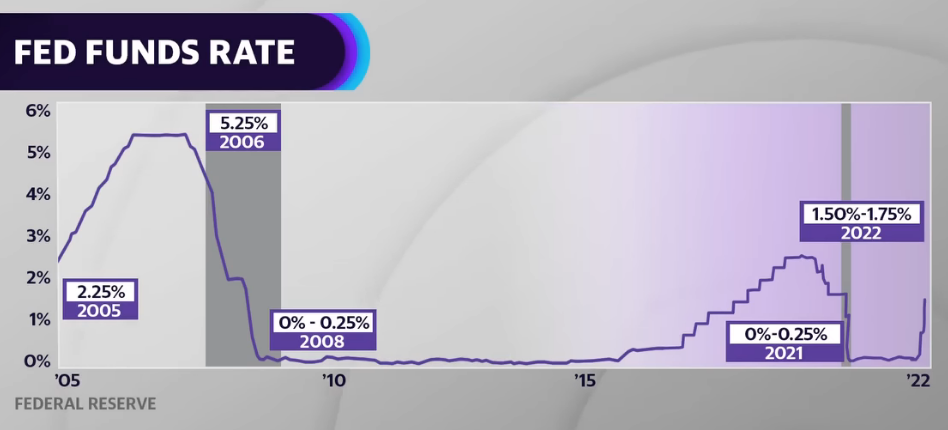
- Jun, 2022
- Jun 19, 2022
-
Vacation travel becoming 'less discretionary' according to Marriott CEO"More people are going to take vacations regardless of what happens to the economy."
- Jun, 2022
- Jun 16, 2022
-
Pakistan minister asks people to cut Chai tea drinking by a few cups per dayThe government doesn't really have money to import more tea on loan.They imported $640m worth of tea in 2020, the biggest importer in the world.Forex reserves went from $16b to $10b in the last couple months.Some say it seems unlikely the plea will have any effect, since tea drinking is done at home and isn't easy to monitor. 220m people in the country. The leaders of the country are not expected to be cutting down themselves, some say.Pakistan is having long power cuts (up to 16 hours) in the energy shortage. All types of energy. 45 degree C temperatures these days.Beijing operates lots of power plants in Pakistan. Right now those plants are turned off because Pakistan hasn't paid the Chinese companies. The IMF asked but China refused to renegotiate the agreements.Pakistan had made LNG deals with Italy and Qatar, but those countries reportedly are selling their LNG to more lucrative markets (Europe) instead. The suppliers have to pay penalties (30% reportedly) but still they make profits by not delivering to Pakistan. Pakistan has to buy LNG at spot prices from the market.They could try to get an IMF bailout but to get one they would have to remove all fuel subsidies. So the government doesn't have many options, and is asking people to not consume energy.
- Jun, 2022
- Jun 15, 2022
-
-
Father's Day is second busiest t-shirt printing time after Christmas for Amazon
- Jun, 2022
- Jun 14, 2022
-
Prices are being talked about nonstopWhen someone tells you the price, you say, "What?"Americans say.Wages up but people aren't happy because they can't buy stuff affordably.
- Jun, 2022
- Jun 12, 2022
-
Tasty burger restaurants in place of McDonald's in Russia800 outlets."Russians can do fast food just as well." - Some guy
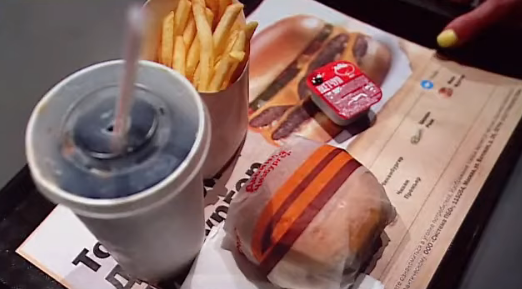
-
Worry about reduced economic productivity and activity, not about inflation, it's been said
-
$180 barrel is where demand would start to stop, said Mark Rothman, so we're nowhere near that
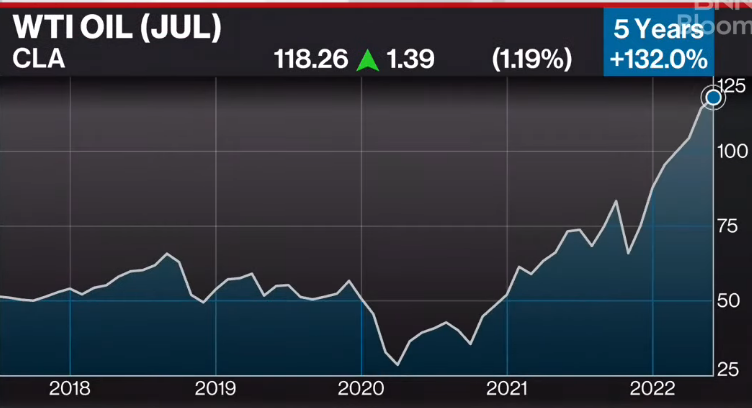
-
- Jun, 2022
- Jun 10, 2022
-
Kawasaki factory in Nebraska offering 9-2 shift at $19/hourLabor market very tight. Everyone is hiring.The shift is based around school hours, to try to get people who were not doing manufacturing before (mothers).
-
Bolivia inflation 1% for past year versus Latin America average of 10%The Boliviano is not fixed in exchange to the USD. Their exchange was established over 10 years ago when the authorities there injected dollars into the countries reserves. The money came from great wealth that came from nationalizing petroleum production (Bolivia still has a state monopoly in petrol and distributes it to the country, and this has totally absorbed the impact of changes in gas price). It reduced costs of imported products. Bolivia ALSO produces most of the products Bolivians consume.Bolivia also has certificates of exportation granted by government. When that product is not available in proper supply for the internal market at a price the government considers appropriate, the government can deny a certificate for exportation.For this low inflation, Bolivia is considered by some to have a lot of debt.Is it a disincentive to production in Bolivia? Does the State spend more than it brings in? Will the country just consume its reserves?The government isn't going to change policy. It says that would be to translate the burden of inflation onto the majority of the population.Bolivia is said to be the only Latin American country that is controlling inflation.
-
Docusign beat on revenues and missed on EPSSomething that has worked over the past years but now doesn't seem to be enough, some say, and that investors now want to see actual profits.
-
QE and low interest rates have resulted in record debt levels for a lot of countries, where consumers, businesses and governments took advantage ... and may have become dependent on cheap debt. As rates rise, these parties will see hightened costs for their large debt loads.
- Jun, 2022
- Jun 09, 2022
-
For months now, everyday economy news has several experts saying recession is coming and there's no soft landing, and others saying recession is unlikely
- Jun, 2022
- Jun 08, 2022
-
US mortgage demands is at a 22-year low
- Jun, 2022
- Jun 02, 2022
-
Bitcoin is fluctuating a few thousand above and below $30k
-
People, including Boockvar, think inflation has probably topped out (although how much it will come down is another question)We're in an information gap right now. Earnings were flat. We don't have a Fed meeting for a couple weeks but we already know what they're going to do. Next catalyst is in July when we review Q2 results.Boockvar wrote Bill Dudley is kind of the truth serum man of the Fed.
- May, 2022
- May 31, 2022
-
-
7 weeks straight of the week closing lower for markets, and then this week it was up a bit
-
Some say supply chain bottleneck loosening up... part from perhaps less demand, perhaps from actual loosening.JPM reported LA ports are looser than previous months.BOA said on trucking that capacity is higher than previous months.Retailers are talking about double digit inventory gains, so some think they might now order less or not the same stuff. We might see store shelves full again and things going to the clearing isle.Core PCE price index has been sideways for 4 months (and down YoY).People looking at inventory to sales ratio. How quickly can retailers turn over what they have.
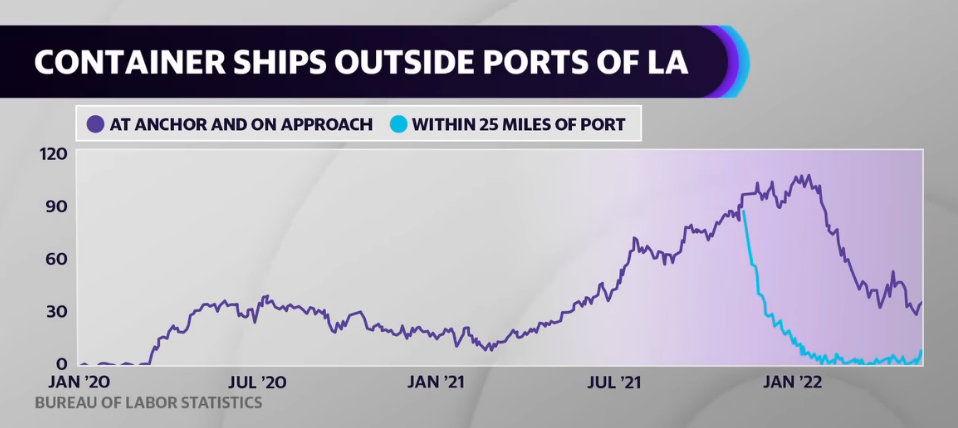
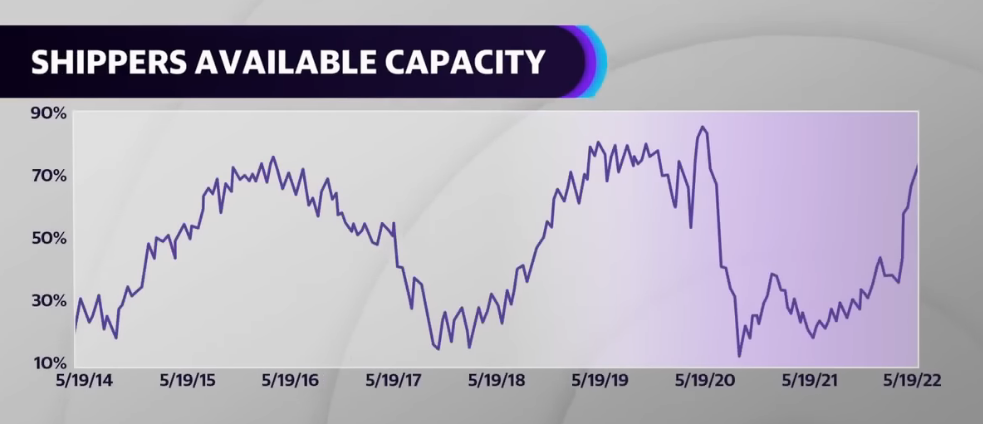
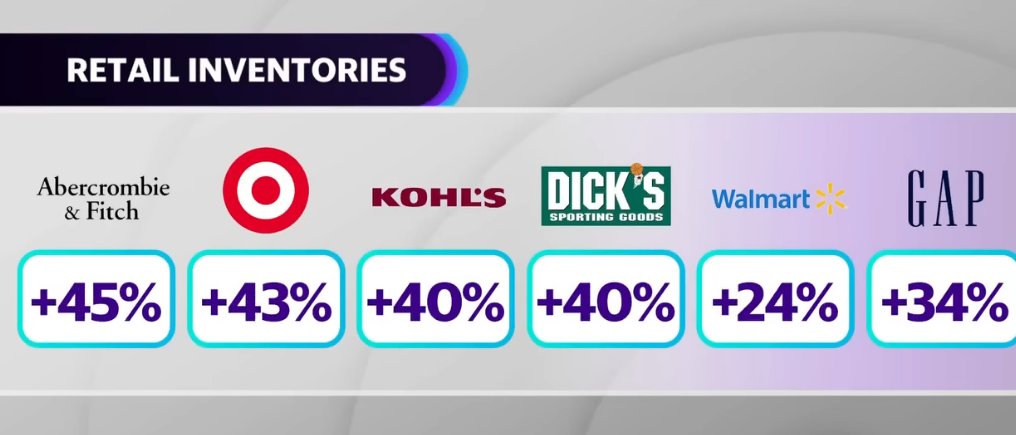
- May, 2022
- May 29, 2022
-
70% of US consumers 'would rather wait for a new product than pay for it right now' - Kearney Consumer Inst.Beauty is doing well, as part of the things people haven't been able to buy much recently. Fancy dresses and suits at Macey's. Wardrobe refresh. Weddings.Down: streaming, fitness bikes, plant-based meat.Now consumers want to get out of the house. 8% bump expected in miles traveled this Memorial Day weekend.
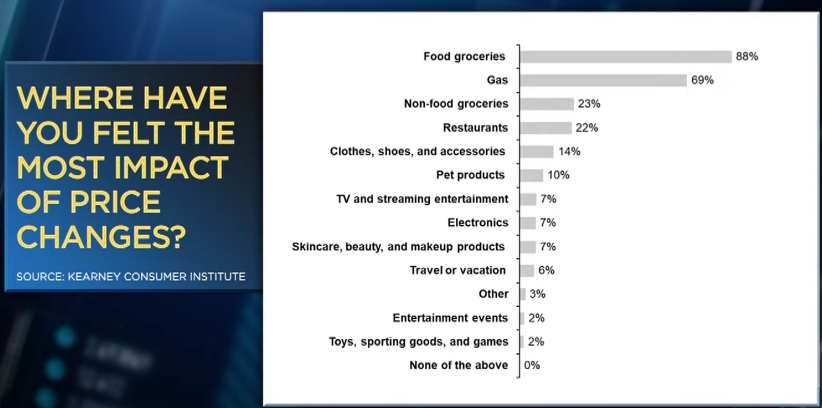
- May, 2022
- May 28, 2022
-
US now going to have to 'decide between two policy mistakes' - El-ErianThe US dollar is just too strong for the rest of the world.The cost of living crisis in the West is the risk of famine in commodity-producing countries. How much does a country like Egypt subsidize (probably most) and how much pass on to the consumer?UK imposed a Windfall Tax (to protect most vulnerable people in economy).
- May, 2022
- May 26, 2022
-
"I think we've seen enough wealth destruction that we are finally seeing demand destruction all over the economy, and the market people are picking up on that." - Josh Brown
- May, 2022
- May 25, 2022
-
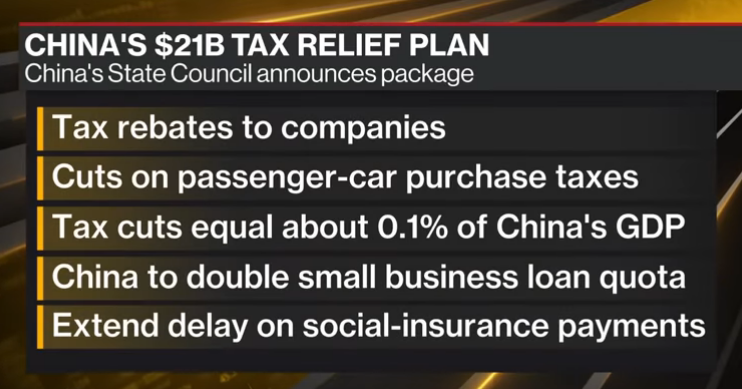 The Chinese likened the tax cuts to 'fertilizer' applied directly to the 'roots of the economy.'
The Chinese likened the tax cuts to 'fertilizer' applied directly to the 'roots of the economy.'
The numbers are added to tax cuts already implemented this year.
#China
- May, 2022
- May 24, 2022
-
This is where the market is the economy - Batnick"... because they're using their stock as currency to pay employees.""... in specific parts of the economy." - Josh Brown. In tech, not the housing market in Okl. Will be felt in housing, spending, and tax receipts in Cali.Snapchat's stock options paid to employees are now 40% underwater.Stock is down 75% from highs, down like 40% from IPO.
-
Coming into 2022 versus now, by WFC strategistWe thought you needed multiple compression. You got that. We thought interest rates and especially real rates needed to normalize. You got that. We thought that the Fed had to get motion, whether it's related to the balance sheet or to raising rates. That's been happening. Now we have a 15 or 20% pullback depending on where you look in the market.Two last things we needed to see: We needed to see rates come down, and we needed to see some softening of the Fed rhetoric, which is what we seem to be seeing in the short term.We're not seeing indiscriminate selling as in the last few weeks.
-
Usually stocks and bonds don't go down together forever, because it's a self-correcting mechanism - Chris HarveyStocks go down, you start to create more value. Bonds go down, and you have a discounting mechanism makes your terminal value higher and all of a sudden we find a bottom.
-
(notes:)New to us: a situation of high nominal growth. Nominal growth = real growth + inflation. Stagflation = the high nominal growth is absorbed by higher prices but output (production) doesn't keep up (low real growth).Labor productivity has been positive so far (output rose), but nominal spending was far greater.A reduction in nominal spending is the only viable solution, because it looks like productivity can't be raised much. Economies are approaching capacity constraints. Note: a simple raise in rates isn't necessarily 'tightening' unless it is relative to what is discounted and relative to economic conditions. Note: short-term interest rates.Inflation is increasingly entrenched and supplies and inventories are low.Stocks: Companies that are most liquidity-sensitive and longer-duration cash flow, have seen the biggest value effect.War in Ukraine: big effect on commodities (R a supplier). Normal short-term flight to quality (weeks or a month) and afterwards unfolding macro pressures typically dominate.Expect reinforced capex cycle (surge in demand). Lingering bottlenecks. Capexs to boost efficiency. Particularly industrials and materials (companies reshoring to US from Asia due to supplychain disruptions). Automation. Software and info processing equipment over past couple years.Governments' choice: tighten to control inflation and face a potential economic downturn, or don't tighten and allow inflation.Household balance sheets stronger (than 2018). Lots of cash in bank, appreciated home values and stocks. Poor people wealthier than past 60 years.Banks are very liquid. Money printing found its home there. Reallocating into loans.
-
New home sales fell 17% in US
-
Huge money debt and liquidity injected, internal conflict in US (populism), rising of new great powers - the three things right now, according to Ray DalioWhere are we in the monetary policy?One man's debts are another man's financial assets. So they won't be able to raise interest rates to a high enough level to provide a real return to investors. 3% or 4% won't be enough to compensate for the inflation rate.Paradigm shift. People believed everything that happened in the past 10 years, and then they get a surprise, and then they start to change.Do I think cash is a safe asset, or bonds are a safe asset? Am I getting a real return? There's gonna be a supply-demand balance. The Fed, individuals, foreigners, and the US gov (to fund its deficit) are all selling/going to sell. Going to produce a squeeze because so much money was put out.
What's going to get you a real return? Real assets. Like the 70s.Everybody's wrong. Everybody wants everything to go up. They keep giving you money. They want you to buy everything. They hype it. The world is holding all these financial assets. You're going to have an environment of negative real returns. - May, 2022
- May 20, 2022
-
Gas at $5 is not a problem, but gas at next month $5.50 then $6 etc. is a problem, because people say This is never going to stop and we have to cut spendingSo tightening quickly has another thing in its favor.
-
Crypto, and some stocks, within their nicheSo if you have the best crypto (or company), but there's a ton of crap cryptos and they're all going down, some to zero, your good one will go down too as a part of that. Part is news, part sentiment, part that the people who bought those bad ones also bought the good one and they sell them at the same time, bringing prices lower.
-
The very traits that would have allowed you to survive the crash in 2020 are the traits that would have killed you in the most recent regime change (out of tech etc into commodities and energy) - The Compound guysNobody's in a rush now. It's not like 2020 and 2021 where everything went up every day (and had like 5% drops sometimes) and you couldn't even think straight, just saying 'I can't believe I'm not in this'.
-
Defaults on cars in USFirst time it's been in the news I've seen. Sub-prime car loans.
Last couple years, car prices and used car prices went up, but there was tons of money from the Fed, so people kept buying things. Loans went up. A lot of borrowers don't have much for a downpayment, or have negative equity. But the car value of course depreciates, so if they were to sell a year or two later they wouldn't be able to pay off that loan.Those loans are owned lots by hedge funds pursuing higher return rates. You don't see a lot of banks jumping into that. - May, 2022
- May 18, 2022
-
Dividends (secure-ish ones) might be the investment play of this year or the next couple yearsCan't rely on valuation expansion anymore. So it's just dividends and earnings. And from companies with good balance sheets to ensure the ability to do so for a while.
-
US markets drop between 3 and 5 % for the 3 marketsSo-called 'safe haven' stocks are not immune. Consumer staples like Walmart and Target are seeing slightly higher revenues (nominally, not factoring inflation) but much higher costs (labor, transport, supply chains), and they are not able to pass these costs on to the consumer any more.So all stocks went down today almost. Every sector.Customers are buying groceries but aren't buying hard goods where stores like Walmart have a slightly higher margin.Yes, wages are up, but not as much as inflation. The highest cost increases are food and energy, and that's funneling away spending that would otherwise go to more profitable areas of selling.But the US economy NEEDS lower demand in order to trend prices lower.
- May, 2022
- May 17, 2022
-
Corporations in US have low debt, high in cash
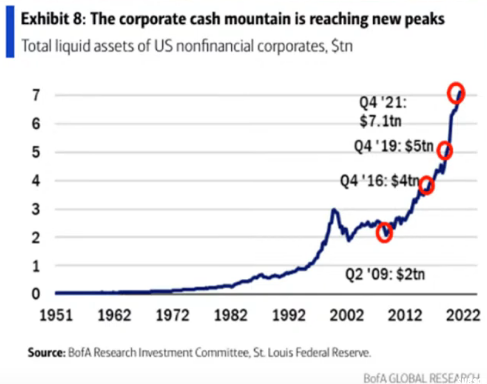
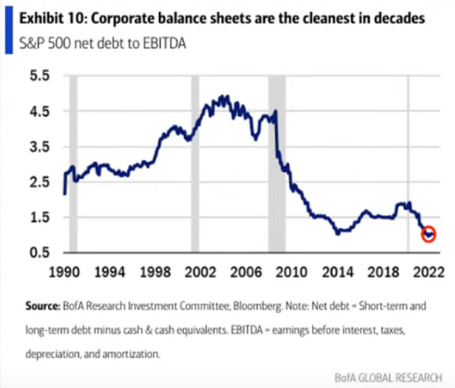 The stock market is $35t (so companies could buy back like a 5th of their stock).
The stock market is $35t (so companies could buy back like a 5th of their stock). -
What affects stocks
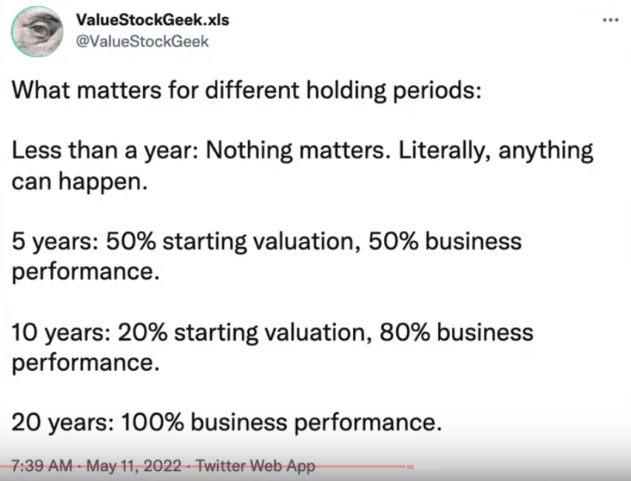 Josh Brown said it missed the most important thing: industry. The best company in the worst industry isn't going to work.
Josh Brown said it missed the most important thing: industry. The best company in the worst industry isn't going to work. -
US in situation for older adults where their ability to retire is based on how they invested money since they were 20Versus social security in other countries.
- May, 2022
- May 14, 2022
-
China and decoupling from 'factory China'Said that China is indispensable to global supply.China makes way more stem graduates (now needed by others). So many production facilities (Japan also has quite a lot). Apple's supply chain. China wants foreign firms there (like Apple). Provinces compete for this business.
Per capita disposable income is way up steadily in the last 10 or 15 years."China plus one" strategy. Vietnam, India, Mexico, Indonesia, Malaysia. But no country can do what China does.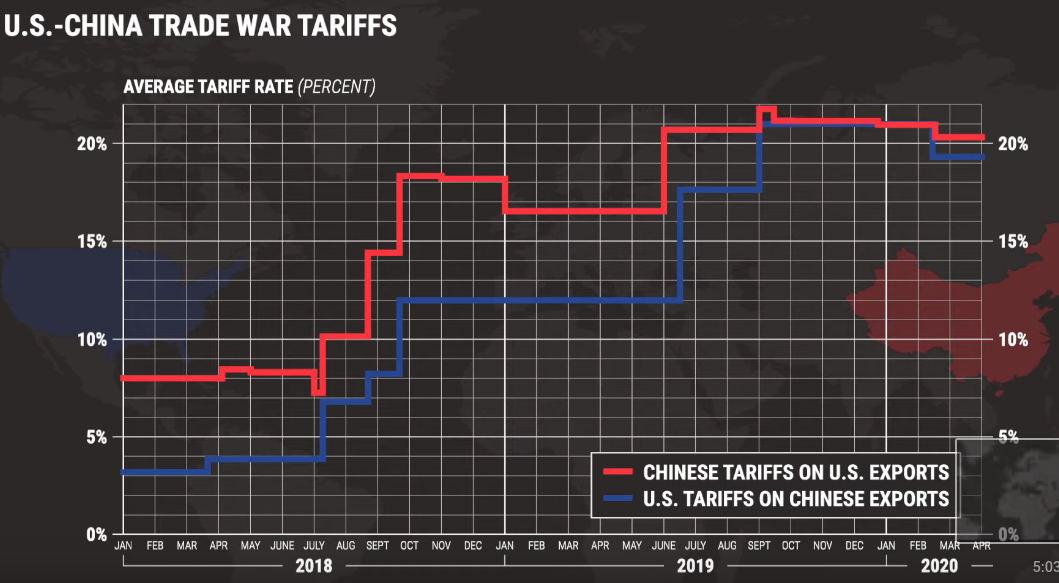
- May, 2022
- May 13, 2022
-
Saudi Aramco became biggest company in the world
- May, 2022
- May 12, 2022
-
Ruble collapsed by 60% last March when they invaded Ukraine, but is now the strongest performer of 2022 (a 2-year high of 64R/1USD)Spending of reserves, being an exporter of petrol, having gas buyers buy in Rubles, doubling interest rates and limiting capital flows, and talking about backing the Ruble with gold and other commodities are factors contributing to its rising valuation.Russia has energy, so that's not cramping their style like in some oil importing countries (price has been rising over the past year significantly). Russian consumer appears still strong.However, the future. The economy (GDP) is guessed it will shrink 10% in an upcoming recession. Financial sanctions take months or years to take effect, they're not immediate.The other currencies that have appreciated against the USD this year are the Brazilian Rial and (a lot) and the Mexican Peso (a little bit). All other currencies have depreciated against the USD this year, the most depreciation seen by Egypt's Pound, Argentine's Peso, Japanese Yen, Turkish Lire, and some other Eastern European money.
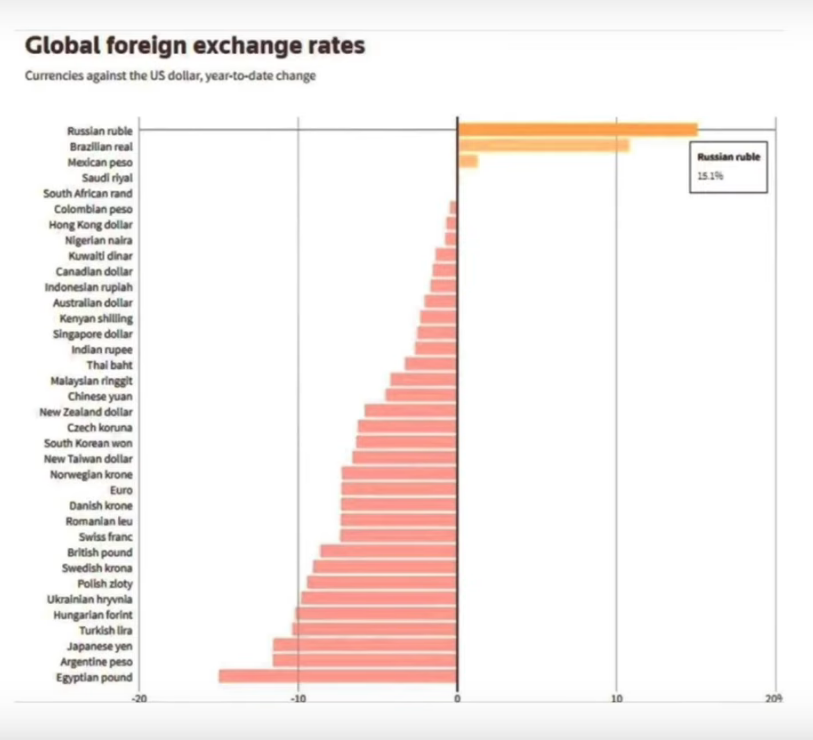
- May, 2022
- May 04, 2022
-
Questions about job seeking companies continuesJob vacancy NUMBERS have like doubled. A huge spike in the graph.But people applying for jobs aren't getting even interviews.Some say it has to do with companies and PPP loans:"I’ve applied for 350 jobs as a graduating senior with a BS in economics and certifications in project management and barely have gotten any interviews. I’ve gotten 5 different scam posts though!
"This is absolutely BS and is purely being used as justification for bailouts. The government is funding businesses to lie about their job numbers."Someone else:"IIRC some college professors had to send out upwards of 1000 applications to get interviews.
"I imagine the problem now is a lot similar to dating websites; where everyone is looking for the best of the best, without realizing that those top candidates or jobs are either half scams or interviewing what they think will be a great person, only to wind up ghosted and the position left open because that top person they turned everyone else down for found something better.
"Rather than picking good or even GREAT candidates, they just siphon out a ton of people on the assumption that the sheer volume of resumes they have means the cream of the crop will TOTALLY settle for them and not wind up somewhere else by the time they've sorted all the resumes and sent out responses to those top candidates." - May, 2022
- May 03, 2022
-
"We still haven't felt that 'get me out at any price' type of trading, and while we are likely getting closer to a tradeable low, we don't think we are quite there yet... we continue to look for a sub-4k SPX, with colume based support coming in 3900-39050." - Doc on CNBC
- Apr, 2022
- Apr 29, 2022
-
Mortgage refinancing demand dropped 70% from a year ago
-
Some San Diego residents moved to Mexico to save moneyBrokers for this trade usually see investors and retirees buying in Mexico, but now it's young workers too. Some people also work remotely and can live on the waterfront for $200k - $700k (versus in the millions for SD) (or was he saying $200 - 700 per month rent?).
-
Indonesia banned export of palm oil... because of local shortage. Prices for it are up 40%, and people protested.Indonesia does 1/3 of global vegetable oil exports. 30m tonnes exported by them. India imports half its vegetable oil from Indonesia, 13m tonnes (60% of that is palm oil, 25% soybean oil, 12% sunflower seed oil). (Malaysia does 32% of India's imports to Indonesia's 55%.) There will now be much more demand than supply. 20% rise in priced expected in India.Poorer countries depend more on cheaper cooking oils like palm oil.
-
Inflation since 1 year ago in US, by CNBC


- Apr, 2022
- Apr 28, 2022
-
Amazon $4b loss, quarterly reportStock down 10%.Amazon is particularly susceptible to 2 things that are wide trends: consumer spending and supply chains.Costs. 1.3m workers. All those expenses going up.
-
US GDP dropped 1.4%, in a surprise, first drop since 2020Pricing index up 8%. Highest since 1981.US importing way more than exporting. Inventory. Some downturns due to interest rates. Lots of distortions in metrics.
-
-
"If you have a $3m home that drops to $2.5, that person's gonna be OK. It's the person who bought the average $375k house that drops to $180k that can't refinance it, can't resell it, then can't afford a payment, and may lose his job." - I Allegedly (vlogger)Different from 2008 because they got rid of the liar loans and you really had to qualify for loans after that, but they're back now. The underwriting was much more difficult after 2008 (have to have income and a real downpayment). Back to unrealistic times right now.
-
"I don't know if we have a student loan problem, because it's only a problem if you have a debt that you can't pay." - I Allegdedly (vlogger)
-
Housing prices were up in March but sales down 8%. Consumer sentiment is lowering.The vlogger here, "These numbers, you don't really need to study them to know how bad these are, because lets face it, you see it when you go to the grocery store, when you purchase things, when you buy gas, you know exactly how you're getting mistreated as a far as inflation is concerned. That's happening to all of us right now."
- Apr, 2022
- Apr 26, 2022
-
-
-
"The NASDAQ, not for most stocks but for the FANGS, Feb 24, the day Putin invaded. - Josh BrownThe invasion drove up inflation for a lot of stuff, which put a top in for growth stocks.
-
"Apple is important to everything and everyone" - Josh BrownNot just the S&P and people who love tech, but also Berkshire. "Berkshire probably technically can't withstand Apple breaking down either."
-
Is single family home rentals 'the future'?
-
"We're in the only business in the global macro economy where customers hate bargains." - Rob Arnott on value stocks versus tech growth stocks20% up and everyone wants to buy, 20% down and everything avoids it, saying There must be something wrong with it.Does this mean the market is one of the easiest things to manipulate?
-
Tech stocks are not on discount, they are the bursting of a tech bubble, says Rob ArnottLike 2000.
-
"Roughly 1/3 of inflation is sheltered. Home ownership or renting, or hotels and motels" - Rob ArnottHotels and Motels up over 20% last year. Home ownership (which is much bigger) is not counted in CPI as the value of a home) up 32% in the last 2 years. What the BLS does is ask What would the home rent for? They don't know, they just ask the home owners what they think it would rent for.We're going to see an illusion that inflation is subsiding in the coming months because those months are replacing big inflation months from 1 year ago, followed by an illusion inflation is breaking out in the summer months because those months will replace low-inflation months.
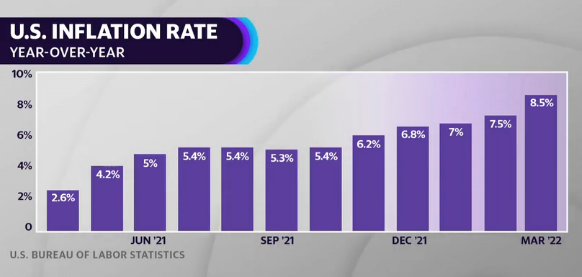
-
About CEOs of big tech companies, "They're successful because they've operated well near-term and they've had great long-term vision. If you've got great long-term vision there's no way you're reacting to a bear market. We're gonna have them every 5 years." - Mark Mahaney"Don't let the markets determine what your corporate strategy is. Maybe your financial strategy but not your corporate strategy."Maheney called Musk's purchase timing genius, "Step in with a big premium offer when the stock had been dramatically traded off as part of a bear market in tech stocks."
-
Does Twitter becoming private make it more competitive versus FB, Snap, etc?Mark Mahaney of Evercore: "I think Musk is doing something that a lot of investors should do which is that there's a lot of really good tech assets out there that are at very low prices. Yes, Elon Musk offered a 50% premium but it was on a stock that was off 50% since it's highs."
-
- Apr, 2022
- Apr 25, 2022
-
India will be selling wheat to Egypt, it looks like... instead of Russia and Ukraine, which formerly accounted for 80% of Egypt's wheat imports. They have a shortage, and have been importing from France, Romania, USA, and others. Prices have risen from $380 to $500 per ton.Egypt is the largest or second largest importer (12 of its 21m tonnes per year consumption) of wheat. India is one of the largest producers, and while it hasn't been big in exporting it, it seems India is willing to do so, although it seems unlikely India would be willing to produce and export THAT much. Right now India produces 110m tonnes and consumes 105m.They're meeting this week in Dubai. One thing they're doing (some Egyptian experts) is some tests to see what the quality of Indian wheat is, and how adequate it is for the Egyptian market. They found it is good enough, but commercial discussions which will come later will decide how much and at what price.Wheat is a strategic commodity, and every country has its own standards for wheat. Because it is strategic, Egypt is really considering whether to add India to its list of strategic importers of the food.Because Egypt is an important of wheat, so it can affect international prices of wheat. Not only a price taker but a price setter. That gives them the ability to have communications with several countries that export wheat, and to have some input on that trade of wheat on an international level. Exporters must respond differently when a big importer such as Egypt enters the market, compared with a smaller importer. (Big exporters also are price setters.)
-
-
7 years growing. Despite pandemic, recession, whatever.Over $2t in 2021 for the first time.The biggest arms companies are all in the US except one in the UK.
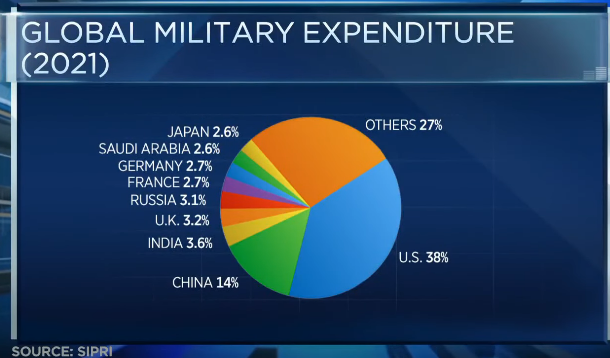
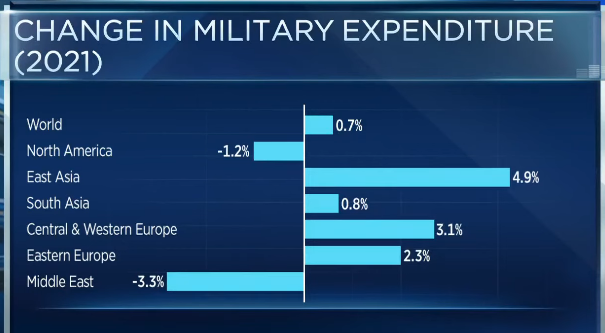
-
"The easiest of the hard things is crude oil." - Dan YerginBecause you can get it from other places. The hardest thing is natural gas.
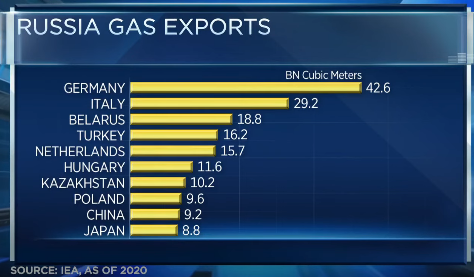
-
Asia markets continue downLockdowns and lockdown fears. More cases in Shanghai lockdown, now in it's fourth week. Beijing might be next.
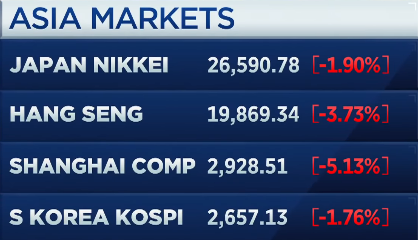
-
"When the dollar is stronger, things break in other parts of the world." - Alicia Levine"I think we need to start thinking about what happens to the real economy as a result of the Fed actions and marching forward quickly, and what happens to financial assets. ... and I think it's quite plausible that things could break in the financial asset market globally. Think about what has happened to the Yen, the Yuan, the Euro and the Pound in the last 3 months. A very strong dollar does not bode well for the rest of the world. For multinationals and earnings."I think we're seeing the beginning of the dislocation from the Fed's policy."(She doesn't see a recession in the US in the next year, but said that doesn't mean the economy's going to take it all that well.)
-
"If you look at the last two years, we had extraordinary rebound off the lows. You go back even further, 3 years, 5, 10. You go all the way back 13 years to the global financial crisis, and the challenge is that all of that is really a sugar high. All of those gains are really devaluation of the currency." - Mark YuskoHe said that gold is money (the only thing that is). When you denominate in gold, we're flat since 1996. It's really currency devaluation. Excess liquidity by banks.
- Apr, 2022
- Apr 21, 2022
-
NFLX down like 40% in a day after reporting losing 200k customersIt expects to lose 2m this year. It has like 220m though.
Reasons: saturation in US (has like 90% of that market), competition with other streaming services (like Disney which is what anyone with kids maybe pays for). Cutting off Russia cost around 700m subscribers. Musk said wokeness was making shows unwatchable.Netflix is considering running ads (doesn't now) and not allowing password sharing. - Apr, 2022
- Apr 20, 2022
-
Expectation to keep a level of diversity. At the start of last year they had a dozen black partners among their 400 partners globally, and 5 have left in the last year.Questions about the pipeline (black execs to chose from).A lot of these black execs who are leaving, they were hired in 2019 or 2020. That's leaving significantly faster than the average tenure of a Goldman partner.
- Apr, 2022
- Apr 18, 2022
-
$828b in US taxes to be paid by Americans, plus $125b in crypto taxes, approximated - Tom Lee and FundstratFundstrat looked into years where markets were strong, and the weeks before filing (April 18 this year, not October) markets were weak.A lot of assets are bad financial hedges, Lee said. Americans own $55t worth of bonds. There might be a panic out of bonds. Lee thinks into income generating real assets and TINA. So people will sell bonds to buy real assets but not a lot of stocks.His base case is still that inflation cools.
- Apr, 2022
- Apr 16, 2022
-
Bretton Woods 3 - New world monetary orderBeing talked about by some as having started when Russia invaded Ukraine, and the US (and West) blocked Russia's access to it's money with economic sanctions. Written about for everyone by Zoltan Pozsar, strategist at Credit Suisse.The first Bretton Woods (the only formal actual agreement) was in 1944 (700 delegates from 44 allied nations met in New Hampshire for 3 weeks in July, establishing the IMF and a part of what would later be the World Bank). The British Pound was decreasing in value. The US dollar became the world standard. It was pegged to gold. It became the most common reserve currency (when a country exports more than it imports, it will end up holding foreign currency, so it has to decide which foreign currency to hold. Most picked US dollar). The second (informal but considered to be) "Bretton Woods" happened when in 1971 (but Bretton Woods I was considered OVER by 1973) Nixon decided the US was going off US-gold convertibility (after the US decoupled many fixed currencies followed, and currencies were allowed to float relative to each other - fiat currency. Price stability was the job of the central bank, controlling inflation, keeping it low, stable and predictable. (US buying a lot of Chinese goods and China holding US reserve currency was a hallmark of BW2. This Chinese holding of USD peaked in 2014 but is still up there). Dollar hegemony."Bretton Woods 3:" The West imposed severe sanctions on Russia this year, and Russia therefore had access to only $300b of its $600b of foreign reserves. The result is that central banks of every country are now concerned their foreign reserves can be confiscated this way if their actions fall foul of US policy.Zoltan Pozsar says the core of our portfolios (and also the monetary system) will be in commodities in the future, and that central banks might have to bail out commodity traders (which seems to people an odd thing to say).Zoltan drew an analogy between subprime assets 2008 which triggered the global financial crisis AND Russian commodities, which he considers to be sub prime. Prime assets are non-Russian commodities, which are kind of like treasuries in 2008, the safe haven assets everyone wanted to protect them from the equity storm. Urals (Russian) crude oil currently trades $30 (huge difference) below the price of Brent (delivered in the North Sea).China, says Zoltan, will play a large role in bringing those subprime commodities (Russian ones) and prime commodities (non-Russian ones). Because China has lots of reserves and it also has not imposed sanctions on Russia.Zoltan sees a multi-polar world emerging, where we're no longer dominated by US dollar trading. We'll use Renminbi when trading with China, Rubles when trading with Russia. Ie weaker dollar and stronger Renminbi. If China wants to do this (bring R subprime and non-R prime commodities back into line, it can: sell treasuries, which would push up the yield in the US and with that money buy Russian commodities. Use some of that money to lease US vessels (raising shipping costs and thereby inflation in the West) and use ships to store commodities if it runs out of storage space in China. Another way China could do this thing is if the Chinese government prints renminbi and use that to buy commodities from Russia. This would also push up US yields (and therefore inflation because its still a supply squeeze) because they wouldn't have to store any dollars in US treasuries, because a big buyer of US treasuries would suddenly disappear.If this happened, there would be not just the US dollar "eurodollar" (nothing to do with Euros) market but also a renminbi market. End of US dollar hegemony.Either of these two options China has, Zoltan says, will cause higher inflation in the West, higher yet US treasury yields, and higher shipping costs (also inflationary). Another result is commoditiy volatility, rising up fast, crashing down (remember the London nickel exchange crash day written about on this blog?) Commodity traders could fail and become bankrupt. Central clearing counterparties could also fail, leading to government bailouts.
And, as Larry Fink has talked about, the end of globalization because of resource nationalism (as a defensive measure), stockpiling of commodities, and rethinking (localizing and multiplying) supply chains.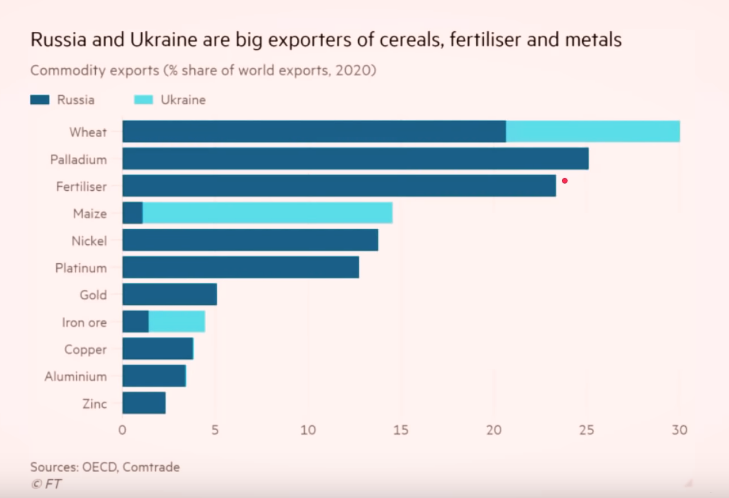
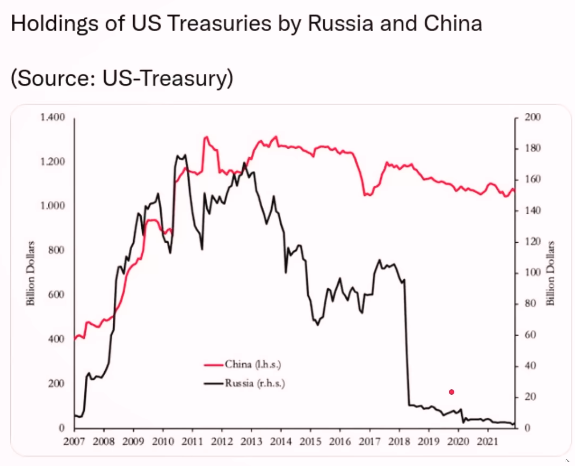
- Apr, 2022
- Apr 13, 2022
-
Supply chainsThings seem a bit worse now with China.We don't know when supply chains are coming back.
-
Food insecurityWe don't yet know who will make up the 20 or 30% global wheat production which Ukraine usually does.
-
Comparative economics in 2022, amid Ukraine war, pandemic restrictions, global supply chain issues, etc.If you're an energy producer or food producer (commodities), you're doing well. If you're an importer you're suffering.Turkey has to import energy. (It also regularly receives 4m Russian tourists every year.) Egypt has to import food.US politicians about other countries 'making a decision about where they are in this crisis.' China: Washington is poised to take a hard position towards China depending on the decisions they make. India. US wants both to oppose Russia.
- Apr, 2022
- Apr 12, 2022
-
Over the past half century, gas stations have gone from gas only, to gas plus service (checking fluids), to self-serve, to 'smokes and cokes,' to having their own snack items (which actually have brand loyalty, unlike gas stations), to being like grocery storesThe younger generation is also reportedly more brand loyal to shops like these.Gas sale itself is not very profitable (7% markup). Food makes up like 70% of profits now, reportedly.
-
Sri Lanka govt increased pharmaceutical prices 30% earlier this year when inflation came to that countryPharmaceuticals running low, reportedly. No access to imported drugs, reportedly. Several hospitals are not performing surgeries."If supplies are not restored within days, the casualties will be far worse than from the pandemic" - SLMA16k people have died of Covid in the country in the past couple years, according to reports.
-
Economists revising expectations for Chinese growth rateWas at 5%. But now (strict lockdowns) aggregate demand will be lower from less economic activity. Expectations now about 4%.Questions about supply chain issues stemming from Chinese manufacture, and the effect on global inflation rates, which is already affecting interest rates in US.It's already brought oil prices lower.
-
Nepal banned import of luxury itemsA first step to combat the possibility of a liquidity crisis like in Sri Lanka right now.It has reserves for about 7 months.Prices up for regular goods.Tourism is a significant part of their economy.
-
Sri Lanka announces default on all its external debt$51bn.They ran out of foreign exchange to buy food, fuel, etc.The government there said foreign governments et al were free to recapitalize any interest payments, or to accept rupees.SR needed $7b to service its debt this year but only had $2b in reserves.New Delhi has sent thousands of tons to Colombo as part of a multi-pronged support plan.Protests there for leader to step down.
-
Supply for vehicles expected to return in 2023, according to Toyota CEOSupply chain issues the number one reason there won't be enough cars for demand until then.25% of sales are electrified cars (hybrid or full). That technology has improved to where it offers the performance consumers want, plus gas prices are rising.Toyota does 65% of US full hybrid sales. Honda, for and Hyundai follow with about 10% each.
-
Small business in US, inflation31% say inflation is the most important issue, replacing 'labor quality' as the #1. (Taxes is #3.)Inflation is leading to pessimism, some say. Owners expect business to be better over next 6 months: only 49% of them (50-year record low).
-
Inflation 8.5% YoY in US, highest since 1981For the Consumer Price Index(However, some say in core inflation, US came in below estimates, which means some of inflation could be decelerating [not gas or food, which is highly effected by Ukraine].)There were record increases in wages published recently, but adjusted for inflation we see it hasn't kept up, being down 2 or 3 percent when inflation is factored in.There's also a question that big companies are accepting a degree of profit margin pressure, taking the loss and not passing it on to the consumer.The market went up the morning this was put out though. Analysts thinking there might have been an even higher whisper number.Republicans say part of the issue might be benefits programs ('lavish' unemployment benefits, health care, and a child tax credit no longer tied to work), which might have exacerbated the worker shortage. No incentive / "almost a denial" for workers to drive workers back to work (stimulus). Also that the president talking about higher tax rates all the time inhibits business investment. Places like Brazil lowering their tax rates to combat inflation.
- Apr, 2022
- Apr 11, 2022
-
"Because they see how the tourism industry is going, young people do not want to enter it." Entertainment same. Doing theater was "illegal," and people in the business faced bankruptcy.Delivery services are doing well for the past 2 years. Online shopping innovations.Gardening is up, even in cities.
- Apr, 2022
- Apr 09, 2022
-
US will emerge as world's largest LNG producer this year, said Dan YerginHow much gas that was going to go to Asia is now going to go to Europe (for strategic considerations) (depends if Asia has a severe or mild winter)?
- Apr, 2022
- Apr 07, 2022
-
Indonesian coalHas seen prices rise from $100 per ton in April 2021 to around $300 (it was $400 a bit ago). It started a while ago, before the Ukraine war, but has been effected by Europe's new energy issues.The government of Indonesia requires coal producers to sell 25% in Indonisia at prices it decides ("domestic market obligation"), and the companies are making a good profit off the rest on the open market.
- Apr, 2022
- Apr 06, 2022
-
Mortgage rates in US dropped 40% YoY amid rising rates (highest rates since 80s I think)
- Mar, 2022
- Mar 31, 2022
-
Is crypto democratized or democratizing, really?Vice actually did something people said was OK again with this video.
- Mar, 2022
- Mar 22, 2022
-
"This week they're incredibly hawkish. A few weeks ago they were incredibly dovish."
- Mar, 2022
- Mar 20, 2022
-
"Perversely, what is supposed to be the cleanest energy policy will turn out to be the dirtiest" - Samo BurjaHe said he thinks that because for the past 20 years (more?) the German government has been telling the populace nuclear energy is like the worst thing, dangerous, it would be very difficult to now say to them that they're going to start building new plants, "I think you're just going to keep burning coal, because you will be forced to disentangle from Russia eventually."
- Mar, 2022
- Mar 19, 2022
-
LME halted trading in nickel, but also cancels all the days tradesThe London Metal Exchange said it was what was best for the market, the exchange didn't keep to its neutral position, but "picked winners and losers." Cancelling orders (after the event - the held a meeting and decided to let trading continue, but then after the day they decided to cancel all that had happened) is basically unheard of. 500 nickel trades had been executed that day, worth almost $4b.Nickel was up like 240%, a huge short squeeze.When LME cancelled the trades that had already taken place, it wiped out an estimated $1.3b in profits and losses.It has been said that the entity who would have benefited most from the trades being cancelled is Tsingshan Holding Group, the world's largest stainless steel producer, who was estimated to have lost $8b on their short position. Tsingshan's biggest lender and broker is China Construction Bank.It was pointed out (most vigorously perhaps by those who lost on the cancelled trades) that the LME is owned by the Hong Kong Exchanges and Clearing.The LME CEO said the owner of the LME had nothing to do with it.This story is much more complicated, with the various companies involved, as well as the China being state controlled having some effects, and the Russian 'blood diamond' nickel issue: Cancelled Nickel Trades on the LME - YouTube
- Mar, 2022
- Mar 14, 2022
-
"The Germans have been enabling Russia more than anyone else in behavior against our interests" - Samo BurjaHe said they just have to do something else, whether its nuclear plants or de-industrializing.
- Mar, 2022
- Mar 13, 2022
-
Europe likely headed for recession, US not, according to Mark MobiusUS is going to be producing a lot of military equipment, and that will help its economy, he said.
- Mar, 2022
- Mar 09, 2022
-
MacDonalds and Starbucks stopped or are going to stop business in RussiaAmongst lots of others, apparently.Samo Burja said about this, "Countries around the world will no longer see Western companies such as MacDonalds or Starbucks or Facebook or Twitter as neutral services. They'll consider it a strategic priority to develop their own."He said India has for a while wanted to emulate China, and said it would be almost insane or treasonous for Indian leaders to not to start to block social media websites and develop their own.If it is impossible to pursue an independent strategy, Burja said, and it has to play with the Western strategy, and has to trust in our multilateralism, our fairness, our justice, I think that's kind of a joke. "I think they have no good reason to find the West trustworthy."
- Mar, 2022
- Mar 06, 2022
-
Ivermectin ("horse drug") more effective than Remdesevir, according to two new studiesDenegrated and warned against by MSM, the Nobel prize-winning, WHO essential drugs-listed Ivermectin has been shown to be much more effective than Remdesevir in treating Covid. Less hospitalizations, less deaths.Ivermectin costs a couple cents. Remdesevir costs like $300 per cycle.The Miami study found you were 70% less likely to die if you took Ivermectin versus if you took Remdesevir.The Brazil study found Ivermectin-only group had 70% less mortality than Remdesevir. The Ivermectin group was taking just a tiny amount of Ivermectin every 2 weeks as a prophylactics (prophelaxis?).There was also a large (about 44%) reduction in infection (data from Brazil study).This is not really being reported in MSM.Top YouTube comment on this video:
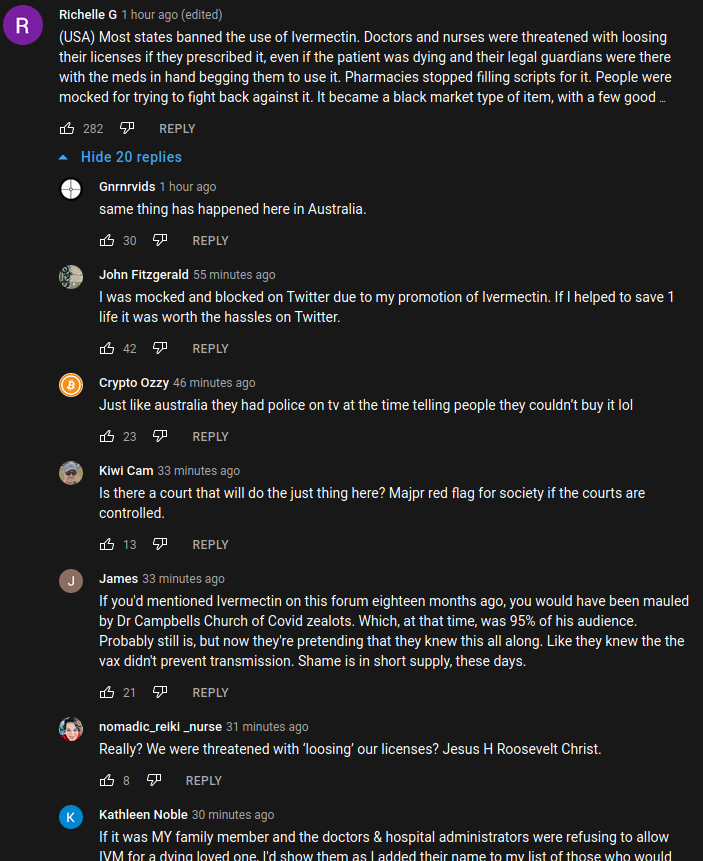
- Mar, 2022
- Mar 03, 2022
-
How much has the US given the Ukraine for military over the past 5 or 10 years?I heard someone say a billion.
- Mar, 2022
- Mar 01, 2022
-
Massive economic incentive to expand NATO after end of Soviet UnionAll those former Soviet countries were outfitted wit Russian weapons. They had to be refitted with Western weapons (NATO all use the same weapons or something).To create new markets for the big military equipment companies that wouldn't be buying as many tanks and warplanes etc since Cold War was over (ultimately US didn't buy less because War on Terror started in 2001).- point raised by Ali Abunimah
-
Russians were at the ATMs trying to withdraw cash as fears of economic trouble in the country grows
-
"One sanction that Putin fears, and that is ending the purchase of natural gas from Gazprom." - Yanis Varoufakis"... As we speak, Nordstream 1, the gas pipeline, is feeding the German industrial machine with 40% of its energy from Russian gas. They're not going to say anything about that, because this is a sanction they're not prepared to make."
- Feb, 2022
- Feb 28, 2022
-
Ukraine has put up cypto wallets for people to donate... saying the money would be used to destroy as many Russian soldiers as possible, it was reported.They've received several million into these wallets.
-
Idea of Russia using crypto in the face of sanctions not so easy, reportedly... because crypto trading isn't that high. There just isn't availability for the amounts he needs, people are saying.Also, some endpoints are controlled.
-
Expectation is inflation will be worse in Europe than USUS is a net- energy exporter (since 2019).
-
-
Russian stock market fell 40% before being put on holdIt's Monday.US market also down. Europe market significantly down. Oil up. NatGas down. Gold up. Crypto significantly up.
-
Removal of Russia from SwiftBut more important, commenters say, are the restrictions US and allies are placing on the R central bank.R has $600b in foreign reserves. The restrictions aim at preventing Putin from using that money to fund the invasion and to keep the R central bank from offsetting the falling Ruble.Putin has built up that big foreign reserve pile (3rd largest in the world) over several years, some say in an attempt to "sanction-proof" his economy. He's cut his debt ratio to GDP.There's talks that Switzerland will even join the sanctions.The Swift and R central bank sanctions may have isolated the R economy and put it into a sort of freefall. The R people will likely feel this, as will the R oligarchs.They have not yet done trade sanctions (ie go after oil and gas), because Europe gets over 40% of its gas from Russia. Such sanctions would cost everyone around the world.
-
"For the first time ever, the EU will finance the purchase and delivery of weapons and other equipment to a country that is under attack." - EU Commission President Ursula von der LeyenGermany is transferring a bunch of weapons. So is Sweden, the first time its broken its historically neutral stance in 80 years. Other countries also.Challenge in delivery as Ukraine's airports were early Russian targets.
-
US at 12m barrels of oil per day, 25% more than Saudis300% increase in rig counts since crash in ENP expenditures, because of the Covid recession.Will be up to 13m per day by end of year.US price per KWH is $15. The next cheapest is France at $25. Germany is $45.One reason for not producing more (esp in Europe?) is this raises the price, so the population becomes more ready to do things to adopt renewable energy instead.
- Feb, 2022
- Feb 18, 2022
-
Some people say China is winning over US in LatAmThe countries are simply taking the best deal offered them, even if it's something like Huawei, which the US tried to get Brazil not to deal with because of Huawei's alleged spying. China is reacting to the local need, some sayChina's BioTech vaccine was the first vaccine available to Brazil. Some say LatAm countries are not happy with the way Washington handled the pandemic.
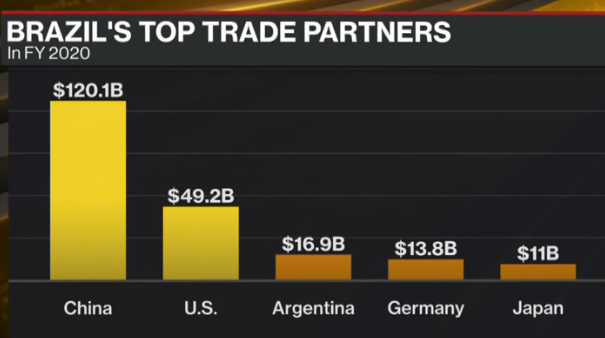 #China #Brazil #LatAm #InternationalRelations #Diplomacy
#China #Brazil #LatAm #InternationalRelations #Diplomacy - Feb, 2022
- Feb 15, 2022
-
'We're in an era of post-US shale hypergrowth. US shale is no longer growing more than global demand, and so there's a call on global super majors, but they can't pick up." - Eric NuttallCountries (like Nigeria, Angola) are underproducing, forsaking 100's of million of dollars per month. Because they have had the inability to invest new productive capacity. So there are very few members of OPEC that can actually meaningfully grow oil production. Many, including maybe Russia, are near their productive capacity.We might see OPEC fair capacity exhaustion by the end of this year, which would be very bullish for the oil price, said Nuttall. But only energy producers and investors want higher prices. Therefore, even if Russia were to actually invade Ukraine, it is thought there wouldn't really be sanctions. Politically, democratic leaders maybe can't allow the oil price to go up much further. This might mean relaxing on Iran (the last suppressed producer which could easily come on line), also.What allows oil producing companies to return the most free cash flow back to investors is long-life reserves, low corporate declines, and strong balance sheets. Canada has the best of all 3 of any jurisdiction in the world, but has among the lowest stock prices, according to Nuttall.If there is $100 oil, they can privatize themselves, they can buy back every single share that is standing in just 2.6 years, while they are sitting on 15 years of inventory.He said we're not 'high' in inventory, we're 'normal,' we're back to like the period 2010-2014 (in that 4-year time period, oil averaged over $100 and yet demand continued growing). We're not at the point where high price leads to demand discretion yet, he said, and won't until we see $130 or $140 oil, if like academic history it happens when oil hits 5-6% of global GDP. Nowadays, exhausting capacity plus end of US shale hypergrowth, the fundamental setup is more bullish than 2010-2014.Because investors want returns (not growth of production), oil companies will continue to pay down debt, do dividends and increase dividends, moderate growth, moderate corporate decline (a company doesn't have to spend as much to keep their production up), rather than start new projects (multi-billion cost and then 4-6 years to come on line and then another 4 years to reach project payout). That means meaningfully higher oil prices.He thinks demand will continue to grow for 10-15 years.The perception of 'bad, dirty' oil has over the past years taken investors out, but now they're being 'dragged back in.'
-
Crude prices fell almost 3% as Russia pulls back some military forces from their close proximity to UkraineThere have been a lot of headlines over the past week or two about a possible invasion.
- Feb, 2022
- Feb 11, 2022
-
"Monetary policy itself will likely put us into recession, because we don't have normal economic cycles anymore. We have credit cycles that ebb and flow with the cost of capital, and now that the cost of capital is going up, even though historically speaking it's still very low on an absolute basis, the rate of change is already changing mentality." - Peter Boockvar"Since the 70s we have not seen such a low intention to buy a car.""The IPO market is beginning to tighten up, and companies have to start looking for private financing instead of the public market.""For the Fed to look at the curve and say 'Okay maybe we should not raise rates,' it's somewhat circular because it's the market's belief of their rate hike in the short end that is resulting in this flattening.""Now with respect to QE and how that influences the curve, it's tricky also because in theory you'd say 'Okay if the Fed is going to stop buying bonds, if they're going to shrink their balance sheet, long rates would rise, but as we saw after QE1 and QE2 the exact opposite happened. When QE turned on rates actually went up. When it turned off rates went down. So it's an impossible situation that they've put themselves in, and the question now is At what level of pain are they willing to tolerate, both in terms of economic activity and where the markets go before they get spooked? But because of the elevated level of inflation, even though it will slow on a rate of change basis, it's still going to leave them very little flexibility to react to try to pull back.""In a sentiment perspective, if inflation is driving interest rates hgher, and interest rates going higher is driving the stockmarket lower ... perhaps. Then that sentiment is going to, it's kind of like a circular kind of effect, where those people (earning $100k or more, who make up a large part of the 'consumer sentiment being lower' right now a the U of Michigan study) are driving a lot of the sentiment lower." - Dom Chu
- Feb, 2022
- Feb 09, 2022
-
"The Fed is signalling a tighter monetary policy, the economy is very strong, unemployment's low, earnings for many companies are at records, state tax receipts are rising way above expectations, credit card usage is high, stimulus is tremendous." - Bill Miller
- Feb, 2022
- Feb 01, 2022
-
Buffet may have sold his airline stocks when the pandemic started not out of panic, but in order to save American jobs... because if the world's richest man owned a huge stake, the government would have looked bad giving these companies bailouts.This point was raised by Josh Brown.Anyway, Berkshire is doing very well this year, and most of Buffets holdings (utilities, energy, banks, etc) are doing well.
-
Shift to a buyers market more nowAfter the past couple years where every startup could ask billions of dollars
- Jan, 2022
- Jan 28, 2022
-
Covid-19 vaccines and treatments: we must have raw data, nowThe authors of this paper, published in BMJ, say people don't have access to real, good (raw) data on the vaccines.In the paper, they write, "The anonymized participant level of data underlying the trials for these new products remain inaccessible to doctors, researchers, and the public" despite the global rollout.The authors asserted that, "This is morally indefensible for all trials, but especially for those involving major public health interventions.""The company and the contract research organization that carried out the trial hold all the data."
Pfizer indicated it wouldn't even begin to entertain requests for trial data until 2025.It has been pointed out that a similar thing happened in 2009 - 2012 there was a large vaccination campaign for H1N1, and governments were stockpiling Tamiflu,how much did tamiflu make (UK spent 473m pounds on it. Anyone know how much it's made worldwide?) and there was a black market for the product. Major trials for it were sponsored by the manufacturer, and papers were ghostwritten and paid for by the manufacturers. Academics who requested access to the papers were denied. - Jan, 2022
- Jan 25, 2022
-
IMF is urging El Salvador to not use Bitcoin as legal tender
- Jan, 2022
- Jan 21, 2022
-
Market sell off has been a few days nowShortage of buyers.Big tech stocks seem to analysts like they're trying to go back down to pre-pandemic levels. Amazon was down over 5% today. Netflix, a $250b company, was down 22%.Questions about margin calls.Everything was red, though. Growth and value. Tech, energy, and reopening trades.People are talking about 'what price to buy stocks at.' They had been saying over the past year that multiple and actual value seem to not matter, and that there was so much retail investment, and no one cared about looking at actual business value, it was possible to say you should buy stocks without considering value.Buffet is now up. Berkshire over the past months has been one of the best stocks. Kathy Wood's Ark is down.The market was up 25% in the past year.Monetary and fiscal and economic uncertainty, which is expected to get worse in the upcoming months.
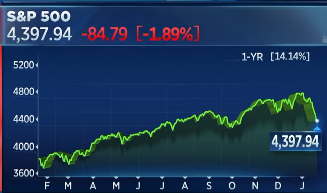
- Jan, 2022
- Jan 18, 2022
-
Berkshire one of the best stocks this yearAfter taking some flack during the bounceback in 2019 for not being on board with new stocks.Kathy Wood's Ark Invest is down.It has "everything you could want in this environment." Cash to take advantage of opportunities, real estate exposure, industrial, railroad (which is charging record rates), financial exposure, energy, utilities.Buffet was like the last man standing after the dot com bubble too. He was ridiculed in the 90s for not understanding the appeal of the tech thing.
- Jan, 2022
- Jan 16, 2022
-
Pfizer, BioNTech and Moderna will make pre-tax profits of $34 billion this year from vaccines$93.5 million a day.Moderna delivered 0.2% of their total vaccine supply to low-income countries. Pfizer/BioNTech delivered less than 1%, according to People's Vaccine Alliance.
- Jan, 2022
- Jan 02, 2022
-
2022, the world's largest trade is in arms, followed by the drug trade, still$500b yearly, controlled by criminal networks.Opium in Asia.Central Asia, Golden Triangle, Golden Crescent. Cannabis resin in Morocco. Cocaine mainly from Colombia. Biggest consumers are US and Europe. Transport over sea and air.
- Dec, 2021
- Dec 30, 2021
-
- Dec, 2021
- Dec 17, 2021
-
"US is one of the few demographic countries with a tailwind" - Tom LeeMost other countries are going the other way."Most major companies are founded by people in their 20s or 30s. Costco, Blackstone, Bloomberg. ... So if you have more people age 30, you're gonna have more innovation. ... There's a correlation between people age 30-50 and the number of patents filed.""If we were just relying on demographics that would mean that we have a bull market through 2029."China, Japan, Europe don't have this demographic optimism.
-
"You don't need capitalism anymore" - Tom Lee"... Because now there's so much saver capital you don't need an economy," meaning there's enough capital around already."It's like oil. Imagine if we have the reserves. We don't have to import oil anymore."
"The US essentially could be a supplier of capital to the rest of the world now. ... The capital that's accumulated now will be used to generate returns anywhere in the world." - Dec, 2021
- Dec 07, 2021
-
Global debt trap?Perhaps, as debt in the world is 4x the underlying economy (in about 25 countries debt to GDP exceeds 300%, whereas before it was just Japan). At this level, an increase in interest rates could cause the system to shake, and this might be a reason long-term interest rates have a problem going up, despite the entire consensus calling for this move. According to Ruchir Sharma
- Dec, 2021
- Dec 06, 2021
-
Bitcoin tumbleIt went down about 20% in an hour or something, amidst it's few-day drop and small rebound to $42k. It was around $57 before I think.The whole market dropped significantly several days last week, on news headlines about a new strain of the virus. Rebound today for most stocks.On bitcoin though: 'These cycles will continue to play out for three reasons. The first of which is there's higher volatility in crypto; there aren't circuit-breakers that we have in traditional finance, so nothing that can keep a floor after things start going down really fast; and the market never closes, so there's not really an opportunity for information to be digested once this cascading effect takes hold.' - Frank Chaparro
- Nov, 2021
- Nov 30, 2021
-
Twitter only up 2% since it went publicOr maybe it's currently below it's opening price in 2013. Social media public companies are up around 200% (Global X social media ETF) (Facebook is up like 600%).Does only $3 or 4b a year, and pays it's owners et all pretty well, is the loudest social media voice there is. Politicians and journalists.Dorsey stepped down as CEO today. Some commented they expect more censorship on it now.
- Nov, 2021
- Nov 29, 2021
-
$207m loan default makes Uganda lose only international airport to China, possiblyChinese debt trap success if true, but Ugandan and Chinese authorities have denied reports.The loan, signed in 2015 between the Ugandan govt and China's Exim (export-import) bank, had a 20 year maturity period and 7 year grace period.Uganda's largest commercial and military airport. Entebbe airport.
- Nov, 2021
- Nov 25, 2021
-
"Bonds are basically paying for the pandemic response" - Some investor said
- Nov, 2021
- Nov 05, 2021
-
Oil and gas companies perhaps not welcom at COP26 summitThis was raised by Steve Sedgwick at CNBC. He asked the COP president at a press meeting, but the pres, Alok Sharma, avoided answering it.
- Nov, 2021
- Nov 02, 2021
-
Lots of talk of 'tops' and that things we're seeing are indicativeRead the following couple stories. Investors have been reminded of the dot com bubble when saying your company had a 'website' made it rise.
-
Talking about your company having something to do with EV makes it riseAvis up 100% after saying they were going to rent EVs. (No deal or anything with an EV company, just said something about it.) According to Karen Finerman.Investors aren't allowed to short these things--the reddit crowd--they've been told not to. So these moves are left to just go up. Reportedly.
-
Squid Game cryptoWent up like 2800% before, most assume, the owners of the scam converted their holdings into other currency.Buyers were not able to sell. There was an element of this where they said they were going to make a video game, or something.Fun fact: Devs, on the website, had profile photos from ThisPersonDoesNotExist, it's thought.
-
John Deere reached a tentative 6-year deal with United Auto WorkersCovers 10k workers. Wage increases, signing bonuses, if workers vote approval.DE was up like 5% (on a day of many stocks being up).Ag economy and food safety tailwinds appear favorable to Deere. Supply chain issue is causing more national production of goods (at higher prices). Corn, wheat prices are way up.Although this means higher labor costs, it also means clarity and a fixed employee cost for 6 years. If we do see what most people seem to be talking about now--persistent inflation--what Deere is going to pay may seem not high after all. If Deere can raise prices on tractors, they can actually expand margin. And they might just be first-movers on this one, where in 3 or 4 years other companies might have to pay a lot more.Also, currently there is a trend or shift to thinking about more than just profits. Ie about workers.
- Nov, 2021
- Nov 01, 2021
-
"Apple and Google is a giant piggybank for everything else" - Michael Batnick"The bubble inside the stock market is funding bubbles elsewhere" - Josh Brown
- Oct, 2021
- Oct 27, 2021
-
"The way finance works in 2021 is that things are not valuable based on their cash flow, but on their proximity to Elon Musk"- Patrick Boyle
- Oct, 2021
- Oct 26, 2021
-
Early retirement boomMight be a secular trend. For decades older workers were not retiring but kept working.Now there's millions more retiring than expected.We don't know what, but it's expected the course for the US has been altered by the Pandemic.
- Oct, 2021
- Oct 25, 2021
-
Hertz orders 100k Model 3sHTZZ up 10%, TSLA up 12.5% for the day. TSLA's stock is at $1000 now, and the company is worth $1t, I think.Worth $4.2b in revenue for Tesla, the largest EV order ever.Projections for how many Telsas are going to be produced in 2030 are up in numbers quite a bit.Investors didn't see this coming really. Many were shorting TSLA. Tesla passed through periods where no one knew if they'd be able to fund themselves. Tesla traded on hype or something, but it's now starting to trade on fundamentals.They only have like 1 or 2% of market share in countries they sell to.UPDATE days later. Tesla is up a lot more. Someone asked Musk about if he was selling to Hertz at a discount, and Musk tweeted Tesla had more demand than supply, and wasn't selling to Hertz at a discount, and so the agreement (he stressed nothing had been signed) meant nothing to Tesla's economics. TSLA was down like 4% on a day when basically everything was down."Lead sales are ugly sales," is something you hear people say sometimes. Automakers are selling fleet versions (often base models with maybe a few extras added on) in large numbers at a discount, and it's of course good for auto-makers but not that good.However, other things come into play. Hertz would have to invest in infrastructure and it would create a lock-in effect with buying and servicing Teslas.
-
Investing mainstream started to realize physical stores are good... Simeon Siegel of BMO was talking to Kelly on CNBC and said they just finished a 6-month study, and all the big retailers who disrupted traditional stores with their e-commerce model are now growing profits through moving to physical stores (in addition to e-commerce. The term is 'omni'). Also realized that the middle man has value. He talked about 'surprises,' such as physical stores allowing you to own the brand and own the customer. It doesn't keep you at a certain threshold like e-commerce does.
- Oct, 2021
- Oct 24, 2021
-
"When did this happen to us? When did housing turn into a commodity? Why is housing being traded on the stock market? How is it that a public good is being used to make such astronomical profits?"-Said by a Berlin resident who didn't move out of an apartment building, although they want him to move out (as every other tenant already has) to make room for them to demolish the building and build new apartments. He received threats and had his car set on fire, reportedly.Rents have skyrocketed as global investments have poured into Berlin real estate.A recent large referendum had 57% vote in favor of (who? the State? the city?) buying out companies who hold more than 3000 units. ("The most successful referendum in Berlin's history")There's a line in Article 15 in the German Constitution that says property can be expropriated when it's for the public good. (There are lots of other options to fix the problem besides expropriation, however.)It's a pattern that exists in most European cities. Demolishing old buildings and building new ones. Prices rising. Long term residents left with not much choice but to move elsewhere.How can we contrast 'a public good being turned into a commodity' with having enough money to satisfy the market and the possibility of lack of such money being treated as sufficient excuse to seize property without consent (which, you could argue, is frequently done by governments during land development)?
- Oct, 2021
- Oct 20, 2021
-
Bitcoin ETF
The first one the SEC let pass. Gensler hinted he's more comfortable with trading on an regulated futures exchanges like NYSE (where the Bitcoin ETF 'Proshares,' BITO, owned by ProFunds Group [$58b under management] is listed) than on Binance and that type of exchange.BITO is not based on actual Bitcoin, but rather on futures contracts, and filed under mutual funds rules that provide significant investor protections, according to SEC. The product already exists, and this is just a repackaging, and if something goes wrong the SEC knows how to deal with it and knows how to intervene.The futures in BITO are a bet on the price of bitcoin, without having to actually store bitcoin, so there's no risk of theft of coins or loss of passwords. If bitcoin goes down in price, your money goes to pay those who took the other side of the bet.The risk is taken by the arbitrageur who holds bitcoins he buys for full price plus a margin of 1/3rd. Ie a bitcoin which costs $60k means $80k for him. They do this because they charge for this service.The return for you of buying BITO is less than buying Bitcoin. It will tend to trade about 8% above the price of bitcoin. (Right now this premium is about 15%.) The ETF's management fee is about 1%.So why is this product even necessary? Some experts say 'institutional money.' Boomer investors who will never get a crypto wallet even if it's easy to do, but who have money to invest and want to put it in bitcoin. Josh Brown recently said Chicago investment culture is such that they would approve an ETF for anything as long as they thought people would put their money into it, or something like that.Bitcoin up steadily over the past months from it's 25k low (or 30 I forget) and is now at $55k (up several percent since BITO dropped). -
Some restaurants using robots because they can't get workersIn the US, 75 or 80% percent of restaurants are understaffed.Robo-chefs.Flippy-2 robot makes deep fried wings. The restaurants are looking at unlocking capacity: faster food for guests. Doing less desirable, more dangerous tasks. Costs now about $3000 per month (I don't know what that means exactly).Matri-D by Richtech delivers plates of food to tables. It's basically a robotic food tray. Costs up to $20k. Can serve more tables, customers get food faster, no tips.An Australian delivery robot delivers food from a mall to houses within a half a mile.
- Oct, 2021
- Oct 17, 2021
-
6% increase in social security benefitsHighest increase in 40 years.Based on cost of living adjustment (COLA), based on actual government-reported inflation numbers. Retirees need the increase. The average check is going up about $100. Most people receive about $1200 a month on this.Ie, inflation. A 2% increase is considered to be high.6% is a non-sustainable number.
-
- Oct, 2021
- Oct 11, 2021
-
Used fast fashion, low quality, doesn't find a market when it arrives in Africa15m items of used clothing arrive in just Ghana every week, sent from the first world. Lots of people go through this clothing to sell it in used clothing stores. More and more of what arrives is 'fast fashion,' which is low quality and doesn't last long.There are fields of garbage that include a lot of this clothing (estimated 40% of used clothing that arrives in Ghana goes there).
- Oct, 2021
- Oct 08, 2021
-
"The global financial system needs legally stable tax-neutral jurisdictions in order to facilitate international business transactions, which in no way dodge any taxes." - Patrick Boyle, talking about offshore tax havens like BVI and Caymans, in light of the Pandora Papers.Governments like the US gov also use them, for investment like in the TARP program, which helped bring liquidity to the markets after the Global Financial Crisis.
-
India's coalCoal is 70% of India's energy mix (most mined domestically).India keeps adding lower and middle class energy consumers, who are buying goods like fans, lights, and TVs.Mines were flooded recently by monsoon rains.There is only a few days of coal stores. But it doesn't look like there will be a power outage.It's more a fear for businesses than homes.India has some solar, but solar outputs are reportedly declining.
-
Energy crisis in Europe?Some (especially Northwestern like Austria and Germany) nations keep low stocks of natgas, buying is on spot. These will drive the price up.This is based on capacity and ability to stock up over the past summer.Exposure to spot market rates.Asia is winning bidding wars with Europe for cargos.There is a question whether Russia really can deliver as much as it says it will. Russia is also looking to fill up its own storage.Spain suggested to the EU a shared reserve of energy for emergencies.
-
At some point, Chinese crackdown on companies will be more or less finished, and from that point there will be a more stable operating environment for a lot of companies.The next catalyst for Chinese stocks.CCP wants to see 'no further monopolistic behavior.'
-
Fantasia, a second big Chinese real estate firm, missed a big key payment
-
China power crunchAs China came out of the pandemic, the economy recovered fast, which led to energy demand, which led to really rapid production of coal, which led to some mining examples. As a result, the gov put some safetly regulations on, which constrained coal mining production this year. Prices went up.Over the summer, local officials were really conscious of these issues and tried to coordinate with power companies to make sure power supply and demand would be balanced. But in September, demand was higher than expected.
Also, wind and hydro were lower than expected in some areas.In some areas also, local officals were not meeting their energy intensity targets.This led to the CCP unilaterally deciding to cut power supply to certain sectors of the economy.At the heart of it is really 'local officials' decisions,' it was said.(Coal has been the best performing commodity this year price wise.) - Oct, 2021
- Oct 06, 2021
-
Putin assured EU he has all the natgas they wantEuropeans pay 5x what Americans pay for natgas.
- Oct, 2021
- Oct 05, 2021
-
Stagflation?
CEOs are planning for supply chain disruptions in 2022 also, which means they are starting to worry about maintaining output levels even though demand is there (ie profits lost not just deferred). -
People now seeing inflation as not going down. US, UK, Germany.
-
"Companies feel more confident to increase prices because prices are going up everywhere."Mohamed El-Erian, on inflation being seen now as not so transitory.
- Sep, 2021
- Sep 30, 2021
-
Threat of attack on international money transfers cited by investorI forget who it was.
-
China banned crypto, nomatter where trading takes placeUS regulators are also looking at doing something. Notably DeFi (Gensler).China is experiencing energy shortages (Goldman downgraded China's growth forecast for this), and it might last months.Still, any Chinese with a wallet could trade on permissionless decentralized exchanges where there is no KYC.There are also VPNs and many Chinese live and work overseas where it could be impossible to prevent their trading crypto.
- Sep, 2021
- Sep 28, 2021
-
US home sales have turned negativeTight supply pushed prices up. Sales of homes under $250k fell compared with a year ago, although those over $1m rose 40%.First time buyers are having a hard time with higher prices. Home prices are up 20% over the past year. Median price is $356k (I think). First time home buyers are half the percentage of the market they used to be. Sticker shock?Fed is doing this, according to Josh Brown, with 'mindless asset purchases,' like mortgage bonds of $40b a month, harming the first time buyer.If rates rise further, which is speculated, it might slow home buying even more. Some experts think this will affect second house buys and more expensive house buys, rather than first home buys, because Americans still seem to like the idea of owning a home and putting their money into this investment, whereas people who already have a house will be less likely to buy a different one.
-
About 100 OnlyFans accounts made over $1m each, reportedly
What is missing in the societies where the clients come from?Users pay $5 for a monthly subscription to any given account, and pay tips up to I think $100, in order to sort of be friends with an attractive person. Accounts make content and personalized content.The UK company is worth about $10b, it's estimated. -
-
US economy start of OctoberWages going higher, lots of jobs offered (11m openings), savings still high, retail sales very strong, resurgence (V-shaped) in manufacturing which is barely below pre-pandemic.General mills expects 7-8% inflation for fiscal 2022.Investor confidence high. Yield curve steepening.Preparing for tapering and rate increases.Labor and supply chain issues have both worsened. No one knows when supply chain issues will be fixed. But they will eventually (after 2022?) be fixed, although wages are 70% of company costs, so it might be different there. Wages and rent.The economy is very strong. Profits are high and growing. Profits get recycled into capital expenditure and hiring. The Fed is still acomodative.It's considered likely the US will get infrastructure.Manufacturers (like Ford) saying US needs to start making chips and minerals like cobalt locally. A local supply chain that's circular.Consumer confidence is lowest since Feb.Real yields are rising, which is typically a sign of real growth.
- Sep, 2021
- Sep 24, 2021
-
China told local governments to prepare for fallout from EvergrandeThey're tasked with things like preparing to take over and continue building projects, monitoring civilian protests, and paying migrant worker salaries who are working on Evergrande projects.
-
Way more $ going to investing into startups recentlyUsually in a recession businesses are shut down, and don't open.Startups have tons of money now, hundreds of millions or billions, and this can be contrasted to startups in previous decades which had a million or a few million. Well capitalized, competing warchests of cash.Thousands of companies, in competition with each other, who are in no rush to turn profitable. They can try 5 or 6 things before they need to have a success.
-
Retail sales, which are 30% of GDP, downEconomic optimism in a recent survey went down 14% in a month (considered significant for a month over month).Retail sales in July were 17% above Feb 2020. Growing 3x their normal rate, because govt spending all this money, and now that is over.The consumer is 70% of GDP.
-
Fed whispered the word 'taper' this week.Investing talkers seem to be wanting a taper already. Just throwing money at people.
-
Bonds are being sold just on stabilityNo longer stability and growth. No longer a source of income.People are kind of scared.- Jenny Harrington
-
"The next recession will be caused by the stock market""That happened in 2000. There was nothing else. It was the stock market.""The economy is no longer big enough to offset whatever the Fed is doing and whatever the stock market is doing."- Josh Brown on The Compound, Sept 24 2021
-
Rayban changes leading design into 'waycreepers'?It's been reported Rayban has licensed or partnered or something with fb to put camera's in their most iconic line.So now are we going to be looking for this design to spot people creeping on public locations?The last time a large glasses-camera attempt was made was a few years ago. It was Google Glass. What ended it was when a wearer (you might imagine that people interested in buying these products correlate somewhat with people who don't respect the public privacy of others) was punched for wearing them somewhere. Whether for the pr or whatever that might follow this, the project was turned down or off. Will we see the same thing here, to end the current movement towards spying on all public life?
- Sep, 2021
- Sep 20, 2021
-
Evergrande crisis causes global markets to drop a bitChina's second largest property developer (and world's most indebted one, with $300b in liabilities after years of borrowing for funding of rapid growth amid recent real estate frenzy). Seems the company is insolvent. But some analysits say it might be 'too big to fail' because a failure would undermine the CCP's stability.Evergrande's been trying to sell properties for 25% off to deleverage. So much property on the market to sell off quickly is maybe not great for the Chinese property market. There are other companies in the same position as Evergrande as well.CCP signaling there won't be a bailout, but as mentioned above this might not be possible because the company accounts for something like 2-3% of China's GDP. Because the majority of financial institutions involved are state-owned, China might use these to do a bailout without appearing to do so directly. However, the CCP seems to want to change the problem they have in their housing market: for years, people have bought homes as investments, and just left them empty, not even renting them out, to keep their quality for some future resell at at a profit, because values have gone up so much in recent years and were expected to continue. This means that the economy gets no real value from the production of these homes. So the CCP wants to move away from unproductive growth to real growth. You might see here why the CCP might be willing to let Evergrande fail so that the traditional moral hazard in the market is reduced. However, real growth alone wouldn't be enough to generate the economic activity for China to hit its GDP growth targets. The way China hits its targets is malinvestment by the real estate sector and local governments building unnecessary infrastructure. The government does more malinvestment when the economy slows down and reduces it at other times. It fills the gap.(Malinvestment refers to ... from the 90s until mid-2000s, Chinese debt funded necessary and productive investment, which means the return on these investments grew faster than the debt did. The investments boosted the economy more than the cost of the debt. After the mid-2000s, debt began to rise faster than GDP, ie the cost of the debt was greater than the returns on investing it.)People referring to the Lehman collapse (filed for bankruptcy Sept 2008), but China has the advantage of having seen America go through that and how the AIG bailout was unfair to the taxpayer.Evergrande also is different in that it has wealth management unit, so depositors are earning interest, but now Evergrande is trying to offer them property (not good property, but things like parking spaces in ghost cities, since all the good stuff they had which could be sold has been sold or pledged against specific debts) if they want.In China, some protests on the streets. Some are by employees who haven't been paid.Investing experts have said that although this is just now a big global story moving markets, it's been known for a long time. Commodities were ahead, with iron ore halving since July, for example. China's share of commodities consumption globally is somewhere between 40 and 70% of global supply (20% of global supply just to Chinese real estate).$310b in obligations globally owed by Evergrande. They have a crucial payment on their offshore bonds in a few days, and people think they might miss it. This debt is held in large amounts by Ashmore Group, BlackRock, UBS, and HSBC, among others, lots in bonds held in vehicles that focus on riskier EM or Asian credits.A risk is that if all these property owners cut their prices, it will affect also mortgages, and could cause a chain reaction. Late payments of this size could trigger cross-defaults.Evergrande also has a business model where it relies on customers paying for properties before construction (which this finances). Hundreds of thousands of Chinese have put down downpayments for things that possibly might not now be built.Real estate is responsible for 30% of China's economic output.Real estate investment is a large part of investment for Chinese people, due to the expectation values will continue to rise as dramatically as they have done in the past decades. It's been reported that houses costs about 45x average annual income, which is very high globally. Part of the interest in investing in property is due to lack of options in that country, where there tend to be significant levels of scams, and Chinese businesses haven't panned out as great places to invest either. There's also a social pressure to own a house in China. Chinese men reportedly can't get find a wife without having a house.If Evergrande isn't bailed out and Chinese are caused by their government to rethink property values, it would change the values of loans on the books currently, since they were all (last 30 years of loans) based on assumptions about how the government support them rather than on the borrowers ability to pay back.Most of Evergrande's debt is held in China which people think can absorb the loss, and the overseas debt is trading currently at about 30c on the dollar (US denominated debt at around 80c). Some think the CCP might cause Evergrande to pay back Chinese lenders first (there will just be more political will to pay the small wealth management investors in China than foreign lenders, regardless of seniority and capital structure), but that would cause an interesting situation where Chinese companies seeking outside investors going forward might not have as easy a time.S&P was down like 1.5% the day the news hit.Another issue is that while the Chinese have allowed the CCP to rule authoritarianly, they may be less likely to support the CCP if the country is no longer growing and making people all more wealthy. Combined with slowing population growth. Also, while Chinese exports continue to increase, this is due not to genuine productive potential, but rather to the price growth of commodities, it has been said.
- Sep, 2021
- Sep 11, 2021
-
EU fined WhatsApp (FB) $270m for privacy violations
- Aug, 2021
- Aug 30, 2021
-
Luxury brand loss, China45% of luxury spending is by the Chinese consumer, ahead of the US.More purchases are within China than before and this trend is expected to continue (rather than go abroad to buy them cheaper).The government may be making it sort of culturally taboo to flaunt wealth with luxury purchases. China is cracking down on wealthy spenders.4 big luxury stocks, LVMH, Richemont, Kering and Hermes, have lost $85b together in last 2 weeks. Arnot was the world's richest man at the beginning of this month, but his $200b went down $22b and he's now 3rd.
- Aug, 2021
- Aug 19, 2021
-
Chip shortage touches ToyotaInventory reaching limits (it is suspected the reason), Toyota is cutting N America production from 150k to 90k.
-
60% of Americans paid no federal income tax last year (2020)107m households paid none. So around 20m households paid, ti looks like. For reference to a normal year, in 2019 76m households didn't pay any -- it's been around this number for the last decade.Tax credits and higher unemployment during the pandemic is the reason. An example is a household that almost reached the income rate where they would pay taxes, but then received a few stimulus payments, which put them into the category of nonpayers.Fed income taxes don't include payroll taxes. 80% of households paid at least payroll taxes in 2020.The number is expected to go down this year just a few percent (to 57%) and then return to around 40% in 2022, as long as the economy recovers. However, Congress made some changes for 2021 which will have less households paying, such as an increased child tax credit, earned income tax credit, and child and dependent care tax credit (affects millions of families).The country is undecided how to deal with tax revenue. In 2020 80% of fed income taxes were paid by the top 20% of earners (30% of fed income taxes were paid by the top 1%, which is up from 25% in 2019). Democrats want high earners to pay more, while Republicans say they already pay quite a bit.CNBC: 61% of Americans paid no federal income taxes in 2020, Tax Policy Center says
- Aug, 2021
- Aug 12, 2021
-
China economics, summer 2021We have got more info from the CCP on which sectors they really want to promote, as opposed to those whose recent growth has been seen to cause them problems (as usual for closed, authoritarian governments, this includes industries that control information).EV, clean energy, and industrial upgrading have policy tailwinds, according to JPM's Julia Wang.
- Jul, 2021
- Jul 31, 2021
-
Breakfast economicsIn the past year, bacon went up 10%, fruit 6%, and just 0.2 and 0.3 for cereal and for coffee (but sugar is up over 3% because its ocean-freight transported). Consumer price index went up 4.2% yoy in April.Corn is up 50%, which is 96% of what farmed animals eat in the US, which exports to the world. China is importing a ton to try to build up its hog supply again, while other countries like Brazil and Argentina have recently had drought (which also narrows rivers and reduces transport ability). Also, 10% of US gas is ethanol. Shipping costs are up, too, because of the labor issue. As you see, a lot of the costs in these products involve labor costs.Restaurant meals are up 4% in cost. Takeout trays are yet another part of this--prices went up after a Texas storm took out a factory.Some economists talk about 'wage price spirals,' where both wages and prices go up in a relationship. It was an issue in the 70s. The Fed says inflation is transitory.This was an idea from Wall Street Journal.
- Jul, 2021
- Jul 22, 2021
-
Economic concerns raised by former Wells Fargo CEO... Kevin Kovacevich: Inflation (2-3% increase in salary for average worker, and 4-5% inflation on just the basics like food, gas, consumer goods); trillion dollar deficits already and trillion more if Biden admin gets budget passed.Markets at all time high. Kovacevich's idea is that the market is priced alright based on where rates are now, but once that changes in the coming year or years the market will look differently.
- Jul, 2021
- Jul 19, 2021
-
Tigray war may cost $2.5b according to estimatesTPLF has conquered most of the north and south of Tigray.Ethiopia is one of Africa's largest aid recipients. The US alone contributed a billion in 2020, and therefore has some leverage. Investing in Ethiopia right now comes with significant reputational risks, making companies more reluctant to submit massive investment bids.Ethiopia is finishing their dam and stressing tensions with Egypt and Sudan. The dam fits in with Abiy's plan to lift Ethiopians into a higher economic class. Sudan might benefit from a huge energy production facility on it's border for it's own energy needs.Getting ahead of things, but if Egypt was to take up a campaign against Ethiopia, due to the huge distance, it would have to use Sudan.
-
OPEC reached a deal to increase 400k barrels per day to productionOil was down about 2.5% (although the Dow was down 2% on inflation, stagflation, and Delta variant concerns) and oil company stocks more than that. Natural gas was up less than a percent.However, projections have it that demand will want 1m or more barrels more per day next year, assuming no more lockdowns.US producers could surge new production and crash the market. But no one wants to invest in new exploration. Most companies are hedged at a $50 range.
- Jul, 2021
- Jul 09, 2021
-
Alibaba wants to compete with Amazon in shippingArguably, this is the one real strength Amazon currently has, as it's catalog seems less and less impressive.Alibaba already has good warehousing and distribution, as shown in how it handles China's 'Singles' Day.'Ali also has a payment company and other businesses that help speed up shipping.For delivery, Ali depends on partnerships with airlines and ground-based delivery co's (DHL).Ali wants to expand the products it offers to its 190 countries and charge $3 per year for fast (like 2-day) shipping. Amazon currently charges between $13 and $130 per year, depending on location (India, UK).Ali's product prices are comparatively cheaper than Amazon, because Ali has direct access to the Chinese producers.Ali sells a lot of alleged counterfeits, though, which hurts the real companies. Amazon also has faced these criticisms, but less so.
- Jun, 2021
- Jun 29, 2021
-
Americans overwhelmingly don't want to go back to their jobs this yearA recent poll found almost 100% of people don't want to return to the office after being in their homes over the past year. They prefer the life of spending more time with friends and family. They're considering finding a new job.There are also more jobs available then ever. 9.3m jobs in April.People are asking whether the stimulus so far or the stimulus expected in the future have contributed to people not wanting to get jobs, but data doesn't seem convincing one way or another.
- Jun, 2021
- Jun 27, 2021
-
China industrial profits slowing, reportedlyTheir numbers are still growing, but according to analysts the growth is slowing, comparing the same month in different years. China's economy is still projected to grow 8% in 2021: strong growth.Also, small company profits are growing less than those of bigger companies.Rising commodity prices are squeezing profits for downstream companies, accounting for some of the slowdown in profits.
- Jun, 2021
- Jun 16, 2021
-
Tech subsidies ending, but damage might already be doneFor years, maybe since around 2012 people were not paying the 'true price' for tech commodities, but now that the tech subsidies are ending, they might have already killed all their competition, leaving consumers with higher prices and less selection.The most commonly cited example is Uber. Years ago, you could get an Uber for less than a yellow cab. Real businesses can't compete with artificially low prices, so many of the taxis have gone out of business, and now there's just Uber and only a few cabs in some areas, but at Uber prices double or triple what they were when Uber was 'competing' with its competitors.
-
Nord Stream 2 almost finished, despite US sanctions along the wayThe U.S. will have a hard time competing with Russian gas anyway, in serving Europe. Russian gas is cheaper and is said to be greener.
- Jun, 2021
- Jun 14, 2021
-
Lordstown Motors CEO and CFO have resigned... amid shortselling investigation, but having more to do perhaps with the company saying they had 'substantial doubt' they could continue next year. Shares were down 10%.
- Jun, 2021
- Jun 13, 2021
-
Turkey has approved development of a new canal beside the BosporusThe Bosporus is Turkey's, but due to the 1936 Montreux Convention it can't allow non-Black Sea State navy ships to pass through, and it can't charge for the passage of civilian vessels during peacetime. The new Istanbul Canal would not have such restrictions.It is expected to be around 45km long, 21m deep, and 360-275m wide (top and bottom) and cost $15b. It will sit around 30km west of the Bosporus Straight, and will be spanned by 6 bridges, all high enough to clear the largest ships (which will cost another $1.4b).Currently, ships have to wait around 14 hours to enter the Black Sea due to congestion of the Bosporus. Estimates have it that revenue from the canal could amount to $8b per year eventually, if vessels decide to pay, which it is uncertain they will. Turkey will also be able to send dangerous cargo on a route further away from the city center.Istanbul citizens polled in 2020 opposed the project (80% opposed) due to environmental and other effects they will be faced with. It's also opposed by Russia which sees the potential ability of US and NATO warships to enter the Black Sea as a national security threat. 104 former Turkish naval officers also publicly opposed the project (the next day 10 were arrested).
-
Between 2019 and 2020, toy sales were up 16%, and figures appear to be up even more for the current year.Hasbro, as the biggest maker of board games, stood out because they saw a lift to their entire business, as did the makers of Lego.
-
Lots of talk about billionaires not paying taxesNo one knows how the journalists at ProPublica got hold of tax records for several years for some of the richest Americans.Bezos, Musk, Soros, Buffet, etc., paid what appear to be small dollar figures in income tax for certain years (some years $0, some years around $70k were the most quoted figures, dating back to the year 2011). This is because they don't generally make income (particularly when you're talking about each year). Instead, they hold assets. Their largest asset is generally company stock, which is only taxed if it is sold (capital gains). Some years, they need to raise cash and so they take loans against their assets. This is not taxable.
- Jun, 2021
- Jun 12, 2021
-
El Salvador adopts BitcoinThe country doesn't have their own currency and uses USD. This means they can't print money, and that can be an issue when you're a net importer like El Salvador is (they could run out of dollars without the ability to print).They also have high unemployment, and 70% of the population doesn't have a bank account, and many Salvadoreans receive money from relatives working in more prosperous countries (about 25% of Salvadoreans live outside the country, and the money they send accounts for 20% of El Salvador's GDP). Money transfers are always a challenge with conventional institutions, and can involve high fees for each transfer (sometimes as high as 10%, which is of course good for banks).The bill passed Congress (62 out of 84 votes) to make El Salvador first country to accept crypto as an official method of payment ('unrestricted legal tender') beside the USD.
- May, 2021
- May 20, 2021
-
Bitcoin drops 30%Basically all crypto dropped significantly, after months of increased speculative buying.
Other factors in the drop: further talk of regulation, ESG (energy use) concerns regarding mining, and China cracking down on crypto.In somewhat related crypto news, Bitmix reportedly ceased operations, not long after the tentative conclusion of the DarkSide pipeline hack. Bitmix was a crypto money laundering service used by ransomware hackers.Musk tweeted a "diamond hands" image, signifying he wasn't selling.About a month later, Musk tweeted a more positive comment on energy concerns with crypto mining, causing Bitcoin to rise from around $35k to around 40k.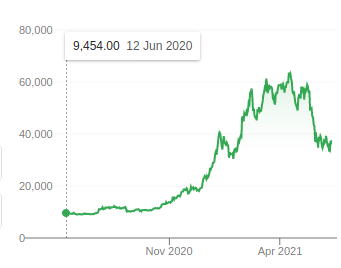
- May, 2021
- May 08, 2021
-
Corn, soy, wheat prices upThe reasons include China buying more because the country is rebuilding its hog herd after major losses in 2019 and last winter (African Swine Fever); draught in Brazil and ongoing dry conditions in the U.S (two major suppliers); and traders trying to hedge inflationary risks.The robust Chinese demand is expected to continue for 2-4 years. Additionally, rising incomes in developing countries could keep food prices moving upward.There isn't much alternative (such as rice and wheat) to feeding livestock good grains (corn and soy beans) when a livestock economy is focused on maximizing gains and quality, as China's is.Offsetting factors to inflation in food prices have started to be seen in more elastic demand factors, such as Chinese animal protein demand, where indications are consumers are starting to pull back due to prices. Also, the supply side, if robust enough, could put downward pressure on prices. We'll see how robust U.S. production turns out to be this year in the June Acerage Report, as the U.S. is still planting this years crops.Rice prices aren't up in the same way because stocks have been built up over the past few years.USDA Acreage Reports
Show More
Show Less